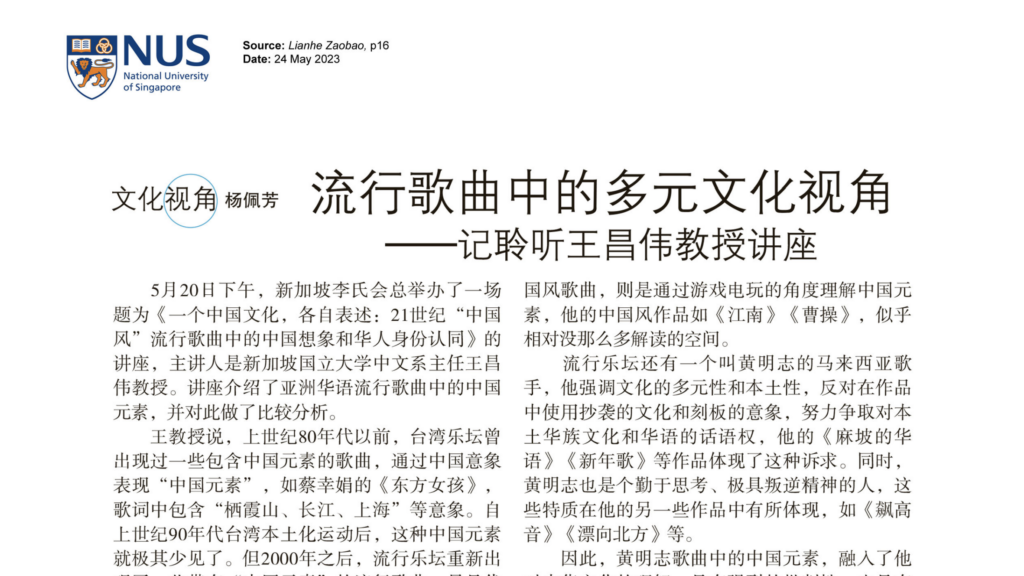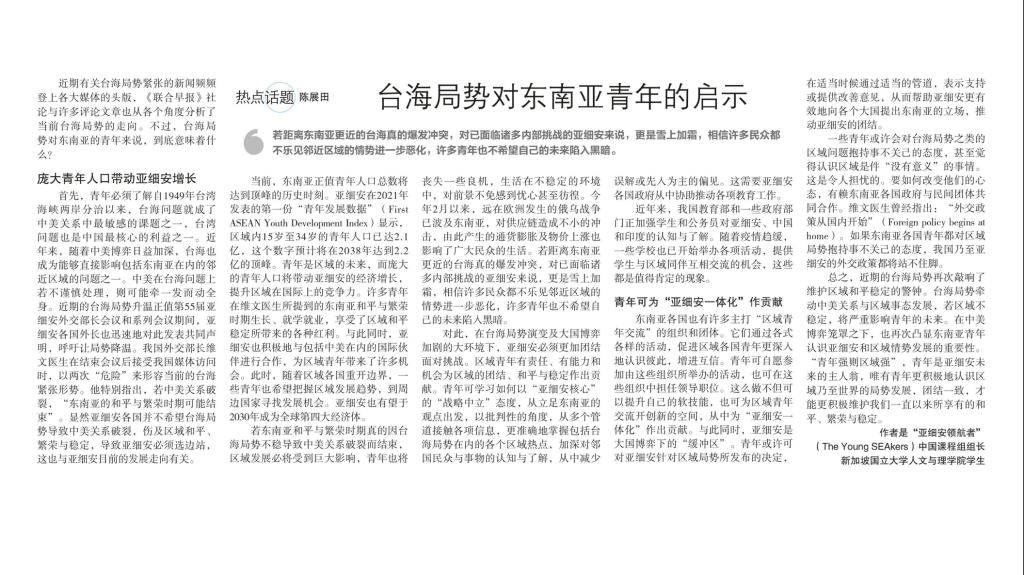News
NUS Cares: From campus to community, making a world of difference
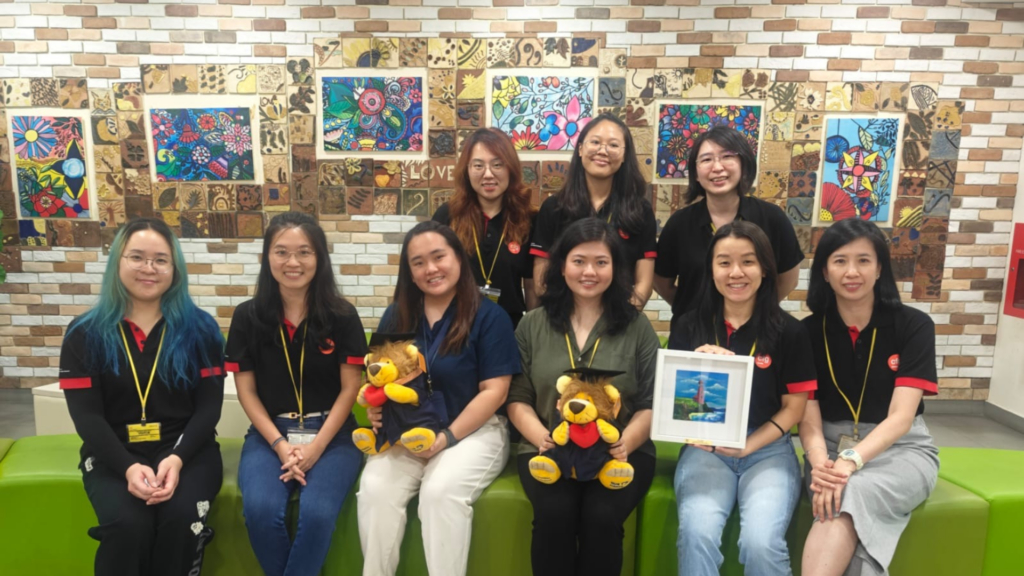
Guided by a shared commitment to giving back, NUS Cares brings together the NUS community to champion and volunteer in meaningful initiatives that benefit society. In December 2025, this spirit of service saw several staff and students engage with youths of the Ministry of Social and Family Development (MSF)'s Youth Homes - Singapore Girls' Home and Singapore Boys' Home.
At the Singapore Girls' Home, a lively workshop led by the NUS Centre for Future-ready Graduates (CFG) on 1 December 2025 sparked excitement and self-discovery among youth participants. Youths confidently shared their career aspirations, creating a powerful atmosphere of mutual support as they celebrated each other's unique strengths. The momentum continued with a dynamic card-sorting game that introduced them to a diverse range of industries and roles. The highlight of the session was the Spaghetti Marshmallow Challenge as teams raced against the clock, collaborating intensely to construct towering structures from spaghetti strands and masking tape within 20 minutes, a test of their collective problem-solving skills. Rounding up the session, guest speaker Genevieve Toh, Chief Marketing Officer and co-founder of FlyORO, shared how she built her professional presence and overcame adversities to forge a path in the sustainable aviation fuel space.
Later in the month on 22 December 2025, NUS Red Cross Youth (RCY) partnered with Singapore Red Cross and the Singapore Boys' Home to deliver a cardiopulmonary resuscitation (CPR) and automated external defibrillator (AED) certification course for 19 youths. Combining hands-on life-saving skills training with activities like Human Bingo and relay challenges, the programme fostered camaraderie between the youths and NUS student volunteers. Practical emergency response training and positive community engagement empowered youths and eased their integration into society.
Student organiser and second-year student from NUS Business School, Yeo Zi Chao, shared, "It was very heartening to see the boys actively participating in the activities. Their enthusiasm reminded us of the importance of our work and why we do what we do. It's a privilege to support their journey back into the community."
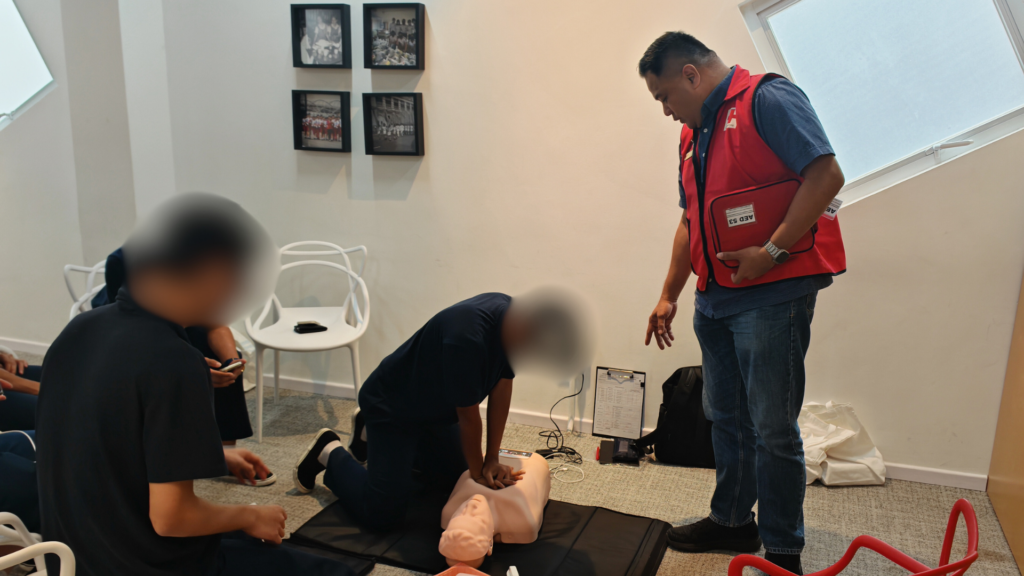
On 23 December 2025, the National University of Singapore Students' Union's (NUSSU) Alumni Relations and Community Engagement Unit (ARCEU) brought their passion for sports to the Singapore Boys' Home through a dynamic Sports Day. Leveraging their own athletic backgrounds, ARCEU members initiated a series of fun sporting activities which was warmly received by the sports-loving youths. After lively icebreakers, the sports hall was abuzz with team-based games. Students and youths teamed up, working up a sweat as they passed the ball back and forth in a game of captain's ball, erupting into jubilant cheers as the occasional lucky lob landed cleanly in a receiver's hands. The atmosphere grew livelier when the youths spontaneously challenged the students to a friendly dodgeball match. This match was a highlight of the day, bringing much laughter and exhilarating camaraderie that echoed through the sports hall.
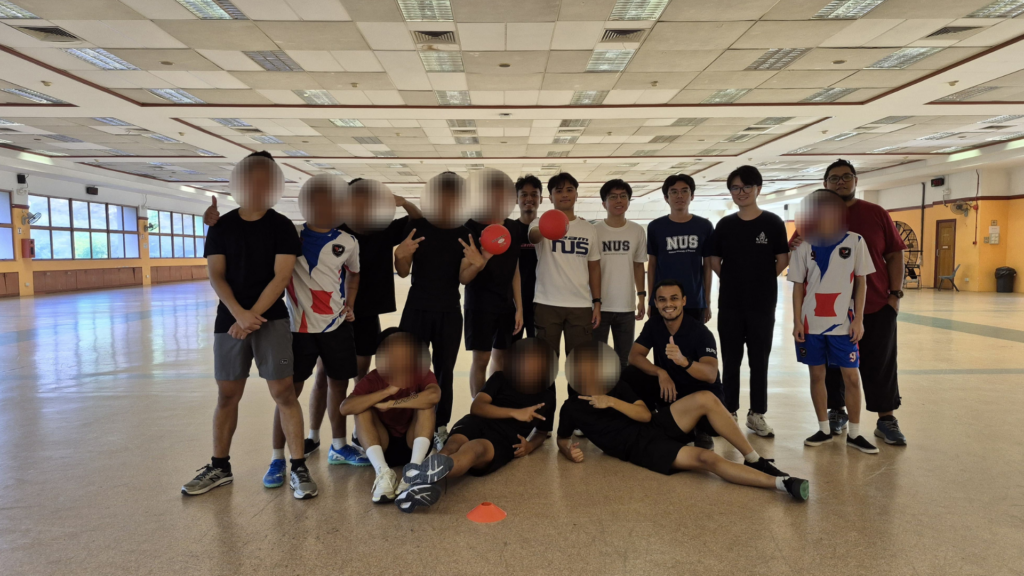
Ng Zu Hui, Director of ARCEU and third-year student from the Faculty of Arts and Social Sciences, shared, "Beyond the fun and games, this Sports Day reminded us of the importance of valuing the youths as individuals and building genuine connections through shared experiences. NUSSU is glad to champion this initiative as part of our efforts to give back to the community during the holiday period. We are very thankful to NUS Cares for their support, and grateful to the Singapore Boys' Home youths and staff, as well as the volunteers, for coming together to make the day meaningful for everyone involved."
As Singapore's flagship university, NUS is committed to advancing higher education with purpose, responsibility and long-term impact. As a new year and semester begin, these shared experiences sparked a renewed passion within the NUS community to continue reaching out beyond our campus, harnessing our diverse skills to better support the needs of our local community.
This story first appeared in NUSnews on 20 January 2026.
𝗘𝗩𝗘𝗡𝗧 | 𝗦𝗶𝗻𝗴𝗮𝗽𝗼𝗿𝗲 𝗛𝗲𝗿𝗶𝘁𝗮𝗴𝗲 𝗥𝗼𝘂𝗻𝗱𝘁𝗮𝗯𝗹𝗲 | 𝟭𝟭 𝗡𝗼𝘃, 𝟯:𝟱𝟬-𝟲:𝟬𝟬 𝗽𝗺
𝗘𝗩𝗘𝗡𝗧 | 𝗚𝗼𝗱𝘀 𝗼𝗻 𝗘𝗮𝗿𝘁𝗵: 𝗘𝘃𝗲𝗿𝘆𝗱𝗮𝘆 𝗦𝗮𝗰𝗿𝗲𝗱 𝗶𝗻 𝗮 𝗚𝗹𝗼𝗯𝗮𝗹 𝗖𝗶𝘁𝘆 & 𝗖𝗵𝗶𝗻𝗲𝘀𝗲 𝗩𝗲𝗿𝗻𝗮𝗰𝘂𝗹𝗮𝗿 𝗦𝗵𝗿𝗶𝗻𝗲𝘀 𝗶𝗻 𝗦𝗶𝗻𝗴𝗮𝗽𝗼𝗿𝗲 - 𝗦𝗰𝗿𝗲𝗲𝗻𝗶𝗻𝗴 & 𝗣𝗮𝗻𝗲𝗹 𝗗𝗶𝘀𝗰𝘂𝘀𝘀𝗶𝗼𝗻 𝗼𝗳 𝗙𝗶𝗹𝗺 & 𝗕𝗼𝗼𝗸 | 𝟰 𝗡𝗼𝘃, 𝟰-𝟲 𝗽𝗺
Funding support for Southeast Asian scholars: Chiang Ching-kuo Foundation to set up Chinese studies centre at NUS
IN BRIEF | 10 min read
- A major new Southeast Asia centre for Chinese Studies is set to launch at the National University of Singapore in collaboration with the Chiang Ching-kuo Foundation.
Click through image below to read this piece.
This story first appeared in Lianhe Zaobao and on NUSNews on 2 September 2025.
The Black Box of Power and Populist Feminism
IN BRIEF | 10 min read
- By Chen Jiani, a Master's student from NUS Chinese Studies.
Click through image below to read this piece.
This story first appeared in Lianhe Zaobao and on NUSNews on 27 August 2025.
Ngee Ann Polytechnic to collaborate with NUS Chinese Department to assist students in taking university courses during the holidays
Click through image below to read this piece.
This story first appeared in NUSNews and Lianhe Zaobao on 2 August 2025.
Five Arts and Social Sciences alumni honoured for their service and contributions to society

Five stellar alumni from the NUS Faculty of Arts and Social Sciences (FASS) were lauded with the FASS Distinguished Arts and Social Sciences Alumni Awards (DASSAA) on 10 July 2025 for their outstanding service and contributions to society.
Established in 2015, the DASSAA celebrates alumni who have made a meaningful impact on the University, the wider community, and Singapore, or who have advanced the arts and social sciences through their dedication and achievements locally or internationally.
This year's honourees are culinary curator and chef Ms Violet Oon; diplomat and former politician Mr Sam Tan Chin Siong; diplomat, Brigadier-General (Retd) and respected community leader Mr Ishak Ismail, pioneering social worker and advocate Dr Sudha Nair; as well as academic and innovator in education, Professor Low Ee Ling.
Changemakers shaping the aspirations of the next generation of FASS mindsFASS Dean Professor Lionel Wee underscored how the Faculty has long stood as a beacon of intellectual curiosity, cultural advancement, and social responsibility and that the vision has "always been to nurture not only thinkers and creators, but also compassionate leaders who use their knowledge for the greater good."
These recipients, he added, inspire current and future students not only to dream boldly but also to use their knowledge in the service of others. "In a time when the world needs thoughtful leadership more than ever, your examples inspire others. Your journeys remind us that success is not just measured by personal accolades, but by the positive impact we create in the lives of others," he said.
The event featured videos of the award recipients reflecting on their university days as they shared key moments in their professional journeys.
Mr Ishak fondly recalled his time at NUS, where he bonded with fellow Sheares Hall hostelites over sports and activities, and spent long hours studying with friends in the library after classes. It was also at NUS that he met his life partner.
When asked how her FASS education had shaped her career, Ms Oon shared that studying sociology and political science made a "world of difference" in how she approached food heritage and culture.
"So I don't interpret food as delicious or not - that is a given," she said. "What matters is what does it mean to a people? How do you judge the food? You have to learn about the culture and the proper techniques of cooking. That comes from studying, from checking. And if you take a subject like sociology, everything is based on facts and on research - I think that is so important."
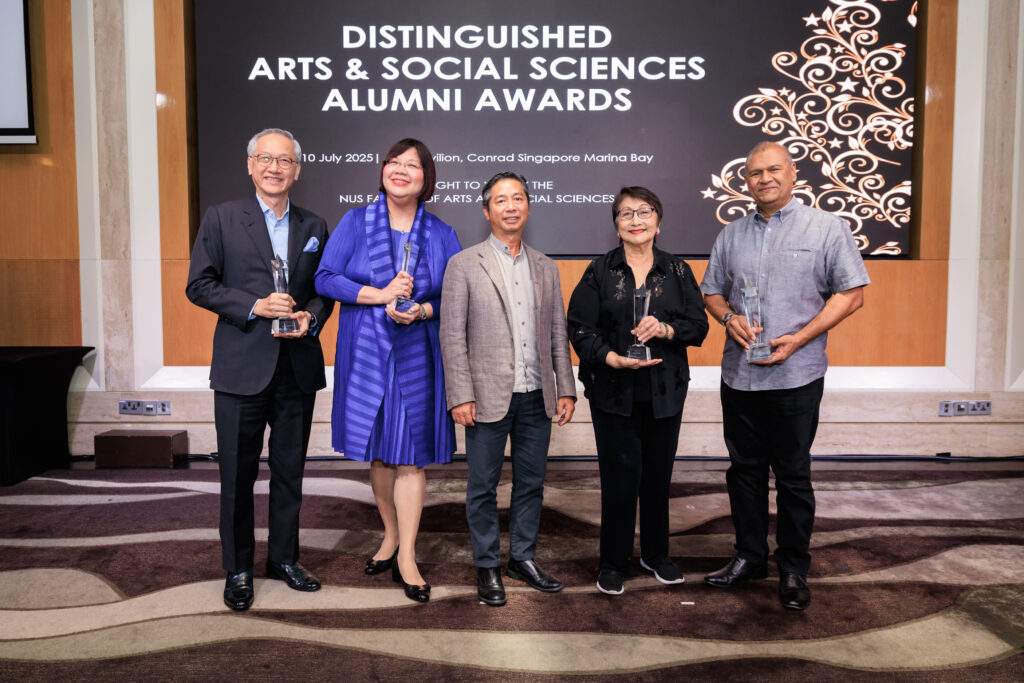
From food heritage to public leadership: FASS Alumni who left their mark on Singapore society
This year's award recipients have left their mark in areas ranging from Peranakan cuisine and diplomacy to family violence intervention and academic leadership.
Widely regarded as the grande dame of Singaporean cooking, Ms Oon began her career as an arts and music critic before pioneering a food column that launched her decades-long career as Singapore's leading food writer. She opened her first Peranakan restaurant in 1993, and today, the "Violet Oon Singapore" restaurant group is synonymous with heritage cuisine, with iconic outlets like Violet Oon Singapore at Jewel Changi Airport. As Singapore's food ambassador, she led national chef delegations at international culinary festivals and her accolades include being inducted into the Singapore Women's Hall of Fame (2016) and receiving the Singapore Tourism Board's Lifetime Achievement Award (2019).
Mr Tan is Singapore's Special Envoy for Arctic Affairs and Non-Resident High Commissioner to Canada. He has built a distinguished career in public service, diplomacy, and civic leadership. From 2009 to 2020, he served as Senior Parliamentary Secretary and Minister of State in several ministries, including the Ministry of Foreign Affairs and the Ministry of Culture, Community and Youth. He was also a Member of Parliament from 2006 to 2020. Mr Tan held key community and cultural leadership roles, including CEO of Business China (2007 to 2009), where he strengthened Singapore-China ties. For his longstanding service, he was awarded the Public Service Medal in 2002.
Mr Ishak served in the Singapore Armed Forces (SAF) for over 29 years, rising to the rank of Brigadier-General and playing a pivotal role in transforming SAF's training systems and leadership development. He later held senior roles in private firms that focused on defence solutions and regional growth. He is now Singapore's Non-Resident High Commissioner to Pakistan, and chairs both the Families for Life Council and the National Maritime Safety at Sea Council. He is also Principal Consultant at i-Grow Partners Pte Ltd, where he has been a certified coach appointed by the SAF to facilitate team leadership and development since 2016. He received the Public Administration Medal (Military) in 2008 and the Public Service Medal in 2023.
A social work veteran for over 30 years, Dr Nair began her career in 1987 at the Ang Mo Kio Family Service Centre (FSC), transforming it in 17 years into a model for other FSCs to follow. In 1999, she co-founded the Centre for Promoting Alternatives to Violence (PAVE), Singapore's first one-stop specialist centre for family violence, which now manages around 2,000 cases annually. Beyond frontline work, Dr Nair has nurtured future social workers through research and teaching at the NUS Department of Social Work, and has served on national bodies such as the Council of Presidential Advisers. Her many accolades include the Outstanding Social Worker Award (1998) and the Public Service Star (2022).
Prof Low is President's Chair Professor in Education (Applied Linguistics and Teacher Education) and Dean of Academic and Faculty Affairs at the National Institute of Education (NIE), Nanyang Technological University. A leading voice in teacher education, applied linguistics, and educational policy, she has shaped NIE's strategic directions through initiatives like "A Teacher Education Model for the 21st Century. For her dedication, she received the Public Administration Medal (Bronze) in 2012. Internationally, she was recognised for her exemplary scholarship by the Academy for Leadership in Teacher Education (ALiTE) at the University of Hong Kong in 2021, and has been selected as the President-Elect of the International Academy of Education (IAE) in 2024.
The recipients were presented with their awards at a simple ceremony at Conrad Singapore Marina Bay. Joining to celebrate the occasion with them were 56 family and friends of the honourees, as well as FASS staff and faculty.
Click here for more information on the award recipients.
This story first appeared on NUSNews on 11 July 2025.
First volume of the series focuses on the history of TCM development in Singapore
IN BRIEF | 10 min read
- NUS Chinese Studies has collaborated with the National Taiwan University Press to launch the "Overseas Chinese Academic Series" to jointly promote the diversified development of Chinese language and Sinology studies. The first monograph, published at the end of May this year, focuses on the historical development of traditional Chinese medicine in the local area..
Click through image below to read this piece.
This story first appeared in Lianhe Zaobao and on NUSNews on 2 June 2025.
Chinese Media Group collaborates with NUS and Tsinghua University to offer minor courses
IN BRIEF | 10 min read
- In order to cultivate local Chinese media talents, the New Press Media Chinese media group is collaborating with NUS and Tsinghua University to offer the minor in Chinese Media at NUS Chinese Studies.
Click through image below to read this piece.

This story first appeared in Lianhe Zaobao on 16 January 2025.
Mala Chongqing and Modernisation
IN BRIEF | 10 min read
- By Tan Zhan Tiam, a Year 3 student from NUS Chinese Studies and NUS Political Science.
Click through image below to read this piece.
This story first appeared in Lianhe Zaobao and NUSNews on 5 October 2024.
Revered Song Nian’s work returns to NUS Department of Chinese Studies
IN BRIEF | 10 min read
- A report in Lianhe Zaobao (25 September 2024, Fukan, p3).
Click through image below to read this piece.
This story first appeared in Lianhe Zaobao and NUSNews on 25 September 2024.
Mid-Autumn Festival in Singapore is More Lively than in my Hometown
IN BRIEF | 10 min read
- By Wu Yuke, Master's degree student from NUS Chinese Studies.
Click through image below to read this piece.
This story first appeared in Lianhe Zaobao and NUSNews on 12 September 2024.
NUS Department of Chinese Studies receives gift from Tigillus Foundation, establishes two new professorships in support of teaching and research
IN BRIEF | 10 min read
- Coverage of announcement in Lianhe Zaobao (3 September 2024, News, p6).
Click through image below to read this piece.
This story first appeared on Lianhe Zaobao and NUSNews on 3 September 2024.
The Selected Secondary Schools Seedling Programme sets up an on online database to collect 20 years of participating papers
IN BRIEF | 10 min read
- News feature in Lianhe Zaobao on an outreach project by NUS Chinese Studies.
Click through image below to read this piece.
This story first appeared in Lianhe Zaobao and NUSNews on 2 September 2024.
Two New Professorships Established at the NUS Department of Chinese Studies
IN BRIEF | 10 min read
- A generous gift from Tigillus Foundation will expand research and teaching in Chinese language, history and culture.
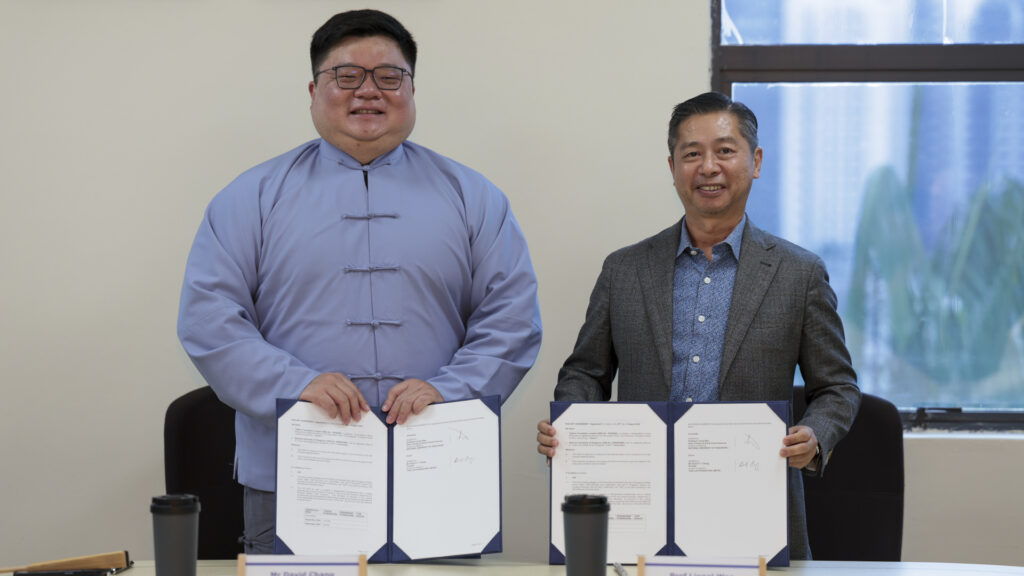
The Department of Chinese Studies at the NUS Faculty of Arts and Social Sciences (FASS) has received a gift from Tigillus Foundation to establish the David H.Y. Chang Visiting Professorship in Chinese Studies and David H.Y. Chang Distinguished Professorship in Chinese Studies in support of research and teaching of Chinese language, history and culture at the University.
Both Professorships will attract top scholars in the field. Aside from leading research and fostering international collaboration from an academic perspective, appointed professors will also teach graduate and undergraduate courses on Chinese language, history and culture. The search for candidates for both professorships will begin in 2025.
NUS President Professor Tan Eng Chye witnessed the gift agreement signing ceremony that was held at FASS on 30 August 2024. The signatories were Mr David H. Y. Chang, Founder of Tigillus Foundation and Professor Lionel Wee, Dean of FASS.
Professor Ong Chang Woei, Head of the NUS Department of Chinese Studies said, "The Chinese play a major role in shaping China and the world today. Having prominent named professorships that seek to acknowledge the contribution of distinguished scholars who have dedicated their careers to the study of the language, history and culture of the Chinese people not only in China but also around the world would help to create awareness regarding the importance of Chinese culture as a component of world civilisations in universities and beyond."
The Tigillus Foundation aims to foster mutual understanding between China and the rest of the world through arts, culture and education in the region and worldwide. These include the curation and exhibition of the Chang family's art collection in international galleries, sponsoring and hosting international philanthropic events that focus on Chinese culture in areas ranging from fine arts to performing arts, as well as endowing professorships and fellowships across the region to promote the study of Chinese history and the world.
Mr Chang shared, "My interactions with NUS have been nothing short of humbling, which speaks volumes of the incredible progress that this institution has made since its inception. In these times of breakneck speed in technological advancement coupled with the highest geopolitical tension since the end of the Cold War, Singapore can and must play a critical role in stabilising both the region and the Sino-Western relations at large. I hope the endowed professorships will attract the best talent to lead Chinese studies in Singapore and also welcome those from China and the West to come as visiting professors to offer an invaluable perspective from their respective home countries."
"As the leading institution for higher learning in Singapore, NUS is responsible for educating the future leaders of this country. It is my sincere hope that these modest donations will elevate the study for the university and the nation for its future role in the Asia-Pacific region."
From its origins in 1953 as the former University of Singapore's Department of Chinese Studies, the FASS Department of Chinese Studies has grown to be recognised as one of the leading institutions in the field of Chinese studies and Chinese language globally, as well as a major centre in the Southeast Asian region.
Last year, the Department celebrated its 70th anniversary with a series of conferences that covered critical issues such as the future of Chinese language education in Singapore and the significance of diasporic and local Chinese popular culture, as well as more in-depth seminars on Chinese linguistics and translation studies, classical Chinese literature, and Chinese social and intellectual history.
This story first appeared on NUSnews on 31 August 2024.
Cyber Peace is Equally Important
IN BRIEF | 10 min read
- By Bao Rong, student from NUS Communications and New Media and NUS Chinese Studies.
Click through image below to read this piece.
This story first appeared in Lianhe Zaobao and NUSNews on 20 July 2024.
NUS Open House 2024 Attracts more than 8.4m visitors as Screens and Campuses Buzz with Action
IN BRIEF | 10 min read
- Open House 2024 returned to an enthusiastic reception as visitors turned up in force to experience one of NUS' largest events of the year. Held in a hybrid format from 2 to 9 March 2024 and pulled together by the efforts of 2,674 faculty, staff, students and alumni, the event attracted more than 8.4 million visitors - up from 7.7 million in 2023 - as they explored the comprehensive showcase of what NUS has to offer both online and in-person.

Open House 2024 returned to an enthusiastic reception as visitors turned up in force to experience one of NUS' largest events of the year. Held in a hybrid format from 2 to 9 March 2024 and pulled together by the efforts of 2,674 faculty, staff, students and alumni, the event attracted more than 8.4 million visitors - up from 7.7 million in 2023 - as they explored the comprehensive showcase of what NUS has to offer both online and in-person.
Kicking off the eight action-packed days was a slate of engaging virtual talks, webinars, and social media sessions. NUS Business School put together an informative line-up of virtual sessions featuring an Ask-Me-Anything session with its Vice Dean Associate Prof Chng Chee Kiong, an overview of the various majors with insights from faculty and students alike, and a glimpse of its vibrant student life via the Bizad Club.
At the online showcase by NUS Computing, prospective students joined a Discord live chat to get their questions answered by professors and student ambassadors on topics such as the differences between the school's five degree programmes. During a Zoom session by NUS Global, they heard about the University's exciting study abroad opportunities from students who embarked on exchange programmes with universities in Scotland, Canada, Switzerland and Hong Kong.
The on-campus segment on 9 March saw crowds throng the programme booths, talks, special classes, campus tours, student life performances and residential venues, with students gaining perspectives into all aspects of a world-class education at NUS, from the comprehensive curricula and career prospects to student life and global opportunities.
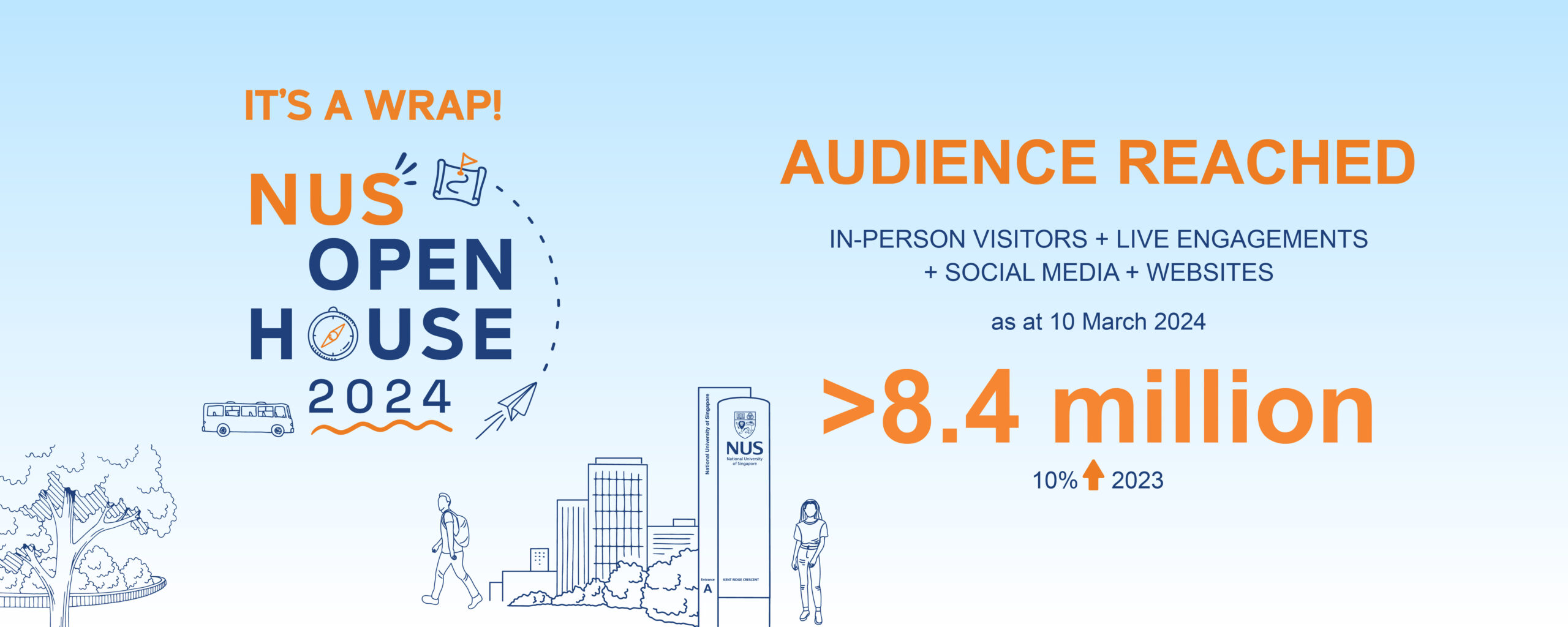
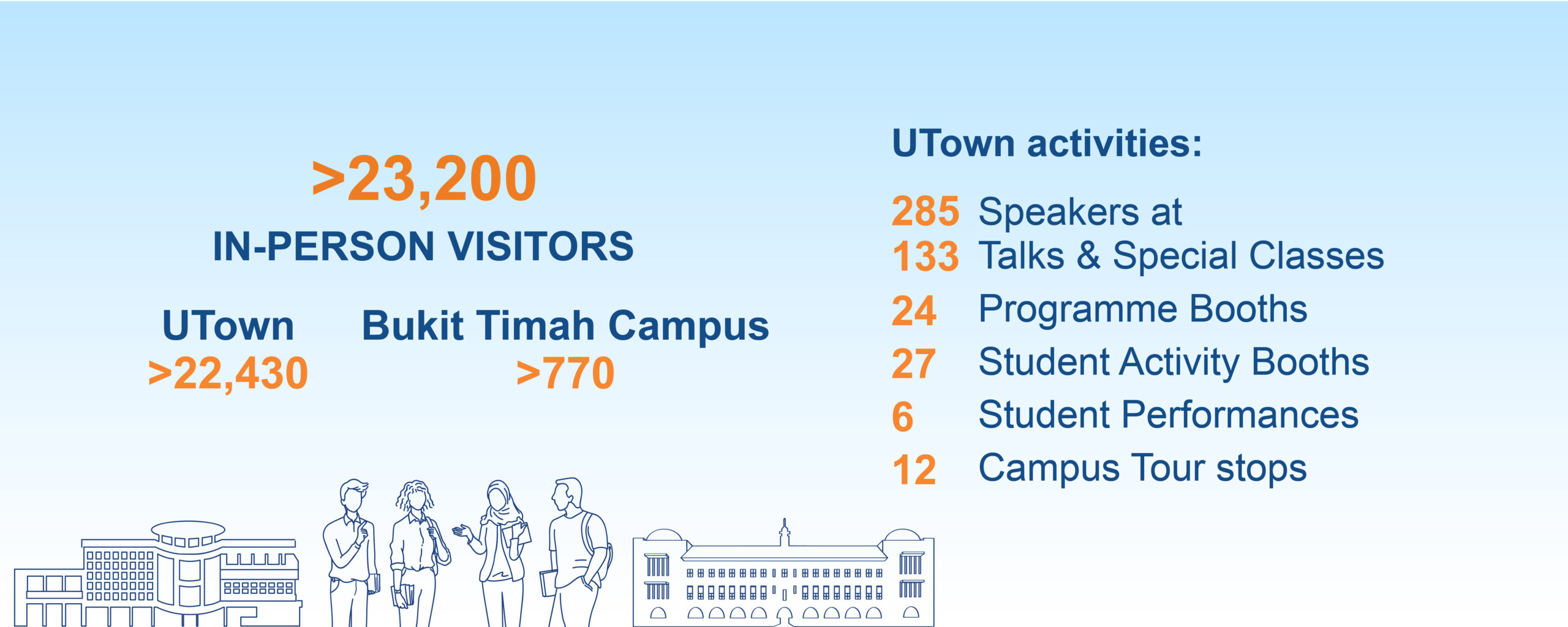


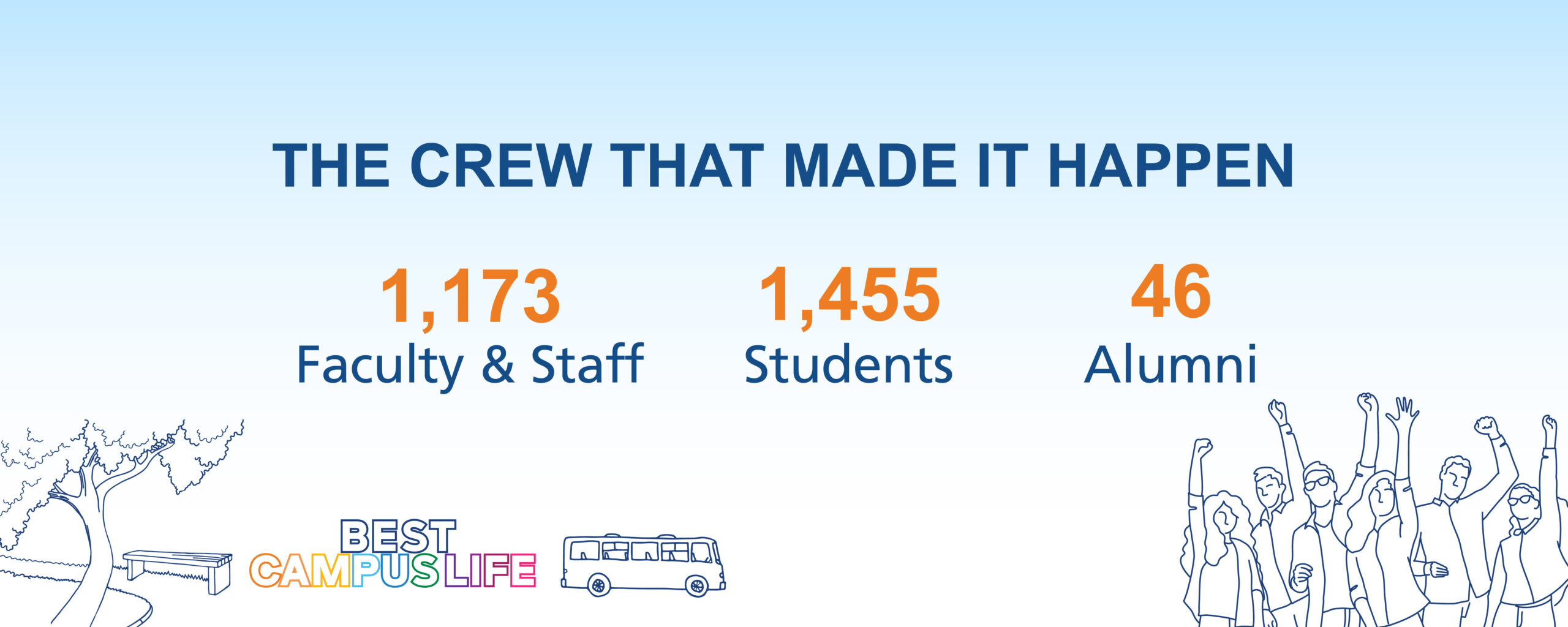 "The NUS Open House was an absolute delight! It provided me with invaluable insights into campus life and academic offerings," said prospective student Sim Wen Hao, who is currently in national service. "From informative discussions to first-hand testimonials, every interaction left me feeling more confident about my potential home away from home."
"The NUS Open House was an absolute delight! It provided me with invaluable insights into campus life and academic offerings," said prospective student Sim Wen Hao, who is currently in national service. "From informative discussions to first-hand testimonials, every interaction left me feeling more confident about my potential home away from home."
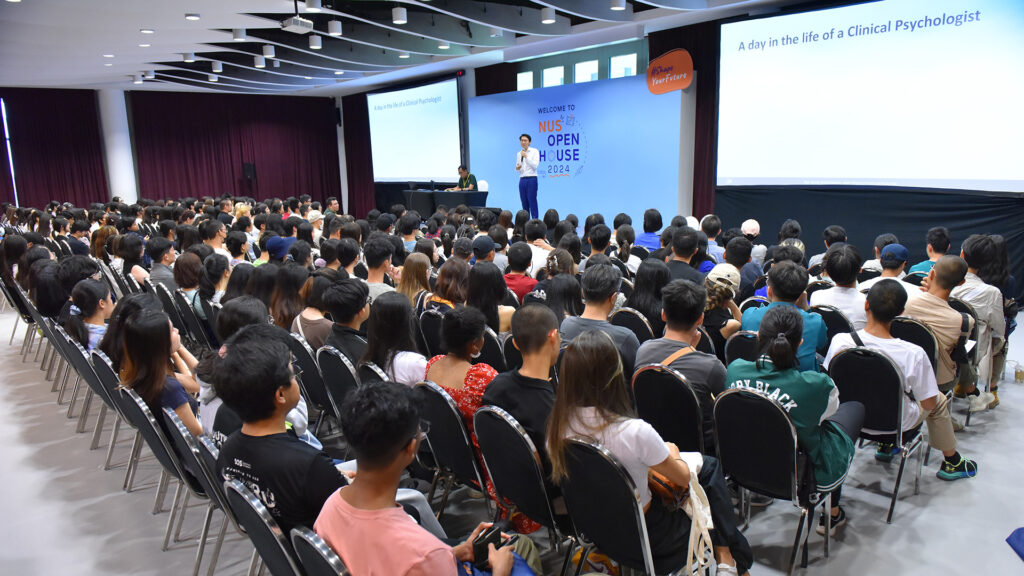
Charting pathways in humanities and sciences
The College of Humanities and Sciences (CHS), comprising the Faculty of Arts and Social Sciences (FASS) and the Faculty of Science (FOS), showcased how it is equipping students with skills to integrate knowledge across these domains and the wide range of programmes they can choose from through a variety of major and minor combinations.
An FASS panel featuring a Geography major, a Political Science major with a minor in Economics, a Philosophy major pursuing a Double Degree, and a Southeast Asian Studies major taking a minor in History dispelled misconceptions about their disciplines while discussing the potential career paths. Another joint talk by Psychology and Social Work on addressing mental health challenges in the 21st century explored how the issue is approached from their respective disciplines.

The boom in big data was the focus of the Data Science and Analytics talk that highlighted how the programme offers students industry exposure through real-world projects and internships. Another talk by the Environmental Studies Cross-Disciplinary Programme discussed its mission to develop environmental sustainability advocates keen to derive creative solutions to complex problems, along with its exciting fieldwork opportunities.
Lee Sue Ning, a Hwa Chong graduate who is interested in applying to Psychology, said of the FASS student panel: "The four students were from courses that I would never have considered. Hearing their experiences opened new doors for me, making me consider these courses as possible minors that I can take," she added.
Intersection of design and engineering
The talk on Chemical Engineering, Materials Science and Engineering, and Biomedical Engineering, held by the College of Design and Engineering (CDE) gave students valuable insights on the curriculum and disciplines, as well as showcased students' research. In an Ask-Me-Anything panel, the professors also shared about the flexibility of the curriculum, future career prospects, intersections between the various fields of engineering, and their thoughts on the most challenging yet rewarding aspects of taking a degree in Engineering.
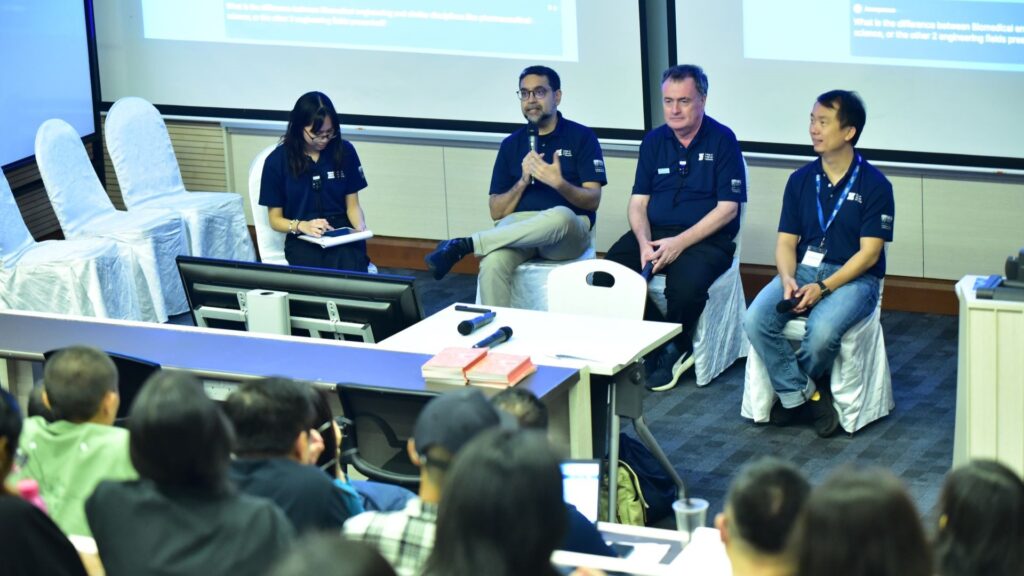
The talk on Architecture, Industrial Design, and Landscape Architecture gave students the inside scoop on how the programmes provide the core foundation, training, skills, and knowledge for students to become the next generation of effective and innovative architects and designers.

Over at SDE3, CDE's Built Environment Research Tour took participants behind the scenes-from live demonstrations of how 5G robotics reduce manpower and increase efficiency, to a lab tour of NUS' hydraulics laboratory facilities to explore wave mechanics and how natural coastal ecosystems like mangroves can protect shorelines against climate change. Students also participated in a hands-on session to design their own shoreline adaptation, choosing from models of nature-based solutions as well as traditional infrastructure.
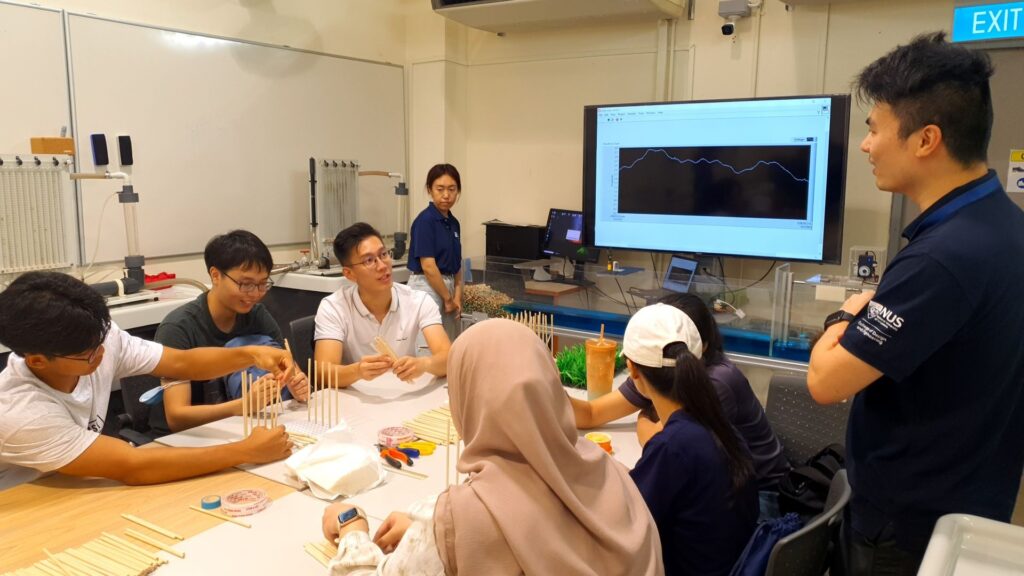
"It was nice to be able to see the facilities and get an idea about what Singapore is currently trying to improve on-designing a world with humans and robots, and coastal protection," Nur Annatasyia Binte Joferi, from Singapore Polytechnic, said. "It made me think about how things will progress and what comes next after those goals are met."
Immersive learning experiences
NUS College offered prospective students a window into its extensive interdisciplinary education that blends small-group seminars with experiential learning and a rich residential immersion through special classes on topics such as love, food, and even Shakespeare's plays. During Dr Chan Chi Wang's class on quantifying facial attractiveness using mathematics and statistical methods, prospective students busily plotted measurements of facial features on graph paper. In Associate Professor Stuart Derbyshire's class, they decoded mysterious sounds and intriguing illusions - sometimes with the aid of 3D glasses - understanding the science behind brain mechanisms that influence our perception.

Foo Jun Wei, a Hwa Chong Institution graduate who will be joining Computer Science and NUS College, came away with useful information on what to expect as an incoming NUS student. "I enjoyed taking part in the guided tour where I got to see first-hand the facilities and accommodations that NUS College provides, as well as the immersive sample lesson on quantifying facial attractiveness. Above all, I was glad to be able to clarify my existing doubts and seek advice from the friendly student ambassadors on the ground," he added.

Over at Bukit Timah Campus, visitors to NUS Law had the choice of two masterclasses on criminal justice and conflict resolution approaches. At its mock moot sessions, visitors sat attentively in the gallery witnessing a simulation of a court case.
Mastering the 'heart' and science of healthcare
Prospective students interested in Medicine, Dentistry, Nursing and Pharmacy had the chance to find out about the new Common Curriculum for Healthcare Professional Education, which has been designed to align with Singapore's shift towards preventive healthcare. Aside from touching on the Common Curriculum, talks by NUS Medicine offered an overview of its academic journey, highlighting features such as its strong mentorship support and Pathway programmes aimed at broadening their skill sets. During a special class by NUS Nursing, visitors tried out basic nursing skills like using a stethoscope and learnt the importance of collaboration between healthcare professionals.
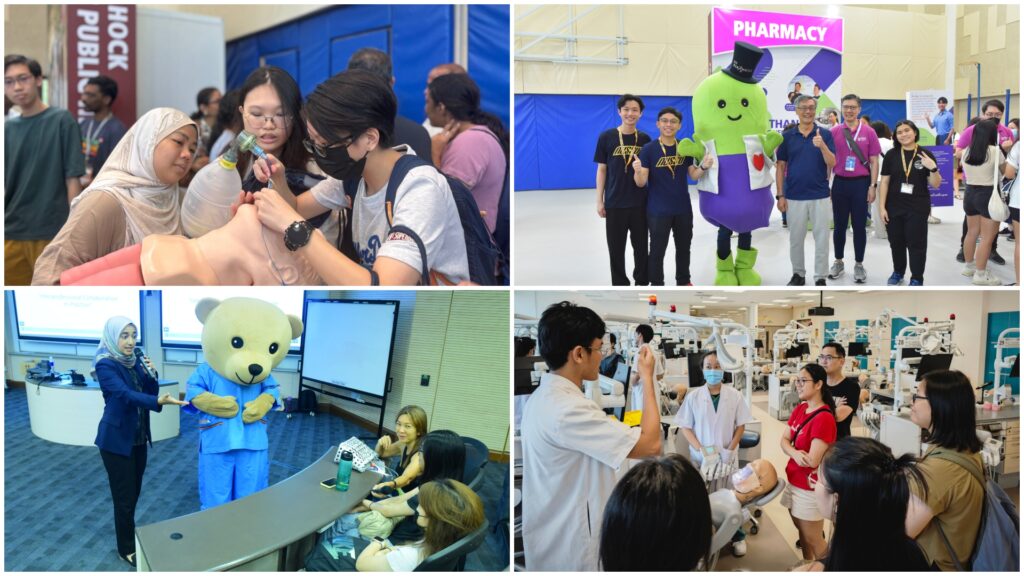
Prospective students interested in Medicine, Dentistry, Nursing and Pharmacy had the chance to find out about the new Common Curriculum for Healthcare Professional Education, which has been designed to align with Singapore's shift towards preventive healthcare. Aside from touching on the Common Curriculum, talks by NUS Medicine offered an overview of its academic journey, highlighting features such as its strong mentorship support and Pathway programmes aimed at broadening their skill sets. During a special class by NUS Nursing, visitors tried out basic nursing skills like using a stethoscope and learnt the importance of collaboration between healthcare professionals.
The interactive Pharmacy masterclass, titled "Unveiling the Pillars of Pharmacy: The Science and Art of Medication Therapy", saw prospective students participate in the decision-making process of a real-life clinical case study. They also gained insight into how NUS Pharmacy structures its curriculum to incorporate live interactive classes, science practicals, skills labs, and collaborative learning workshops, to help students apply concepts in real case studies.
Prospective student Wong Hon Wei from Anderson Serangoon Junior College said, "The Pharmacy masterclass was quite enjoyable yet unique, as the way the collaborative learning workshop was structured was engaging, incorporating the Biology and Chemistry concepts learnt in classrooms into real-world medical applications."
Innovating solutions for society and the world
Another popular feature at this year's Open House was the Innovation and Impact Hub, which showcased groundbreaking projects by students from CDE, Chua Thian Poh Community Leadership Centre, NUS College, and FOS that are making a tangible impact on society and the world.
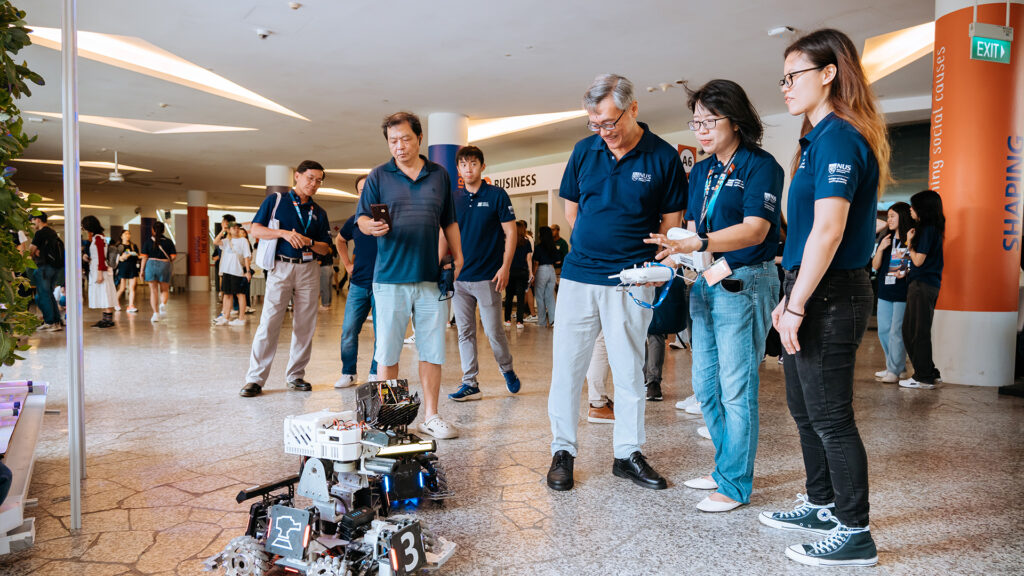
Visitors caught the interactive projects in action, from The Moving Farm, a movable modular tower system for hydroponics farming that increases crop yield sustainably, to TinkerThings, a project on AI-based gamified activities innovated to improve seniors' mental wellbeing and cognitive faculties.
Aside from exploring academic pathways, visitors also discovered NUS Enterprise's suite of entrepreneurship initiatives, including the NUS Overseas Colleges, NUS Enterprise Summer and Winter Programmes in Entrepreneurship, and incubation hub THE HANGAR.
At a panel session on student entrepreneurship, prospective students heard from NUS alumni who founded three start-ups - Pitchspot, Wateroam and Skilio. The founders shared how their involvement in Enterprise's entrepreneurship programmes and the support they received through the HANGAR enabled them to nurture their business ideas.
Exciting array of student and residential life activities
Over at the Student Village, a smorgasbord of vibrant student performances took Town Plaza by storm throughout the day, treating visitors to an exhilarating kaleidoscope of talent from student clubs and interest groups.
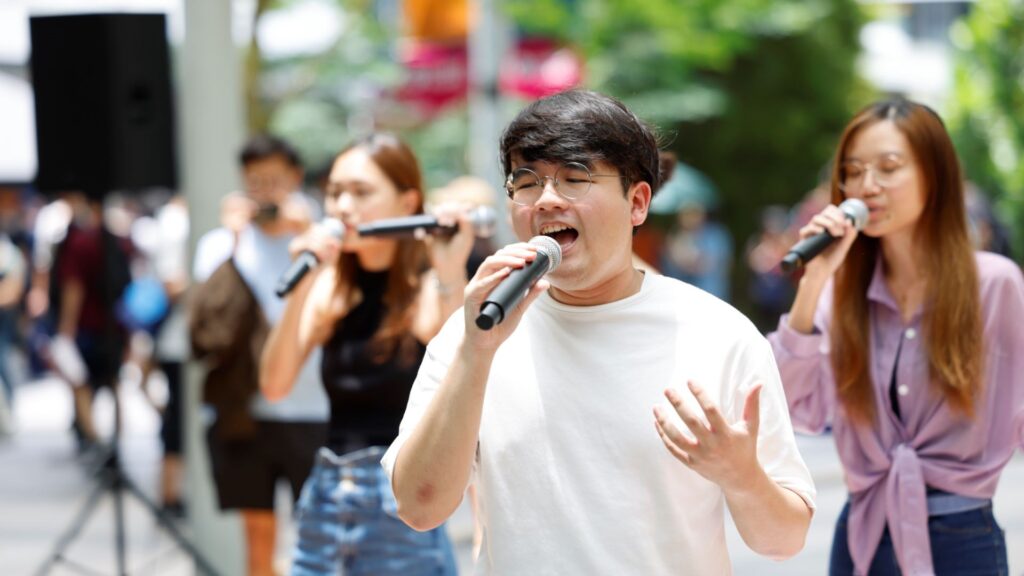
Getting a glimpse of the diverse student life opportunities that await, visitors were hyped up by the energetic cheerleading displays of King Edward VII Hall's KE Titans, the snazzy beats of NUS Rappers, and the slick dance moves of the NUS Korean Cultural Interest Group. They were also serenaded with catchy tunes from the Sheares Hall band, a capella group NUS Resonance, and NUS Fingerstyle Guitar.
On top of A-Day-in-the-Life videos and 360° virtual tours of the various Residential Colleges, Halls, and Houses, Masters and student representatives from the residences mingled with prospective students at the booths, talks, and Ask-Me-Anything panels, where they shared their insights and anecdotes on the on-campus experience, as well as the distinct culture of each residential unit.
Along with offering guided in-person tours and simulated classes, the residential units also showcased the interest groups available. Other engaging activities, such as Tembusu College's live performances and Ridge View Residential College's sports experience zones, coffee pour demonstrations, and warli art making gave prospective students a taste of the many facets of holistic residential life.
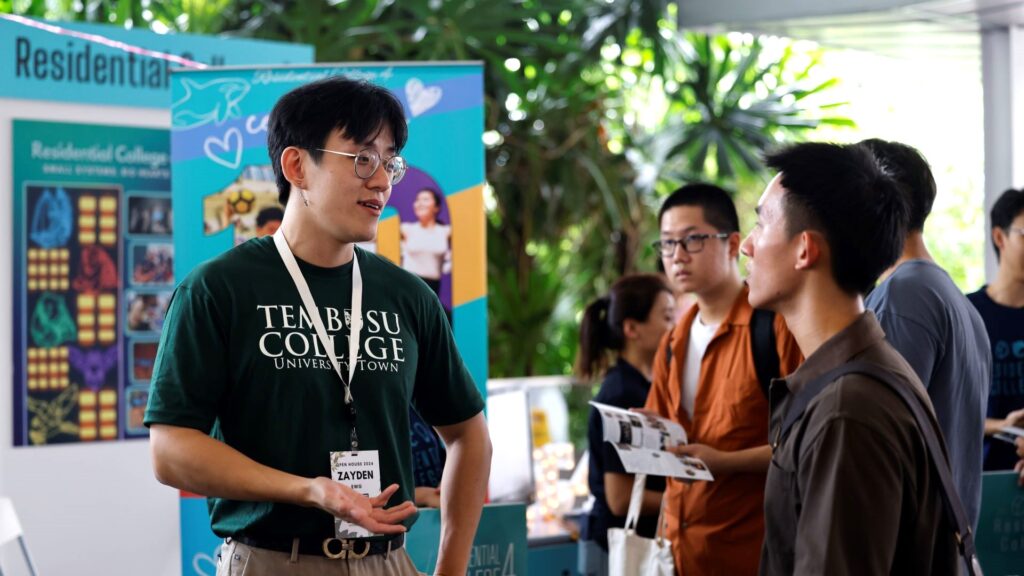
Prospective students Inez Ang from National Junior College and Vishnu Raj from Millennia Institute said the residential showcase gave them a better picture of living on campus.
Runyi Zhang, a graduate of St Andrew's Junior College who is applying to Business, said she had an enlightening experience sampling both the academic and extracurricular options. "Through the Open House, I've managed to capture a glimpse of student life in NUS… allowing me to have a clearer and more vivid image of what my future could be like here," she added.
This story first appeared in NUSNews on 14 March 2024.
How do Students from China Enjoy their Lunar New Year in Singapore?
IN BRIEF | 10 min read
- Xie Hening, a Master's student from the NUS Chinese Studies, considers the ways one of the larger groups of international students in Singapore makes the most of the Spring Festival away from home.
Click through image below to read this piece.
This article first appeared in Lianhe Zaobao and on NUSNews on 17 February 2024.
Historical Storyteller: I had an Amazing Year in 2023
IN BRIEF | 8 min read
- Historical storyteller, public speaker and guest lecturer Shawn Seah (NUS Economics and University Scholars Programme '10) was feted with three awards in 2023 - including an Outstanding Young Alumni Award during the prestigious NUS Alumni Awards event. He reveals what he found most challenging during the year.

A direct descendant of one of Singapore's most prominent pioneers, Seah Eu Chin, Mr Shawn Seah used to pass by streets named after members of his family, like Seah Street, Eu Chin Street, Liang Seah Street and Peck Seah Street.
His wonder at who they were turned into passion which he channelled into becoming an active storyteller of Singapore's history, especially the Seah family's stories.
Outside of his day job as a Deputy Director of Planning, Strategy and Data Analysis at NTUC's Employment and Employability Institute, the father of a three-year-old girl spends his weekends and public holidays working on his books. He has published over 10 books.
He also recounts his family history by giving talks at museums, libraries, and schools including NUS. Since 2019, he has been a guest lecturer for a module on Singapore Studies offered by the NUS Department of Chinese Studies.
How do you manage to do so much in so little time?
I have many more stories that I would love to research and write about, but I have to strike a balance between my work - which is important to me and takes up the majority of my time - my family, and my heritage hobby. It is not easy and striking a harmonious balance has been a longstanding challenge.

But I have also learnt that with determination and focus, we can achieve any goal we set our minds to. It is a testament to the potential within each of us to overcome challenges and turn aspirations into reality.
What was your biggest challenge in 2023?
The most memorable challenge centred around the launch of Our Amazing Pioneers, my first children's book series, which is a departure from my usual narrative nonfiction writing around family history and community stories.
Writing for children requires a delicate balance of education and entertainment, or 'edu-tainment' as I like to term it. Challenges lay in simplifying complex historical concepts and technical language without compromising substance.
Why do you say 2023 was an amazing year for you?
There were many major highlights other than launching Our Amazing Pioneers. One was receiving the Outstanding Young Alumni award at NUS Alumni Awards 2023, which affirms my efforts to continue inspiring Singaporeans to explore their roots, find out more about their family stories, and be more aware of Singapore's history.
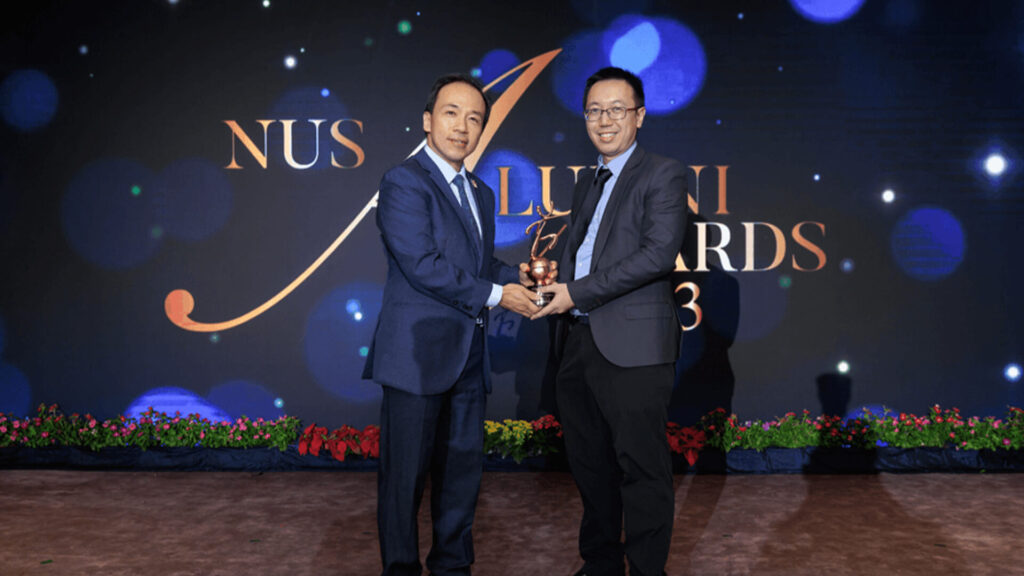
My contributions during the challenging COVID-19 pandemic were recognised with the Commendation Medal and COVID-19 Resilience Medal. I am grateful to have had the opportunity to make a small difference to the lives of migrant workers, who build our Singapore.
In essence, 2023 was a most memorable year, marked by personal and professional milestones on my life's journey.
What are you most grateful for?
My family and friends, especially from the heritage community, and also the NUS professors and lecturers especially Professor Wong Sin Kiong (Affiliate Alumnus '19) from the Arts and Social Sciences faculty's Department of Chinese Studies, who has been incredibly kind to me. What excites you about 2024?
I plan to strengthen my leadership abilities and communication skills, growing and improving my writing, editing, and speaking. One should always be learning and one can always get better.
I also intend to develop new, creative, and innovative approaches to promote local family history and community stories, increasing accessibility to both the young and the young-at-heart.
This story first appeared in the AlumNUS on 1 January 2024. Text by Wong Sher Maine. Photos courtesy of Shawn Seah.
Don’t Let a Good Thing Go Bad
IN BRIEF | 10 min read
- An Op-Ed in Lianhe Zaobao by Wu Yuke, a Master's degree student from NUS Chinese Studies.
Click through image below to read this piece.
This article first appeared in Lianhe Zaobao and on NUSNews on 5 February 2024.
Elections and Youth
IN BRIEF | 10 min read
- A column in Lianhe Zaobao by Chen Zhan Tian, an undergraduate student from NUS Political Science and NUS Chinese Studies.
Click through image below to read this piece.
This article first appeared in Lianhe Zaobao and on NUSNews on 30 January 2024.
It’s not Just Culture that is Lost in a Monolingual Society
IN BRIEF | 10 min read
- A column in Lianhe Zaobao by Huang Jiaqi, a student from NUS Chinese Studies.
Click through image below to read this piece.
This article first appeared on Lianhe Zaobao and on NUSNews on 16 January 2024.
NUS Department of Chinese Studies’ Academic Seminar to Promote the Study of Sinology in Southeast Asia
IN BRIEF | 10 min read
- Topping off last year's series of activities in celebration of its 70th anniversary, NUS Chinese Studies held - on 1 and 2 December 2023 - an academic symposium hosting well-known scholars from across the region, including those from Malaysia, Thailand, Brunei, Vietnam, Philippines and Indonesia, who came to discuss their research and future plans in the study of Sinology.
Click through image below to read this piece.
This article first appeared on Lianhe Zaobao and on NUSNews on 10 January 2024.
Bringing the Common Good Closer Together
IN BRIEF | 10 min read
- Column in Lianhe Zaobao by Huang Jiaqi, an undergraduate student from NUS Chinese Studies.
Click through image below to read this piece.
This article first appeared on Lianhe Zaobao and NUSNews on 23 December 2023.
Why do Young People Prefer Halloween?
IN BRIEF | 5 min read
- A column piece by Wu Yu Ke, a Master’s degree student at NUS Chinese Studies, in Lianhe Zaobao (2 November 2023).
Click through image below to read this piece.
This article first appeared on Lianhe Zaobao and in NUSNews on 2 November 2023.
The ‘Displeasure’ of Political Leaders and the Scale of Criticism of Current Affairs
IN BRIEF | 5 min read
- An Op-Ed by Prof Ong Chang Woei, Head of NUS Chinese Studies in Lianhe Zaobao (2 November 2023).
Click through image below to read this piece.
This article first appeared on Lianhe Zaobao and in NUSNews on 2 November 2023.
“Now everyone is uncle or auntie”: Chinese naming tradition showing generational ties fading
Chinese naming practices have been dwindling over the years, according to experts. Specifically, the practice of generational naming, or bei ming, has become more seldom in young Chinese Singaporeans. In ‘“Now everyone is uncle or auntie”: Chinese naming tradition showing generational ties fading’ (The Straits Times, September 2023), faculty from the NUS Faculty of Arts and Social Sciences commented on this phenomenon, illustrated by examples from their undergraduate students. Associate Professor Lee Cher Leng (NUS Chinese Studies), who teaches an undergraduate course on bridges between the East and West, surveys each cohort of students about generational naming practices. She discusses not only how a small handful of students in her course have been named according to their family’s genealogy books (jia pu or zu pu), but also that most students are thoroughly unfamiliar with such practices. A/P Lee also mentions that while the practice helps embody one’s sense of identity, it has been displaced in Singapore’s increasingly Westernised society. Instead, Chinese Singaporeans have turned to new naming conventions, naming their children based on the values they want them to have; for example, girls may be named zhi hui (Chinese for ‘wisdom’). Dr Peter Tan (NUS English, Literature, and Theatre Studies) explained that in a project on generation names, the majority of the students surveyed didn't have one, noting that modern young parents in Singapore primarily speak English and might view long-term traditions such as generation names as outdated. Instead, Dr Tan suggests that young parents may adapt the tradition within their immediate families, through choosing common characters or initials for their children’s names. The article discusses the varied benefits of generational naming practices. They help families stay connected as family members disperse globally, keep track of important family history, and improve respectful and personal relations between family members. Experts believe that Chinese Singaporeans should make an effort to renew these traditions and continue the jia pu or zu pu. Read the article here: https://www.straitstimes.com/singapore/now-everyone-is-uncle-or-auntie-fading-of-chinese-naming-tradition-that-shows-generational-ties
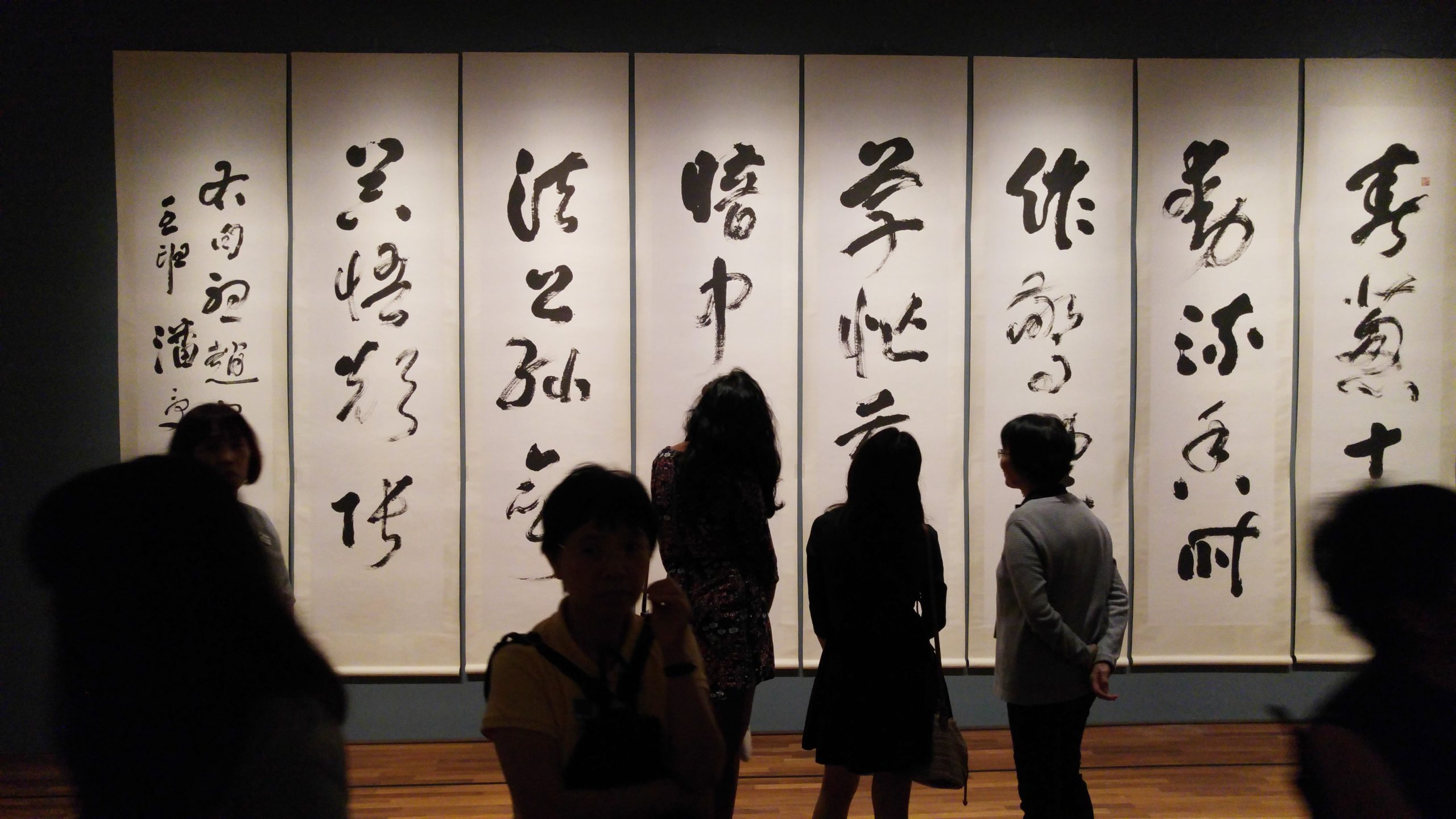
NUS Chinese Studies Celebrates 70 Years of Education and Research
IN BRIEF | 7 min read
- The NUS Department of Chinese Studies' deep roots trace back to 1953 when the former University of Singapore’s Department of Chinese Studies was founded. Since then, it has grown to be recognised as one of the leading institutions in the field of Chinese Studies and Chinese Language globally, as well as a major centre in the Southeast Asian region..

A dinner to mark the NUS Department of Chinese Studies’ 70th anniversary saw some 260 university and faculty members, cherished alumni, as well as prominent members of the Singapore Chinese cultural, education and media landscape coming together to celebrate the Department’s past, present and future on 23 September 2023.
The Department’s deep roots trace back to 1953 when the former University of Singapore’s Department of Chinese Studies was founded. Since then, it has grown to be recognised as one of the leading institutions in the field of Chinese Studies and Chinese Language globally, as well as a major centre in the Southeast Asian region.
Professor Ong Chang Woei, Head of Department of Chinese Studies and an alumnus, said “The Department’s evolution is intrinsically intertwined with Singapore’s history, and it has drawn from this rich heritage to shape its vision and developmental trajectory across the decades. We firmly believe that as an integral part of Singapore's Chinese language education ecosystem, the Department of Chinese Studies at NUS must continue to play a role in leading society towards the future at the academic and intellectual levels.”
Today, the Department’s academic rigour combines the strengths of classical and modern Chinese Studies to promote research and study in such key areas as Chinese linguistics, Chinese literature, Chinese history, Chinese philosophy, and Chinese-English translation.
Drawing on examples of how the Department has expanded over the years, Prof Ong said it now offers elective bilingual and English courses, as well as interdisciplinary courses such as those combining economics and history, and works closely with various institutions and organisations to design courses that allow students to gain a deeper understanding of the local Chinese community.

The dinner also saw the announcement of a special project entitled “A Rejuvenating Department: Memories, History, Direction – The 70th Anniversary of the Department of Chinese Studies at NUS” that charts the Department’s key developments and milestones. Historical photos, news clippings and documents, as well as close to 70 hours of oral interviews with 14 former department heads, teaching faculty and alumni, were meticulously compiled and condensed into a new publication and website to give the public impressive insights into the Department’s 70-year history.
Among those who participated in the oral interviews was Mdm Tan Chin Hwa, who is an alumna and former Head of Department of Mother Tongue at Hwa Chong Institution as well as former Chinese Language Curriculum Specialist at MOE. The project, she observed, is a significant endeavour, as it “offers a panoramic picture of an important chapter in our history and can be viewed as a valuable resource to shed light on the impact and development of Chinese language education in Singapore’s history.”

Guests were also treated to a trip down memory lane with a video montage of the Department’s key milestones and events. Reminiscing about her time in school, Mdm Tan shared, “I remember enjoying Chinese Studies sessions in a cosy classroom filled with lots of memorable and joyful moments. Featuring an array of subjects ranging from philosophy, and history, to classical and modern Chinese language and literature, these knowledgeable sessions painted an impressive picture of Chinese culture and civilisation.”
On what the future holds for the Department, Mr Shaun Choh, alumnus and Curator at the Singapore Chinese Cultural Centre, said, “Throughout my time working in the Chinese arts and culture industry, I have observed that many of the most astute thinkers and influential movers hail from the NUS Department of Chinese Studies. Their unique blend of global perspectives, married with deep-rooted Chinese sensibilities, has enabled them to shine in diverse arenas. My hope is for the Department to persist in moulding individuals who not only make waves in Singapore but also resonate globally.”

The anniversary dinner underscored a remarkable year for the Department during which a series of thought-provoking conferences were held to mark the anniversary. These included “Looking Ahead: New Technology, New Society, and Chinese Language Education in Singapore” in March as well as five impactful seminars between March and August by distinguished professors that covered interesting areas such as Chinese linguistics and translation studies, classical Chinese literature, and Chinese social and intellectual history.
Concluding the series at the end of the year is the international conference “Popular Nanyang: Rethinking Chinese Cultures in Post-war Singapore and Malaya/Malaysia” in November, and a symposium on developing Chinese Studies from a Southeast Asian perspective in December.
This story first appeared in NUSnews on 28 September 2023.
Margaret Wang Memorial Master’s Scholarship | Fueling a Passion for Classical Chinese Poetry
IN BRIEF | 5 min read
- Collectively, all of 2023 Margaret Wang Memorial Master's Scholarship recipient Wang Yuhui's studies at NUS so far have not only enriched his knowledge of the history and literature of the overseas Chinese, but also sparked his appreciation of traditional Chinese literature and ultimately led him to his current research focus — Singaporean classical Chinese poetry.

Wang Yuhui – the first 2023 recipient of the Margaret Wang Memorial Master’s Scholarship that encourages research on literature, particularly that produced by Southeast Asian writers who write in Chinese or English – credits the courses he has taken at NUS Chinese Studies for inspiring his interest in pursuing research work on classical Chinese poetry in Singapore, and he mentions two courses in particular.
“In my first semester here at NUS, I was fortunate enough to take a course on Singapore’s classical Chinese Poetry – Prescribed Texts in Literature – offered by Associate Professor Lam Lap [NUS Chinese Studies],” says the candidate for a Masters (Research) in Chinese Studies, who admits he was impressed by Assoc Prof Lam’s profound knowledge of the subject and his teaching acumen. The second course was Topics in Chinese History taught by Associate Professor Huang Jianli (NUS History), which Wang says provided him a deeper understanding of key themes and issues in the developing history of the overseas Chinese, such as the Chinese diaspora, Chinese-ness, native-place belonging and transnationalism.
Collectively, all his studies toward his first Masters degree – the Master of Arts (Chinese Language and Culture), which he attained in 2022 – not only enriched his knowledge of the history and literature of the overseas Chinese, but also sparked his appreciation of traditional Chinese literature and ultimately led him to his current research focus. “Through the continual study of Southeast Asian Chinese diaspora studies and Singaporean classical Chinese poetry, I gradually realised the importance of traditional Chinese literature for further understanding what was on the minds and in the hearts of some early Chinese immigrants,” says Wang, who believes that the inner thoughts and complex emotions of these settlers from past centuries can be fully contained and expressed in the medium of Chinese poetry, and the plain record of historical documents and investigations is limited in this respect.
“I sincerely hope that my future research can provide some different aspects for the study of Chinese diaspora and Chinese overseas literature,” says Wang, who also expresses thanks for the Margaret Wang Memorial Master’s Scholarship award. “It is my honour, and I am very grateful to Professor Wang Gungwu and the University for this award, as it has lightened my load and enabled me to focus better on my research."
About the Margaret Wang Memorial Master's Scholarship and Margaret Wang Master's Scholarship in Literature
The Margaret Wang Memorial Master’s Scholarship was set up by Professor Wang Gungwu (Chairman of the East Asian Institute and University Professor of NUS, and Emeritus Professor of the Australian National University) in loving memory of his wife, Mrs Margaret Wang, and to encourage research on literature, specifically the works of Southeast Asian writers who write in Chinese or English. The scholarship is open for applications. To learn more, click here.
The newly launched sister scholarship, the Margaret Wang Master’s Scholarship in Literature, is also currently open for applications. To find out more, click here.
Professor Ong Chang Woei on `Non-China` Elements in Chinese-style Songs
IN BRIEF | 10 min read
- Head of NUS Chinese Studies Professor Ong Chang Woei comments on songs in Chinese.
Click through image below to read this piece.
This article first appeared in Lianhe Zaobao and NUSNews on 8 June 2023.
Multicultural Perspectives in Pop Songs: Afterthoughts on Seminar
IN BRIEF | 10 min read
- Op-Ed by Head of NUS Chinese Studies Professor Ong Chang Woei in Lianhe Zaobao (24 May 2023).
Click through image below to read this piece.
This article first appeared in Lianhe Zaobao and NUSNews on 24 May 2023.
NUS Department of Chinese Studies marks 70th anniversary with year-long slate of events

Prof Ong Chang Woei, Head of the NUS Department of Chinese Studies, delivering the opening address at a symposium held to mark the Department’s 70th anniversary. (Photo credit: SCCC)
There is an old Chinese saying, ren sheng qi shi gu lai xi, which means it is a rare and precious thing for a person to live till the age of 70. The same applies to institutions. The NUS Department of Chinese Studies, which turns 70 this year, is marking the momentous milestone with a year-long series of events.
One such event was a symposium on the future of Chinese education in Singapore, and how it might respond to technology and other trends. Social media, talking robots and Artificial Intelligence (AI) chatbot ChatGPT were some topics that loomed large at the event attended by 337 people at the Singapore Chinese Cultural Centre (SCCC) on 4 March.
“In the past, discussions about Chinese education in Singapore have largely revolved around Singapore becoming a predominantly English-speaking society,” said NUS Chinese Studies’ Department Head Professor Ong Chang Woei.
“It’s important to discuss this, of course, but today we want to see if any fresh perspectives and thought-provoking insights might emerge.”

Panellists speaking at the “Looking Ahead: New Technology, New Society, and Chinese Language Education in Singapore” Symposium. (Photo credit: SCCC)
One of the main themes of the discussions was the view that the online world, bolstered by AI, could help people improve their language skills. “(Many) parents don’t speak to their children in their mother tongue, so we'll have to depend on the robot to do it,” Madam Heng Boey Hong, Director of Mother Tongue Languages at the Ministry of Education (MOE), noted wryly. MOE is working with research institute AI Singapore to create robots that can speak to pupils in Mandarin, Malay or Tamil, said Mdm Heng, one of a dozen academics, educators and members of the media who spoke at the four-hour symposium.
Besides AI, another trend is Singapore’s changing demographics, given that new immigrants form an increasingly large group of the country’s Mandarin speakers and the impact this would have on Chinese education, said Prof Ong, speaking at the Chinese-language event organised by his department, the SCCC, Wan Boo Sow Research Centre for Chinese Culture, and The Society of Chinese Education Singapore. “In these circumstances, what should Chinese education be like?” he wondered.
But even as we move towards using technology to aid teaching, the role of humans in the instruction should not be left aside. “As robots become more like humans, we shouldn’t be teaching humans to be like robots,” said Dr Kang Ger-Wen, who chairs Ngee Ann Polytechnic’s Chinese Studies course. Equally vital is teaching students to be nimble, to enable them to bridge different domains, for example.
While there were no simple solutions to many of the questions posed at the symposium, the stimulating discussions served as a promising starting point. “Hopefully at the Department's 140th anniversary, we would have answers to these issues,” said Prof Ong.
 An audience member poses questions to the panellists on stage. (Photo credit: SCCC) A rich history
An audience member poses questions to the panellists on stage. (Photo credit: SCCC) A rich history
The symposium is part of a series of celebrations this year that will mark the Department’s 70th anniversary.
The roots of NUS’ Department of Chinese Studies can be traced to two institutions. One is the former University of Singapore’s department of Chinese studies, which was founded in 1953. The other is the department of Chinese language and literature at the former Nanyang University, established in 1955. When the two universities merged in 1980 to form NUS, their Chinese departments, too, became one.
Today, the Department at the Faculty of Arts and Social Sciences runs more than 50 courses a year for BA and BA Honours students, in areas including Chinese linguistics, Chinese literature, Chinese history, Chinese philosophy, and translation. It also offers PhD and MA programmes, as well as Continuing Education and Training (CET) certificate courses.
Its anniversary celebrations kicked off in February with a lecture by Oxford Professor and National University of Singapore Society (NUSS) Visiting Professor Tan Tian Yuan on the “literary worlds” of the Kangxi Emperor’s tours to southern China. Over the next few months, there will be dialogues on topics such as translation, the classics, and Chinese intellectual history.
Other highlights include a dinner banquet in September; a conference in November titled Popular Nanyang: Rethinking Chinese Cultures in Post-war Singapore and Malaya/Malaysia; and a symposium on developing Chinese Studies from a Southeast Asian perspective in December.
More details of the Department’s 70th anniversary activities are available here.
This story first appeared on NUSnews on 16 March 2023.
Exploring the Spaces between the Arts, Social Issues and Academia
IN BRIEF | 8 min read
- This year’s edition of NUS Arts Festival features over 20 performances, films, public art, installations, and dialogues. It is also the first to return to pre-pandemic levels, and involves more than 700 NUS students, alumni, faculty, staff and collaborators, nearly twice of 2022 figures, and remains the largest performing arts event on campus..
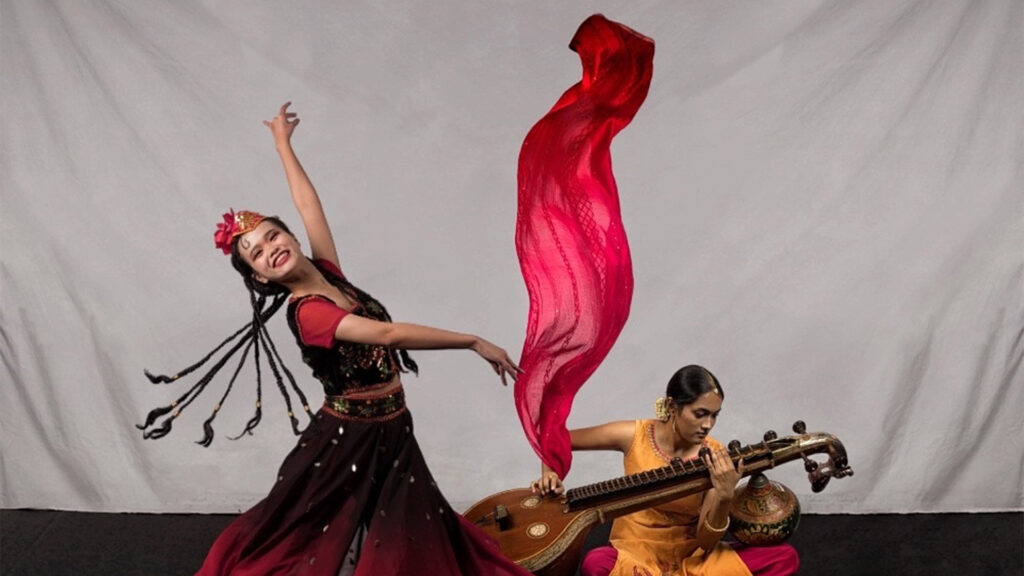
What can we learn from uncomfortable transitions and ambiguous spaces? The highlight of NUS’ performing arts calendar, NUS Arts Festival 2023: Spaces Between, returns to campus from 10 to 26 March 2023, and explores the idea of liminal spaces and the exciting, yet uncomfortable unknown that accompanies the transition between phases and states.
This year's theme, Spaces Between, is the finale to a trilogy of themes that began with A Question of Time in 2021 and Shades of Light(ness) in 2022. All three are universal concepts that drive the purpose of our everyday lives.
This year’s edition of NUS Arts Festival features over 20 performances, films, public art, installations, and dialogues. It is also the first to return to pre-pandemic levels, and involves more than 700 NUS students, alumni, faculty, staff and collaborators, nearly twice of 2022 figures, and remains the largest performing arts event on campus.
“The purpose of the festival theme is to allow us to reflect on the times we live in through art. Furthermore, art has always been a vehicle in which we rediscover ourselves, encounter a confluence of different ideas, and ask difficult questions,” said Festival Director, Jobina Tan.
“As we live in a world of diverse and divided views, I hope the theme demonstrates our perennial need to constantly negotiate between varied perspectives and find more meeting points with each other."
Professor Audrey Yue, Head of Department of Communications and New Media, and Festival Faculty Advisor, added, “While we recover from the downturn of the pandemic, we also arrive at the intersection of concurrent crises including global economic, racial and geopolitical unrests. How do we boldly unfold and spring forth from the complexity of this conjunction?”
Indeed, the theme has inspired a bumper crop of interdisciplinary artistic collaborations, bringing together different art forms, student groups, and academic departments. Many of these are rare partnerships or first-of-its-kind pairings within NUS, with a handful pushing the envelope to address contemporary issues which resonate with youths in Singapore.
One such collaboration is the festival opening show, Inter/change, which marries the two contrasting traditional art forms practiced by NUS Chinese Dance and NUS Indian Instrumental Ensemble. Led by Artistic Director, Jenny Neo, dance choreographer, Xiao Jing, and musician Nawaz Mirajkar, the production is inspired by the history and evolution of the Silk Road as well as its cultural impact and relevance in our world today.
“Inter/change allows us to explore and interpret the theme as spaces between two different parts of the world joined together by the Silk Road, as well as the idea of spaces between different viewpoints, ideologies and cultures. The idea of liminality can possibly be explored through the interactions between these two civilisations and through the comparisons which highlight similarities between the Indian and Chinese ways of life,” said Lee Ruo Shi, Dance Captain of NUS Chinese Dance, and a second-year Accountancy student.
Another unique collaboration is Essentially Macbeth, featuring NUS Chinese Drama and NUS Chinese Orchestra. A Chinese language play-within-a-play, the production follows the lives of young graduates who reconnect with theatre after a pronounced absence, and questions the relevance of the arts in our everyday lives. The play is inspired by the public conversations about artists being considered “non-essential” workers in Singapore, during the COVID-19 pandemic.
“I suggested to Moses, conductor of NUS Chinese Orchestra to let NUS Chinese Drama and NUS Chinese Orchestra tackle a Western classic by Shakespeare. Moses suggested getting composer Phang Kok Jun to write original music for this daring piece of work. I think we both saw this as a chance to play, learn and explore new boundaries for our art form,” said NUS alumna Judy Ngo, who directs the play.
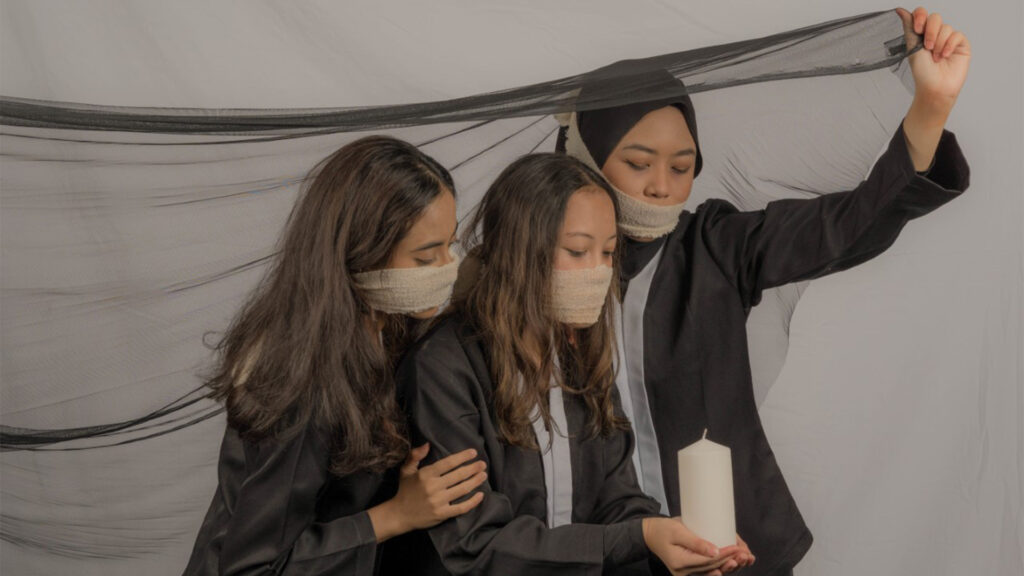
Presented by Malay cultural dance group NUS Ilsa Tari, together with NUS Dikir Barat, Pengabdian Batin (or “Inner Enslavement” in Malay) aims to deconstruct the stigma surrounding Intimate Partner Violence amongst the Malay/Muslim community. This production is helmed by Artistic Director, Osman Abdul Hamid.

Promise of a Future celebrates the union of artists and their art forms, bringing the largest number of performers on stage within the festival. Some 182 musicians from NUS Symphony Orchestra, The NUSChoir, and NUS Yong Siew Toh Conservatory of Music, will present musical interpretations of the triumph of hope over uncertainty, which includes Mozart’s famous Coronation Mass. This is the first in-person collaboration between NUS Symphony Orchestra and The NUSChoir since 2018.
“Now that we are back to pre-pandemic productions, watching everything unfold again at full scale, how it was meant to be, is far grander and exciting than what any of us could've imagined. It's certainly only a special, magical moment that you can only feel it in person, live, either as a performer on stage or an audience,” said Wong Ting Feng, President of NUS Symphony Orchestra, and a fourth-year Philosophy, Political Science, and Economics student.
The NUS Arts Festival is generously supported by donors, namely, Hong Leong Foundation, Shaw Foundation, Kwan Im Thong Hood Cho Temple, The Ngee Ann Kongsi, Salleh Marican Foundation and the Ministry of Culture, Community and Youth’s Cultural Matching Fund.
For more information, please visit nusartsfestival.com.
This NUS Centre for the Arts story first appeared on NUSnews on 9 March 2023.
NUS Open House: More than 7.7M Visitors Drawn to Action-Packed Showcase over 10 Days
IN BRIEF | 25 min read
- NUS Open House 2023 saw a strong showing by visitors eager to find out about the University’s academic programmes, as it returned in from 25 February to 6 March. Some 7.71 million visitors attended the physical and online showcase which involved 3,071 faculty and staff, students and alumni.
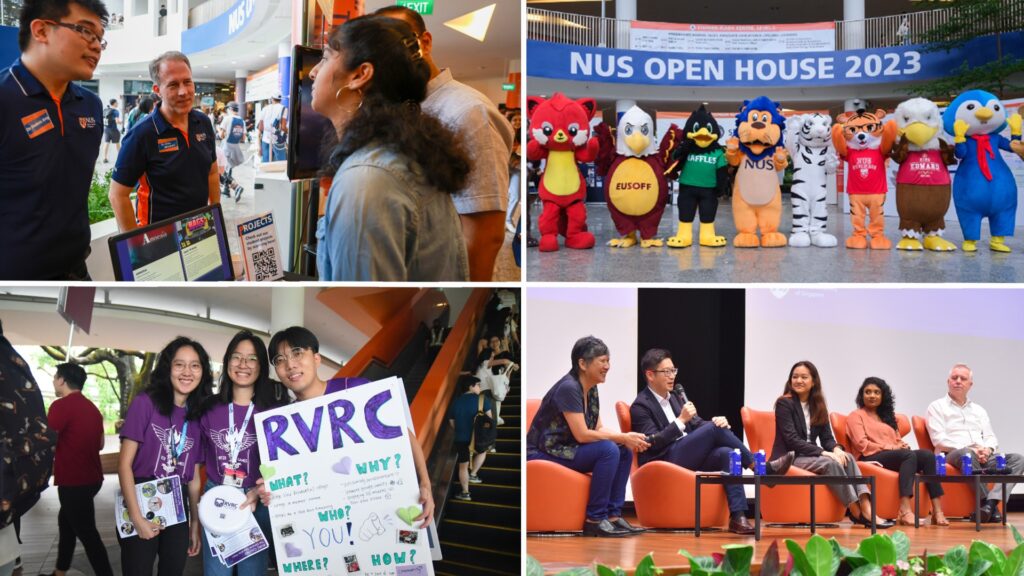
NUS Open House 2023 saw a strong showing by visitors eager to find out about the University’s academic programmes, as it returned from 25 February to 6 March. Some 7.71 million visitors attended the physical and online showcase which involved 3,071 faculty and staff, students and alumni.
Kicking off the 10 action-packed days were the informative virtual talks, webinars, and social media sessions. The on-campus event on 4 March saw packed crowds at the programme booths, talks, special classes, campus tours, student life performances and residential venues despite the heavy downpour. Prospective students gained valuable insights from faculty members, explored the University’s extensive global opportunities, as well as its diverse entrepreneurship platforms and lifelong learning courses, giving them a comprehensive overview of what NUS has to offer.
“I really enjoyed meeting the professors and students who are from the courses I'm interested in as I gained many insights from them on life in NUS and the various possibilities that are open for exploration,” said prospective student Karthika Warrier, an alumna from Raffles Institution who is considering applying to NUS Computing or the College of Humanities and Sciences (CHS).
Jasmine Chiam, an alumna from Nanyang Junior College (NYJC) who is interested in applying to CHS and NUS College, agreed. “The programme was well-run despite the fact that it was raining,” she said. “I felt that it was well-curated for students with different interests.”
A draw for many prospective students were CHS, the newly launched NUS College, and the College of Design and Engineering (CDE) – the University’s recent interdisciplinary pathways aimed at meeting the evolving demands of the workforce.
Addressing Shared Challenges with the Humanities and Sciences
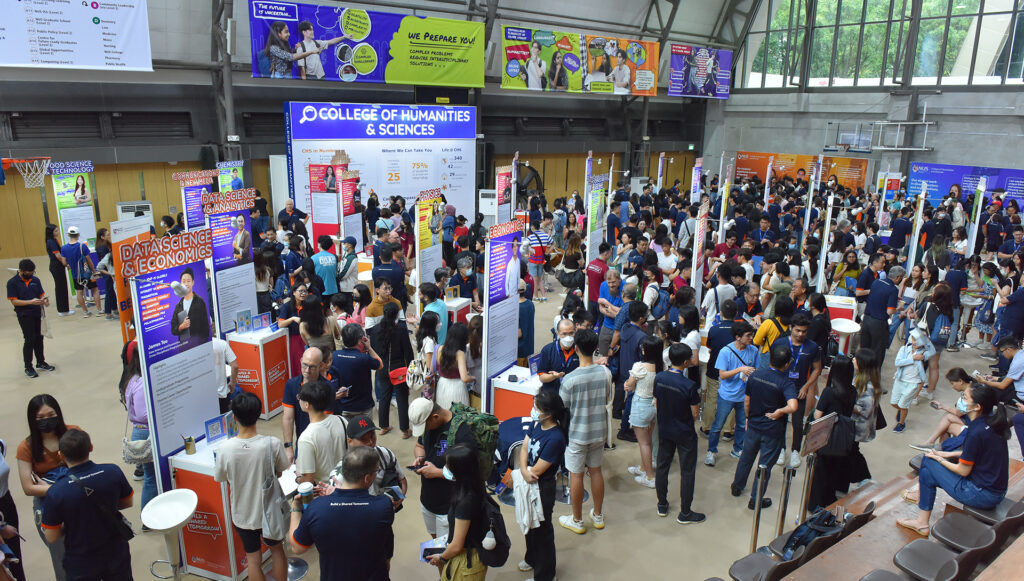
CHS, which provides an enhanced undergraduate experience for students of the Faculty of Science (FOS) and the Faculty of Arts and Social Sciences to pursue breadth and depth across academic disciplines, showcased its Common Curriculum throughout the Open House.
Currently accepting its third intake, it held talks on hot topics such as sustainability, food science and technology, and mental health to demonstrate how students can apply various perspectives to address complex real-world issues.
The panel entitled “Why Sustainability and Climate Change Matter” saw speakers from the Geography, Japanese Studies, Anthropology and English, Linguistics and Theatre Studies departments weighing in on the topic from their respective disciplines. Another session by the Department of Food Science and Technology explained how its programme applies principles from chemistry, biology, engineering and nutrition to address issues such as food safety and security, as well as the careers its graduates can pursue.
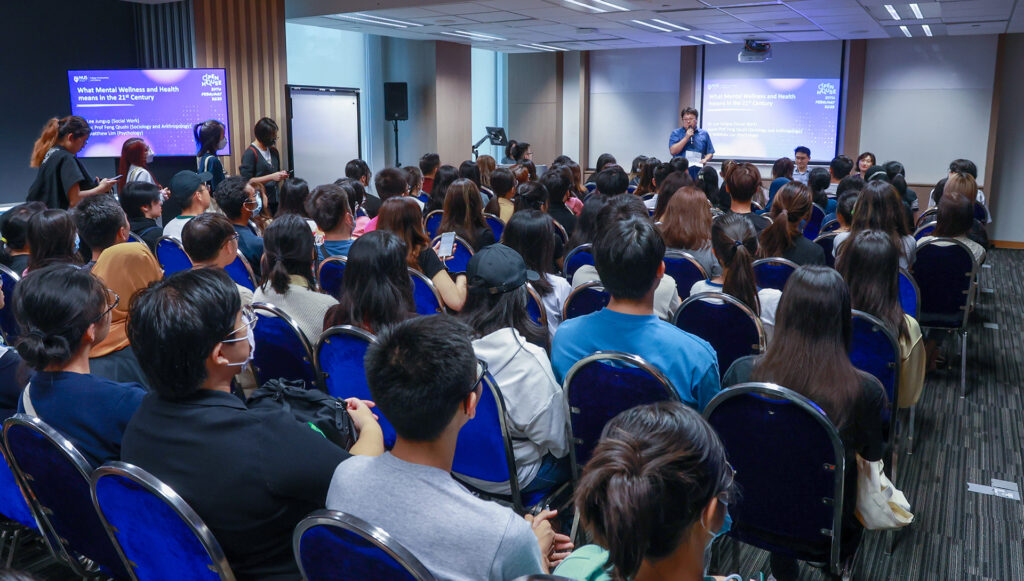
In the same vein, the panel “What Mental Wellness and Health Means in the 21st Century” saw speakers from the Social Work, Sociology and Psychology departments discuss perceptions of mental health in society. Dr Lee Jungup, an Assistant Professor in Social Work, pointed out the close relationship between social work and psychology. “Many of our Social Work students consider a double major with Psychology,” she said, noting that social work emphasises the practical while psychology is more theoretical and clinical in nature.
Jasmine, the NYJC alumna, said the various informative talks reaffirmed her decision to apply to NUS. “The NUS College tour as well as the CHS Common Curriculum sharing were particularly informative. They made the programmes seem quite appealing and I am looking forward to applying for both,” she said.
For some like Christian Chua, an alumnus from the NUS High School of Math and Science, attending the Open House talks helped clarify the career options available for the different programmes.
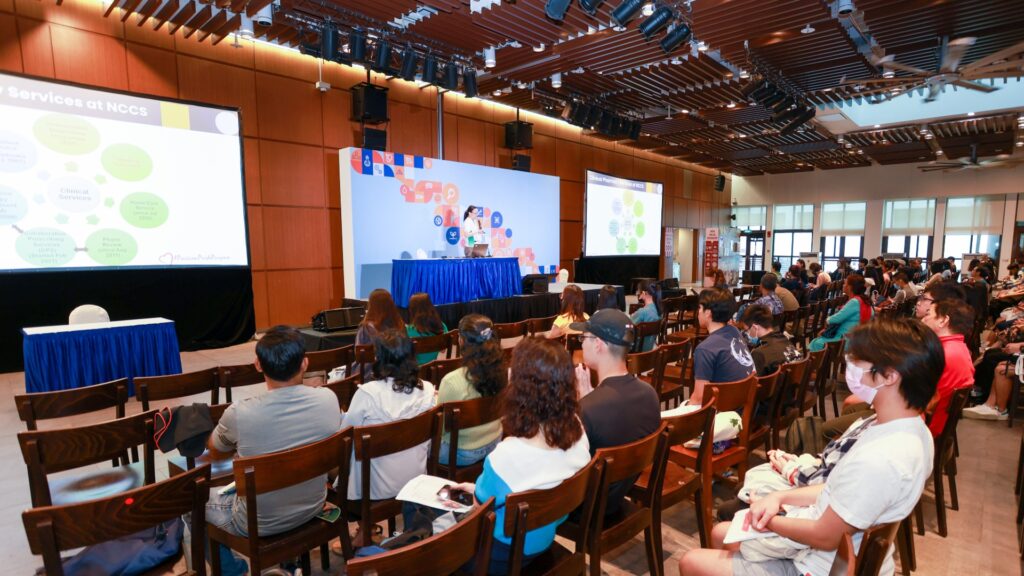
Christian, who is currently considering the Medicine, Pharmacy, and Pharmaceutical Science programmes, attended the Pharmacy talk and booth, where faculty members of different specialisations touched on the various career pathways and the collaborative practices of the discipline.
“It was useful that they discussed the different careers that Pharmacy graduates had gone into so I knew a degree in Pharmacy wouldn't just limit me to community or hospital pharmacy but also to the R&D, drug approval side, or the business side as well,” he said.
Shaping the Future of Design and Engineering
Meanwhile, there was action aplenty over at both the online and in-person Open House by CDE, which is accepting its second intake. Officially launched in November 2021, CDE was a merger of the Faculty of Engineering and the School of Design and Environment, ramping up the distinctive interdisciplinary experience at NUS.

From the Common Curriculum and the multidisciplinary education model, to the Student Exchange Programme and future career prospects, CDE faculty and students shared their insights on a plethora of topics with prospective students.
The talks, such as the one on Biomedical Engineering, Chemical Engineering and Materials Science & Engineering, also provided valuable information. Prospective students learnt how undergraduates are exposed to a range of interdisciplinary topics with global-scale applications in class, and how NUS engineers are taking on the world’s biggest challenges, such as clean energy.

The talk on Architecture, Industrial Design and Landscape Architecture also saw a large turn-out. Discussing the breadth and depth of CDE’s curriculum, it touched on how students will be equipped to face the 21st-century challenges through their education in CDE.
Kaisyn, who is graduating from Nanyang Polytechnic this year, said, “I appreciated that they covered the basic skills and activities done throughout the curriculum. It allowed me to confirm that the Industrial Design course is relevant to my study and career plan.”
The in-person Ask-Me-Anything sessions with student panels also allowed participants to get their burning questions answered.
Tee Jia Hong, a graduate of Anglo-Chinese Junior College who intends to apply to Industrial and Systems Engineering (ISE) and attended the student sharing, said, “By listening to the experience from the ISE senior, I am able to get the hang of the academic and co-curricular prospect of being an ISE student.”
Over at CDE’s Rise of the Robots campus tour, participants were given a look at the Advanced Robotics Centre, which displayed projects such as an autonomous wheelchair, an artificial robotic arm, and a haptic feedback machine.

Robert Lim from Singapore Polytechnic, who attended the tour, said, “It was a memorable experience . . . I was able to learn more about what the courses have to offer and what undergrad students have accomplished in NUS.”
Exploring experiential learning
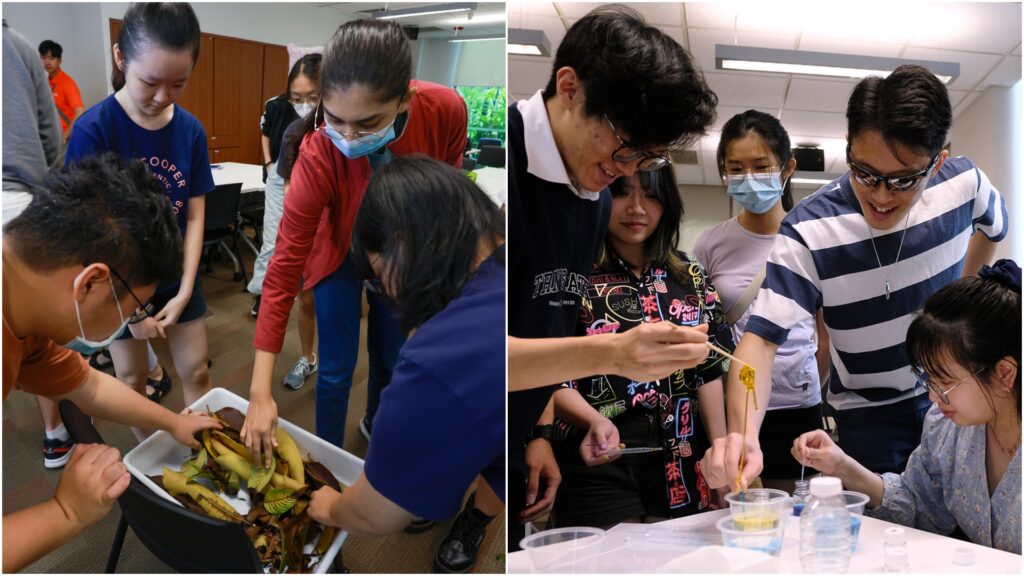
NUS College, Singapore’s first honours college, offered a glimpse of its flagship experiential learning programmes during its online and physical showcase. Faculty members highlighted the Impact Experience programme, where students develop solutions to real-world issues with community partners, and the Global Experience programme, which immerses them in global cities for specially curated courses and field visits based on specific themes.
The college, which is accepting its second intake, also held special classes for prospective students to get a feel of its small-group seminar-style lessons. Dr Ang Yuchen’s special class introduced his field course Biodiversity and Natural History in Singapore, which combines scientific concepts with the visual and language arts and environmental philosophy.
“I found the sample lessons useful in helping me not just get a sense of how lessons are conducted over at NUS College, but also how my potential Profs are like as teachers and facilitators,” said Eugene Teo, an alumnus of Raffles Institution, explaining that small, collaborative discussions was better suited to his learning style. Attending the Open House “also gave me a better understanding of the people I will be interacting with and the environment in which I would be studying in upon entering university life”, he added.

Interactivity was a prominent feature of the Open House. NUS Nursing offered visitors a chance to try basic wound treatment and resuscitation, while NUS Law held moot demonstrations at its Bukit Timah Campus.
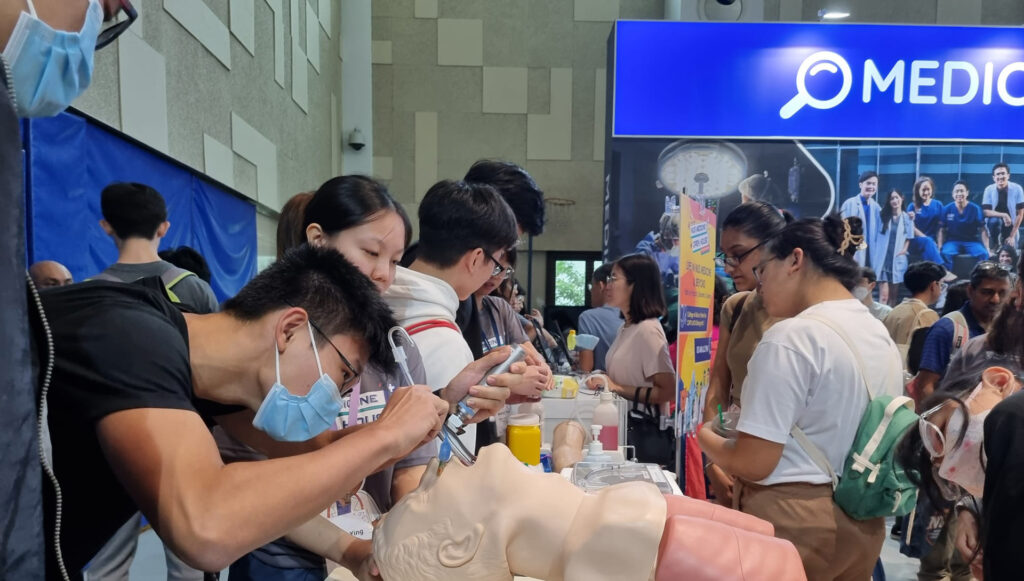 |
 |
Aqirah Bte Azam, who will be graduating from Temasek Polytechnic in May, had the chance to see the Nursing students in action and attended a talk by its alumni. “Hearing their experiences in NUS and their careers have given me the courage to pursue my aspirations in nursing”, she said.
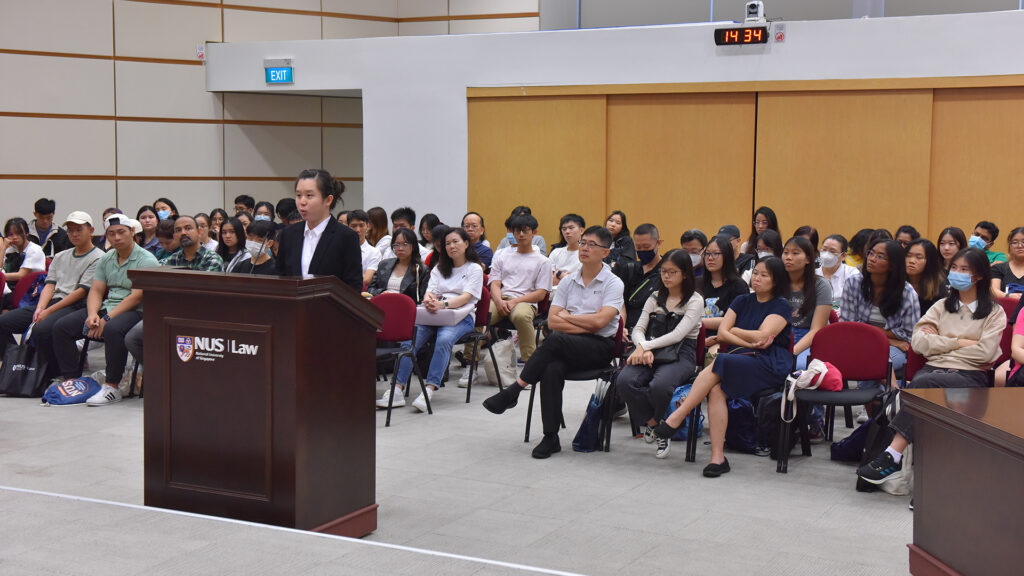
Smorgasbord of Student Life
Visitors also got a taste of the vibrant NUS student life on display. Student clubs and societies, as well as the Hall and Residential College (RC) interest groups, put their best foot forward at the Student Village.

Visitors were wowed by the striking moves of NUS Wushu, the energetic cheerleading displays of King Edward VII Hall’s KE Titans, and the snazzy K-pop dance moves of the Korean Cultural Interest Group. They were also treated to renditions of catchy tunes from Mandopop group NUS CAC Voices, acapella group NUS Resonance, Raffles Hall rock and jazz band RHockerfellas, and many more.

Representatives from the RCs, halls, and houses were present to offer prospective students the inside scoop on the on-campus experience. Complemented by A-Day-in-the-Life videos and 360° virtual tours, the booths, talks, and Ask-Me-Anything panels by student leaders gave participants a sense of the residential options at their fingertips.
“The House Life talk was the most enjoyable and informative event to me since the masters and students really explained to me what living in houses was like, while keeping us engaged through jokes and videos,” said Jia Hong.
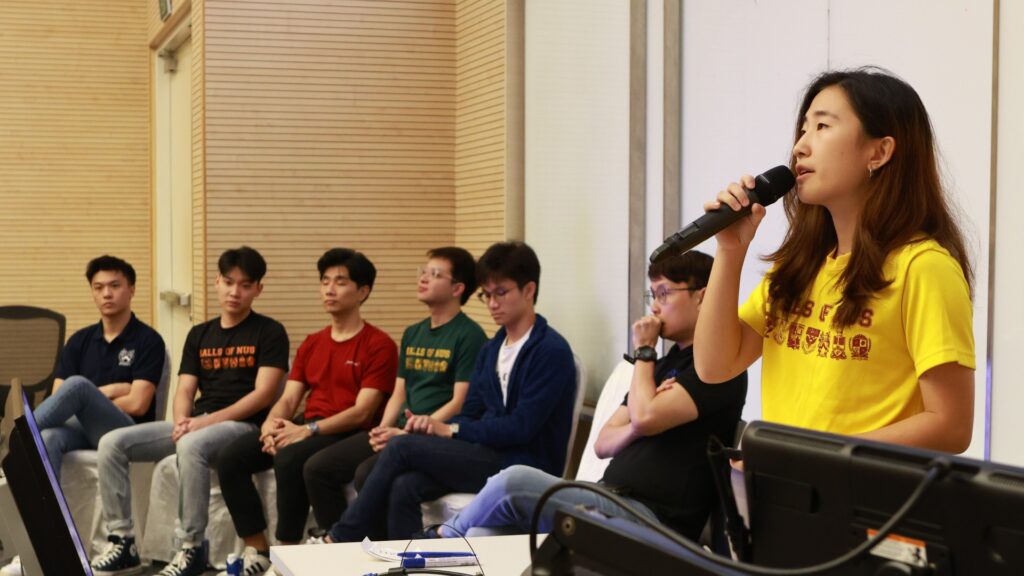
Charlotte Toh from Singapore Polytechnic, said the Halls talk helped her better understand the hall culture and admission criteria.
Guided in-person tours of the various halls and residences, such as King Edward VII Hall, Tembusu College, Ridge View Residential College, and Residential College 4, opened a window to the close-knit community of residential life.
Samuel Liu, who graduated from National Junior College, said, “The well-guided tours and booths set up for each RC that I visited gave me a good indication of which RC would be most suitable for my character and goals.”
This story first appeared on NUSnews on 9 March 2023.
FASS Inspiring Mentor 2022 Award Winners Announced

The NUS Faculty of Arts and Social Sciences is proud to announce the winners of the 2022 FASS Inspiring Mentor Awards.
Congratulations to:
- Assoc Prof Melvin Yap Ju-Min, Associate Professor, Department of Psychology
- Assoc Prof Robin Loon Seong Yun, Associate Professor, Department of English Language and Literature
- Dr Amazaki Osamu, Senior Lecturer, Centre for Language Studies
- Dr Natalie Pang Lee San, Senior Lecturer, Department of Communications and New Media
- Dr Kamalini Ramdas, Senior Lecturer, Department of Geography
The NUS Career Compass 2023
IN BRIEF | 5 min read
- Find out how the University has developed and broadened our curriculum to better prepare our graduates for the swiftly evolving workplace, and how interdisciplinary learning can help students solve complex issues in our society.

In collaboration with CNA938
How does NUS cultivate highly sought-after talents in the workforce of the future?
Find out how the University has developed and broadened our curriculum to better prepare our graduates for the swiftly evolving workplace, and how interdisciplinary learning can help students solve complex issues in our society.
This story first appeared on NUSnews on 23 February 2023.
CHS at NUS Open House 2023: Download the FASS Essentials on 27 February 2023
IN BRIEF | 10 min read
- On 27 February, get the full download on the essentials of academic programmes, student life, career preparation, overseas opportunities and financial aid at CHS via Zoom in the ‘virtual’ edition of CHS@NUS Open House 2023.
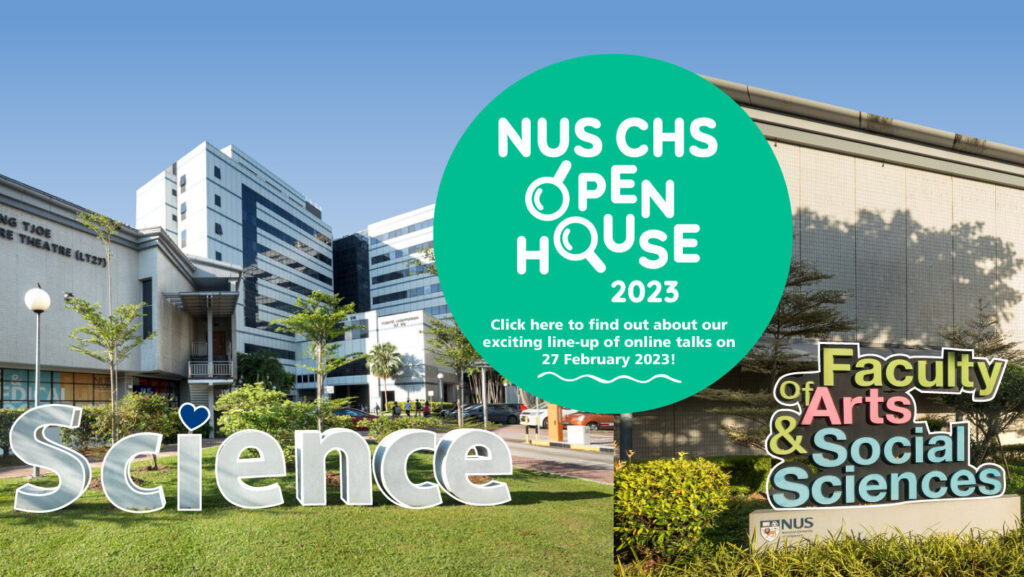
If you have not already marked your calendars for two dates with the NUS College of Humanities (CHS) during NUS Open House 2023, do it now!
On 27 February, get the full download on the essentials of academic programmes, student life, career preparation, overseas opportunities and financial aid at CHS via Zoom in the ‘virtual’ edition of CHS@NUS Open House 2023. Go to https://bit.ly/CHSatNUSOH2023-Virtual for the full 27 February programme.

Then prepare to come on-campus on 4 March to engage with our award-winning faculty members, advisors and students to experience interdisciplinary education and explore your future vocation. Go to https://bit.ly/CHSatNUSOH2023-OnCampus for the full 4 March programme.
To help you plan your way through the lineup of FASS-specific talks and activities, read on for some of our highlights on 27 February 2023 that ought not to be missed.
Academics at the Forefront
The online edition of CHS@NUS Open House is meant to provide you with as comprehensive a briefing of what CHS, and its component Faculties of Arts and Social Sciences, and Science, have to offer students.
Academics is at the forefront and the day starts with a session devoted to the CHS Core Curriculum (9:00 – 11:00 am), a specially curated interdisciplinary programme that provides unprecedented freedom to choose the pursuit of breadth and depth across a broad spectrum of disciplines. This session will be led by Professor Sow Chorng Haur, Vice Dean (Outreach & Admissions), NUS Faculty of Science (FoS), and Dr Noorman Abdullah, Assistant Dean (External Relations & Student Life), FASS.
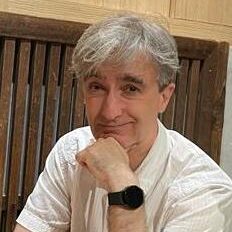
Associate Professor Luke O'Sullivan
The CHS Cross-Disciplinary Programmes
Three one-hour talks devoted to introducing Cross-Disciplinary Programmes (XDPs) offered by CHS will be running concurrently from 11:00 am. One programme FASS offers that embodies the concept of interdisciplinarity is the Philosophy, Politics, and Economics XDP, and the session for that will be led by Associate Professor Luke O’Sullivan (NUS Political Science) in discussion with fellow PPE Joint Programme Committee member, Dr Joel Chow (NUS Philosophy).
"This session is an opportunity to ask questions about the PPE-XDP. Philosophy, Politics, and Economics is a classic combination of disciplines that was first taught in Oxford and has spread globally because of its proven effectiveness. It brings together the ability to think about ideas in abstract and analytical terms, explore their practical implications for society, and model their costs and benefits in quantitative terms,” says Assoc Prof O’Sullivan. “PPE students can expect to develop a unique knowledge base and set of skills that leaves them suited for a wide range of careers in today's complex and fast-changing world."
Attendees are required to come prepared, because in addition to providing an overview of the PPE-XDP, Assoc Prof O’Sullivan expects audience engagement. Join the PPE-XDP session on 27 February at 11:00 am here.
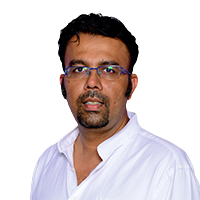
Associate Professor Rajesh Rai
Asian Studies @ CHS
NUS is recognised as a global centre of excellence in Asian Studies, where a multidisciplinary and comparative approach to the study of Asia and its regions is adopted. The session on programmes by the various Asian Studies departments at NUS (2:00 – 2:50 pm) will feature Associate Professor Rajesh Rai (NUS South Asian Studies), Dr Faizah Zakaria (NUS Malay Studies), Associate Professor Tham Shiao Wei (NUS Chinese Studies), Dr Clay Eaton (NUS Japanese Studies) and Dr Mohamed Effendy Abdul Hamid (NUS Southeast Asian Studies).
“You probably hear a lot about how Asia is the largest continent in the world, with the greatest diversity of cultures, philosophies, political thought and economic might, as well as scientific and technological advancement,” says Assoc Prof Rai, offering up a brief on the discussion he will be leading as moderator. “This session will take you through an interdisciplinary journey through history and current affairs to show you just how influential Asia has been a force for change, both positive and negative, on the world’s stage.”
Join this session by clicking here.
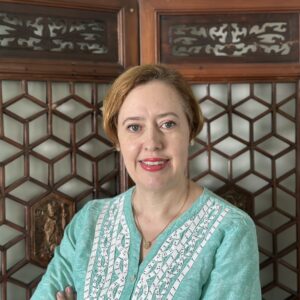
Humanities @ CHS
Learn more about the academic disciplines that focus on studying different aspects of the human condition from: Dr Donna Brunero (NUS History); Associate Professor John Whalen-Bridge, Associate Professor Graham Wolfe and Dr Leslie of NUS English, Linguistics and Theatre Studies; and Dr Zachary Barnett (NUS Philosophy).
“Do you: Ponder big questions regarding life, society, and culture? Wonder how language develops? Hold theatrical ambitions? Find yourself curious about connecting the past and present, the local and global?” session moderator Dr Brunero asks rhetorically. “If so, join us as we answer questions regarding our disciplines and share insights into how studying with us at NUS can broaden your horizons.”
To join Dr Brunero and her fellow speakers in this 3:00 - 3:50 pm session click here.
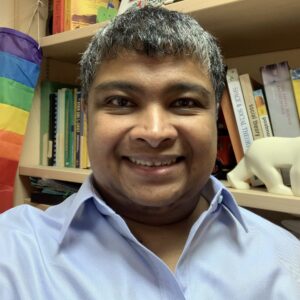
Social Sciences I: Same, Same but Different
This session features Dr Kamalini Ramdas (NUS Geography), Associate Professor Feng Qiushi (NUS Sociology and Anthropology), Dr Elaine Tan (NUS Political Science) and Dr Georgios Georgiou (NUS Economics), and will delve into their respective programmes as well as approaches toward forging a “collective identity”.
Session moderator Dr Kamalini explains. “This panel brings together social scientists from Economics, Geography, Political Science and Sociology to discuss what it takes to develop a collective identity as social scientists,” says Dr Kamalini, who will be working with her fellow speakers toward answering questions such as, “What are the benefits and challenges of a collective approach to learning and research? How might our students benefit from our commitment to engage?”
Click here to join the Social Sciences I (4:00 – 4:50 pm) session.

Social Sciences II: Understanding Social Complexity
Dr Adelyn Lim (NUS Sociology and Anthropology), Associate Professor Irene Ng (NUS Social Work), Dr Nina Powell (NUS Psychology) and Dr Alex Mitchell (NUS Communications and New Media) will be introducing the disciplines offered by their respective Departments, and show how they can each be applied to enable a deeper understanding of our world.
“The world we live in today can feel exciting but also downright contradictory. Global friendships are in many ways easier to make than in the past, yet we see terrorism, violent crime, wars, and enduring social inequality,” says session moderator Dr Lim, who will be discussing in detail with her fellow speakers complex issues thrown up by questions such as, “How did this world come about? Where are we heading in the future?”
To join the Social Sciences II (5:00 – 5:50 pm) session, click here.

Ms Sasiwimol Klayklueng
Foreign Language Studies: Passport to the World
Meet leading Language instructors Ms Sasiwimol Klayklueng (Thai), Dr Sandhya Singh (Hindi and Tamil), Ms Indianti Tjan (Indonesian), Ms Rungnapa Kitiarsa (Thai) and Ms Sophie Undorf Bouvier (French), who will elaborate on the Minor in Language Studies and Proficiency Certificates conferred by the NUS Centre for Language Studies, which are very much sought after by students looking to enhance their career prospects.
The Half-life of Knowledge
IN BRIEF | 10 min read
- There is now an indisputable requisite to equip graduates with interdisciplinary knowledge and skillsets. We need both the agile lenses of interdisciplinarity as well as the deep-cutting laser of deep domain expertise. The former trains us to aim and focus the laser, while the latter allows us to cut to the heart of a problem.

| By Professor Tan Eng Chye |
“Teach a person to fish, and you may feed them for three-and-a-half years” may sound less inspiring than “Teach a person to fish, and you feed them for a lifetime”, but the former more accurately reflects the current realities of tertiary education.
Breaking news travels at warp speed, accelerated by social media and instant messaging. In a matter of minutes, news can reach the four corners of the world. Such interconnectedness highlights the leaps made in information technology over the years while underscoring a persistent and inexorable phenomenon – the reduction of the half-life of knowledge.
The half-life of knowledge, coined by Fritz Machlup in 1962, refers to the amount of time elapsed before half of the knowledge in a particular field is superseded or becomes obsolete. Given the speed with which knowledge develops and is shared, it is perhaps not surprising that this value is ever decreasing in many fields.
This phenomenon raises fundamental questions about our university degree programmes. How should a fresh graduate, filled with aspirations to change the world, deal with the harsh reality that a significant portion of their undergraduate training may be rendered irrelevant by the simple passage of time?
Distilling a degree programme is one possible, albeit drastic approach. We can consider equipping students only with evergreen core domain concepts. This training should take less time than our current degree programmes. As and when students require specific new knowledge, or need to upgrade existing knowledge, they can take short courses to bridge knowledge gaps and meet their professional needs. This type of “just in time” learning, also known as micro-credentialing, helps to circumvent the shortened half-life by injecting cutting-edge knowledge at just the right time.
Another less disruptive approach is revitalisation. We can maintain the current degree programme structure, but provide avenues for graduates to return to university in the future. Such short stints of study can follow existing models for bite-sized, self-contained courses, or semester-long study periods undertaken with the support of employers.
One certainty is that university study will cease to be just one stage of life. Instead, “university studies” will become the de facto way of studying, with a person continually refreshing and renewing their knowledge in tandem with or in anticipation of developments in industry, society and the world.
In anticipation of this, we created the NUS Lifelong Learners Programme (or NUS L3), which promises a 20-year period of student enrolment, from the point of undergraduate or postgraduate admission. In other words, a graduate of NUS can choose to come back to campus to take courses for at least 20 years from the day of matriculation.
Interdisciplinarity
Beyond the way knowledge is acquired, we are also grappling with working in an increasingly VUCA (volatile, uncertain, complex, and ambiguous) world. In such a context, can we continue to hold a siloed view of domain disciplines? In training law students, for example, we would be remiss not to show them basic programming, which can allow them to create customised commands to quickly and easily trawl through databases, with millions of legal records, to identify precedents.
Deep domain expertise is like a laser – a focused beam of knowledge that can cut through dense problems. However, real-world issues are increasingly multifaceted and ill-defined, often lacking a clear vulnerable spot at which a laser beam can be aimed.
As a mental experiment, consider the challenge of introducing autonomous electric vehicles to a city. This proposition involves urban design, city planning, the law, and engineering for accessibility. We can form a multidisciplinary team of experts, where each member is a domain expert, to tackle the issue. However, in all likelihood, we will encounter misalignment between domains, simply owing to differences in problem-solving methodology, thinking models or even nomenclature.
If we liken domain training to equipping students with specific lenses through which they can see and focus on information to solve a problem, then interdisciplinarity suggests that we should train students to operate across more than one domain. By educating them in core ideas from multiple domains and providing opportunities to apply their knowledge in authentic settings, students with interdisciplinary training can switch domain lenses as needed, solving problems using novel and unorthodox approaches that transcend domains.
To be clear, we are not advocating for dismantling deep domain training. Rather, we recognise that there is now an indisputable requisite to equip graduates with interdisciplinary knowledge and skillsets. We need both the agile lenses of interdisciplinarity as well as the deep-cutting laser of deep domain expertise. The former trains us to aim and focus the laser, while the latter allows us to cut to the heart of a problem.
NUS strongly believes in providing interdisciplinary pathways for our students. In 2020, we created the College of Humanities and Sciences (CHS) to provide an enhanced interdisciplinary undergraduate experience for students of the Faculty of Science and the Faculty of Arts and Social Sciences. CHS undergraduates can choose between deep domain training or the flexibility of interdisciplinary training of varying breadth and depth in modules offered by both faculties. Continuing our efforts to pave more interdisciplinary pathways for students, in 2021, we merged the School of Design and Environment and the Faculty of Engineering to form the College of Design and Engineering. More recently, NUS launched NUS College, Singapore’s first honours college offering pathways to more than 50 majors across a half dozen degree programmes. The aim of NUS College, as explained by its inaugural dean, Professor Simon Chesterman, “[is to offer] broad, interdisciplinary competencies that equip students for life, along with the opportunity to dive deep into areas in which you are passionate.”
To quote Charles Dickens, “It was the best of times, it was the worst of times, it was the age of wisdom, it was the age of foolishness.” Indeed, our experiences with the global pandemic and its effects on education over the past two years have given us the rare opportunity to engage in deep reflection and introspection. Witnessing the breakdown of resistance to adopting and adapting technology for teaching and learning during this time, we should be emboldened to re-examine and revolutionise some of our established, and perhaps outmoded, notions of how to offer higher education.
About the Author
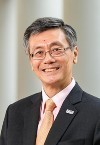 Professor Tan Eng Chye is President of the National University of Singapore. A passionate academic and educator, Prof Tan is a member of the World Economic Forum’s Global University Leaders’ Forum, as well as Singapore’s Future Economy Council, which is tasked with driving the growth and transformation of the country’s future economy.
Professor Tan Eng Chye is President of the National University of Singapore. A passionate academic and educator, Prof Tan is a member of the World Economic Forum’s Global University Leaders’ Forum, as well as Singapore’s Future Economy Council, which is tasked with driving the growth and transformation of the country’s future economy.
This article was first published in the Times Higher Education World University Rankings 2023 supplement and first appeared in NUSNews on 4 November 2022.
Exploring Teochew Culture Inheritance Through Art of Temple Carving
IN BRIEF | 10 min read
- A profile by Lianhe Zaobao of undergraduate and FASS Student Ambassador Tan Guan Fan (NUS History) who recently attained the prestigious Ngee Ann Kongsi Distinguished Scholar Award, and whose recently published paper “If Roofs could Talk and Walls could Speak: The Understated Arts of Yueh Hai Ching Temple” was a lauded study in Teochew culture and the arts. .
Click through image below to read this piece.
This article first appeared in Lianhe Zaobao and NUSNews on 26 October 2022.
Lessons from the 20th Communist Party Congress to Singaporean Youths
IN BRIEF | 10 min read
- An article by Tan Zhan Tiam, Year 1 student from the NUS Faculty of Arts and Social Sciences (Political Science and Chinese Studies), and Tai Kai Zhen, member of the Business China Youth Chapter in Lianhe Zaobao.
Click through image below to read this piece.
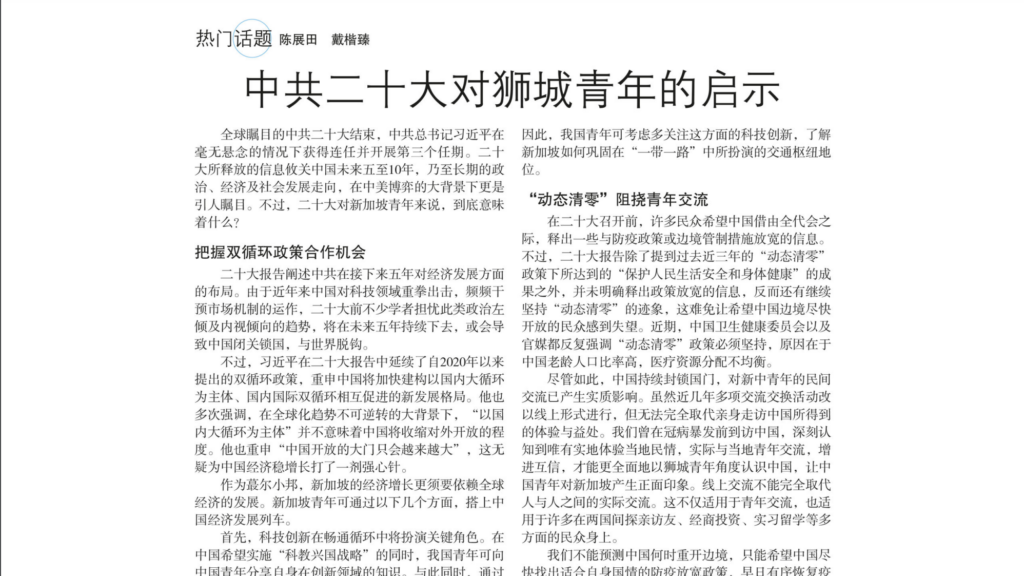
This article first appeared in Lianhe Zaobao and NUSNews on 26 October 2022.
Call for Nominations | FASS Inspiring Mentor Award 2022
IN BRIEF | 3 min read
- We invite NUS FASS members of staff to nominate the colleagues who have served as their truly inspiring mentors - who have gone beyond the call of duty to positively impact their work and life - for FIMA 2022 honours.
Click through image below (or just write to fassmentoraward@nus.edu.sg) to file your nomination.
“天猛公”与国大携手 首办中秋雅聚推动跨文化交流
来源:联合早报 2022年9月13日
文 / 刘钰铃
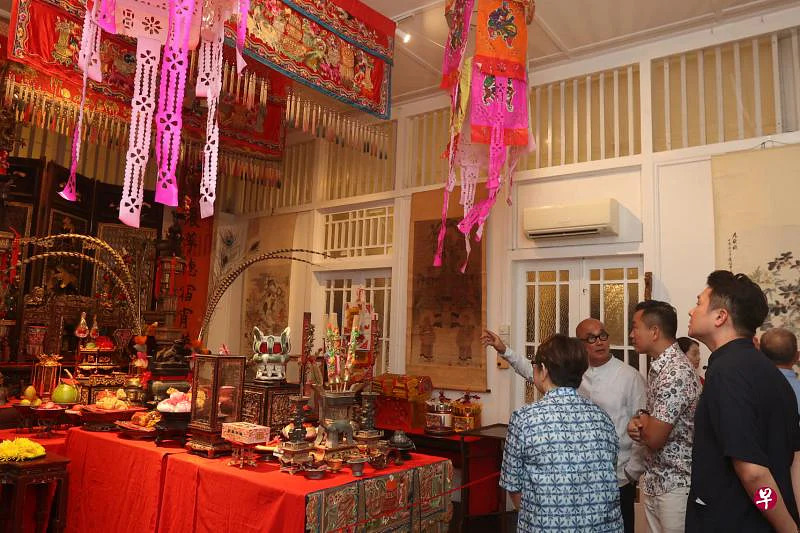
哥本咨鲁区议员郭献川(右一)和文化、社区及青年部兼社会及家庭发展部高级政务次长蔡瑞隆(右二)出席天猛公和国大联办的“中秋雅聚天猛公” 活动, 并参观用来祭拜太阴星君的祭坛。(饶进礼摄)
非盈利艺术慈善机构天猛公艺术基金会和新加坡国立大学,将在艺术和文化领域展开合作,让学生有更多机会同这些领域的专人交流。双方在星期天(9月11日)首次联合举办中秋庆祝活动,让公众一边观赏机构收藏的文物,一边欢庆中秋。
天猛公艺术基金会(Temenggong Artists-In-Residence,简称天猛公)同国大文学暨社会科学院今年8月签署了谅解备忘录。在合作计划下,这个学院的学生将可在天猛公实习,以及参加实地考察等双方联办的学习活动。学院的师生也有机会深入研究和了解天猛公收藏的文物,并用这些文物合作策划展览。
夭猛公屈下的艺术家也会为国大生举办讲座或表演,双方也计划一起策划与艺术和文化遗产主题相关的讲堂课程。
捐7万5000元设“天猛公奖” 表彰研究艺术史优秀生
另外,天猛公也捐赠7万5000元给文学暨社会科学院历史系设立"天猛公奖"。这个奖项不仅表彰研究艺术史或修读艺术史副修课程的优秀生, 历史系学生若在荣誉学士论文研究博物馆、文化遗产、艺术或视觉文化并取得优异成绩,也可获颁奖项。
在天猛公义务从事艺术管理工作的李凯龄受访时说:"天猛公希望为学生提供一个课堂以外的学习体验, 我们会与校方分享我们的资源, 让学生有机会协助天猛公属下的策展人一起进行研究, 从而推动双方之间的跨文化交流。"
国大中文系主任王昌伟教授认为, 双方的合作有助学生累积实战经验。
"通过这项合作, 学生不仅能在课堂上掌握理论方面的训练, 还能借由义务或实习的方式, 参与艺术领域的工作, 这对本地的艺术发展也很有意义...... 学生如果能累积这些经验, 以后 也可以有更多的机会往这方面发展。"
这场由天猛公与国大文学暨社会科学院联办的"中秋雅聚夭猛公"活动在天猛公路28号的黑白洋房举行。除了参与猜灯谜和传统灯笼制作与彩绘等活动,公众也能观赏到用来祭拜太阴星君的供品和祭坛,以及在一个重现古代文人书斋场景的"古香书斋"展厅中,看到宋代 、明代和清代的相关文物。
文化,社区及青年部兼社会及家庭发展部高级政务次长蔡瑞隆和哥本峇鲁区议员郭献川受邀出席这场中秋活动。蔡瑞隆致辞时说, 在新加坡这样一个多元文化和种族的小国, 我国的艺术、文化和文化遗产给予国人独特的身份认同,而把本地的文化遗产保存下来 ,也对下一代和我国的繁荣至关重要。
NUS FASS Faculty and Alumni Bag Top Literary Awards
IN BRIEF | 3 min read
- Professor Wang Gungwu (NUS History) and two FASS alumni - Yeow Kai Chai (NUS English, Linguistics and Theatre Studies) and Wong Koi Tet (NUS Chinese Studies) - won in three separate categories, and Emeritus Professor Edwin Thumboo (NUS English, Linguistics and Theatre Studies) was presented with the SBC Achievement Award at the 2022 Singapore Literature Prize ceremony held on 25 Aug 2022 at the Victoria Theatre..

Professor Wang Gungwu and two NUS Faculty of Arts and Social Sciences (FASS) alumni, Yeow Kai Chai and Wong Koi Tet, won in three separate categories at the 2022 Singapore Literature Prize ceremony held on 25 Aug 2022 at the Victoria Theatre. At the same ceremony, Emeritus Professor Edwin Thumboo was presented with the SBC Achievement Award by Guest-of-Honour Mr Edwin Tong, Minister for Culture, Community and Youth and Second Minister for Law, in recognition of his significant contributions to the literary arts scene in Singapore.
The Singapore Literature Prize was established in 1992 by the Singapore Book Council and is Singapore's oldest ongoing literary award in all four official languages. This year's Singapore Literature Prize saw 12 winners picked from almost 200 submissions, with 35 local and foreign judges giving recognition and affirmation to the best literary works by Singapore writers.
Passing Stories on to the Next Generation
University Professor at NUS FASS, Prof Wang, a renowned historian and leading public intellectual, was named this year's Singapore Literature Prize winner for Creative Nonfiction in English. He made history by becoming one of the two oldest winners of the Singapore Literature Prize at 91 years old, along with literary pioneer Suratman Markasan, also 91, who won for Creative Nonfiction in Malay.
Prof Wang co-authored his winning book, Home is Where We Are, with his late wife Margaret Wang, journaling his university education in Singapore and the UK, and the early years of his career as an academic, capturing the excitement, ambition and choices of a generation that saw it their responsibility to build the new nations of Southeast Asia.
Home is Where We Are is the second part of his memoirs after Home is Not Here, an account of his younger days which he spent in three different countries before entering university.
Prof Wang said Margaret and him had hoped that their book will inspire other parents and families to do likewise and write their stories to pass on history, heritage and valuable lessons to the next generations.
Sharing his thoughts on the prize, Prof Wang said, "My family and I are honoured with this recognition. The inspiration for Home is Where We Are came from my late wife, Margaret. She regretted not knowing more about her mother and, 20 years ago, wrote her story to our children. She wrote so well and the children liked her story so much that they turned to me for my story. I eventually did."
"Years later, I was persuaded to publish this story of my childhood as Home is Not Here. My Singapore friends asked why I stopped before my joining the University of Malaya and before meeting Margaret. That led me to frame my book around what Margaret had earlier written," he recalled. "With her agreement and my family's approval, the second book answered the question, 'Where then is home?' with Margaret's answer, 'Home is where we are', and that became the title of the second book."
Prof Wang was conferred the NUS Honorary Degree of Doctor of Letters for his dedication to Sinology, remarkable intellect, trailblazing vision, and other public contributions in July this year.
Two Alumni Bag Top Poetry Prizes
Mr Yeow, an NUS FASS alumnus and renowned poet, fiction writer and editor, won the Singapore Literature Prize for Poetry in English. His poetry collection titled One to the Dark Tower Comes, published in 2020, is a personal and collective quest to uncover answers to life, death, grief, happiness, and the violence wrought on one another.
A former journalist, and director of the Singapore Writers Festival from 2015 to 2018, Mr Yeow graduated with a Master of Arts from NUS FASS in 1999. This is his first Singapore Literature Prize win.
Reflecting on his win, Mr Yeow said, "I'm heartened by the recognition for my third book One to the Dark Tower Comes. Much of my own poetics has its foundation in my undergraduate years taking English Language and Literature at FASS, getting inspired by actual poets, including seniors like Boey Kim Cheng and academics such as professors Edwin Thumboo, Arthur Yap, Lee Tzu Pheng and Leong Liew Geok."
"A particular course on Contemporary American Literature by Dr Gilbert Adair was especially life-changing and opened up my eyes to more avant-garde approaches, and so I gave heartfelt thanks to him, and all at the department who have enriched my creative journey," he added.
Fellow NUS FASS alumnus, Wong Koi Tet, took home his third Singapore Literature Prize, this year for for Creative Nonfiction in Chinese for his book, Little Things. The book is a collection of 50 non-fiction pieces of prose published in his personal column in local Chinese daily, Lianhe Zaobao, charting what he cites as his personal journey through the years.
Describing his book, Mr Wong said, "Little Things originated as a column I wrote for the local Chinese newspaper for a period of two years. It is both literally and symbolically about the small objects that are familiar and common to all of us. Though this book won the Singapore Literary Prize, life is not about winning, but as in the title of my book, those little things that we cherish and hold dear to our hearts. Books are one of the little things that matter the most."
Mr Wong had a double win at the 2020 Singapore Literature Prize in both the Fiction in Chinese and Creative Nonfiction in Chinese categories.
A former journalist as well, Wong graduated with a Bachelor's degree with honours in Chinese Studies from NUS FASS in 1998.
A Lifetime of Contribution to Singapore's Literature and Arts Scene
Prof Thumboo was NUS' longest serving Dean of FASS from 1980 to 1991 and was the first Chairman and Director of the University's Centre for the Arts from 1993 to 2005. He is currently Emeritus Professor, a position he has held since retiring from full-time teaching in September 1997. Prof Thumboo was awarded the Distinguished Arts and Social Sciences Alumnus Award by the faculty in 2016 in recognition of his outstanding contributions as a poet, scholar, academic leader and champion of Singapore literature.
The SBC Achievement Award was bestowed on Prof Thumboo at the 2022 Singapore Literature Prize ceremony to mark his achievements not only as a writer but also as an educator and mentor, and his tremendous efforts to help to shape the literary arts scene in Singapore.
Prof Thumboo has been hailed the unofficial poet laureate of Singapore and was the first recipient of the Cultural Medallion for Literature in 1979, widely recognised as the pinnacle arts award for dance, theatre, literature, music, photography, art and film in Singapore.
This story first appeared in NUSNews on 2 September 2022.
Situation in Taiwan Strait: Lessons for Southeast Asian Youth
IN BRIEF | 6 min read
- Commentary by undergraduate Tan Zhan Tiam (NUS Political Science and NUS Chinese Studies) in Lianhe Zaobao.
Click through image below to read this piece.
This article first appeared in Lianhe Zaobao and NUSNews on 9 August 2022.
Professor Kenneth Dean awarded the Kwan Im Thong Hood Cho Temple Professorship at Yale-NUS
 Prof Kenneth Dean, the Raffles Professor for Humanities in the Department of Chinese Studies, NUS as well as the Research Cluster Leader for Religion and Globalisation in the Asia Research Institute, NUS, was awarded the Kwan Im Thong Hood Cho Temple Professorship at Yale-NUS in July 2022.
Prof Kenneth Dean, the Raffles Professor for Humanities in the Department of Chinese Studies, NUS as well as the Research Cluster Leader for Religion and Globalisation in the Asia Research Institute, NUS, was awarded the Kwan Im Thong Hood Cho Temple Professorship at Yale-NUS in July 2022.
Prof Dean shared that he was deeply honored to receive the Kwan Im Thong Hood Cho Temple Professorship. The Professorship is supported by the Kwan Im Thong Hood Cho Temple which is dedicated to the Chinese Goddess of Mercy and well-known for its philanthropy. Prof Dean is the third professor to be awarded the Kwan Im Thong Hood Cho Temple Professorship after Prof Jay L. Garfield (currently Doris Silbert Professor in the Humanities and Professor of Philosophy, Logic and Buddhist Studies at Smith College), and Prof Bryan W. Van Norden (currently James Monroe Taylor Chair in Philosophy at Vassar College, and Chair Professor in Philosophy at Wuhan University).
“Since my field of research is Chinese religion, I am especially delighted to hold this chaired professorship. I have very deep respect for the sustained and substantial philanthropy of this great Singaporean Buddhist temple in the areas of health care, social services, and education,” Prof Dean said.
Prof Dean hopes that this new position will enable him to introduce more students at Yale-NUS, NUS, and across Singapore to the incredible richness and diversity of Chinese ritual life in Singapore. “In my previous research, I mapped out the locations of over 800 Chinese temples in Singapore on my Singapore Historical GIS website. This was a digital archival project which also studied how Singapore was built from the ground up by cultural and religious institutions. By conserving history, the past will not disappear so easily,” he said.
During this professorship, Prof Dean is hoping to complete two follow-up volumes to Chinese Epigraphy of Singapore: 1819-1911, with one focused on temples and regional, clan, and trade associations with dated inscriptions from 1911-2022, and a second on the United or Joint Temples of Singapore.
Prof Dean explained, “There are over 360 temples which are gathered into 68 such United Temples in Singapore. They are full of unique cultural life with temple leaders, spirit mediums, and members who have memories related to the ritual communities and long-lost village life of Singapore. With support from the professorship, I would like to conserve oral histories from these individuals while involving Yale-NUS students in the crucial process of archiving Singapore’s history.”
This article first appeared in Yale-NUS Stories on 26 July 2022.
NUS Confers Honorary Degrees on Prof Tommy Koh and Prof Wang Gungwu
IN BRIEF | 10 min read
- The University also celebrates the achievements of 13,975 graduates from the NUS Class of 2022; Philanthropic gift to establish new professorship in humanities and sciences.

The National University of Singapore (NUS) today conferred its highest honour on two outstanding scholars and alumni: Professor Tommy Koh and Professor Wang Gungwu. They received honorary degrees from Mr Po'ad Mattar, NUS Pro-Chancellor, at the Main Ceremony of NUS Commencement 2022, which kicked off a series of 28 graduation ceremonies held over 10 days from 6 to 17 July.
The NUS Class of 2022 comprises 13,975 graduates: 7,571 students will receive Bachelor's degrees and 6,404 will receive graduate degrees.
Prof Koh was presented with the Honorary Degree of Doctor of Laws, in recognition of his significant accomplishments, contributions and impact on NUS and globally in various areas including international law, diplomacy, arts, culture and heritage, and nature and the environment, and his distinguished services to Singapore.
Prof Wang was conferred the Honorary Degree of Doctor of Letters, in recognition of his significant accomplishments and impact on NUS and globally in academia and education, his outstanding scholastic achievements and his contributions towards highlighting NUS as a significant research venue for multiple fields in Southeast Asia.
They joined some 200 graduates from the NUS Faculty of Arts and Social Sciences (FASS) who also received their degrees at the Main Ceremony held today.
NUS President Professor Tan Eng Chye said, "We are immensely proud to confer honorary degrees on two exceptional NUS alumni - Prof Tommy Koh and Prof Wang Gungwu - who fully embody the ethos of NUS. In their lifelong pursuit of knowledge and excellence, they have made a deep and lasting impact on Singapore and globally in their respective fields. NUS is truly grateful for their many years of dedication and service."
Addressing graduates from the Class of 2022, Prof Tan encouraged them to take hold of the great possibilities and rise above the uncertainties in a world of dynamic change. "I am fully confident that the graduates of NUS today share the same ethos of excellence and service as the community of generations past. In time to come, you will undoubtedly make your own unique contributions, and become the vanguard in elevating our collective prosperity and well-being."
This year, NUS will also be presenting pioneer graduates from 17 programmes (Please refer to the Annex 1 for the list of programmes).
2022 Honorary Doctor of Laws Recipient - Prof Tommy Koh

Prof Koh has dedicated his professional life to NUS, to Singapore, and to the world. He was a member of the first cohort of law students at the then University of Malaya - NUS' predecessor institution - from 1957 to 1961. With graduate degrees from Harvard and Cambridge, he joined NUS Law and went on to serve as Dean, later chairing the Faculty's Advisory Board for a decade. He has also served as Director and Chair of the Institute of Policy Studies (1991-2009) and Chairman of the Centre for International Law (2009-2022). He has also served as Rector of Tembusu College (2011-2022) and the Chairman of the Lee Kong Chian Natural History Museum's Advisory Committee (2015-2022). Prof Koh was appointed as Emeritus Professor in April 2022 in recognition of his distinguished careers at the faculty and outstanding contributions to the field of law.
In addition to this extensive service to NUS, he has also played key roles for Singapore, including as Permanent Representative to the United Nations (1968-1971, 1974-1984), and Ambassador to the United States (1984-1990). He was founding Chairman of the National Arts Council (1991-1996), Chairman of the National Heritage Board (2002-2011), and founding Executive Director of the Asia-Europe Foundation.
Prof Koh has also had a transformative role globally, including through his presidency of the United Nations Conference on the Law of the Sea (1981-1982) and chairmanship of the Preparatory Committee for and the Main Committee at the 1992 Earth Summit. He has received many honours, including an Honorary Doctorate of Laws from Yale University (1984), the Elizabeth Haub Prize for Environmental Law (1996), the UNEP Champion of the Earth Award (2006), and the Great Negotiator Award from Harvard (2014).
Please refer to Annex 2 for the citation.
2022 Honorary Doctor of Letters Recipient - Prof Wang Gungwu

Prof Wang is a leading figure in Sinology, a renowned public intellectual, and a visionary leader and administrator.
Professor Wang received his Bachelor of Arts (Hons) and Master of Arts degrees from the University of Malaya in Singapore. In 1957, he completed his doctorate on North China with University of London. His teaching career took him from the University of Malaya (Singapore and Kuala Lumpur, 1957-1968, Professor of History 1963-68) to The Australian National University (1968-1986), where he was Professor and Head of the Department of Far Eastern History and Director of the Research of Pacific Studies. From 1986 to 1995, he was Vice Chancellor of the University of Hong Kong.
In NUS, Prof Wang served in various leadership roles, including the Director of East Asian Institute of NUS (1997-2007), and Chairman of the Governing Board of the Lee Kuan Yew School of Public Policy (2005-2017). As a highly regarded scholar, his views and expertise have proven to be invaluable to policymakers and diplomats.
In 2007, Prof Wang was conferred the title of University Professor by NUS for his outstanding leadership to the University and community, and in 2009, he was awarded an Honorary Doctor of Letters to mark Cambridge University's 800th anniversary. In 2020, Prof Wang was awarded the Tang Prize in Sinology for his "trailblazing and dissecting insights on the history of the Chinese world order, overseas Chinese, and Chinese migratory experience". In the same year, he received the Distinguished Service Order in Singapore.
Please refer to Annex 3 for the citation.
About the NUS Peggy Wai Chee Leong-Hochstadt Professorship in Humanities and SciencesNUS also announced a generous gift by its illustrious alumnus and former top civil servant Mr Herman Ronald Hochstadt to establish the Peggy Wai Chee Leong-Hochstadt Professorship in Humanities and Sciences at FASS. Named after the late Mrs Hochstadt who was the first Chief Librarian of NUS, the University is privileged to honour her leadership and contributions to the NUS Libraries and to the NUS community.
Building on Mr Hochstadt's strong belief in the transformative power of education and in line with the spirit of cross-disciplinary learning at the NUS College of Humanities and Sciences (CHS), the new professorship will attract and support leading professors in the fields of English Language, English Literature, Theatre Studies, History, Philosophy, or Mathematics, further enriching and enhancing teaching and research in CHS.
Mr Hochstadt has been a long-time supporter of FASS and has previously set up the Hochstadt Scholarship in the Humanities in FASS in 2014. In 2019, NUS conferred on Mr Hochstadt the Distinguished Alumni Service Award, in recognition of his outstanding contributions to public service, and unwavering support for the NUS community.
This article first appeared in NUSNews on 6 July 2022.
Commencement 2022: Kickstarting a Season of Celebration and Achievement
IN BRIEF | 10 min read
- NUS celebrates the milestone accomplishments of 13,975 graduates through 28 in-person ceremonies.
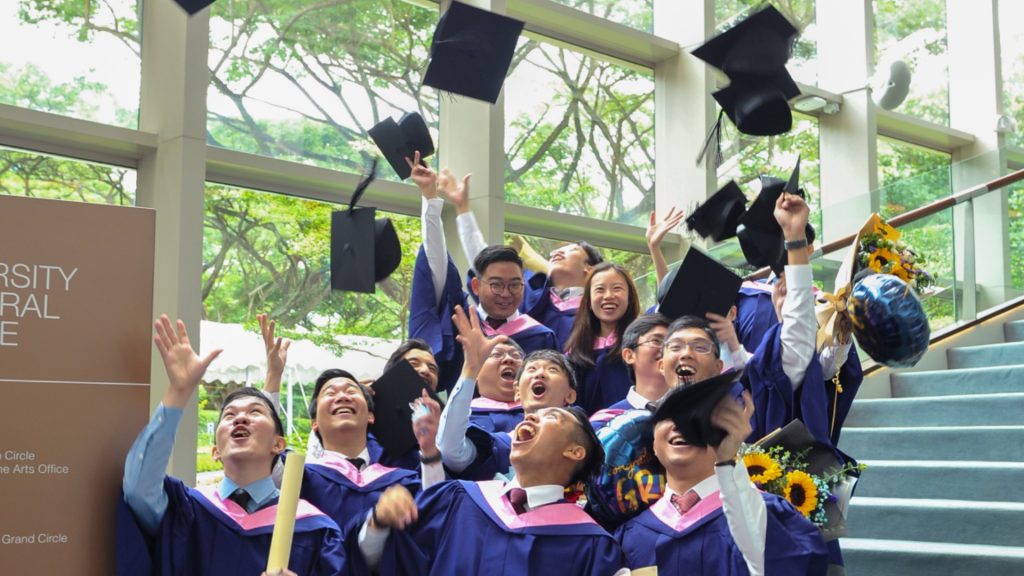
A long-awaited season of celebration is officially under way, with the inaugural ceremony of Commencement 2022 marking the milestone achievements of some 200 Faculty of Arts and Social Sciences (FASS) graduates, and seeing the conferment of two Honorary Graduates, Professor Tommy Koh and Professor Wang Gungwu.
Taking place at the University Cultural Centre, the ceremony kicked off bright and early on 6 July to an effervescent buzz of anticipation from the graduates and their loved ones, inaugurating a total of 28 in-person ceremonies to be held over the following 10 days.
In keeping with the Commencement traditions and the proud ceremonial heritage of NUS, the ceremony showcased the pageantry of the Ceremonial Procession, the fanfare, and playing of the National Anthem, all culminating in the highlight of the ceremony-the presentation of graduates. Graduates from the Class of 2022 celebrated their achievements amid the applause of family and friends, a momentous apogee of their time in NUS.

Speaking at the ceremony, NUS President Professor Tan Eng Chye reflected on the qualities needed for graduates to thrive in today's dynamic environment: an attitude of resilience and adaptability to overcome challenges, and a willingness and boldness to view problems as opportunities, exercise creativity, and apply their skills and knowledge to create solutions.
"For the Class of 2022, you are crossing the threshold into a wider world of dynamic change and great possibilities, but also of discomforting uncertainty," he said.
"But I am fully confident that the NUS graduates of today share the same ethos of excellence and service to community of generations past. In time to come, you will undoubtedly make your own unique contributions, and become the vanguard in elevating our collective prosperity and well-being."
Contributions to Law, Nature and Culture: Prof Tommy KohTwo illustrious NUS alumni were also honoured as Honorary Graduates for the Class of 2022-lawyer and diplomat Professor Tommy Koh, and historian Professor Wang Gungwu.
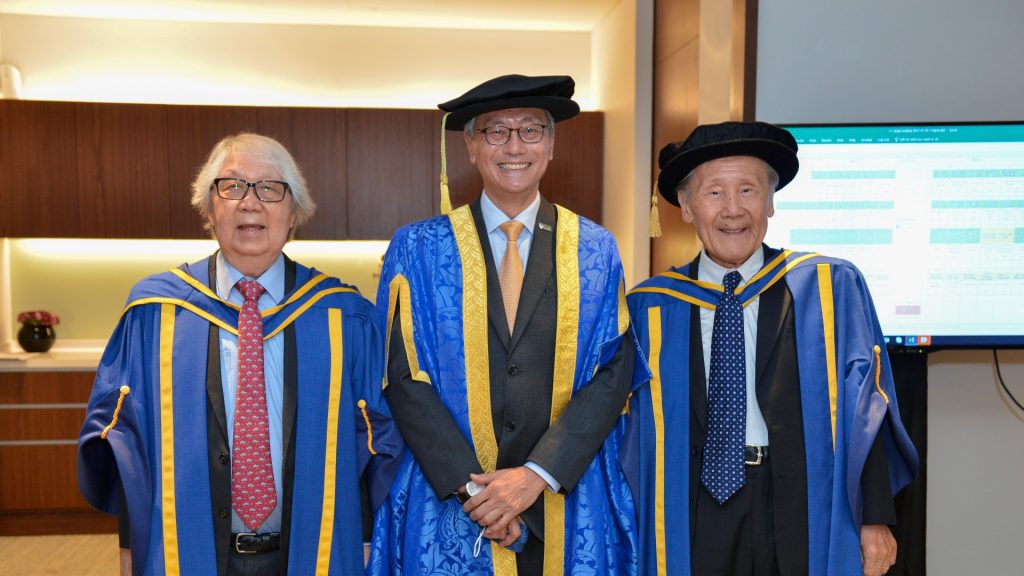
In recognition of his dedication as a practitioner-scholar and decades of service to the University, Singapore, and the world, Prof Koh, who wears many hats including Ambassador-at-Large at Singapore's Ministry of Foreign Affairs, Special Advisor of the Institute of Policy Studies, and founding Rector of NUS' Tembusu College, was conferred the Honorary Degree of Doctor of Laws.
Highlighting three areas on which he has focused his energies - law, nature, and culture - Prof Koh said, "I chose to study law, not to enrich myself, but to pursue justice and to promote the rule of law."
He also spoke about his work concerning nature and the environment, including chairing the 1992 Earth Summit, being patron of the Nature Society, and helping NUS establish the Lee Kong Chian Natural History Museum as its founding Chairman. "My vision is to live in harmony with nature. My agenda is to promote sustainability in all our endeavours," he added. "I am [also] glad that I have been able to play a very small role in transforming Singapore, from a cultural desert to a cultural oasis."
Delivering the citation for Prof Koh's conferment, Professor Simon Chesterman, Vice-Provost (Educational Innovation) and Dean of the NUS Faculty of Law and NUS College, referred to Prof Koh's "academic milestones [which] are but one strand of the rich tapestry of his professional life", as well as his leadership and guidance in education at NUS, and his eminent contributions to state and environmental diplomacy.
An Inspiring Story Worth Retelling: Prof Wang GungwuProf Wang, one of the world's foremost experts on the Chinese diaspora and Sino-Southeast Asian historical relations, was conferred the Honorary Degree of Doctor of Letters, the latest in a long list of accolades that includes the prestigious Tang Prize in Sinology, and the Distinguished Service Order of Singapore.

Reflecting on his time as a student of the University in colonial Malaya, Prof Wang said: "You can imagine how happy I am to be a graduand again with my alma mater. The university gave my generation a good start in life. It went on to adapt to the rapid changes of our time. In so doing, it has come out better and stronger."
He spoke about the "inspiring story worth retelling" of how the University had set out and followed its own aspirations, becoming a major centre of learning by being actively connected to the world, as well as regularly reinventing itself.
"The way our university strives to keep our humanity always in our sights is something to be very proud of. I hope that all of us graduating today, no matter where life leads us, will never hesitate to help our university to enhance this capacity to advance our human condition," Prof Wang stressed.
Prof Lionel Wee, Dean of FASS and co-Dean of the College of Humanities and Sciences, who delivered the citation on Prof Wang's conferment, lauded the latter as "an eminent figure and brilliant mind" who has made manifold contributions as a leading figure in Sinology, a renowned public intellectual, and a visionary leader and administrator at leading academic institutions around the world.
"This doctorate symbolises the meaningful connections between Professor Wang and the University, and it celebrates the long-standing contributions and value that Professor Wang's scholarly insights bring to Singapore, to Southeast Asia and, indeed, to the world," he said.
Parsing the Path ForwardInfusing the celebrations with a spirit of introspective gratitude, Valedictorian Mr Nickson Quak, who is graduating with a Bachelor of Arts with Honours (Highest Distinction) in Philosophy, Politics, and Economics said, "As varied as our journeys may have been, each and every one of us graduates here could have only made it thus far because of the unwavering support that our parents, our families, our loved ones, and our friends have so generously afforded us."

His words further summarised the spirit of determination and community that will carry graduates onwards in their lives: "If [the journey ahead] appears daunting to you, I say to you: fret not… because when you look to your left and your right, you see the resilient men and women who, forged by the challenges brought upon by the global pandemic, will always offer you a helping hand."
This story first appeared in NUSNews on 6 July 2022 as part of NUS News' coverage of Commencement 2022, which celebrates the achievements of our 13,975 graduates through 28 in-person ceremonies. For more on Commencement, look out for our upcoming graduate profiles, check out the official Commencement website, or look up (and tag) #NUS2022 and #NUSFASS on NUS' and FASS' social media channels!
#ICYMI: FASS@CHS Open House 2022 — View On Demand Here!
IN BRIEF | 3 min read
- If you missed the NUS College of Humanities Open House 2022, worry not. All the talks and engagement sessions of 11 and 14 May are available for your viewing on-demand here.
Prospective students considering their offer but have missed the NUS College of Humanities Open House 2022 do not have to worry about missing out on information and insights they may need to make their decisions.
All the talks and FASS@CHS engagement sessions listed below are available for your viewing on-demand here or at https://bit.ly/FASSatCHSOH2022.
NUS CHS Open House 2022 Online (11 May 2022)
- Introduction to CHS, CHS Core Curriculum, Student Experiences & Learning Pathways
- Experiential Learning & Career Preparation, and Student Leaders Sharing
- BES-XDP (Bachelor of Environmental Studies Cross-Disciplinary Programme)
- DSE-XDP (Data Science and Economics Cross-Disciplinary Programme)
- PPE-XDP (Philosophy, Politics, and Economics Cross-Disciplinary Programme)
Introduction to CHS
Experiential Learning, Career Preparation, Student Leaders
BES-XDP
DSE-XDP
PPE-XDP
South Asian Studies
Education@FASS Depth, Diversity, and Difference I (11.30–1200)
Communications and New Media
Languages
Chinese Studies
Education@FASS Depth, Diversity and Difference II (1430–1500)
Anthropology
Economics
FASS@CHS Open House 2022 On-Campus (14 May 2022)
- The CHS Common Curriculum: FASS@CHS Integrated Modules
- South Asian Studies
- Education@FASS: Depth, Diversity & Difference I (11.30 am -12.00 pm)
- Communications and New Media
- Languages
- Chinese Studies
- Education@FASS: Depth, Diversity & Difference II (2.30 -3.00 pm)
- Anthropology
- Economics
NUS CHS Open House 2022: Discover #Interdisciplinary Education!
IN BRIEF | 5 min read
- The NUS College of Humanities and Sciences is hosting its Open House 2022 next week and all prospective students who have received offers are invited!
- A two-day hybrid programme – 11 May on Zoom (and viewable on CHS’ Facebook page) and 14 May on several locations across the NUS Kent Ridge campus, specifically the areas around the Faculty of Arts and Social Science (FASS), and the Faculty of Science (FoS) – CHS Open House 2022 aims to address all concerns a prospective undergraduate may have before committing to academic at the University and College.
- Highlights include opportunities to engage, discuss and explore academic pursuits, career development and student life at the College with key faculty and administrative staff and leadership — live and in person.

The NUS College of Humanities and Sciences is hosting its Open House 2022 next week and all prospective students who have received their offers are invited. As the deadline for them to accept their offers is looming, CHS has put together a programme aimed at answering all the questions they may have and clarifying all their concerns as much as possible.
Marking a cautiously calibrated return of the University to the normalcy of hosting large on-site events, this year’s CHS Open House is a two-day hybrid programme: 11 May on Zoom (and viewable on CHS’ Facebook page) and 14 May on several locations across the NUS Kent Ridge campus, specifically the areas around the Faculty of Arts and Social Science (FASS), and the Faculty of Science (FoS).*
11 May 2022 (Wednesday): The Essentials, OnlineThis a series of comprehensive information sessions (on Zoom and livestreamed on Facebook Live) covering everything new undergraduates need to know to get the most out of their education journey with CHS, including the:
- CHS Core Curriculum
- College’s three challenging but rewarding cross-disciplinary programmes
- Data Science and Economics (DSE-XDP)
- Environmental Studies (BES-XDP)
- Philosophy, Politics, and Economics (PPE-XDP)
- myriad Learning Pathways laid for you
- versatile career development programmes designed to prepare you for the future workplace
- CHS Student Experience—eye-opening and busy, yet energising and enriching
Speakers and panelists include CHS Co-Deans, Vice-Deans, key faculty staff members, career preparation and student services leader.
For more information and links to the 11 May sessions, click here.
14 May 2022 (Saturday): Get Personal, On CampusThe College is calling for prospective students to come on site, visit where they could well be spending their undergraduate years very soon, and speak to their future instructors and potential mentors. The full-day programme – running in key FASS and FoS locations across the NUS campus – offers:
- entry to witness and even participate in talks/lectures and panel discussions presented and hosted by award-winning instructors on a variety of academic subjects, interdisciplinary topics and specialised research areas
- face-to-face engagement with faculty, admin and student representatives from ALL Departments and student organisations under CHS, and opportunities to explore academic, financial aid and student activity options with the people in the know
- consultation with the career development teams of CHS
- guided Walking Tours across the facilities of FoS and FASS
For more information on the activities planned for 14 May, click here.
Discover Your #Interdisciplinary Future @ CHSThis Open House is the last chance for prospective students to learn more about the complete #interdisciplinary educational experience that they can expect at CHS. One that opens up a world of possibilities and equips them with skills and knowledge across the humanities, social sciences, physical sciences and applied sciences. One that inspires, cultivates and prepares them to work across diverse industries and sectors, with multidisciplinary teams, to solve some of the most complex wicked problems facing the world today — from social inequality to food shortage, unsustainable development and global warming. And one that grooms them to be the leaders of public institutions and private enterprise tomorrow.
* Campus shuttle bus services will be made available on 14 May to all visitors for easier movement across campus, which extends to Kent Ridge MRT.
FASS Alumni Honoured for Sterling Contributions to Nation and Society
IN BRIEF | 5 min read
- The NUS Faculty of Arts and Social Sciences (FASS) honoured five eminent alumni on 29 April 2022, presenting each with a FASS Distinguished Arts and Social Sciences Alumni Award 2021.
- The outstanding alumni were:
- Mr Peter Tan (Japanese Studies, ’92), Singapore’s Ambassador to Japan
- Mrs Josephine Teo (Economics, ’91), Minister for Communications and Information and Second Minister for Home Affairs
- Mr Haresh Sharma (English Language and English Literature, ‘90), Resident Playwright of The Necessary Stage
- Ms Denise Phua (English Language and Political Science, ‘83), Mayor of Central Singapore District
- Mr Low Thia Khiang (Chinese Studies, ‘81), former Secretary-General of the Workers’ Party
It was all smiles as five eminent alumni from the NUS Faculty of Arts and Social Sciences (FASS) took to the stage on 29 April to receive the FASS Distinguished Arts and Social Sciences Alumni Award 2021.
The outstanding alumni who took home the honours were:
- Mr Peter Tan (Japanese Studies, ’92), Singapore’s Ambassador to Japan
- Mrs Josephine Teo (Economics, ’91), Minister for Communications and Information and Second Minister for Home Affairs
- Mr Haresh Sharma (English Language and English Literature, ‘90), Resident Playwright of The Necessary Stage
- Ms Denise Phua (English Language and Political Science, ‘83), Mayor of Central Singapore District
- Mr Low Thia Khiang (Chinese Studies, ‘81), former Secretary-General of the Workers’ Party
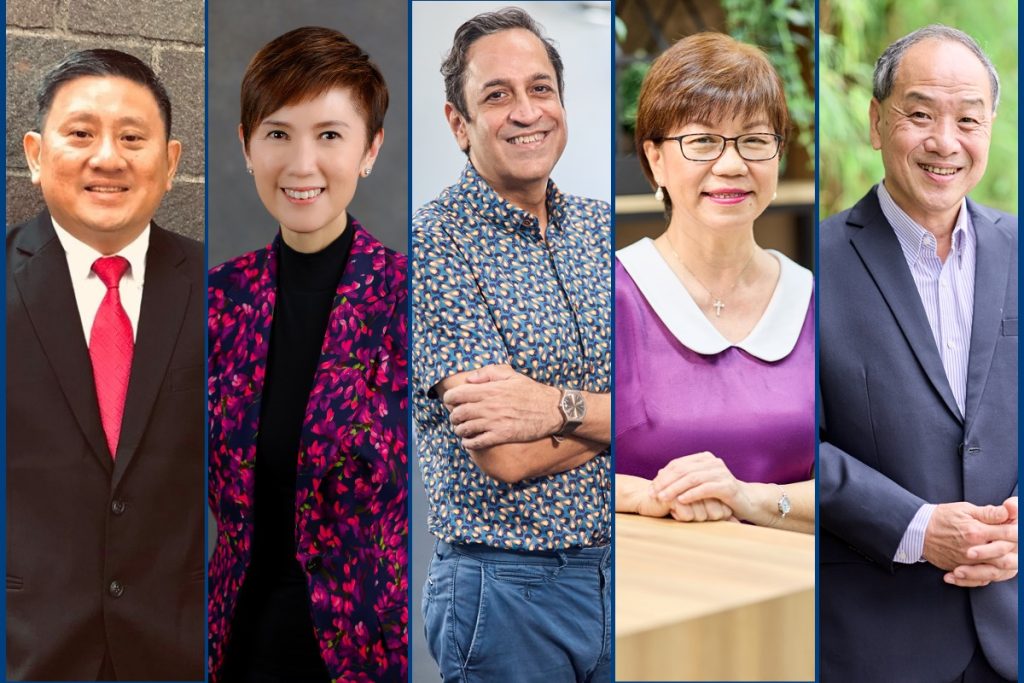
The 2021 awards ceremony had been postponed to this year due to the COVID-19 pandemic.
“These five individuals have contributed to Singapore in distinctive ways, and their passion, perseverance and pursuit of excellence serve as an inspiration to current and future generations of FASS students,” said NUS President Professor Tan Eng Chye.
“NUS is proud to have them as our alumni, and I hope they will continue to maintain close ties with their alma mater and with FASS. There is much we can do together, to nurture and inspire the next generation of Singaporeans to realise their potential.”
Echoing similar sentiments was FASS Dean Professor Lionel Wee who added that the five epitomise the spirit of service to the community. They play pivotal roles in Singapore and globally, through the arts, shaping of policies, diplomatic relations and community engagement.
The Honourees and their Contributions to Nation and SocietyMr Peter Tan has over three decades of foreign service experience under his belt. He has served with distinction in various capacities on issues related to areas including Southeast Asia, Northeast Asia, Europe and the United Nations since joining the Ministry of Foreign Affairs in 1992. He has vast diplomatic experience with regard to Japan, having previously served in the Singapore Embassy in Tokyo as First Secretary, as Counsellor, as well as Acting Minister-Counsellor and Deputy Chief of Mission. Mr Tan was awarded the Public Administration Medal (Silver) in 2008 for his contributions.
Playing a critical role in policymaking is Mrs Josephine Teo who is Singapore’s Minister for Communications and Information, Second Minister for Home Affairs, and Minister-in-charge of Smart Nation and Cybersecurity. She is also a member of the National Jobs Council and the Future Economy Council. Mrs Teo was the Minister for Manpower from May 2018 till May 2021, and previously served in the Prime Minister’s Office and other heavyweight ministries like Finance, Transport and Foreign Affairs. She has been a member of Parliament (MP) since 2006.
A critically-acclaimed playwright known for his socially-conscious plays, Mr Haresh Sharma began writing plays during his undergraduate days. As Resident Playwright of homegrown theatre The Necessary Stage, he has written more than 120 plays which have been staged in over 20 cities. His play on mental illness, Off Centre, was the first Singapore play selected by the Ministry of Education as a Literature text for the GCE N- and O-Levels. A 2015 Cultural Medallion recipient, Mr Sharma was also the first non-American to be awarded the prestigious Goldberg Master Playwright by New York University's Tisch School of the Arts in 2011.
Ms Denise Phua gave up a successful corporate career in 2005 to become a full-time special needs volunteer before joining politics in 2006. An MP for Jalan Besar Group Representation Constituency (GRC), she is best known for her advocacy for those at risk of being left behind in Singapore. She is one of the key architects behind three 5-year Enabling Masterplans for the Disabled in the country, and she is the President of Autism Resource Centre (Singapore) and Chairman of Autism Association Singapore – both being established autism charities. She supervises the Pathlight School – Singapore’s first autism special school which she co-founded – and helped start The Purple Parade, an annual parade to support inclusion.
Making his mark in politics is former politician Mr Low Thia Khiang who served as Secretary-General of the Workers’ Party between 2001 and 2018. He was one of two opposition MPs between 2001 and 2011 and was the de facto opposition leader between 2006 and 2018. Following the 2011 General Election, Mr Low became one of five elected opposition MPs of Aljunied GRC – and went on to represent the Bedok Reservoir–Punggol division between 2011 and 2020. Mr Low stepped down as the MP for Aljunied GRC prior to the 2020 General Election, making him Singapore's longest serving opposition MP with 29 years in service.
The Journey with FASS and BeyondDinner guests were treated to videos of the awardees who shared about their FASS experience – how it has shaped their lives and careers thereafter – as well as their career milestones.
Both Mr Sharma and Mr Tan shared fond memories of spending time in the libraries and reading rooms, as well as the invaluable friendships that blossomed beyond the classrooms in FASS. For Mr Sharma, NUS played a pivotal role in his theatre journey. He explained, “There was the huge support structure all around me, from the lunchtime performances where we could perform, to my lecturers and tutors, who when they found out that I was interested in Singapore theatre and literature, started encouraging me.”
Reminiscing on her university “days of freedom”, Ms Phua appreciated the considerable latitude afforded to her to select subjects that she loved and pick the lecturers she wanted to learn from. FASS, she shared, had helped hone her ability to think critically, developed her confidence to speak up, and made her realise the importance of finding solutions to problems to make a difference.
Established in 2015, the Awards recognise individuals for their distinguished scholarship and exemplary service to the Faculty, the University and Singapore. These outstanding recipients have made significant impact in various fields locally and internationally, which has contributed to the betterment and promotion of the arts and social sciences.
Click here for more info on this year’s award recipients.
This article first appeared in NUSNews on 29 April 2022.
Open House 2022 Engages and Excites
IN BRIEF | 30 min read
- The ever-popular NUS Open House hit new heights this year, attracting over 8.61 million visitors – a 26.2 per cent increase from the 6.83 million visitors that attended last year's online Open House.
- From 26 Feb to 5 Mar, visitors crowded the websites, livestreams, webinars and social media sessions hosted by the University's colleges, faculties and schools. There was something for everyone, and the event covered everything from academic courses to student life and entrepreneurship programmes.

The ever-popular NUS Open House hit new heights this year, attracting over 8.61 million visitors – a 26.2 per cent increase from the 6.83 million visitors that attended last year's online Open House.
From 26 Feb to 5 Mar, visitors crowded the websites, livestreams, webinars and social media sessions hosted by the University's colleges, faculties and schools. There was something for everyone, and the hybrid event covered everything from academic courses to student life and entrepreneurship programmes.
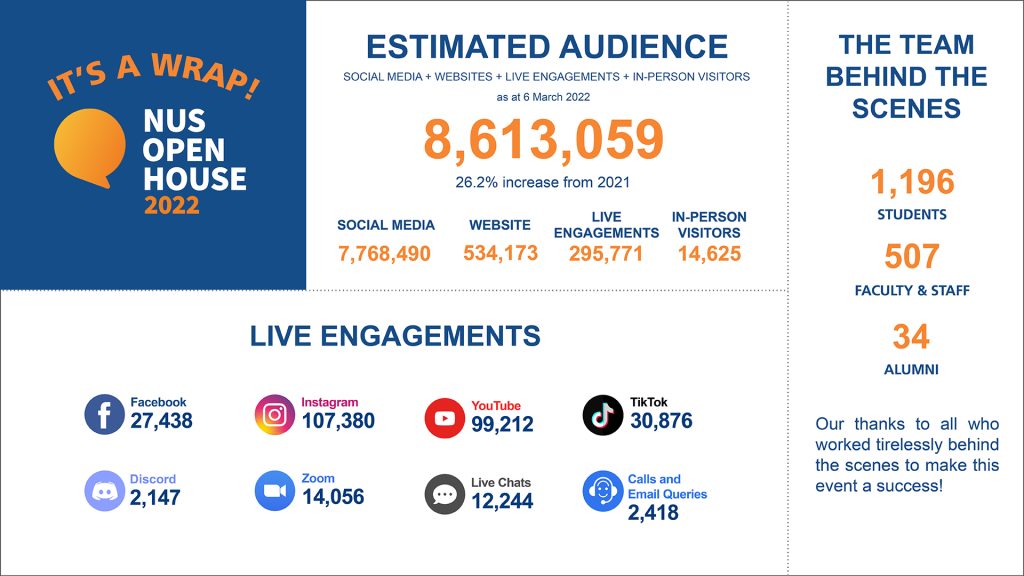
While much of the engagement happened online, prospective students got to meet NUS students and staff face-to-face for the first time since the pandemic started.
The physical Open House, held one sunny Saturday on 5 Mar, included numerous booths showcasing the University’s wide-ranging academic options and vibrant student life; sample classes and talks to get a taste of varsity life; and tours of the different colleges, faculties, and schools.
Prospective students gave the hybrid format a thumbs-up.
Joshua Chua, an alumnus of Anderson Serangoon Junior College, appreciated the online sessions and felt the physical Open House was a huge differentiating factor.
“The (physical) Open House really gave me a good image of what living and studying at NUS could look like by virtue of being an in-person event as opposed to it being virtual, so I'm really grateful to NUS and everyone involved for having this opportunity during the pandemic,” he said.
On her part, Hwa Chong Institution alumna Elsie Woo, who attended both the online and in-person sessions, said, “The experience was really welcoming and wholesome, and really exposed me to NUS as a whole.”
Showcasing the country’s first honours college
One of the highlights this year was the NUS College, Singapore’s first honours college. It will accept its first batch of students this year.
Prospective students were treated to online webinars on the College’s distinctive curriculum, its global pathways, and its focus on hands-on experiential learning. In more intimate breakout rooms, staff and student volunteers readily answered questions about student life and academic pathways. By having a home college or faculty – say Business or Science – while simultaneously being enrolled at NUS College, students will be able to get an educational experience that is as broad as it is deep.
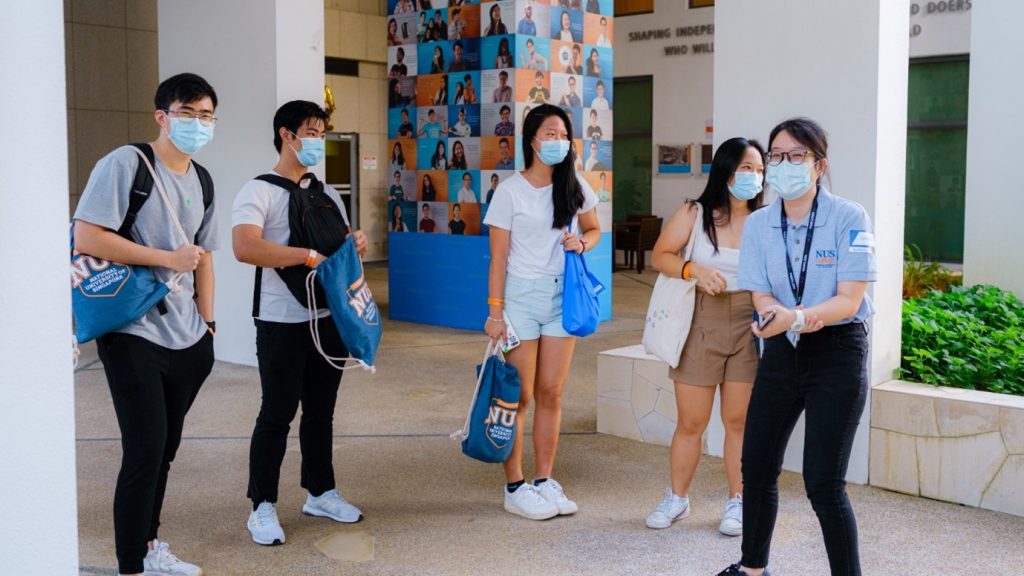
The in-person activities featured a tour of the facilities and residential options that NUS College students would be able to enjoy.
Elsie Woo was one of many students drawn to NUS College’s unique offerings.
“I attended a few webinars, including introductory talks for NUS College and Food Science and Technology,” said Elsie, who also visited many booths in-person.
“The sessions were very well-planned and the seniors were extremely helpful and patient.”
Nanyang Polytechnic alumnus Koh Jin Yuen focused his time on NUS College, attending the College’s guided tour and virtual sharing sessions.
“The NUS College tour was informative as I got to ask the facilitators about their experiences. I think the curriculum is very meaningful,” said Jin Yuen.
“The Open House helped to deepen my understanding of how NUS College works, and allowed me to better understand the lifestyle of a student from NUS College.” He is intending to apply for the Information Systems programme offered by NUS Computing, as well as NUS College.
Ramping up interdisciplinary offerings
Exciting developments in the realm of interdisciplinary education—a major theme that NUS has been championing—were foregrounded at the Open House, with the College of Design and Engineering (CDE) also taking in its inaugural cohort. A result of the merger of the Faculty of Engineering and the School of Design and Environment, CDE is set to transform the NUS educational experience.
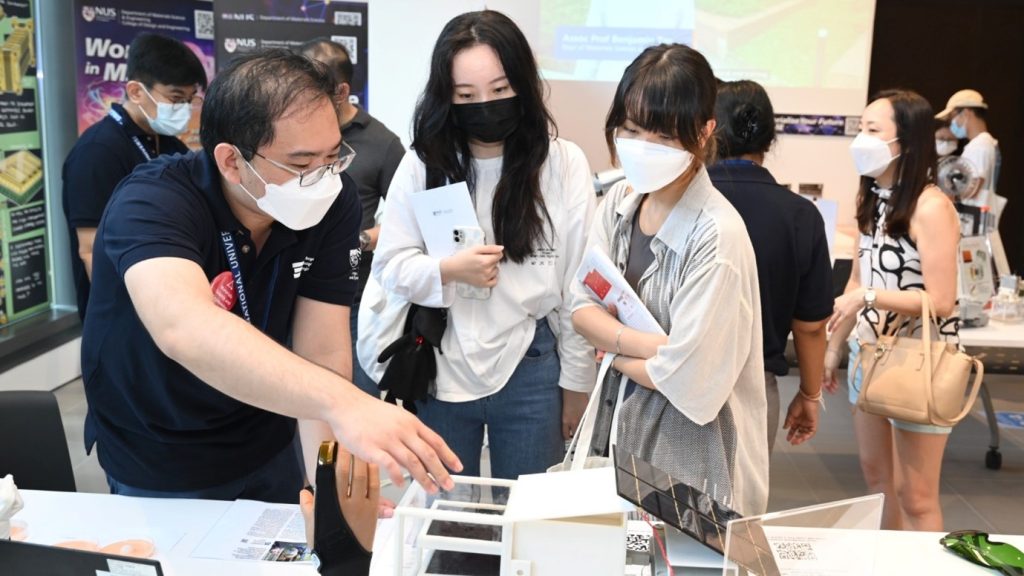
Across five galleries and 19 sub-categories, including Architecture, Industrial Design, Materials Science and Engineering, Biomedical Engineering, and Civil Engineering, visitors were presented with an informative display of the wide range of courses and programmes that will be on offer in the new College.
Raffles Institution alumna Grace Zai, who visited the Designing the Future exhibition and galleries, said, “The Engineering galleries were very informative as I could ask questions I had about the course, as well as student life, and get a clearer picture of what I would be studying and doing. It helped me make a more informed decision on my choices.”
Grace is considering applying to Engineering Science and Architecture, as well as Mechanical Engineering and Electrical Engineering with a specialisation in robotics.
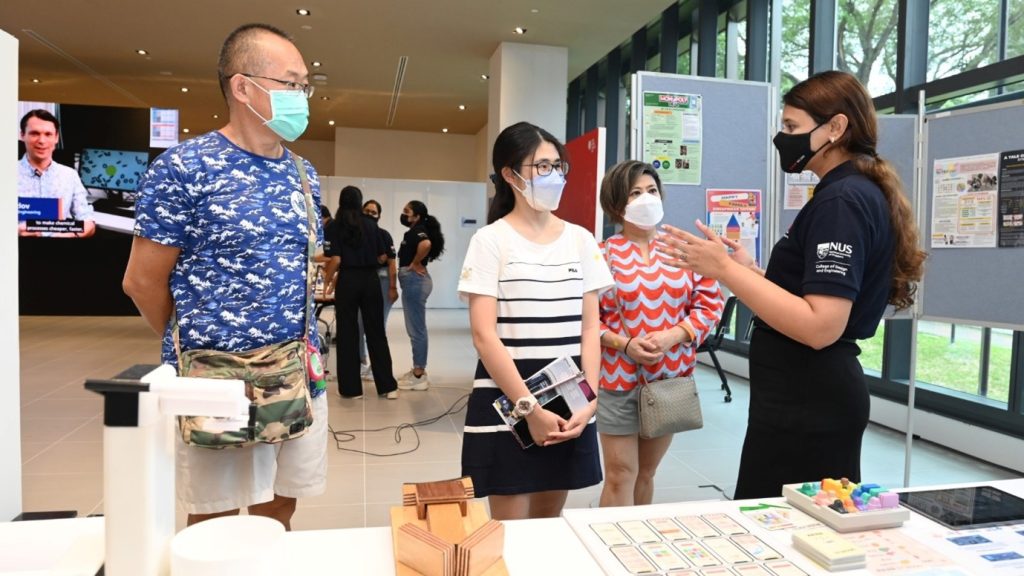
There were also panel discussions, both online and in-person, where faculty and current students interacted with prospective students to share their experiences and answer questions about the new interdisciplinary curriculum.
“As a prospective student, I got to see first-hand the school facilities, as well as the accommodations. My experience was pretty enriching and enlightening because I could ask the professors questions I had in mind and learn more about the courses,” said Timothy Tay, a graduate of Victoria Junior College who visited the SDE gallery on Sustainable Innovations.
“For example, I did not realise Project Facilities Management (PFM) was recently changed to Infrastructure Project Management (IPM). The professor explained that students will now graduate with a BEng degree rather than a BSc degree,” he recalled, referring to the first interdisciplinary full-time undergraduate programme to cover engineering, design, management, technology, building science and law modules.
Information was also available on the vibrant student life of the College’s various clubs and societies, as well as career programmes that enable students to better understand their interests and what it takes to marry that with industry skills and experience.

“The NUS Open House provided me with a more informed perspective on the courses offered in NUS. The various booths set up and run by students allowed for quick chats about what the courses have to offer. The responses by the students and professors were engaging and genuine, which I found informative in making my choice for courses in NUS,” said Kalepu Sai Sri Akshath, who attended CDE’s online and in-person events with his family and is intending to apply to Computer Engineering.
Drone-sensing demonstrations and the Solar Roof Tour, 5G Lab Tour, and BEEHUB Tour further showcased the College’s manifold facilities. Visitors also got a first-hand experience of NUS’ very own net-zero energy building through tours at SDE4, itself a product of both architecture and engineering, and the first of its kind in Singapore.
A marriage of the humanities and sciences
Continuing in the vein of interdisciplinarity and equipping students with a multifaceted, integrated toolbox of skills to thrive in the future economy is the College of Humanities and Sciences (CHS), which will be accepting its second intake this year.
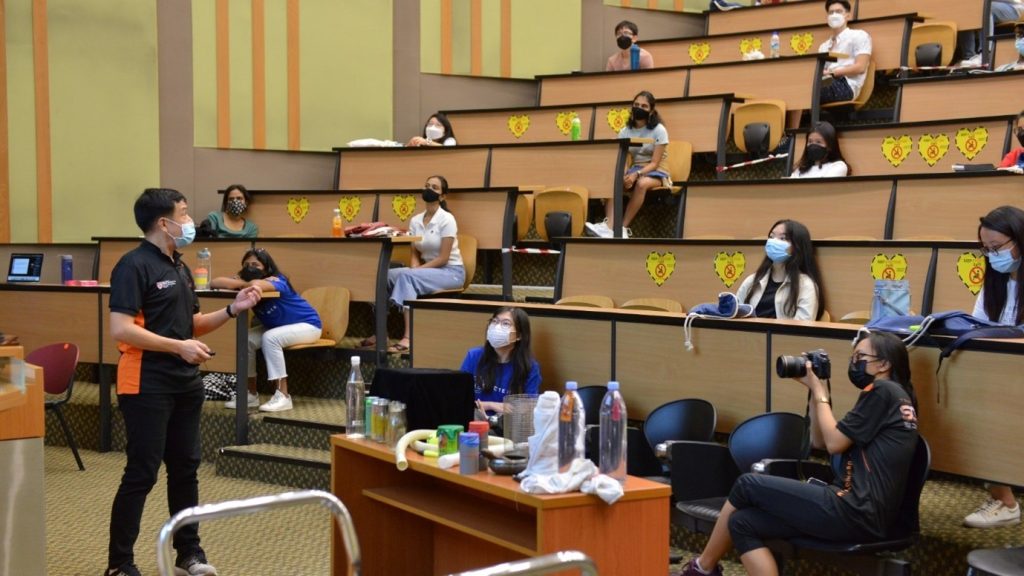
Seminars about the CHS Core Curriculum were available at the Open House, as well as informative masterclasses that covered a vast range of interdisciplinary topics.
The Data Science and Economics masterclass saw Assoc Prof Lim Tiong Wee and Assoc Prof Chen Ying (Statistics & Data Science, Faculty of Science) and Dr Denis Tkachenko (Faculty of Arts and Social Sciences) break down the complexities of the digital economy with real-life examples, and explicate its relevance to Singapore’s Smart Nation goals.
The new Data Science and Economics (DSE) cross-disciplinary programme will be the first of its kind in Singapore to integrate knowledge across these two disciplines.
“I got to understand how data science and economics complement each other,” said Russell Hor, a graduate of St. Joseph's Institution who has finished National Service and is enrolling in CHS this year.
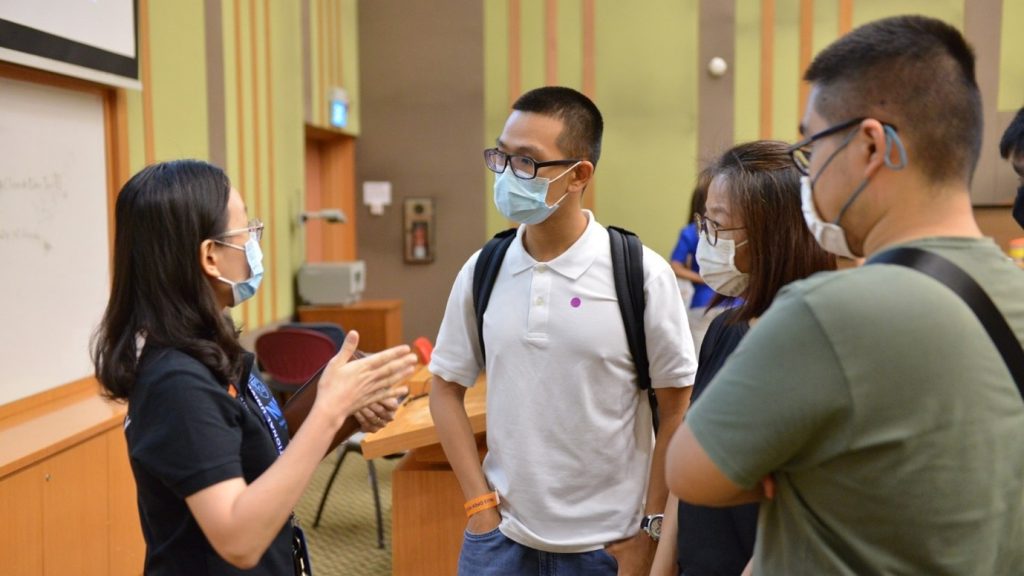
Vanille Goh, who graduated from Anglo-Chinese Junior College and attended the Geography and Environmental Studies masterclasses, said, “[The masterclasses] provided me with a good overview of how passionate the lecturers were and how each course will adequately prepare me for what I would want to do in the future.”
Nanyang Junior College alumna Wen Xinyue also appreciated the in-person masterclasses, adding that they gave her a first-hand glimpse into studying humanities at the university level.
“I am interested in studying English, and from the English Language and Literature masterclass on Gender, Sexuality and Language, I learnt about how entrenched gender roles and stereotypes can be within the language we use,” she shared.
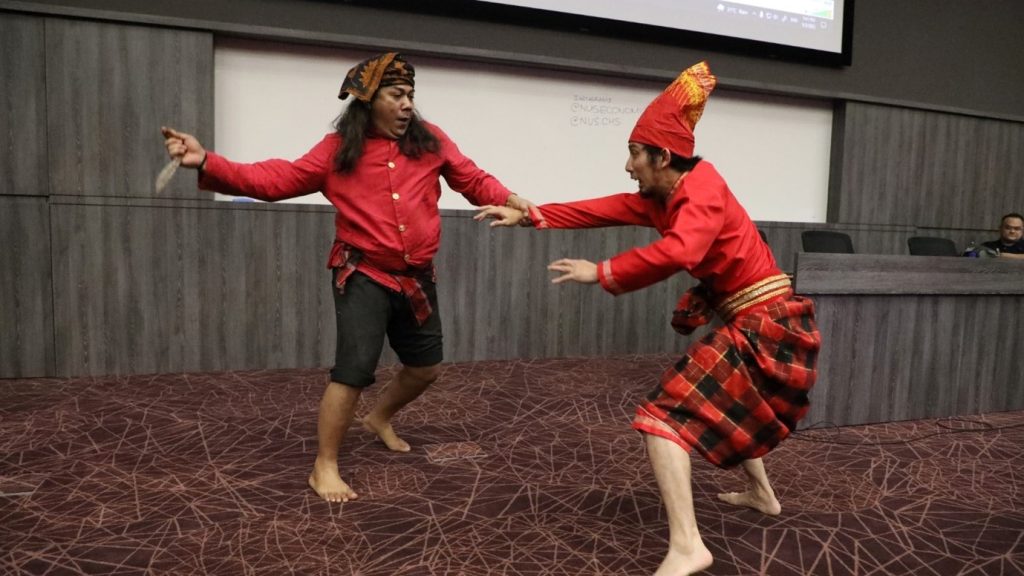
Meanwhile, over at the “Insights into Southeast Asia from the Martial Arts Perspective” masterclass, Dr Mohamed Effendy of NUS Southeast Asian Studies presented prospective students with a riveting intellectual and visual treat, demonstrating how useful unique perspectives on the region’s myriad communities can be gleaned by studying them through the lens of the martial arts. Students saw the concepts brought to life – witnessing first-hand an exciting live demonstration by practitioners of pencak silat – of how Southeast Asian warriors of old defended themselves using a wide array of techniques and weapons.
Action aplenty
There was action aplenty among other faculties. NUS Business School’s programmes included a 360 live tour, as well as live chats with the BBA Deans on the different majors offered by the School. Its in-person sessions included sharing sessions by the BBA Deans, BIZCareers advisors, and student ambassadors.
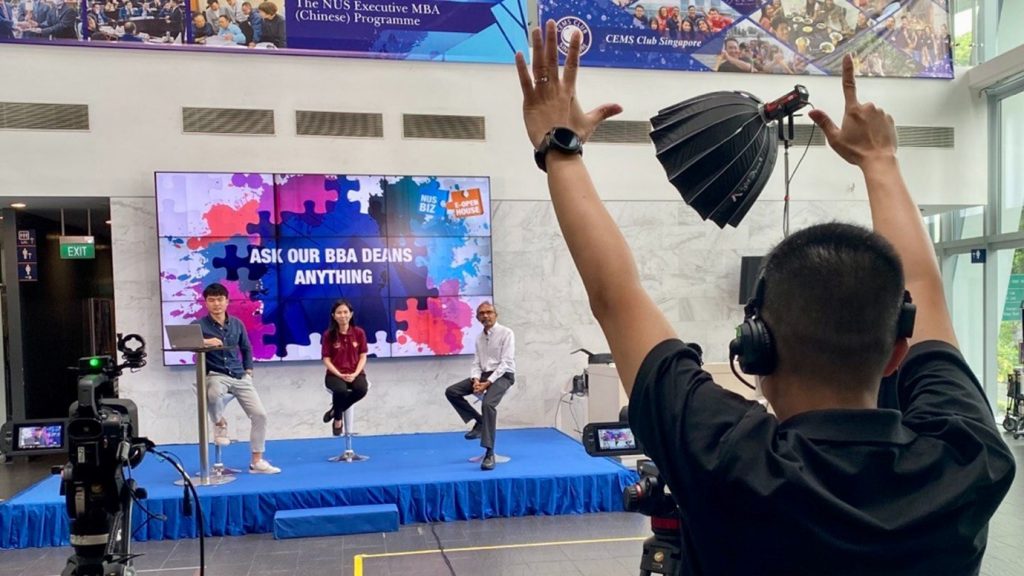
Year 4 Accountancy and Finance undergraduate Calvin Chur was one such student volunteer, serving as an emcee for the online Open House and sharing in-person on 5 Mar about life at the Business School.
“It was a tiring, but extremely fulfilling day engaging with prospective students, learning about their concerns with regards to entering a new phase of life and trying to address those concerns,” said Calvin. “In fact, many of their concerns mirrored those that I had as a fresh A-level graduate attending the NUS Open House back in 2016 – and I am glad that I could offer insider insights to help them make an informed decision at this major milestone of their lives.”
Year 4 Real Estate undergraduate Natasha Liem, another student volunteer who served as an emcee, added, “There was quite a large number of viewers for the panel and a prospective student actually sent me a message on Instagram to enquire more about real estate from a student's perspective. I think the panel went well!”

For NUS Business School Executive (Marketing & Outreach) Ms Casey Jean Grant, it was an eye-opener to experience the whole planning process.
“Most of the students and parents were very curious and excited about the prospect of coming to NUS Business School,” she added. “Their excitement definitely rubbed off on us and made the rest of us excited to share about our School.”

With frontline healthcare workers being in the spotlight these couple of years, there was plenty of interest in NUS Dentistry, NUS Nursing, NUS Medicine, and Duke-NUS Medical School. Live demonstrations were conducted and prospective students got a taste of what it would be like to be a dentist, nurse or doctor.
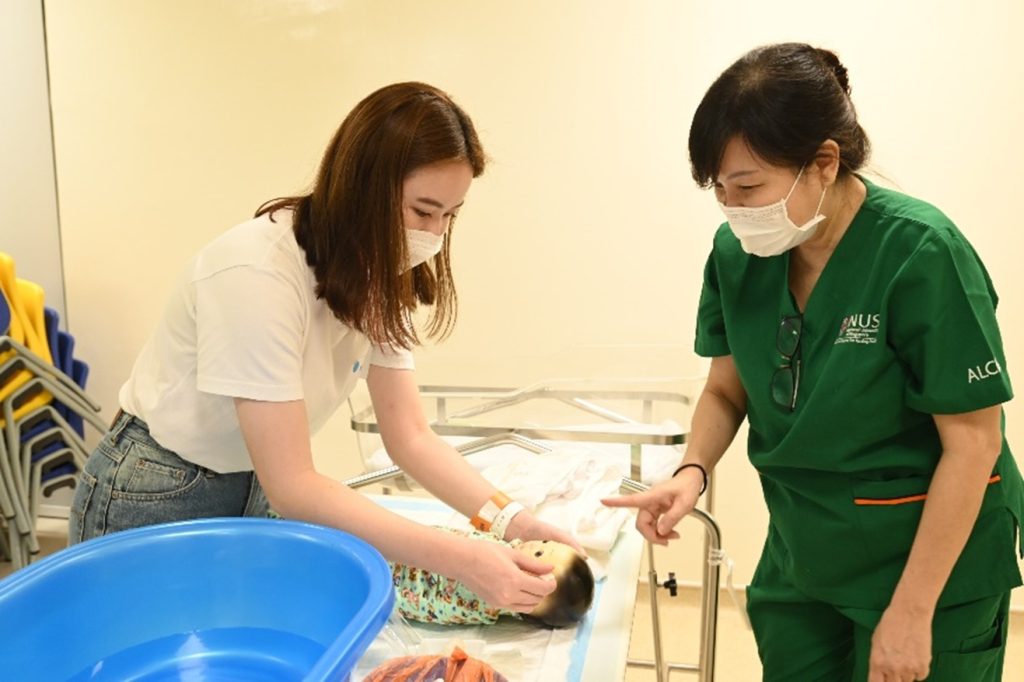
Serving up a slice of campus life
Whether on the screen or in the flesh, visitors to the Open House also witnessed the rich and vibrant student life beyond the classroom that NUS is known for.
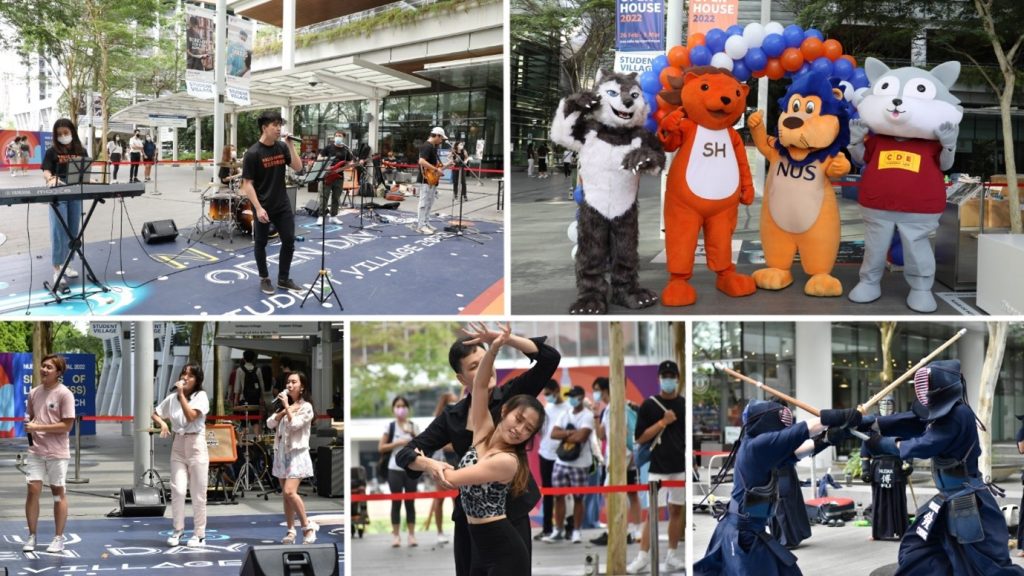
Besides holding talks to acquaint visitors with the wide range of co-curricular activities available, student clubs and societies rose to the occasion at the Student Village showcases to feature a spectacular smorgasbord of music, dance and sporting performance across the eight days that Open House was on. Visitors were serenaded by soulful tunes by the NUS Jazz Band and wowed by the moves of NUS Kendo Club. They were also treated to cheerleading displays, snazzy dance performances by NUS Funkstyle and BreakiNUS, catchy renditions of contemporary pop and choral music by the a cappella group Resonance, and the dulcet tones of TheNUSChoir and the NUS Mandopop group Voices.

"It was really lively with dozens of booths as well as live performances put on by really talented students! It truly allowed me to understand the culture here and makes me want to be a part of it after experiencing first hand,” Vanille Goh shared.
Students and hall masters from the halls and residences also conducted informative residential life talks, A-Day-in-the-Life-Of vlog sessions and Ask-Me-Anything sessions to help students interested in on-campus living understand its manifold aspects like academic programmes and pastoral care.
These were complemented by in-person tours of King Edward VII Hall, NUS College, Ridge View Residential College, Tembusu College, RC4, and Pioneer House, NUS’ newest housing model, giving participants a real taste of the sense of community and camaraderie that comes with residential life in NUS.
Joshua Chua, who also participated in the RC4 tour, said, “The RC4 tour was definitely a highlight because the tour guide, as with most staff and students, was welcoming and frank, which eased my nervousness.”
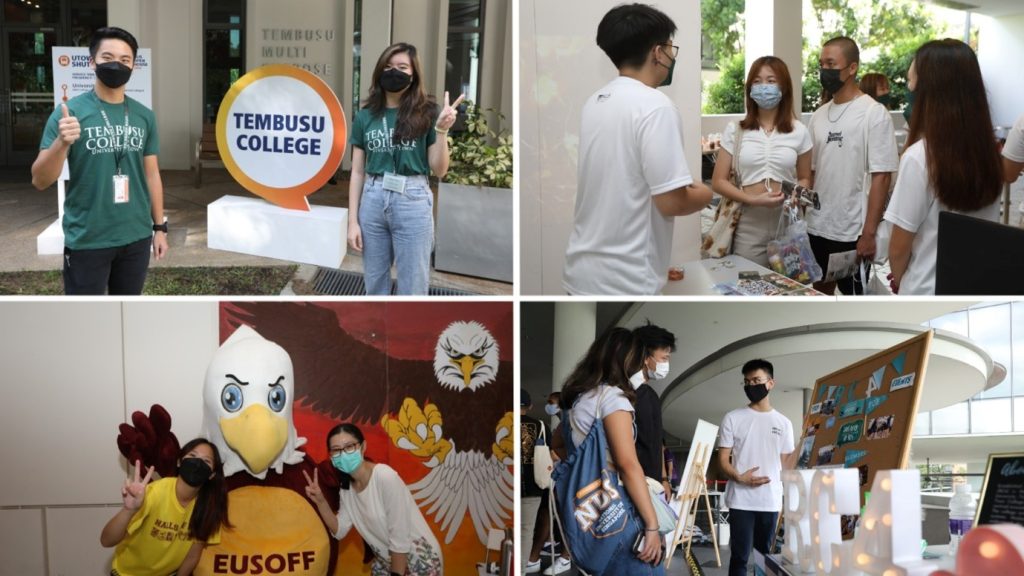
Matthew Yeow, an alumnus of Anglo-Chinese School (Independent) who attended both online and in-person sharing sessions by student residents of the Residential Colleges, said, “During the physical Open House, I had the opportunity to find out a lot more about the residential colleges and what made them distinct from halls. Furthermore, I also got to find out more about the individual residential colleges and their communities, as well as the additional modules they took.”
“As a prospective student, I think the Open House was executed effectively through both the online and physical mediums. Having the opportunity to come down and visit the University and talk to the current students gave me a better understanding of student life in NUS,” he added.

This story first appeared on NUSNews on 8 March 2022.
国大中文系新春线上团拜 对对联擦出新火花
来源:联合早报 2022年3月2日
文 / 李欣融,陈楠
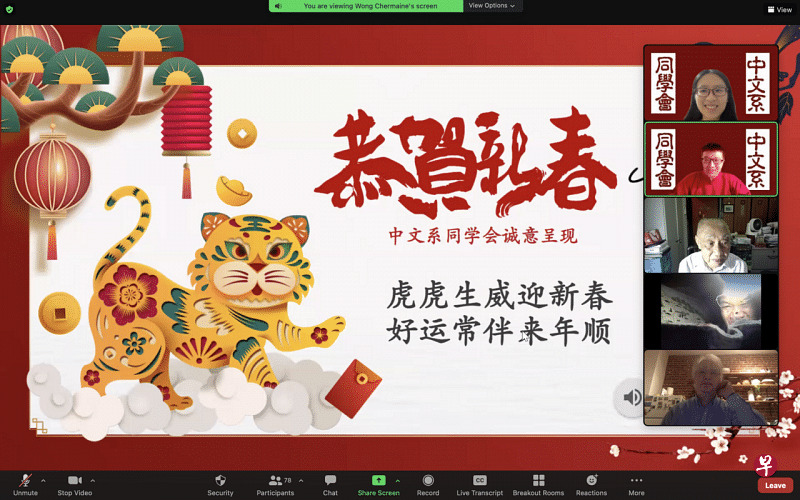
今年团拜的主题为"虎虎生威迎新春,好运常伴来年顺",寓意着大家生龙活虎地迎接新一年。(国大中文系提供)
2月11日晚上7点30分,新加坡国立大学中文系同学会举办了一场新春团拜,主题为"虎虎生威迎新春,好运常伴来年顺",寓意着大家生龙活虎地迎接新一年。这是同学会第二年在线上进行团拜,师生们逐渐习惯线上的节奏。在疫情阻隔的当下,依然能在线上欢聚,无疑是一大安慰。团拜吸引了87位师生和校友出席,人气满满。系主任王昌伟为团拜拉开了序幕并致辞。
随后,大家欣赏了一段动听的古筝弹奏。同学会设计执委焦子衿演奏《长安十二时辰》的片尾曲--清平乐。随着悠悠琴声"大珠小珠落玉盘",眼前仿佛铺陈开盛世大唐的景象,余音绕梁的琴声配上美轮美奂的电视剧画面,令人心驰神往。
国大华会相声演员助兴
有别于往年,今年的团拜增设了两个创意项目,分别为相声演出和对联环节。同学会请到了来自国大华会相声组的两位表演者,余杰翀和王一晖前来助阵,诙谐的表演《对春联》,为团拜增添了不少欢乐的气氛!
欣赏了相声表演后,紧接掀开了"虎联对对乐"的对联环节。同学会特别邀请了特别嘉宾林立副教授,为校友和学生的对联进行点评。同学会在筹备时期,向大家公开了五道上联题目,而每道上联都有特点,包含节气、动物,譬如"今年立春""虎虎生风风生水起"等,为对下联增添了一定的难度。投稿人的下联不少令人眼前一亮,作品创意十足,如上联"舞龙舞狮齐献瑞"对应"飞雁飞鹄共扬天"。
对对联讲究音韵词性寓意
林立副教授点评时,说明了对对联必须留意很多细节,讲求工整,平仄对仄平,也要注意词性,动词对动词。他还特别强调了下联的寓意要喜庆。看来,对对联还真是一门博大精深的艺术!林教授受访时坦言:"我认为同学的参与度还有待提高,可能因为大家对写对联的方法不是太了解,所以投稿的人不多。投稿的作品,水平也颇为參差,可见同学有需要掌握写对联的要点。我在中文系开设的课程,正好能提供相关的知识,欢迎有兴趣的同学来修读。"
对对联环节结束后,进入了每年团拜必不可少,标志性的烧脑Kahoot游戏环节。大家积极参与,玩得不亦乐乎,从中也增进许多关于新年的小常识,如传统、习俗和诗句等。
出席团拜的胡碚副教授说:"参加此次新年团拜,我感受到了国大中文系学子对华文和汉学知识的浓烈兴趣和深厚功力,令人欣慰不已!"
团拜的压轴戏是大家引颈期盼的转轮抽奖环节!八十余位参与者中,27人有机会获奖,概率不低。为了调动活动气氛与参与者热情,司仪把话筒"递给"大家,得奖的幸运儿被叫到名字后说出新年祝语,并由他们决定轮盘转与停的时间。虽然只是小奖金,但是一年伊始的好彩头。在一片欢声笑语中,团拜来到尾声。
第一次当司仪的大一新生禹鹏受访时说:"有前辈传授经验,还可以借鉴司仪稿,准备过程不困难。此外,因为是线上活动,看不到每一位观众,活动当天相当于对着电脑排练了一次,心态方面很放松。非常开心有这个机会与老师同学们留下宝贵的回忆,我会再接再厉!"
团拜结束后,许多久违的校友仍然留在线上聊天,分享自己的新年过得怎么样。线上的庆典,并没有成为彼此间的隔阂。参与团拜的田进捷同学说:"我最喜欢的环节就是看林立老师点评对联!我不但能够欣赏到同学们的创意,还能够复习唐诗宋词中的对仗知识,激发了我对对仗的兴趣。此外,我也喜欢看老师们跟老前辈和校友交流,场面很温馨,很感动!"
快乐的时光总是飞逝,虽然没能在线下相聚一堂,但线上的相聚依然温情暖心。精彩的古筝表演、烧脑的虎年冷知识、爆笑的相声表演、刺激的抽奖环节令人回味无穷。当悦耳的退场乐响起,大家虽然仍沉浸在新年氛围中,但只得依依惜别,展望明年的聚首。
New Courses for the New Economy
IN BRIEF | 5 min read
- NUS is offering a number of new programmes to prepare graduates for the future, including the much-anticipated Major in Anthropology, and Minor in Interpreting by the NUS Department of Chinese Studies.
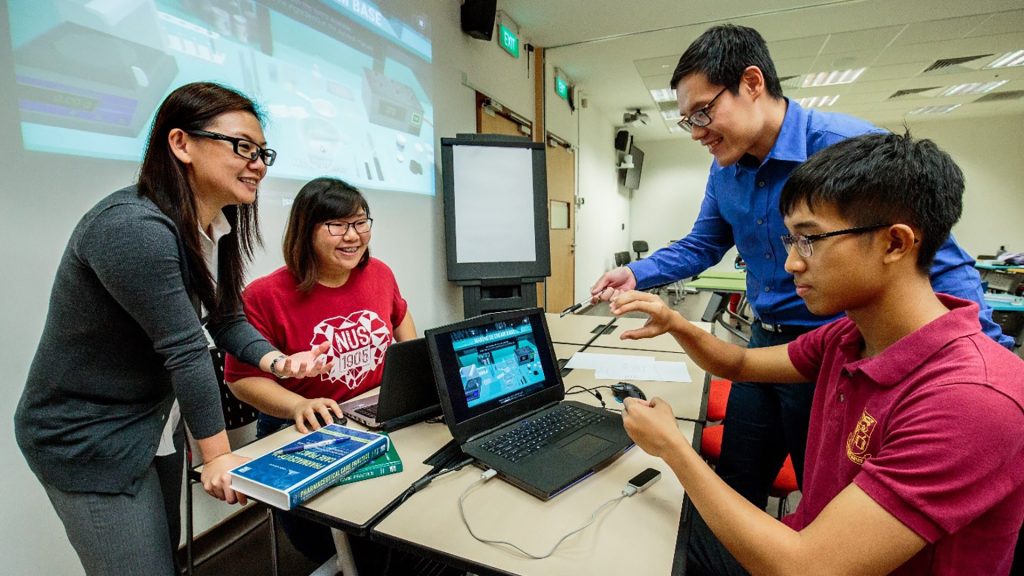
The University’s key theme of preparing undergraduates for the workplace of the future will be further enhanced with the launch of new majors, minors and degree specialisations in the upcoming academic year. About 10 new courses are on the cards.
New programmes from the NUS College of Design and Engineering (CDE), NUS Faculty of Science, NUS School of Computing, and NUS Faculty of Arts and Social Sciences will cover areas such as Artificial Intelligence, technology, data science, sustainability, globalisation. They will add on to the interdisciplinary offerings by the flagship NUS College, Singapore’s first honours college welcoming its first cohort in August – as well as those by the College of Humanities and Sciences (CHS).
“The overall goal of all our education reform efforts is to advance a university curriculum that prepares students well for a Fourth Industrial Revolution world and workplace,” said Professor Bernard Tan, NUS Senior Vice Provost (Undergraduate Education).
“Our education, focused on both breadth and depth, ensures that our graduates are held in high regard by employers. Last year, more than nine in 10 NUS graduates secured a job within six months of their final examinations.”
New majors and minors
Bachelor of Engineering (Infrastructure and Project Management)Offered by CDE’s Department of the Built Environment, this degree will equip graduates with the knowledge and interdisciplinary skills to excel in the multifaceted built environment. This is the first interdisciplinary full-time undergraduate programme to cover engineering, design, management, technology, building science and law modules. Major in Anthropology
Offered by the NUS Faculty of Arts and Social Sciences to all CHS students, this major will study the range of human diversity, accounting for how people in different times and places have developed into distinctly different societies. The degree will expose students to a vast variety of different beliefs and health practices, economic and political systems, material culture, and even different notions of beauty, the environment, food, family, and the good life.
Anthropology is much sought after for the sort of training it offers its students – a ground up approach to developing deep understanding on just about every aspect of the human condition. Students will be equipped to better understand and deal with the chaos, uncertainty, and ambiguity that characterises the contemporary age.
Second Major in Sustainable Urban DevelopmentOffered by CDE’s Department of Civil and Environmental Engineering, it aims to train the next generation of urban problem-solvers. They will be equipped with interdisciplinary knowledge and skills to create sustainable urban environments in the context of the changing climate. Open to all NUS undergraduate students, this major is stackable to students’ primary major in their chosen field, and can be completed in four years with no additional academic workload. Second Major in Nutrition
This will be offered by the Faculty of Science to all CHS students, including those reading Food Science and Technology as the primary major. It is designed to equip students with knowledge in human nutrition, providing them with the necessary foundation to develop a cross-disciplinary perspective along the food supply chain – from farm to fork to health. Minor in Interpreting
Multilingualism is a defining characteristic of Singapore’s multi-ethnic, immigrant society. With four official languages and with English as the working language, translating and interpreting between each of the mother tongues and English has always been a prominent feature of Singapore society. Against this backdrop, the NUS Department of Chinese Studies has placed as one of its core objectives, the training of graduates with strong Chinese-English bilingual skills who can become leaders in the translation and interpreting arenas.
This new Minor will allow students a related alternative to translation, or as an affiliated Minor to Translation which is already being offered at the Department.
New specialisations
Three new specialisations will be offered by the NUS School of Computing:
Specialisation in Digital Product and Platform ManagementThis will be offered to students pursuing the Bachelor of Computing (Information Systems) Degree. They will build up a repertoire of knowledge and skills sought after by both technology companies and the digital immigrant companies that are fast adopting the product- and platform-centric technology and business operating models. Specialisation in Intelligent Systems Solutioning
Students pursuing the Bachelor of Computing (Information Systems) Degree can also take this new specialisation to learn to implement and apply intelligent system solutions buttressed by the new technologies of Artificial Intelligence, the Internet of Things, and Augmented Reality. They will learn to apply these new technologies in software engineering, and to implement and manage intelligent system solutions. Graduates will be able to take on job roles in intelligent systems engineering and solutioning. Specialisation in Machine Learning-based Analytics
This new specialisation for Bachelor of Science (Business Analytics) students will enable students to tap into the analytics capabilities of Machine Learning, a sub-field of Artificial Intelligence. They will learn to rapidly and automatically develop models that can quickly and accurately analyse massive, complex data sets, in order to help businesses unlock the value of corporate and customer data and enact decisions that keep them ahead of the competition. Graduates will be able to take on careers in the rapidly-growing business and data analytics field, among others.
New modules
Aside from the new majors, minors and specialisations, a number of new modules are being offered. For instance, the NUS School of Computing is starting a Digital Ethics and Data Privacy module to educate students on this pertinent and pressing issue.
The NUS Faculty of Law is introducing two modules – one on Law & Technology and one on Data Literacy – as technology and data are increasingly being key drivers for the legal industry.
Find out more about the courses offered by the University, and explore this year’s Open House. Here are four things to look out for at the Open House.
This story first appeared on NUSNews on 24 February 2022.
NUS Open House 2022: Interdisciplinary Offerings, In-person Activities and More!
IN BRIEF | 5 min read
- NUS Open House 2022 is back with opportunities for prospective students to meet NUS professors, students and alumni face-to-face, after two years of connecting virtually.
- Running from 26 February through 5 March, NUS Open House 2022 will begin with a comprehensive line-up of informative activities, including the online segment, during the week leading up to the physical Open House, which takes place on Saturday, 5 March from 9 am to 7 pm across NUS’ campuses in Kent Ridge and Bukit Timah.

NUS Open House 2022 is back with opportunities for prospective students to meet NUS professors, students and alumni face-to-face, after two years of connecting virtually.
The physical event will take place on Sat, 5 Mar from 9am to 7pm across NUS’ campuses in Kent Ridge and Bukit Timah. This will be preceded by a comprehensive line-up of informative activities during the week leading up to the physical Open House.
Including the online segment, NUS Open House 2022 takes place from 26 Feb to 5 Mar. Here’s a heads-up on four things to check out:
1. Exciting interdisciplinary offerings
NUS College, Singapore’s first honours college, was formed by the merger of the University Scholars Programme and Yale-NUS College. Offering an immersive, experiential and interdisciplinary educational journey, it will welcome its first batch of students this year. Students will have a home college or faculty, say, Business or Engineering, while simultaneously being enrolled at NUS College. There, they will have the opportunity to enjoy a holistic interdisciplinary curriculum that is complementary to their major.
Another option for interdisciplinary learning can be found at NUS College of Design and Engineering. The College offers a programme that prepares students for the future through interdisciplinary learning and robust research in the fields of engineering and design. At the College, students are given the flexibility to build and design their own learning experience.
The NUS College of Humanities and Sciences, the enhanced undergraduate experience for students of the Faculty of Arts & Social Sciences and the Faculty of Science, is accepting its second intake this year. The College offers 13 Common Curriculum pillars consisting of modules such as scientific inquiry, humanities, digital literacy, design thinking, artificial intelligence and many more exciting options. These are complemented by majors and minors spanning the arts, humanities and sciences, such as global studies, philosophy, theatre and performance studies, quantitative finance, data analytics and pharmaceutical science. Students can pick and choose modules to create a customised curriculum that matches their interest and aspirations.
To ensure that graduates are ready to take on leading roles in the New Economy, NUS constantly develops new courses. Here are this year's new offerings.

2. Meeting you in person - again
After two years of meeting virtually, the NUS community is excited to get together in real life with prospective students once again!
You can look forward to an enlightening schedule of in-person activities including a tour of the Centre for Healthcare Simulation by NUS Nursing; tours of residential living options such as Tembusu College, CAPT (College of Alice & Peter Tan), and RC4; a live demonstration of a moot court session and tour of the NUS Bukit Timah campus by NUS Law; tours and a showcase of NUS College; as well as a live question-and-answer session with Duke-NUS Medical School.
3. Webinars, talks, live chats, hotlines and more
Get a taste of life as an NUS student, even before the physical event. A host of insightful webinars, talks, question-and-answer sessions, live chats, hotlines, and virtual tours have been arranged starting 26 Feb to give you a head start on topics such as admissions, student life, and on-campus living, as well as programmes offered by NUS College, the College of Design and Engineering, the College of Humanities and Sciences, Business, Music and many more.
Obtain behind-the-scenes knowledge from NUS student ambassadors and the NUS Students’ Union on the rich student life available at NUS, and be serenaded by NUS Choir and NUS Jazz Band.
Professors will be on hand to share information on their respective programmes, and you’ll even have a chance to sit in on classes. Have a question that is not covered by the briefing? No sweat! There’ll be chat sessions with NUS Admissions, professors and students from selected programmes during which you can get your queries addressed.
Click here for the list of virtual and in-person activities for NUS Open House.

4. Exciting student life
NUS offers a myriad options for a rich student life, and NUS Open House is the perfect place to start exploring the possibilities. Many alumni recall their NUS days fondly, remembering not only the academic progress they made, but the camaraderie forged with friends from clubs, societies and on-campus residences.
Throughout the period of the online Open House and during the physical event, representatives from various student-led groups will speak on topics including hall life, clubs and societies, as well as campus performing groups. Take part in a live session with music and dance groups, embark on a virtual residential tour, and more.
We’re looking forward to seeing you online from 26 Feb and in-person on 5 Mar!

This story first appeared on NUSNews on 23 February 2022.
FASS Inspiring Mentor 2021 Award Winners Announced

The NUS Faculty of Arts and Social Sciences is proud to announce the winners of the 2021 FASS Inspiring Mentor Awards.
Congratulations to:
- Prof Jack Qiu Linchuan, Professor, Department of Communications and New Media
- Assoc Prof Loy Hui Chieh, Associate Professor, Department of Philosophy
- Assoc Prof Robin Loon Seong Yun, Associate Professor, Department of English Language and Literature
- Dr Michael Yoshitaka Erlewine, Assistant Professor, Department of English Language and Literature
- Dr Nina Laurel Powell, Senior Lecturer, Department of Psychology
Winners of AY2020-21 Faculty Teaching Excellence Awards Unveiled
 The NUS Faculty of Arts and Social Sciences is proud to announce the 37 winners of the Faculty Teaching Excellence Award for their work in AY2020‐21, 16 of which have also been nominated for the Annual Teaching Excellence Award(ATEA) and Annual Digital Education Award (ADEA).
The NUS Faculty of Arts and Social Sciences is proud to announce the 37 winners of the Faculty Teaching Excellence Award for their work in AY2020‐21, 16 of which have also been nominated for the Annual Teaching Excellence Award(ATEA) and Annual Digital Education Award (ADEA).
Special thanks are due to members of the Faculty Teaching Excellence Committee–Dr Susan Ang (English Language and Literature and Chair of FTEC), A/P Loy Hui Chieh (Philosophy; FASS Vice‐Dean), A/P Lim Wee Hun, Stephen (Psychology), Dr Gilbert Yeoh (English Language and Literature) and Mrs Chen Ing Ru (Centre for Language Studies)–for their efforts in shortlisting and nominating the winners.
|
NAME |
DEPARTMENT |
|
Mr Appriou Yannick Francois |
Centre for Language Studies |
|
Ms Baranska, Malwina |
Centre for Language Studies |
|
Ms Klayklueng, Sasiwimol |
Centre for Language Studies |
|
Ms Morita, Kazuko |
Centre for Language Studies |
|
Dr Chaidaroon Suwichit |
Communications and New Media |
|
Dr Hong Renyi |
Communications and New Media |
|
Dr Mitchell, Alexander Ian |
Communications and New Media |
|
Dr Shobha Avadhani |
Communications and New Media |
|
Mr Tan Kai En |
Communications and New Media |
|
Dr Timothy Wong Chong Ji |
Economics |
|
Dr Vu Thanh Hai |
Economics |
|
A/P Michelle M. Lazar |
English Language & Literature |
|
Dr Miguel Escobar Varela |
English Language & Literature |
|
A/P Starr Rebecca Lurie |
English Language & Literature |
|
A/P Thell Anne Marie |
English Language & Literature |
|
Dr Roy, Tania |
English Language & Literature |
|
A/P Chang Tou Chuang |
Geography |
|
A/P Daniel Adam Friess |
Geography |
|
Dr Gretchen Christina Coffman |
Geography |
|
Dr Kamalini Ramdas |
Geography |
|
Dr Kenney-Lazar Miles Richard |
Geography |
|
Dr Teo Sheng Kiat, Shaun |
Geography |
|
Dr Donna Maree Brunero |
History |
|
Dr Lawrence, Kelvin |
History |
|
Dr Sayaka Chatani |
History |
|
Dr Beddor, Robert Speeter |
Philosophy |
|
Prof Bain, William Ward |
Political Science |
|
Dr Dunya Deniz Lepori |
Political Science |
|
Dr Jia Lile |
Psychology |
|
Dr Nina Laurel Powell |
Psychology |
|
Dr Wong Shi Hui Sarah |
Psychology |
|
Dr Peace Wong Yuh Ju |
Social Work |
|
Dr Chua Hui Ching, Emily |
Sociology |
|
Dr Elliott Edward Prasse-Freeman |
Sociology |
|
Dr Jennifer Emily Estes |
Sociology |
|
Dr Noorman Abdullah |
Sociology |
|
Dr Radics, George Baylon |
Sociology |
Congratulations to them all!
FASS Announces New Additions to Leadership Team
IN BRIEF | 2 min read
The NUS Faculty of Arts and Social Sciences is pleased to announce recent new appointments to the Faculty's leadership team.
Three eminent members of the Faculty received new appointments to the Deanery at the beginning of this year:
- Professor Joseph Park (English Language and Literature)
Vice-Dean (Undergraduate Studies) - Dr Zhang Yang (Economics)
Associate Dean (Undergraduate Studies) - Dr Noorman Abdullah (Sociology)
Assistant Dean (External Relations and Student Life)
We wish them the very best with their new portfolios. Click here to visit the FASS Deanery page.




NUS Bags Major PR Award for College of Humanities and Sciences Campaign

One year since the official inauguration of the NUS College of Humanities and Sciences (CHS), the publicity campaign for the new College has gained recognition at the recent Public Relations in the Service of Mankind (PRISM) Awards.
The University bagged a Distinction Award in the category “Outstanding Campaign by a Non-Government Organisation or Not-For-Profit Organisation” for the launch and publicity of the interdisciplinary College.
The award recognises NUS’ effective communications regarding the necessity of an interdisciplinary education to faculty members, prospective students and their parents, alumni, employers, and members of the public.
The campaign also underscored what CHS offers students in a world plagued by complex challenges that require integrated interdisciplinary approaches. The campaign included the launch event, student profiles, social media, and CHS collaterals and media assets in the form of CHS-specific infographics, news and FAQs.
The campaign also included a video series on interdisciplinarity, a podcast series by the teaching team of the common curriculum Humanities module, and stakeholder endorsement in the form of testimonials from students and alumni of NUS Faculty of Arts and Social Sciences (FASS) and the NUS Faculty of Science (FoS) who have pursued interdisciplinary studies. A successful admissions publicity campaign was run, including the 2021 NUS Open House which drummed up interest in the College with student and employer panels, small group tours, and student chat rooms.

The accolade from PRISM, which coincides with the one-year anniversary of the official inauguration of CHS, bears testament to the concerted effort on multiple fronts of the campaign by various stakeholders, including the Communications teams from FASS and FoS, the NUS Office of University Communications and communications agency AKA Asia.
“The award comes as a truly wonderful one-year anniversary gift to all our colleagues involved in the CHS campaign,” said NUS Chief Communications Officer Ms Ovidia Lim-Rajaram.
“It is gratifying to know that our efforts to kickstart a meaningful, groundbreaking programme at the College are paying off, and that the journey to promoting an interdisciplinary, 21st-century educational experience at NUS is off to a great start.”
Communications at CHS is co-led by Mr Nisar Keshvani, Associate Director for Strategic Outreach and Communications at FASS, and Ms Janice Quah, Associate Director for Corporate Communications at FoS.
“The campaign award, a result of the synergy and collaboration across diverse University faculties and departments, epitomises the spirit of interdisciplinarity that CHS values, and the idea of capitalising on each other’s strengths to achieve the best outcomes,” Mr Keshvani said.
Ms Quah added, “It has been a challenging journey but seeing our communications ideas collectively come to fruition is truly fulfilling! The validation of the hard work motivates us to continue raising the bar, to sustain the impactful profiling of CHS to students and stakeholders.”
Recognising the best in public relations
Celebrating 44 winners across 27 categories, the PRISM awards ceremony was held on 15 Dec by the Institute of Public Relations Singapore (IPRS), the only accrediting body for public relations practitioners in Singapore. The Guest of Honour was Mr Tan Kiat How, Minister of State at the Ministry of Communications and Information (MCI).
Acknowledging the challenges of a shifting communications landscape, Mr Tan said, “MCI recognises the importance of excellence in public relations and communications across all sectors of the economy.”
“The campaigns up for awards today show how all of you have worked around these challenges and continued to achieve excellent levels of reach and impact.”
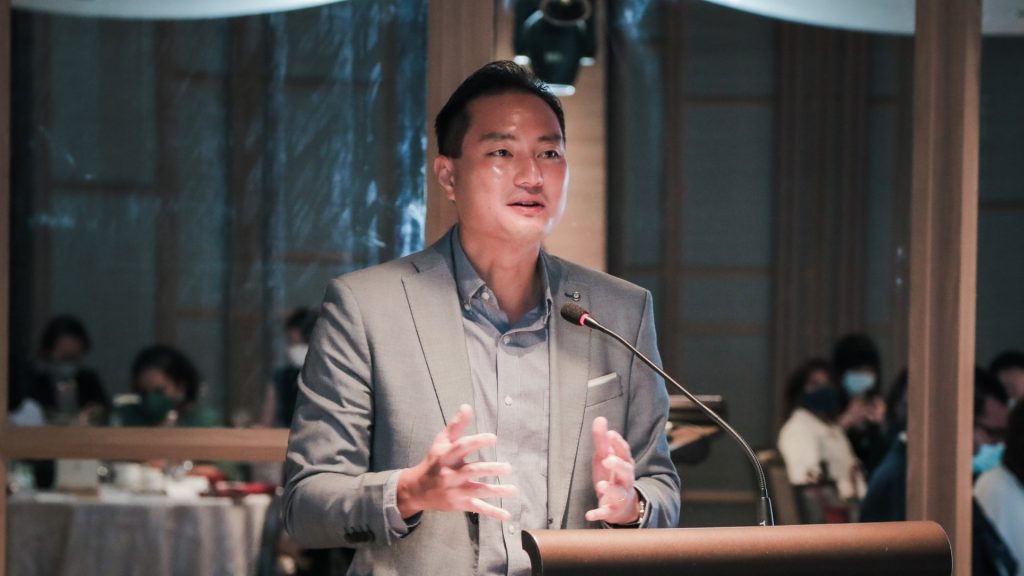
Held biennially since 1987, the PRISM Awards is one of the oldest and most prestigious awards in the industry, celebrating Singapore’s brightest stars in the communications and public relations industry. It is judged by a panel of established business leaders and senior practitioners, recognising and honouring organisations and individuals for excellence in public relations and communications.
Ms Koh Juat Muay, President of the IPRS Council 2021/2023 said, “The winning entries and the winners this year reveal a singular story – the resilience of our people, the ingenuity of the campaigns and strength of the organisations that continues to thrive in an evolving local and global communications landscape.”
“IPRS is privileged to hold PRISM Awards 2021 and share in the pride of profession demonstrated by our people and in the brilliance of their campaigns. Our winners truly embody the meaning of PRISM and that is Public Relations In the Service of Mankind,” she added.
This story first appeared in NUSNews on 21 December 2021.
[??? ????] ??????????? ??? ??? ???? ???: ????????? ???????? ??? ???????? ?? ????????? ???? ??? ???? ????
??????????? ??? ??? ???? ???: ????????? ???????? ??? ???????? ?? ????????? ???? ??? ???? ???? (Routledge, 2021), edited by Associate Professor Xu Lanjun (NUS Chinese Studies) and Associate Professor Jeremy E. Taylor (University of Nottingham), explores the different notions of “Chineseness” during the Cold War through the examination of specific case studies of the “Chinese cultural Cold War” in Hong Kong, Singapore, Malaya, Thailand, Indonesia, and Vietnam. These competing notions of “Chineseness” were played out in many areas – from bookstores, cinemas, music halls, classrooms, and sport clubs, to places of worship across the region in the 1950s, 1960s, and 1970s. The book also explains how the events of the Cold War continue to affect arguments about the extent of Chinese influence and “Chineseness” in Southeast Asia and the wider region today. Read the book here.
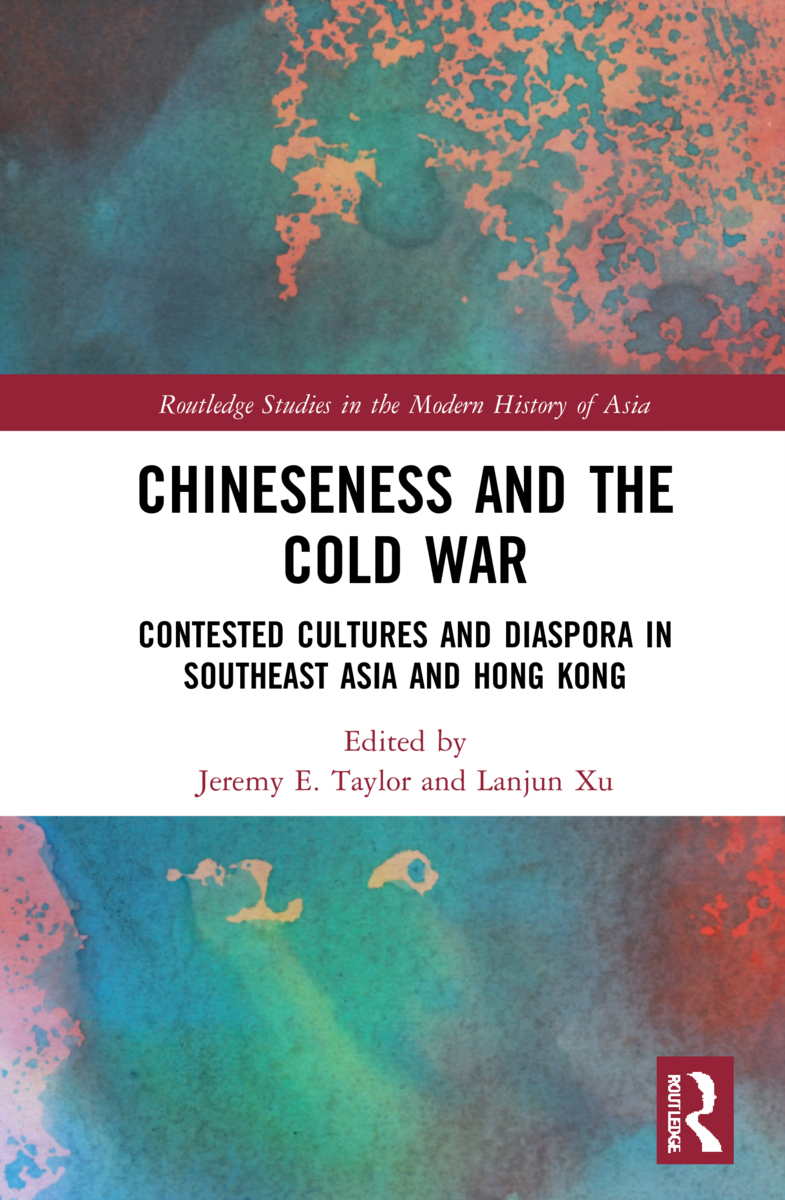
An Interview with Emeritus Prof S. Vasoo and Assoc Prof Winston Goh on The Strange Start of Psychology at the National University of Singapore
The Strange Start of Psychology at the National University of Singapore (NUS Department of Psychology, 2021), showcases the history of the NUS Faculty of Arts and Social Sciences' Department of Psychology, Singapore's oldest psychology programme. The programme, which kicked off during the 86/87 academic year at the Department of Social Work (renamed the Department of Social Work and Psychology), became a department in 2005.

Author Dr John Michael Elliott (1945-2019), who was at the time a psychologist at the then Ministry of Social Affairs, joined the programme six weeks after it began and retired in 2018.
As the book explains, in Singapore, historically psychology was viewed more as clinical work that supported psychiatry, and mental health care was deprioritized. Instead, during the island's colonial era, patients requiring mental health treatment were institutionalized in The Insane Hospital, which commenced operations in 1841 with 30 beds. This hospital evolved into The Lunatic Asylum (1862, 100 beds), followed by The New Lunatic Asylum (1887, 300 beds), and then the Mental Hospital in 1928, which became Woodbridge Hospital in 1951.
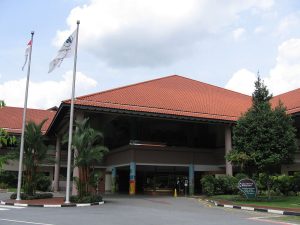
In 1993, Woodbridge Hospital moved to Buangkok Green, becoming the Institute of Mental Health's new inpatient facility.
There was a definite need for trained psychologists in Singapore, as well as a programme to train them, since, post-independence, all psychologists in the country completed their education abroad. When the NUS psychology programme got started in July 1986, however, the discipline was still often seen as non-Asian and more as medical training than a social sciences course, and also as a luxury in the realm of social work. The Department of Social Work was an ideal place for the new programme, Dr Elliott notes, as it would contribute to the department's own development, enabling it to offer an honours degree in social work and psychology.

The NUS psychology programme's initial cohort had 72 students and 1 staff and grew rapidly. There are currently around 900 students in the introductory psychology module and 220 honours graduates annually. At its inception 35 years ago the programme offered a three year general degree with a competitive fourth year honours degree. In 1989, 50 students received a general degree, 11 of whom went on to get an honours degree. Today, the department's own clinical psychology master's programme graduates approximately 15 annually, and psychology graduate students can also obtain a Master of Social Sciences or PhD.
The NUS Department of Psychology ranks 16 out of 303 on the Quacquarelli Symonds list and psychology is a well recognized and respected course of study in Singapore. Many graduates go on to engage in psychological work in the public sector, such as in Singapore's Ministries of Health, Defense, Home Affairs, and Social and Family Development. A number of graduates are also employed in private sector positions involving psychological work like human resource management and marketing, or in private practice in the fields of clinical, counselling, and industrial-organisational psychology, among others.

We discussed the The Strange Start of Psychology at the National University of Singapore, which has an online launch on Friday, 10th December at 11 am, with Associate Professor Winston D. Goh, the current NUS Department of Psychology Head, and Emeritus Professor S. Vasoo, who led the then NUS Department of Social Work and Psychology from 1987 to 1999.
 A/P Vasoo Q & A
A/P Vasoo Q & A
1. What were your most memorable experiences developing the new psychology programme during your term leading the NUS Department of Social Work and Psychology?
I have been teaching students and working with academic staff for about 50 years. In the course of these years, I always encouraged and advised them not to look back on events that had surpassed them. This is because memorable matters would not come back and one would not be able to deal with the bygones. No point spending time lamenting over things that have gone past as it can be emotionally costly and tiring. I always encourage students and academic staff to look ahead on events that will be forthcoming as these can be managed as they unfold and are within their control. I am of the opinion that various human issues that we can grasp at hand are largely solvable as long as we persistently tackle them with empathy. It is only with good empathy that we can have clearer insights to deal with human issues and relationships.
I recall that one of the challenging tasks that I had to deal with as the Head of the Department of Social Work and Psychology was to quickly recruit a group of Psychology academic staff to deliver the undergraduate psychology programme in 1986. I had selected staff with diverse psychology training such as a developmental psychologist, a cognitive psychologist, a social psychologist, an experimental psychologist, a clinical psychologist, and a psycholinguist. You can imagine with these varied backgrounds coming together to agree on a basic undergraduate curriculum was not easy. Each of them had different hobby horses to ride, which was understandable while mind-boggling, as there were protracted views within the group and at times heated arguments that I had to mediate. I brokered a deal as a non-partisan and drew a consensus among the different psychological academic personalities for the need to develop a top-notch undergraduate psychology programme based on the best psychology departments in the United Kingdom and United States. The foundation laid for the early phase of the psychology programme saw the fruition of some of our top psychology scholars in the Faculty of Arts and Social Sciences. I am indeed proud to witness that some of these accomplished scholars have become lead anchors of the NUS Department of Psychology and later appointed Heads. The nurturance of these top scholars have helped stabilize the psychology programme and provided succession of leadership. They also supported the Deanery of the Faculty of Arts and Social Sciences.
2. What can psychologists learn from social workers, and what can social workers learn from psychologists?

To put it simply, both psychology and social work are non-identical twin disciplines with each having to deal with human behaviour and social issues. As a psychologist, one has to understand human behaviour and the cause of such behaviour, and as a social worker, one has to understand the cause of social and human problems and then enable people to find ways to problem solve. Both disciplines deal with human and psychosocial issues, and human behaviour requires a multidisciplinary focus. I would say that no single discipline is adequate to solve human life course issues. I must add that a good psychologist will require social work lenses and a competent social worker needs to have helpful psychological lenses. As one will appreciate, we are all human beings and are ecologically bounded. Therefore both psychological and social work analyses are critical to better appreciate human behaviour and social interactions, and these can contribute to effective human and social problem solving.
3. What do you see as the most notable impacts in practice of social work and psychology in Singapore so far and in the future?

Psychology graduates as well as social work graduates are making robust contributions in public service, private enterprises, and non-governmental organisations. Psychologists hold highly respectable positions in areas such as clinical services, rehabilitation, health, human resources, education, the armed forces and the police, besides others. Increasingly, psychologists are needed to contribute psychological solutions to strengthen our psychological defences against various societal crises.
Likewise, social workers are also appointed in highly regarded positions in fields such as social services, rehabilitation, health, social research, counselling and mental health, education, the armed forces, and childcare, among others. Both psychologists and social workers have so far given valuable suggestions and inputs to policy changes to the care and protection of children, youth, and women, and in the support of the vulnerable and the promotion of inclusiveness of people with special needs.
Singapore like the rest of the world will be confronted with serious social and ecological changes, including the consequences of unabated climate change. In view of these changing scenarios, our future psychologists will have to be equipped with psychological skills in assessing the impact of human behaviour on mitigating issues related to the environment and climate change as well in order to have good insight into the social and psychological consequences of an ageing Singapore community. Trainee social workers can be better equipped with social analytical skills, which will make them more versatile in predicting specific vulnerable sectors of the community. Thereby, the future social workers can enhance their community problem solving capacity by building more support networks to build a socially healthy community. Specifically, more attention can be paid by both social workers and psychologists to deal with the social and psychological implications of the growing social divide between the haves and have-nots, and find more innovative ways to deliver services to enable the less well-off to move up.
 A/P Goh Q & A
A/P Goh Q & A
1. What are some of your fondest memories of Dr John Elliott, first as a teacher, and later as a colleague?
John encouraged critical thinking and we always had very illuminating discussions during his tutorials (see photo on page 28); of course, tutorials at that time only had between 5 and 7 students, so very difficult to hide! He was quite a tough marker though - never got an A from him for my term papers; but then again, As were given out very sparingly during that period (and there were no CAs at that time; the term paper grades were not counted). As a colleague, he was always willing to give advice to young hires, and his experience helped me immensely in the crafting of exam questions when I first started helming my own modules. I also remember he was very particular in signing or agreeing to legal documents - he once refused to upload materials into IVLE (the forerunner of LumiNUS) because he felt NUS did not provide enough protection for staff.
2. What motivated you to study psychology at NUS as an honours and then Masters student, and what prompted you to return to the department to teach and carry out research projects?
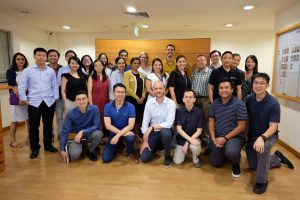 I was in the pre-med programme in junior college, so the path seemed straightforward for me. But I started reading about psychology as a course in various government information booklets and thought this was more interesting than medicine - I also didn't do well at the A levels, so perhaps this was fate telling me to take another path. However, this meant you had to go overseas as there was no psychology programme offered locally and my parents could not afford an overseas education. So when I was accepted in FASS, I was set to major in the closest one at the time - Sociology. I didn't start right away as I had to serve National Service; and in my second year of NS, I found out that NUS had started a psychology programme (again, fate may have been looking out for me!). Fortunately, I did well enough in the aptitude test (required then) to be allowed to major in Psychology. Everyone was hoping to do Honours, and at the time, you had to be invited, so I was elated when the Department of Social Work and Psychology offered me Honours, no motivation required. As for the Masters, I worked as an RA after completing my Honours, so I wanted to see if a research and academic career appealed to me, and decided to do my Masters while I was a TA for the Department. After that, NUS funded my PhD overseas on a staff development scheme, so I was obligated to return to serve a bond. In a sense, NUS Psychology has been my home since I started as an undergrad student, for I never left!
I was in the pre-med programme in junior college, so the path seemed straightforward for me. But I started reading about psychology as a course in various government information booklets and thought this was more interesting than medicine - I also didn't do well at the A levels, so perhaps this was fate telling me to take another path. However, this meant you had to go overseas as there was no psychology programme offered locally and my parents could not afford an overseas education. So when I was accepted in FASS, I was set to major in the closest one at the time - Sociology. I didn't start right away as I had to serve National Service; and in my second year of NS, I found out that NUS had started a psychology programme (again, fate may have been looking out for me!). Fortunately, I did well enough in the aptitude test (required then) to be allowed to major in Psychology. Everyone was hoping to do Honours, and at the time, you had to be invited, so I was elated when the Department of Social Work and Psychology offered me Honours, no motivation required. As for the Masters, I worked as an RA after completing my Honours, so I wanted to see if a research and academic career appealed to me, and decided to do my Masters while I was a TA for the Department. After that, NUS funded my PhD overseas on a staff development scheme, so I was obligated to return to serve a bond. In a sense, NUS Psychology has been my home since I started as an undergrad student, for I never left!
3. What future plans are in the works for NUS Psychology and how do they connect to the need for scholars and practitioners of the discipline in Singapore and the region?

Top psychology departments in the world are very well resourced with research spaces, laboratories, and facilities; so we hope to move in that direction and provide all of our research-active staff dedicated lab spaces to do research that will benefit Singapore and the discipline in general. We will also need to see how many more students (we have always been one of the more in-demand majors since inception) will want to be Psychology majors with the advent of the College of Humanities and Sciences, and perhaps develop various teaching innovations to serve an even more expanded student body (the days of 5-7 pax tutorials, or a 10-student Honours cohort in my year, are long gone). But we have very good educators in the department, so I am not worried about that. Our Clinical Psychology Masters programme is also in very high demand, given the focus on mental health needs nowadays. So we will need to see how we can support training for manpower needs in the public and private sectors in terms of workshops for associate psychologists, in additional to training people to be professional clinical psychologists.
Thank you very much for your time and answers, Prof Vasoo and A/P Goh! Readers can learn more about the history of the NUS Department of Psychology here. Catch the book launch on Friday December 10th at 11 AM by registering via Zoom.
学者团队著书 以不同角度记录东南亚方言文化
来源:联合早报 2021年11月15日
文 / 刘钰铃
由于许多东南亚地区的方言文化逐渐被淡忘,一群学者研究了这些地区的方言以及背后的历史、社会和文化背景,并借此将东南亚丰富的方言文化记录并保存下来。
新加坡国立大学中文系上周五为这本由国大中文系研究员谢汶亨博士与荷兰皇家东南亚及加勒比海研究所研究员霍赫沃斯特博士(Tom Hoogervorst)合编的《东南亚华语语系:南洋华语之声》(Sinophone Southeast Asia: Sinitic Voices across the Southern Seas)举办线上发布会兼研讨会。此书分七章,每章都由不同学者撰写,旨在通过对东南亚各地的实地考察和档案研究,以不同的角度探讨华语语系(Sinophone)和东南亚华族社群的多元语言文化,尤其是各地的方言文化。
这本书主要展现东南亚各地的方言如何受当地本土语言的影响,随着时间的推移和地理位置的变化,变得具有地方色彩,形成独特的语言。作者探讨的方言包括东帝汶人的客家话、柬埔寨人的潮州话和槟城福建话等。
其中,由谢汶亨撰写的章节主要追溯高甲戏在菲律宾的发展历程。她受访时说,高甲戏以闽南语为媒介,发源于福建省南部,曾于19世纪末在东南亚有着广泛影响。然而,高甲戏后来逐渐被歌仔戏取代,如今在东南亚国家中,只有菲律宾还保留高甲戏的传统。
谢汶亨之前特地到菲律宾访问高甲戏的表演者,并在此书中收录了剧目《樊梨花下山》的闽南语对白分析与中英翻译。她坦言,表演者在使用闽南语时,会掺杂塔加洛语,这也让研究过程更具挑战。“这些表演者有不同的闽南语腔调,为了不造成误解,须要反复和他们确认。因为我只在菲律宾待了两周,所以后来只能在线上和他们确认剧本的翻译,但这非常不容易。”
参与研讨会的北京师范大学(珠海校区)人文和社会科学高等研究院、语言科学研究中心罗仁地教授(Randy J. LaPolla)肯定了此书的文化价值。“这些东南亚地区的地方性语言和当地的文化习俗与历史紧密交织在一起,因此对此进行研究将对我们理解该地区的发展和文化起着关键作用。”有意阅读此书的公众,可上网 https://library.oapen.org/handle/20.500.12657/50792 下载。
射虎题考倒师生 国大中文系同学会线上闹中秋
来源:联合早报 2021年10月6日
文 / 李欣融,陈楠
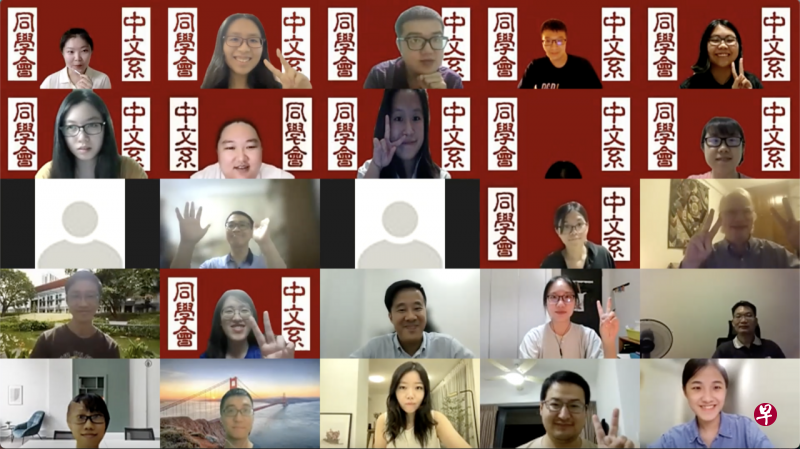
国大中文系疫情中的线上中秋相聚温馨不减,增进了师生之间的凝聚力。(作者提供)
9月23日,秋分这天,新加坡国立大学中文系同学会举办了线上中秋庆典,主题为“秋澄望月明,千里送真情”。秋意浓,情意浓,纵然在疫情之下,不能齐聚现场庆祝,但大家的热情仍能跨越千里。近40名师生,随着首首中秋经典好歌入场。庆典每年都会有陌生面孔,但共庆中秋的喜悦依然如一。
首先,由国大中文系教授王昌伟致辞,为庆典掀开序幕。他说:“中秋庆典是中文系多年来坚持的传统,每一届同学会成员都不遗余力地操办,足见精神的传承和发扬。在这个团圆的日子,希望同学们饮水思源,不忘先辈们的奋斗和付出,继续耕耘,不忘初心。”
当晚的司仪是中文系大二本科生李佳凝。她让大家合影留念,纪念难得相聚的时刻。大家兴奋地摆姿势拍照后,就由大三本科生焦子矜,为大家带来两首古筝曲目《知否知否》和《浏阳河》。悦耳动听的音乐穿过屏幕,萦绕在观众耳边,营造出中秋赏月的惬意和宁静。
玩游戏学习中秋常识
游戏环节精彩纷呈,有中秋知识问答、看图猜谜、射虎和听歌识曲,前三名优胜者可赢取神秘礼品,因而过程刺激无比。“中秋常识,知多少?”的环节以互动性的Kahoot模式进行,大家在20秒倒计时内抢答。题目分为选答题和真假题,颇有趣味,譬如:“以下哪个不是月亮的别称?”“日本人在过中秋时,会吃糯米团子”等,让大家学到了许多中秋常识。
中秋问答是个热身环节,让大家牛刀小试。接下来进入看图猜谜,分为成语和诗词部分,参与者须根据图片做合理猜测,在对话框里输入答案。游戏主持人也准备了两个提示,在大家思路卡壳,适时给予提醒。看图猜谜比拼的是手速,参赛者必须分秒必争,才能抢先发出正确答案。诗词部分的战况比成语激烈,较为生僻的诗句,如“最喜小儿无赖,溪头卧剥莲蓬”难倒了学生,最终由老师答出。大家在趣味玩乐之余,也欣赏了优美的诗句,了解或重温了诗句背后的故事,沉醉于千百年前熠熠发光的思想内涵。
射虎是中秋庆典的标配,今年的题目不乏挑战性,如“写《春秋》,读《春秋》(打一人名)”。这道题更是巧妙地结合了东西方文化,令答题者面面相觑,摸不着头脑,只得让主持人公布答案。
实际上,写春秋为笔力,读春秋为爱历史,谜底是美国女歌手“比利艾利什”。答案一出,师生高呼没想到!
绞尽脑汁后,是时候听听中秋歌曲,放松心情了。游戏进入听歌识曲的部分,让大家听一段音频,猜出歌名。入选歌曲有老少咸宜的《月亮代表我的心》,经典老歌《海阔天空》《朋友》,脍炙人口的《最炫民族风》《发如雪》和《雪落下的声音》。老歌新歌交替出现,兼顾在传统老歌熏陶下成长的教师,以及被流行文化包围的学生。大家纷纷给出心中的答案,踊跃参与,玩得不亦乐乎。
今年加入国大中文系同学会的李佳凝说:“在严峻的疫情下,同学会仍以线上相聚的方式,给国大中文系友人带来团圆的温暖,也给我们这些客居异国他乡求学的同学们浓浓的节日氛围。一个团体的凝聚力是会代代传递的,要感谢所有来欣赏团圆会表演的老师、校友、同学们,大家的支持和鼓励是我们臻于办好活动的不竭动力,祝中文系精神薪火相传!”
第一次当司仪的她感触良深。她说:“当大家都积极参与游戏,尽兴而归时,那一刻只觉得为组织晚会所付出的精力都是值得的。”
亲自烘焙月饼献情意
纵然在疫情之下,回学校的频率不多,但同学会的执委们还亲自烘焙了月饼,到办公室赠送给教授们。许多教授喜闻这则消息,都表示同学会非常有心。
劳悦强副教授受访时说:“庆祝会十分成功,短短一小时左右的聚会,节目丰富,古筝表演和中秋知识好像开胃菜,引起大家的兴致,接着的主菜有射虎,看图猜谜,猜曲各种游戏,设计都很有巧思。老师、校友和同学们都放开怀抱,尽情参与,虽然在虚拟空间,但气氛和睦融洽。同学会今年别具创意,还送老师们私家巧制月饼,让我十分期待。”
快乐的时光总是短暂,庆典转瞬即逝,虽然没能在线下饮茶谈笑,但线上的相聚依旧温馨不减。庆典让师生、校友打成一片,心意和感情突破了空间和距离,穿过网线,温暖着彼此的心扉。“秋澄望月明,千里送真情”中秋庆典,在师生们的欢声笑语中,圆满落下了帷幕。
NUS Faculty of Arts and Social Sciences 18th Dean Takes Office
IN BRIEF | 2 min read
-
Dean of the Faculty of Arts and Social Sciences, Professor Lionel Wee, and other members of the Deanery take on their leadership roles today.
Professor Lionel Wee has assumed the position of Dean of the NUS Faculty of Arts and Social Sciences (FASS) and Co-Dean of the College of Humanities and Sciences (CHS) as of today, Friday, 1 October 2021. Prof Wee takes over the helm from Professor Robbie Goh, who is now the Provost of the Singapore University of Social Sciences.
Before becoming FASS' 18th Dean, Prof Wee was the Faculty’s Vice Dean of Research from 2014 till 30 September 2021 and is a Professor of Linguistics with the Department of English Language and Literature. He was also the Head of the Department of English Language and Literature from 2010 to 2014 and is a Provost's Chair Professor of Linguistics with the Department of English Language and Literature.
“It is an honour to be given the opportunity to helm the Faculty of Arts and Social Sciences. The Faculty has achieved much since its founding nearly a century ago, continually evolving to anticipate and address the needs and challenges of a changing society," said Professor Wee. "Together with the Deanery, colleagues, and students of the FASS, I am confident that we will continue to make breakthroughs in both education and research. While these benchmarks are important, diversity and inclusion are priorities for me, and essential pillars of every organisation. My plan is to further emphasise and ensure our staff and students feel empowered and safe in the Faculty in the coming years."

New Appointments to the Strong Leadership
Beginning their new roles with the FASS Deanery today are:
- Associate Professor Elaine Ho (Geography) as Vice Dean (Research). She was previously Assistant Dean (Research)
- Associate Professor Elmie Nekmat (Communications and New Media) as Assistant Dean (Research)
The following members of the Deanery will continue to serve in their respective positions:
- Associate Professor Melvin Yap, Vice Dean (Undergraduate Studies)
- Associate Professor Valerie Wee, Vice Dean (Undergraduate Studies)
- Associate Professor Bruce Lockhart, Vice Dean (Graduate Studies)
- Professor Chen Yi-Chun, Vice Dean (International Relations and Special Duties)
- Associate Professor Loy Hui Chieh, Vice Dean (External Relations and Student Life)
- Mr Mark Teng, Director of Administration
- Associate Professor Sidharthan Maunaguru, Assistant Dean (Undergraduate Studies)
- Dr Zhang Yang, Assistant Dean (Undergraduate Studies)
- Dr Jinna Tay, Assistant Dean (Undergraduate Studies) – recently appointed to the Deanery on 1 July 2021.
- Associate Professor Nicholas Hon, Assistant Dean (External Relations and Student Life)
不曾中断的传承与送暖 国大中文系同学会迎新茶聚
来源:联合早报 2021年9月8日
文 / 李欣融
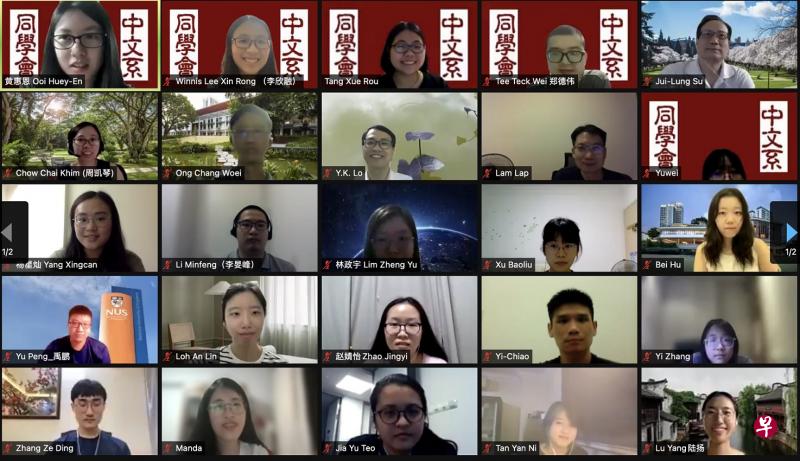
教授、校友和学生聚在一起,洋溢着国大中文系大家庭温暖的氛围。(国大中文系提供)
8月是新加坡国立大学一年级新生入学的时期。国大中文系同学会于8月20日举办了一场迎新茶聚,让大一新生了解中文系的课程,更好地融入中文系大家庭。此次茶聚虽是线上举行,但流程依然丰富多彩。
当晚7点半,教授、校友和新生,都兴致勃勃地登录线上平台。茶聚的开幕,由劳悦强副教授致辞,给予新生一席勉励之语。他热烈欢迎大家加入中文系:“看到有那么多新生想修读中文系,真的很欣慰。希望大家善加利用中文系提供的资源,不断增长自己的学识。”
新生们最想了解的,莫过于中文系的课程了。三位教授为学生们介绍汉学、汉语和翻译,包括课程纲要、上课模式等,巨细无遗地阐述给新生。
大学更讲求自主学习,写论文时还须进行深入的研究。收集资料方面,图书馆可谓学生的知识库。为了让新生熟悉图书馆的运作,国大中文图书馆管理员周凯琴学姐,细致地讲解了中文图书馆丰富的资源,包括馆内的特色馆藏,像是典藏线装古籍、“四库”系列丛书等。求学生涯中,有机会细阅这些历史悠久的珍藏,巩固所学的知识,真是弥足珍贵。她还耐心教导大家如何使用图书馆目录搜寻线上资料,特别是在这时候,多数同学都上网课,在家也能阅读这些资源。
校友分享大学生涯
听完老师们的介绍后,当然少不了学兄学姐的分享。中文系校友会总务张珈瑜学姐,与新生分享了主修和职场经验。她以图文并茂的幻灯片,带着大家浏览了她四年大学旅途:从念书、实习,到进行交换生计划。干货满满的分享,让新生对大学旅途倍感期待。纵然处于疫情期间,新生仍然对海外交换格外感兴趣,积极发问。负责此计划的老师林立,也主动为新生们讲解一番。
祝福满满的关怀包
非常时期之下,尽管历经诸多不便,同学会的执委们仍不忘关怀新生,克服了种种限制,为出席茶聚的新生精心准备了关怀包,送往他们家中。关怀包除了文具和零食之外,还有老师们亲自为新生题字的寄语书签,有的老师还挥毫了气势磅礴的书法,用心无比。但愿收到这些祝福的新生们,都能充满力量和志向,为大学生涯创造难忘的回忆。
王昌伟教授受访时说:“中文系同学会是在我还是学生的时候就成立的,到现在已经有30年左右的历史了。这些年来,同学会年复一年举办迎新活动,庆祝教师节和筹备谢师宴。重视‘承传’一直是国大中文系的传统。希望刚加入中文系大家庭的同学也能够把这种精神延续下去。人有历史感,才能自信地面对未来。”
此次迎新茶聚,虽然只有“聚”没有“茶”,但师生之间,依然流淌着浓浓的温情。在这个美好的夜晚,新生们不仅深入理解中文系课程,与教授们多多交流,也和其他新生打成一片。迎新茶聚圆满落幕了,但这意味着新生们大学生涯的起点。来日方长,就让他们扬起风帆,乘风破浪,开启新征程。
New NUS Dean of Arts and Social Sciences Appointed
IN BRIEF | 5 min read
-
Professor Lionel Wee will be appointed the new dean of the NUS Faculty of Arts and Social Sciences (FASS) and co-dean of the College of Humanities and Sciences from 1 October 2021.
-
Prof Goh, who has served as the Dean since 2017, will be taking a leave of absence from the University, but will continue to contribute in the Singapore education sector as the new Provost at the Singapore University of Social Sciences from 1 October 2021.
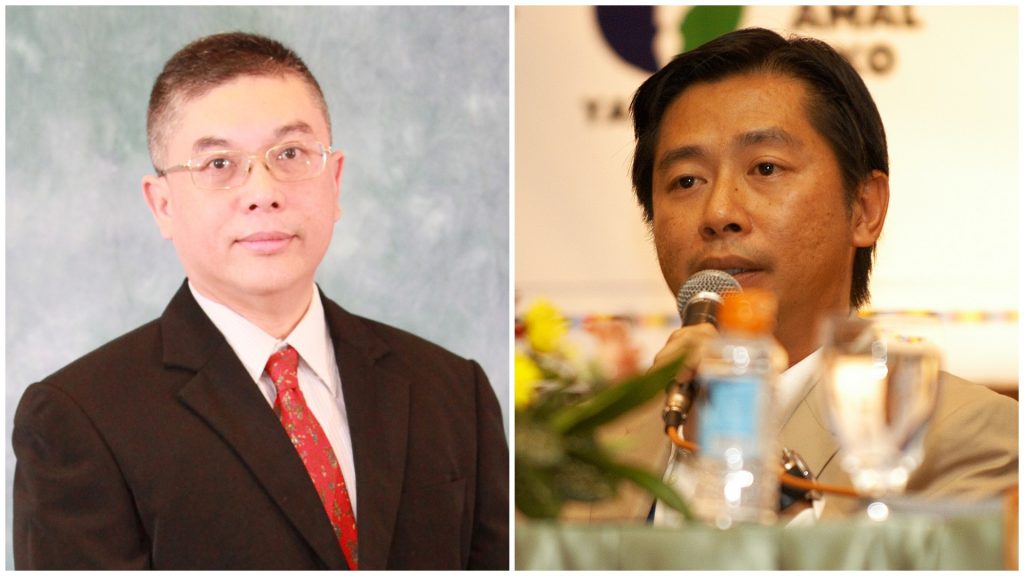
The University today announced the appointment of Professor Lionel Wee as the new Dean of its Faculty of Arts and Social Sciences (FASS) and Co-Dean of the College of Humanities and Sciences. Prof Wee will take over the helm from Prof Robbie Goh as the Faculty’s 18th Dean from 1 October 2021.
Currently FASS Vice Dean of Research and Professor of Linguistics in the Department of English Language and Literature, Prof Wee was appointed Provost’s Chair Professor in July 2017 for his outstanding scholarly achievements.
After graduating from NUS in 1988 with a Bachelor of Arts (First Class Honours) degree majoring in English Language and Sociology, Prof Wee embarked on an academic career, joining the University as a Teaching Assistant with the Department of English Language and Literature. He was awarded the NUS Overseas Graduate Scholarship where he pursued his PhD in Linguistics at the University of California, Berkeley. Prof Wee was appointed as a Lecturer upon his return to Singapore in 1995, and rose the ranks to full Professorship in 2012.
“NUS is pleased that after a rigorous global search, Prof Lionel Wee has been selected to be the next Dean. He is passionate about high quality education and research, and has an excellent understanding of FASS and the University, having served in numerous leadership roles at the department, faculty and university-levels. I am confident that he will bring the Faculty to new heights of international excellence,” said NUS President Professor Tan Eng Chye.
Besides serving as Vice Dean of Research at FASS from 2014 to present, Prof Wee was also the Head of the Department of English Language and Literature from 2010 to 2014. He had also contributed on various committees such as Chair of the FASS Faculty Promotion & Tenure Committee II, Chair of the University Mid-Term Advisory Report Committee, and Member of the University Promotion and Tenure Committee. In recognition of his dedicated service and contributions to NUS and education in Singapore, Prof Wee was awarded the National Day Awards Public Administration Medal (Bronze) in 2020 and the Long Service Medal in 2018.
“I am excited and honoured to be given this opportunity to lead my alma mater as its next Dean. Having spent more than three decades at FASS, both as a student and a faculty member, I have experienced firsthand the selfless commitment of my colleagues and impressive insights our students bring to the study of the arts, humanities and social sciences. I am confident that together, we can continue to make significant contributions to society while enhancing our Faculty’s standing as one of the leading humanities and social sciences faculties in the world,” said Prof Wee.
Besides his passion in linguistics, Prof Wee feels very strongly about animal welfare and is also very much an avid city traveller, although the pandemic has put quite a damper on travel in the past year or so. He also enjoys the cafes, a habit which he picked up during his time as a graduate student in Berkeley. Students and colleagues at FASS may have many a times seen Prof Wee deep in thought at the cafes across the NUS campus. He is very much focused in developing a particular idea or argument once he is seated down and would need to walk around before he can move on to another new idea.
Prof Wee has published widely in international and local journals, and also sits on the editorial boards of a number of academic journals and publications, including Applied Linguistics, English World-Wide, Multilingual Margins, The Journal of Asian Linguistic Anthropology, the “Cambridge Elements: World Englishes” book series, and the “Multilingualisms and Diversities in Education” book series. He is a well-respected scholar with research interests in the areas of language policy (especially in Southeast Asia), the grammar of Singapore English, metaphorical discourse, and general issues in sociolinguistics and pragmatics.
Prof Goh, who has served as the Dean since 2017, will be taking a leave of absence from the University. However, he will continue to contribute in the Singapore education sector as the new Provost at the Singapore University of Social Sciences from 1 October 2021.
Prof Goh said, “It has been a privilege and honour to serve as Dean of one of Singapore’s largest and most historied Faculties. I am grateful to my talented colleagues for all their hard work. I believe that together, we have brought the Faculty to new heights of excellence in teaching, research and service. I look forward to the work of creating new programmes and nurturing talent in my next role as Provost of the Singapore University of Social Sciences, and hope that I will also be able to forge new ties and collaborations between the two universities."
Having spent more than three decades at the University, Prof Goh has taken on numerous administrative and leadership roles outside of the Faculty. He was Deputy Director of the NUS Centre For the Arts from 1996 to 1999, and Deputy Director of the Asia Research Institute from 2008 to 2010.
“On behalf of the University, I would like to express my heartfelt appreciation to Professor Robbie Goh for his dedication and strong stewardship in leading NUS FASS. Under his visionary leadership, the Faculty has made significant contributions to the advancement of education and research in the humanities and social sciences. During his leadership, the FASS 2.0 Industry Tracks programme was started to enhance the employability of its graduates. New multidisciplinary initiatives such as the Philosophy, Politics & Economics programme were also established. The Faculty has also expanded collaborations with industry and further strengthened its high international reputation,” added Prof Tan.
This story first appeared on NUSnews on 13 August 2021. The full press release is here, and Professor Lionel Wee's biography is here.
From Careers for a Lifetime, to a Lifetime of Careers
IN BRIEF | 5 min read
-
The top skills desired by employers will include critical thinking, analysis, problem-solving and self-management skills such as active learning, resilience, stress tolerance and flexibility.
What does the future of work look like? In this evolving world, new occupations and roles which did not previously exist continue to emerge, while certain traditional skills and jobs continue to become obsolete.
The World Economic Forum’s (WEF) The Future of Jobs Report 2020 (October 2020) highlighted a few key trends.
First, technological adoption of cloud computing, Big Data and e-commerce in many businesses will accelerate the transformation of jobs, skills and entire industry value chains. 85 million jobs are expected to be displaced by a shift in division of labour from humans to machines by 2025, while 97 million new roles may emerge.
Second, online learning and training boomed during the pandemic. The shift was a watershed moment, and there is no turning back for many industries. The pandemic also brought into sharper focus the importance of lifelong learning, with more employees upskilling and reskilling to stay relevant in the volatile job market. More workers are now pursuing personal and professional development, especially in digital skills.
Last but not least, the top skills desired by employers will include critical thinking, analysis, problem-solving and self-management skills such as active learning, resilience, stress tolerance and flexibility.

What skills do employers seek?
Many of these in-demand skills highlighted in WEF’s report corroborate CFG’s Industry Insights Survey (2020). Drawing on insights from career events, industry surveys and engagements, CFG’s survey cited a similar list of soft skills that are becoming increasingly imperative at the workplace.
These are abilities learnt through life experiences that are impervious to change, and relevant across all professions and workplaces. They are attributes we take with us when we embark on job pathways in the New Normal - which are shifting from one defined career over a lifetime, to a series of dynamic and rapidly changing careers.
Our survey clusters these abilities into two main categories: Personal Qualities and Workplace Traits.
Personal qualities
Many employers are looking for individual cognitive abilities such as problem-solving, learning agility and pattern-recognition. They are also seeking graduates who are equipped with design and computational thinking, as well as proficiency in quantitative analysis.
They want graduates who are able to look at problems from different perspectives, to solve complex problems in real-world environments. For example, can a customer service issue be resolved with a combination of user interface design changes, IT infrastructure automation and manpower staffing? What are consumer consumption patterns and behaviours telling us?
Employers also seek character traits such as curiosity, resilience, empathy, proactivity, leadership and adaptability. These traits are predictors of future potential, and potentially determine career longevity and progression. For example, are you curious to learn what other teams or functions are doing beyond your job scope and discover potential synergies? Are you adaptable to changes in your project scope, and possess a “can-do” attitude in the face of obstacles?
Workplace traits
Besides personal qualities, employers are also looking for graduates who possess certain desirable workplace traits. These include good communication and presentation skills, cultural sensitivity and a global mindset. Graduates with business acumen, who are able to influence and negotiate, and are competent in managing different teams and projects, are much sought after.
These attributes mirror the realities of the modern workplace, where teams and projects are becoming more diverse, cross-functional, cross-cultural and business-driven. For example, can you work with a diverse team of colleagues towards achieving a common objective? Can you visualise your organisation’s business potential in an overseas market or a new customer segment?
The call to CHS students
In CHS, you will acquire interdisciplinary knowledge and skills by learning how to draw connections, links and insights across diverse disciplines. It is this important foundation of interdisciplinarity that will better prepare our students to become problem-solvers in an uncertain world beyond the pandemic.
Even as the pandemic has accelerated digital transformation, data is now the new asset that enables businesses to enhance efficiency and augment the ability of their teams to deliver greater value. CHS will focus on competencies like data literacy and design thinking, skills that are now in high demand by industries seeking to unlock value from Big Data.
Beyond academics, internships are one of the best ways to hone workplace experience. When you are on vacation, aim for at least two (if not more) internships, preferably one with an overseas employer. Immerse yourself in co-curricular activities, which provide hands-on opportunities to gain skills such as leadership, teamwork and project management. These experiences in your resume and portfolio will place you in a better stead with employers.

Enhancing employability, preparing for careers
CHS students will have a dedicated Career Advisor, who will guide you through the process of developing a personal career plan. You will be pre-assigned a career preparation module, Career Compass, closely following CFG’s four-year Career Readiness Roadmap which provides a formal framework for your career planning during your undergraduate journey.
You will be enrolled in Career Catalyst, a foundational freshmen module that identifies your core strengths and enhances your profile towards securing an internship. As you progress to Years Two/Three and your final year, you can also sign up for our Career Booster workshops or Career Advancement Webinar Series (CAWS).
Article contributed by the Centre for Future-ready Graduates (Ms Joan Tay, Director and Career Advisors Mr Ryan Ang and Mr Ng Buck Seng)
This story first appeared on CHS on 29 July 2021.
Strong Interest in Interdisciplinary Learning With High Acceptance Rates
IN BRIEF | 5 min read
-
NUS President Professor Tan Eng Chye discusses the University’s recent interdisciplinary initiatives – the setting up of the College of Humanities and Sciences (CHS) and the new Common Curriculum for the Faculty of Engineering and the School of Design and Environment – and the importance of lifelong learning in ensuring that students are adaptable and future-ready.
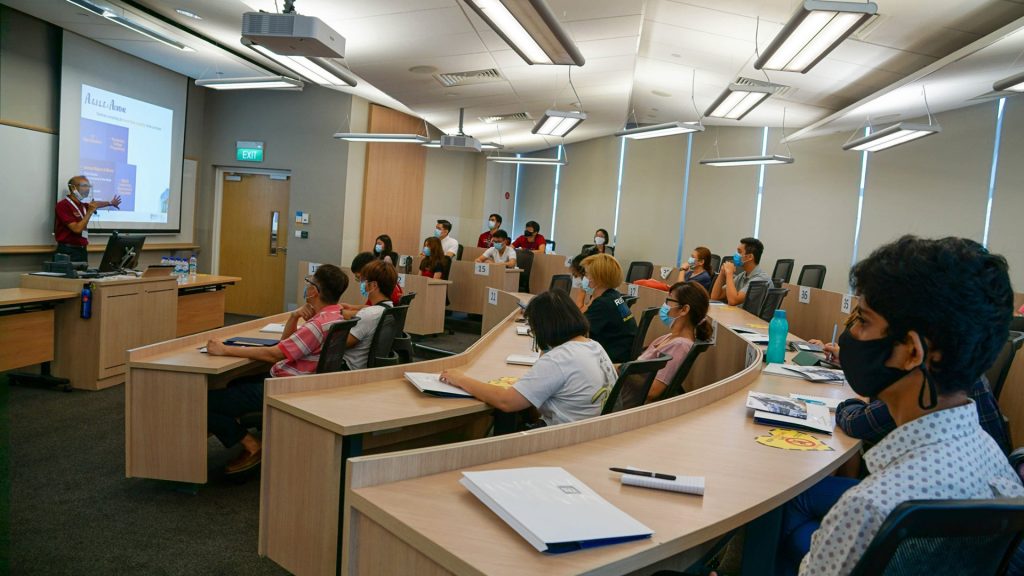
In today’s volatile, uncertain, complex and ambiguous (VUCA) world, staying stagnant is never an option. Now, more than ever, universities have to prepare students to thrive in a fast-changing and unpredictable post-COVID reality through an interdisciplinary education.
Just ask the incoming batch of freshmen, who have given a thumbs-up to the University’s recent interdisciplinary initiatives – specifically, the setting up of the College of Humanities and Sciences (CHS), and the new Common Curriculum for the Faculty of Engineering and the School of Design and Environment.
During the admissions exercise this year, 71 per cent of those who had applied to these programmes as the first choice accepted the offer. Among the incoming batch of freshmen, over 4,000 will be exposed to an interdisciplinary education. By August 2022, NUS hopes to push this number to more than 6,000.
“We are quite heartened that the applicants have responded very well,” said NUS President Professor Tan Eng Chye, as he spoke on the new changes in NUS’ curriculum. “They are receptive to the flexibility that they will have. No more are you confined to one discipline.”
Prof Tan noted that the world faces many wicked problems that cannot be solved with only one discipline.
He cited COVID-19 as a wicked problem, requiring more than just medical sciences to solve. “Even with the right medical knowledge, many countries had difficulties handling COVID-19 and its spread,” he noted.
The pandemic, in fact, prompted NUS to ramp up efforts in remodelling its educational philosophy and pedagogies to prepare its graduates for this dynamic reality.
At the centre of these reforms is the push for lifelong learning, as well as the shift towards interdisciplinary education to ensure students are adaptable and future-ready.
A lifetime of learning
While universities used to prepare their graduates for a single job, this approach is fast becoming obsolete. Today, graduates will change jobs at least 10 times over the course of their lifetime.
In line with this trend, NUS has been future-proofing its education to prepare students for lifelong learning.
“A student’s enrolment is valid for 20 years from the point they enter the university,” Prof Tan explained. “We want to remove the conception that university is only for four years. You can always come back to (NUS) to learn new skills and knowledge.”
For instance, the NUS Lifelong Learners (L3) programme upskills alumni through a wide array of skill-based, industry-relevant courses, carefully tailored to focus on emerging skills identified under SkillsFuture such as data analytics or digital literacy.
The process of returning to NUS for further studies is also made seamless. If a student does not complete a second major or degree in their initial four years, they are welcome to return to the university to read the necessary remaining modules even after graduation.
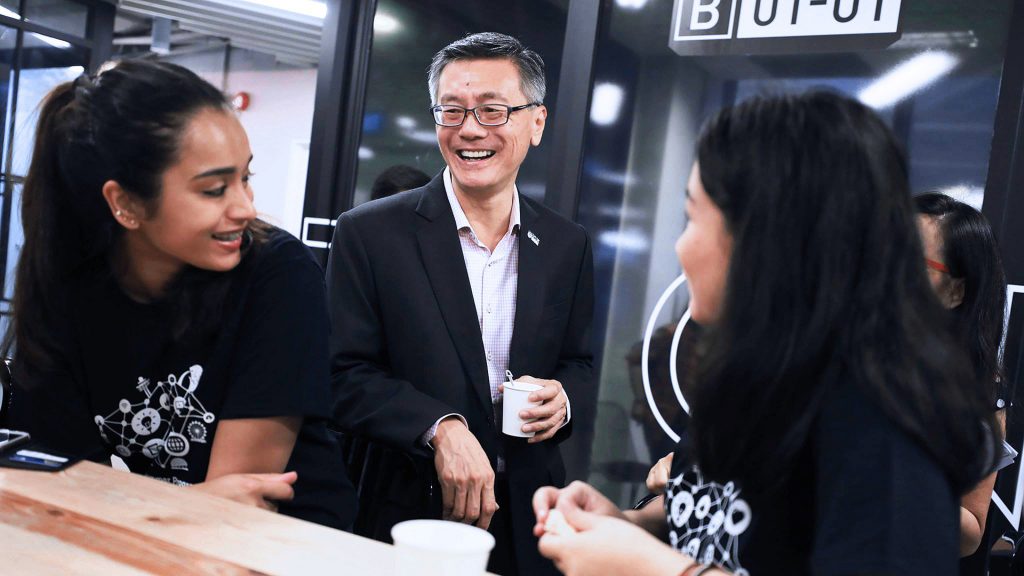
Towards interdisciplinary learning
Recognising the benefits of interdisciplinary learning, NUS is rolling this out to more students.
This started with the launch of CHS, which brings together the Faculty of Arts and Social Sciences and the Faculty of Science.
In the upcoming semester, CHS will admit 2,200 students and they will take a new Common Curriculum within their first three semesters – consisting of integrated modules with a problem-based pedagogy.
Similarly, a Common Curriculum has been introduced for the Faculty of Engineering and the School of Design and Environment to encourage knowledge transfer between the two complementary disciplines.
For instance, NUS’ very own net-zero energy building at SDE4 is a product of melding both architecture and engineering – the first of its kind in Singapore.
“The building’s beautiful architectural design alone doesn’t contribute to it being net-zero energy. What you have is a lot of deep engineering work embedded into it. It shows that architects have to work very closely with engineers in order to achieve this,” explained Prof Tan.
With interdisciplinary learning, the proportion of Unrestricted Elective modules a student can take has also been increased to up to 30 per cent, encouraging students to have two or more specialisations.
In the four faculties that now have an interdisciplinary common curriculum, this works out to more than 700 possible double major pairings, 1,700 major-minor pairings, and 100,000 major with double minor combinations.
Expanding choices for students
Ultimately, these educational innovations create greater flexibility for students to curate their own curriculum.
They will no longer have to make an immediate commitment to a single discipline. Instead, they are given time to decide on their academic calling through the common curriculum.
These efforts are central to NUS’ flagship role as a creator, integrator and propagator of knowledge.
Looking ahead, the structural barriers between faculties will further dissolve, allowing students to build even broader connections between disciplines.
“Right now, we have 70 majors and 80 minors, but we may actually have more as we go along. We start with a minor. If there’s enough interest, we push it to a second or full major. The possibilities are endless especially as we move online,” said Prof Tan.
This story first appeared on NUSnews on 26 July 2021.
Creating New Internship Opportunities: Engaging Employers to See Value in Humanities and Social Sciences
IN BRIEF | 4 min read
-
Mr Jonathan Sim, instructor from the Department of Philosophy, describes how he engaged with local employers to open internship opportunities to humanities and social sciences students who would not previously have been considered.

Humanities and social science majors are frequently misunderstood, in Singapore as in many other parts of the world. The value of their education is regularly questioned, and many employers are unaware of the value such majors can bring to the table. They prefer to hire graduates with more explicitly “practical” degrees for jobs that humanities and social sciences students could excel in.
As a result, humanities and social sciences students are not typically considered for many organisations and roles, despite offering relevant and useful skills.
So when developing an internship module, I began reaching out to organisations to create internship opportunities in such roles, to boost receptivity to hiring students from these disciplines. This enabled potential employers to better understand how students in subjects they might have previously overlooked can fill gaps in their talent pool.
Compounding the issue is that many humanities and social sciences students are unaware of the diversity of careers available to them and tend to limit themselves to roles stereotypical of their majors. There is a good reason for this. When these students apply for non-stereotypical roles, they are often turned down due to having an “impractical” major.
I regularly hear employers and people in the corporate sector lamenting the lack of creativity and critical-thinking and communication skills in their industries. These key capabilities are needed to challenge assumptions, innovate and improve processes within organisations. Employers’ lack of awareness of the value of humanities and social sciences is preventing them considering this potential talent pool.
Starting an internship module
I teach a module on data analysis and philosophical reasoning to hundreds of students each semester. With so many students under my charge, I was inspired by the idea that education is more than just about imparting knowledge. Rather, it is about facilitating growth in one’s students by providing them with opportunities for challenge and development.
As a result, I decided it would be worthwhile to experiment with an internship module where I approach employers, explain the value my students can bring to their organisation and ask them to offer temporary roles not typically filled by humanities and social sciences majors. A model designed to be mutually beneficial to both employers and students.
Here are my key lessons in how to do this:
Start by approaching contacts working in human resources (HR) and ask them to link you up with senior management or with department heads of your target companies. I initially spoke to friends in HR and some of them linked me up with HR professionals from other organisations.
Provide reassurance that you will be guiding and mentoring the students throughout the programme. My credentials as a university educator meant employers were generally open to exploring this strategic partnership.
Prepare and present a pitch clearly describing what value and skills your students can bring to the companies where you wish to secure internships. I explained how my students were excellent in data analytics, coding and problem-solving, and their training in humanities and social sciences meant they could bring unique perspectives thanks to creativity and critical thinking. Having worked with the students for one semester already, I could also vouch for their character, including attributes such as work attitude, independence and willingness to learn.
Discuss the job scope and be honest and realistic about what your students can and cannot do. I helped advise the hiring managers on my students’ capabilities, based on what I had taught them, and sometimes this meant suggesting new items in the job scope that the organisation may not have considered.
Invite students to apply for the roles available by submitting their CVs, then interview shortlisted candidates. I found interviews useful to get a better understanding of what students wanted to do and what they hoped to achieve during the internship. The application process also provided an opportunity to work with students to improve their CVs and interview skills before they spoke to employers.
Try to match students with internship roles that will best suit their personality, skills and career aspirations.
During the internships, check in on students regularly and ask them to share any challenges, so you can help them troubleshoot any issues. My role was more like an adviser pointing them to resources or giving life advice on how to handle novel social or professional situations.
Ask the students to write reflections centred on how their training in humanities and social sciences can be applied to the work they do as an intern. This helped me gauge the extent of their learning but also nudged students towards deeper reflection on their discipline to see its value and relevance in the work they did. It was very eye-opening to see concrete examples of how students found connections and applications between their studies and their work.
Benefits to organisations and students
These collaborations have proven mutually beneficial. They allow participating organisations to develop strategic partnerships with the university, helping employer branding and making it easier for them to attract talent.
At the same time, the student interns become living proof to employers that their major makes them as good as, if not better than, some students from more “practical” disciplines. The internships help inform humanities and social sciences students that they can take on roles they never thought were open to them.
We have completed one round of internships with organisations such as Henkel, a German multinational chemical and consumer goods company, and Azendian, a local AI data analytics start-up.
Students were pleased with the chance to take up roles they would not have ordinarily pursued, or been given a chance to try, in areas such as supply chain and logistics management, database management and data analytics for marketing. The internships provided profound insights on how they can apply the skills from their majors in ways that allow them to craft a niche in such roles.
The first round of placements seems to have persuaded employers to be more receptive when it comes to hiring humanities and social sciences students, as they have asked for more interns in subsequent iterations.
This is just the beginning, and there is a lot more that we can achieve in our capacity as university faculty by engaging with local organisations and employers. We can work to create more internship opportunities and help employers better understand the capabilities of our students across multiple disciplines here in Singapore and further afield.
This story first appeared on Times Higher Education on 21 June 2021.
Commencement 2021: Special Message of Congratulations to the Classes of 2020 and 2021!
IN BRIEF | 3 min watch
-
FASS Faculty and students congratulate the Classes of 2020 and 2021 and wish them all the best as they go out to change the world for the better!
“We believe in you. I believe in you. Go out there, do us proud. Make the world a better place.” — Associate Professor Loy Hui Chieh, FASS Vice Dean of External Relations and Student Life FASS, joint committee member of the NUS Philosophy, Politics, and Economics (PPE) programme, and also Faculty member of staff at the NUS Department of Philosophy.
Faculty and students talk about what life has been for them this past year, what they miss about campus life, and extend words of advice and congratulations to the graduating Classes of 2020 and 2021.
This video features Assoc Prof Loy and Dr Lohsnah Jeevanandam, Senior Lecturer, NUS Department of Psychology, as well as students from the graduating Classes of 2020 and 2021: Alvarez Brielle Clavel ('20); Somesh s/o Sailesh ('20); Douglas Ong ('20), Christina Chen (Doctoral Class of '20); Ng Qian Qian ('21); and, Lai Wei Na ('21).
Honouring five outstanding alumni from Arts and Social Sciences
IN BRIEF | 3 min read
- Five exceptional NUS Faculty of Arts and Social Sciences (FASS) alumni from diverse backgrounds were lauded at the annual FASS Distinguished Arts and Social Sciences Alumni Awards 2020 in a simple presentation ceremony on 30 April at Swissotel The Stamford.
 (From left to right): FASS alumni Mr Yatiman Yusof, Mr Niam Chiang Meng, Ms Lim Sau Hoong, Mr Ravi Menon and Dr Liang Wern Fook have made singular contributions to the areas of the arts, education, media, finance, policy and community development.
(From left to right): FASS alumni Mr Yatiman Yusof, Mr Niam Chiang Meng, Ms Lim Sau Hoong, Mr Ravi Menon and Dr Liang Wern Fook have made singular contributions to the areas of the arts, education, media, finance, policy and community development.
Five exceptional NUS Faculty of Arts and Social Sciences (FASS) alumni from diverse backgrounds were lauded at the annual FASS Distinguished Arts and Social Sciences Alumni Awards 2020 in a simple presentation ceremony on 30 April at Swissotel The Stamford.
All have left their distinct mark in the wide-ranging fields that they serve. They are namely:
- Mr Yatiman Yusof (Geography and Malay Studies, ’72), Non-Resident High Commissioner of Singapore to Kenya
- Mr Niam Chiang Meng (Economics, ’83), Chairman of the Maritime and Port Authority of Singapore (MPA)
- Ms Lim Sau Hoong (Chinese Studies, ’83), Founder, Former CEO and Executive Creative Director of advertising agency 10AM Communications
- Mr Ravi Menon (Economics, ’87), Managing Director of the Monetary Authority of Singapore (MAS)
- Dr Liang Wern Fook (Chinese Studies, ’89 and Master of Arts, ’92), Writer, musician and educator
Congratulating the award recipients, FASS Dean Professor Robbie Goh said, “Ms Lim Sau Hoong, Dr Liang Wern Fook, Mr Ravi Menon, Mr Niam Chiang Meng and Mr Yatiman Yusof, have made singular contributions to the arts, education, media, finance, policy and community development. Not only do their wide-ranging achievements bring pride to the FASS family, but I believe that it also attests to the disciplinary range, intellectual curiosity and critical thinking that are the hallmarks of the FASS educational experience.”
This disciplinary diversity, Prof Goh elaborated, would soon be enhanced by FASS’ partnership with the NUS Faculty of Science in the NUS College of Humanities and Sciences (CHS) where students would be able to choose any major that is offered by both faculties. He added that this would be a major boost to FASS students’ educational experience as “the CHS common curriculum will prepare students for a disruptive world – by giving them a compulsory grounding in essential skills such as writing and communication, data literacy, digital literacy, design thinking and AI.”
Our alumni and their contributions
 Present at the ceremony were (clockwise from top left): FASS Dean Prof Robbie Goh; Mr Menon; Dr Liang; Mr Bernard Toh, Director of NUS Alumni Relations; Mr Niam; Ms Lim; Mr Yatiman; and NUS President Prof Tan Eng Chye.
Present at the ceremony were (clockwise from top left): FASS Dean Prof Robbie Goh; Mr Menon; Dr Liang; Mr Bernard Toh, Director of NUS Alumni Relations; Mr Niam; Ms Lim; Mr Yatiman; and NUS President Prof Tan Eng Chye.
A teacher and a journalist early on in his career, Mr Yatiman served key government appointments including as a Member of Parliament and Senior Parliamentary Secretary of the Ministry of Foreign Affairs and the then-Ministry of Information and the Arts, before his retirement in 2006. In addition to being Singapore’s non-resident envoy to Kenya, Mr Yatiman is a Board Member of the Singapore Press Holdings Foundation and the Chairman of the Malay Language Council of Advisors.
Contributing extensively to the public sector too was Mr Niam who served in the Ministries of Finance, Trade and Industry, Health, Law, and Information, Communications and the Arts – including Permanent Secretary appointments in several of these Ministries. He also served at the National Population and Talent Division, and the National Climate Change Secretariat. Aside from his current MPA chairmanship, Mr Niam is also the Chairman of Gardens by the Bay Pte Ltd and MediaCorp Pte Ltd.
A heavyweight in the media, marketing, and advertising industry, Ms Lim’s creative leadership of 10AM Communications has garnered over 300 prestigious global awards including The One Show, the Clio Awards, and the Communication Arts. Identified for her unique creative talent, Ms Lim was Visual Advisor to the Planning Committee for the 2008 Beijing Olympics’ Opening Ceremony and headed the Shanghai World Expo 2010 Singapore Pavilion Advisory Panel. In 2007, Ms Lim was awarded the President’s Design Award and was named Designer of The Year for her extensive contributions to media, marketing and culture in Singapore.
Prior to his appointment at MAS, Mr Menon served as Permanent Secretary at the Ministry of Trade and Industry, and Deputy Secretary at the Ministry of Finance. A recipient of the Singapore Government’s Meritorious Service Medal and Public Administration (Gold) Medal, he has served on boards in the public, private, and people sectors. He is currently Chairman of the Institute of Banking and Finance, and serves on the Board of Trustees of the Singapore Indian Development Association.
A singer-songwriter, poet and academic in Chinese literature and language, Dr Liang is a respected cultural figure and pioneer of Xinyao – a movement of locally composed Mandarin pop songs from the 1980s. To date, Dr Liang is the only artist who has received the National Arts Council’s Young Artist Award (Literature) and the prestigious Cultural Medallion (Music) across different art genres. He was also honoured recently with the Singapore Chinese Cultural Contribution Award for his outstanding contribution to the promotion, enrichment and development of Chinese Singaporean culture. His canon of work includes over 15 publications of literature, more than 200 songs, and two Mandarin musicals – a number of his most important works were written and composed during his university days.
On receiving the awards
Also present at the event was NUS President Professor Tan Eng Chye who presented the awards to the five alumni. Invited guests were also treated to videos of the award recipients who shared about their university days in FASS and their career highlights.
Recalling the moment he received news of the award, Mr Yatiman humbly shared, “To be frank, I’m quite surprised when I was told about it. And I thought there are hundreds, if not thousands of people who are more suitable to receive this award. I’m just a small worker in the community, not doing much in my lifetime. I think there are many others. So, for those who’ve been working hard for the good of the community, I take this award as recognition of their effort too.”
Mr Niam recalled some of his best memories were during university days where he learnt a lot about networking and life skills. It was also where he found his life partner. He said, “It is a privilege to be given this award. I would like to thank NUS and the organising committee for bestowing this honour on me and the other recipients…it means a great deal.”
 Taking the form of a rising star, the alumni award represents the inspiration these individuals bring to society through their brilliant contributions towards the Faculty, University and Singapore.
Taking the form of a rising star, the alumni award represents the inspiration these individuals bring to society through their brilliant contributions towards the Faculty, University and Singapore.
Established in 2015, the Awards recognise individuals for their distinguished scholarship and outstanding service to the Faculty, the University and Singapore. These outstanding recipients have made significant impact in various fields locally and internationally, which has contributed to the betterment and promotion of the arts and social sciences.
Previous recipients of the Awards include luminaries such as former President Mr S R Nathan, Emeritus Senior Minister and former Prime Minister Mr Goh Chok Tong, former United Nations Under-Secretary General Dr Noeleen Heyzer; Permanent Member of the Presidential Council for Minority Rights Mr Abdullah Tarmugi; and Executive Chairman of Banyan Tree Holdings Limited Mr Ho Kwon Ping.
Click here for more details on this year’s award recipients.
This story first appeared on NUSnews on 6 May 2021.
#DiscoverFASS@CHS 2021 | Sign Up for Masterclasses, Learn All About Our Majors
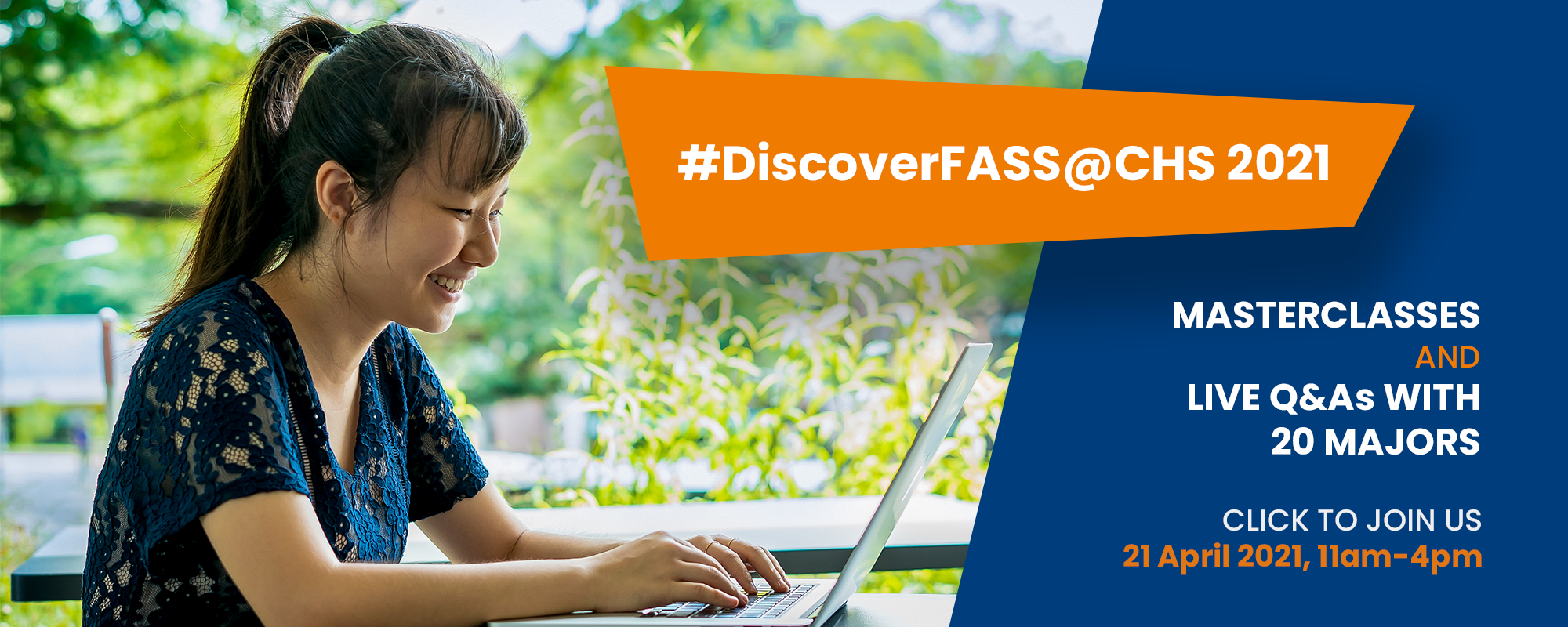
As part of the #DiscoverFASS@CHS campaign leading up to our Open House in May this year, we are holding 'live' Masterclasses presented by three of our award-winning Faculty members, and our Departments are hosting 'live' Q&A sessions for prospective students. These are opportunities not to be missed if you wish to know all you need to know about classes here and the myriad programmes available to you if you are a part of the FASS community. Masterclasses by Award-Winning Faculty
Experience lessons led by our dynamic faculty members.  Roasted Fetuses and Corpse Magic: An Introduction to Supernaturalism in Southeast Asia
Roasted Fetuses and Corpse Magic: An Introduction to Supernaturalism in Southeast Asia
Presented by Associate Professor Irving Johnson, Department of Southeast Asian Studies
The class aims to foreground the fascinating world of beliefs in supernaturalism that pervade Southeast Asian lives. Many of us enjoy telling and listening to creepy stories, watching horror movies on Netflix or dabbling in the esoteric. In this masterclass, we will look at some of the beliefs that structure constructions of the supernatural in modern Southeast Asia. The class revolves around a series of interrelated questions that seek to discover commonalities in popular belief systems and their prominence in the region, linking supernaturalism to larger issues of power, gender and politics. 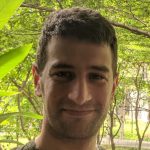 Evidence and Promise Making
Evidence and Promise Making
Presented by Assistant Professor Zachary Barnett, Department of Philosophy
Promise-making is an important part of life. We make promises to our friends, families, and significant others, and they make promises to us. We will look at a puzzle that arises when we think about "promising against the odds": How should I feel about making a promise, if I know that most of the people in my exact situation end up breaking that promise? For example, suppose that I promise to quit smoking cigarettes. At the same time, I know that most people who sincerely promise to quit smoking do not actually succeed on their first attempt. Should I believe that I will be the exception to the rule? If not, am I justified in making the promise in the first place? And if I do make the promise, should my friends and family believe me? These questions arise in many different contexts, ranging from the superficial to the serious, involving addiction or relationships.  Making Sense of Self-Awareness and What That May Mean
Making Sense of Self-Awareness and What That May Mean
Presented by Dr Peace Wong Yuh Ju, Department of Social Work
In this talk, Dr Wong will attempt to broaden our understanding about ‘self’ and what that may mean to us. It is not uncommon for students in wanting to gain greater self-awareness with the attempt to learn more about one’s beliefs/feelings in relation to the observed world around us. Yet, how do we deepen our understanding of ‘self’, given that we are both familiar with who we are, and yet at times finding ourselves baffled by our reactions, and wondered why we respond in a certain manner? We will briefly discuss the various influences that may impact our values and beliefs, as well as consider what knowing your ‘self’ may mean to you.
To register for Masterclasses, click here.
Live Q&As with our Departments
Meet key Faculty and student representatives of every FASS Department and major programme in their respective Zoom meeting rooms and ask them specific questions about the requirements, content and value of the programmes they offer.
Department of Chinese Studies
The Chinese Studies Department provides training in diverse areas of Chinese Studies and Chinese Language, with the aim of preparing students for employment in a wide range of sectors. Graduates are offered career opportunities as professionals in the educational and business sectors, academia, the translation service industry and the mass media.
Join the Department's #DiscoverFASS@CHS 2021 'Live' Q&A session on 21 April (2-4 pm) here.
In the meantime, visit the College of Humanities Programmes page for more details on what this Department offers.
Department of Communications and New Media
Communications and New Media (CNM) at the National University of Singapore is the only Department in Southeast Asia that offers media studies, interactive media design, cultural studies, and communication management with a focus on new media.
Join the Department's #DiscoverFASS@CHS 2021 'Live' Q&A session on 21 April (2-4 pm) here.
In the meantime, visit the College of Humanities Programmes page for more details on the programmes offered by this Department.
Department of Economics
The Department of Economics has an established reputation as one of the largest and leading departments of Economics in the Asia-Pacific region. Faculty members’ research areas span a wide range of economic fields, with strength in the core areas of microeconomics, macroeconomics and econometrics, as well as in particular fields such as game theory and industrial organization, labor economics, education, financial economics, and growth theory and development with special reference to Asia.
The Department's #DiscoverFASS@CHS 2021 'Live' Q&A session on 21 April (2-4 pm) here. This session includes discussion of the Data Science and Economics Cross-Disciplinary Programme (DSE-XDP).
In the meantime, visit the College of Humanities Programmes page for more details on the programmes offered by this Department.
Department of English Language, Literature and Theatre Studies
The Department of English Language, Literature and Theatre Studies houses three undergraduate majors and three graduate programmes. The English Language major offers an education in linguistics, the study of human language. The undergraduate programme in English Literature is designed to provide a broad foundation in reading and analysing texts of all kinds. And, the Theatre Studies curriculum delivers education in all areas of theatre and performance history, production and interpretation.
The Department's #DiscoverFASS@CHS 2021 'Live' Q&A session on 21 April (2-4 pm) here.
In the meantime, visit the College of Humanities Programmes page for more details on the programmes offered by this Department.
Department of Geography
Modules in the Department of Geography are organized along four areas of enquiry: environmental processes and change; global political economy; society and culture; and regional specializations (with a focus on Asia). The Department also offers a Field Studies module in which students travel to countries in the region such as Thailand and Malaysia where they conduct field work and collect research material over a 3-5 week period. Home-stays and visits to local universities and key sites of interest are part of the overseas learning experience it delivers.
The Department's #DiscoverFASS@CHS 2021 'Live' Q&A session on 21 April (2-4 pm) here. This session includes discussion of the Bachelor of Environmental Studies Programme (BES-XDP).
In the meantime, visit the College of Humanities Programmes page for more details on the programmes offered by this Department.
Department of History
The Department of History offers training at undergraduate and graduate levels, and its teaching and research expertise lies primarily in the history of Southeast and East Asia, but there is strong selection of module offerings in European, American, and military history, as well as the history of art, business, religion, science and technology.
The Department's #DiscoverFASS@CHS 2021 'Live' Q&A session on 21 April (2-4 pm) here.
In the meantime, visit the College of Humanities Programmes page for more details on the programmes offered by this Department.
Department of Japanese Studies
Founded in 1981, the Department of Japanese Studies is one of the largest area studies departments devoted to the study of Japan in the Asia-Pacific region, and offers BA, MA and PhD degrees in Japanese Studies taught by specialists with qualifications from leading universities around the world.
The Department's #DiscoverFASS@CHS 2021 'Live' Q&A session on 21 April (2-4 pm) here.
In the meantime, visit the College of Humanities Programmes page for more details on the programmes offered by this Department.
Department of Malay Studies
The Department of Malay Studies actively engages in research on a wide range of issues concerning the Malay world from a multi-disciplinary perspective, promotes exchanges with centres of Malay studies worldwide, and encourages the development of new and alternative approaches to the understanding of Malay history, economy, politics, society and culture.
The Department's #DiscoverFASS@CHS 2021 'Live' Q&A session on 21 April (2-4 pm) here.
In the meantime, visit the College of Humanities Programmes page for more details on the programmes offered by this Department.
Department of Philosophy
The Department of Philosophy is one of Asia’s leading centres for philosophical education and research. It is the top English-language philosophy program in Asia, and the inaugural Asian member of the Australasian Association of Philosophy. The faculty members have a broad range of interests spanning diverse philosophical traditions, offer a philosophical education spanning diverse philosophical traditions.
The Department's #DiscoverFASS@CHS 2021 'Live' Q&A session on 21 April (2-4 pm) here. This session will also include discussion of the Philosophy, Politics, and Economics Cross-Disciplinary Programme (PPE-XDP).
In the meantime, visit the College of Humanities Programmes page for more details on the programmes offered by this Department.
Department of Political Science
The Department of Political Science offers modules in comparative politics, international relations, political theory, and public administration. It also houses the Global Studies Programme, a new, multidisciplinary field of inquiry that examines the processes and effects of globalisation across political, economic, social and cultural domains around the world.
The Department's #DiscoverFASS@CHS 2021 'Live' Q&A session on 21 April (2-4 pm) here. This session includes discussion of the Global Studies Programme.
In the meantime, visit the College of Humanities Programmes page for more details on the programmes offered by this Department.
Department of Psychology
The Psychology programme at NUS aims to equip students with knowledge in the key areas of psychology (such as human biological processes, developmental processes, social processes, cognitive processes, mental health and adjustment of individuals) as well as an understanding of the applications of psychology. It also develops skills for undertaking studies of behaviour, including statistical skills and the use of computers for data analyses.
The Department's #DiscoverFASS@CHS 2021 'Live' Q&A session on 21 April (2-4 pm) here.
In the meantime, visit the College of Humanities Programmes page for more details on the programmes offered by this Department.
Department of Social Work
The main objective of the undergraduate General and Honours degree programme offered by the Department of Social Work is to equip its graduates for entry into the social work profession at the direct-service level. Students are exposed to social service visits, skills laboratory training, fieldwork placements and module projects, among other applied learning methods.
Go to this Department's #DiscoverFASS@CHS 2021 'Live' Q&A session on 21 April (2-4 pm) here.
In the meantime, visit the College of Humanities Programmes page for more details on the programmes offered by this Department.
Department of Sociology
The Department of Sociology is a diverse, dynamic and innovative research and teaching unit with strong expertise in research on Southeast Asia, East Asia and South Asia as well as on Singapore society. One of the largest Sociology departments in the world, it offers comprehensive undergraduate, honours and graduate programmes, led by a group of dedicated and creative researchers and educators.
The Department's #DiscoverFASS@CHS 2021 'Live' Q&A session on 21 April (2-4 pm) here.
In the meantime, visit the College of Humanities Programmes page for more details on the programmes offered by this Department.
South Asian Studies Programme
South Asian Studies, as offered by the South Asian Studies Programme (SASP), focuses on the region comprising India, Pakistan, Bangladesh, Sri Lanka, Nepal, Bhutan and the Maldives. At the undergraduate level, students are offered a range of modules in economics, religious and cultural studies, history, international relations, philosophy, politics and gender studies. The aim is to provide graduates of the programme with a broad understanding of the region from different points of view - knowledge that will be useful in dealing with this changing region in the 21st century.
The Department's #DiscoverFASS@CHS 2021 'Live' Q&A session on 21 April (2-4 pm) here.
In the meantime, visit the College of Humanities Programmes page for more details on the programmes offered by this Department.
Department of Southeast Asian Studies
The Department of Southeast Asian Studies is located in the Asian Studies Division of the Faculty of Arts and Social Sciences, and offers distinctive programmes for anyone interested in studying Southeast Asia, from the undergraduate to the PhD level.
The Department's #DiscoverFASS@CHS 2021 'Live' Q&A session on 21 April (2-4 pm) here.
In the meantime, visit the College of Humanities Programmes page for more details on the programmes offered by this Department.
Centre for Language Studies
The Centre for Language Studies was established in 2001 to serve the foreign language needs of the Faculty of Arts and Social Sciences and has today over 80 full-time and part-time faculty members. It teaches thirteen different languages - Arabic, Bahasa Indonesia, Chinese, French, German, Hindi, Japanese, Korean, Malay, Spanish, Tamil, Thai and Vietnamese - to app. over 3,300 students per semester and thus helps them acquire a very valuable economic and social resource in today's world of growing globalisation and internationalisation.
The Department's #DiscoverFASS@CHS 2021 'Live' Q&A session on 21 April (2-4 pm) here.
In the meantime, visit the College of Humanities Programmes page for more details on the programmes offered by this Department.
国大中文系线上庆中秋 珍惜团圆小确幸
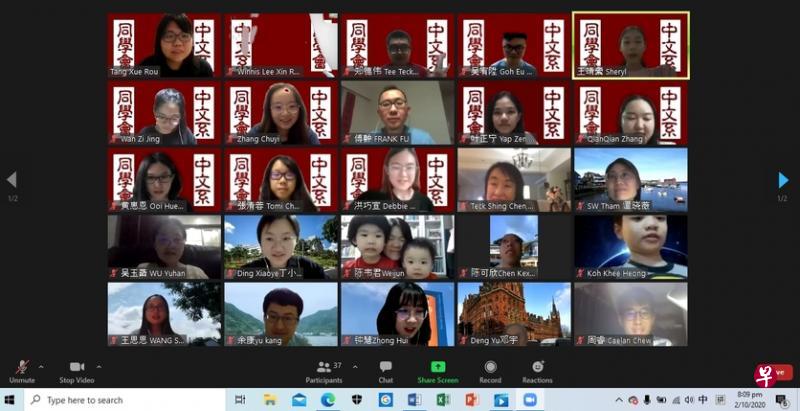
线上平台仿佛能跨越空间的隔阂,让大家打成一片。(国大中文系提供)
来源:联合早报 2020年11月4日 星期三文 / 李欣融
10月2日,新加坡国立大学中文系同学会举办了一场线上中秋节庆典。庆典主题为“月下同行庆中秋”,象征着距离不是问题,虽然不能见面,依然心心相印。
当天晚上8点,老师、校友和同学们,随着暖场音乐的播放,陆陆续续登录线上平台。为了炒热气氛,司仪一开始便请大家来个全体大合照,为庆典留下美好的纪念。
谭晓薇副教授的致辞掀开了庆典的帷幕。在瘟疫打乱民生的时代,还能在线上和大家团聚,谭教授认为是种“小确幸”。她祝愿大家远离危难,幸福安康。
当晚线上庆典展开了一连串精彩的节目。中文系的同学各个身怀绝技,有的弹吉他,有的拉二胡、弹古筝。首先,笔者用吉他弹唱了孙燕姿的《尚好的青春》。这首歌带有淡淡的思念,希望借此传达,无法相见则相念的感受。接着,中文系大一本科生黄惠恩带来了电视剧主题曲串烧的二胡演奏,曲目包括耳熟能详的歌曲,如邓丽君的《但愿人长久》和电视剧《三生三世十里桃花》的片尾曲《凉凉》。她认为许多歌曲都有“月”的意象,所以想把这些歌串起来。她说:“很欣慰能够在这特殊时期,带来几首情歌,缓疫情之急,解思乡之苦。”
中文系大一本科生张芊芊则呈献撼动人心的古筝演奏,曲目为周杰伦的《菊花台》。幽幽琴声,温柔回荡,在大家心田泛起涟漪。表演都洋溢着浓浓的中国风韵味,音乐如大珠小珠落玉盘,让大家沉醉在其中。
“射虎”游戏促进感情
线上相聚,自然少不了刺激的“中秋问答”环节--不可不玩的“射虎”游戏,从谜面打一位古代名人,如“痊愈”谜底是“霍去病”,或打一字,如“布上加插”谜底是“希”。紧接着是Kahoot游戏,一些妙趣横生的题目包括:“传说中月亮上没有以下哪一种动/植物?”“《诗经》常见的‘日居月诸’指的是什么?”等。虽然是线上庆典,但毫不影响师生的兴致,他们都热烈参与其中。这些游戏与中秋文化和习俗息息相关,让大家增广见闻。到了尾声,还进行了两轮“谁是卧底”的游戏,增进了彼此的凝聚力。
国大中文系副教授许齐雄受访时说:“以前是凑热闹地过中秋,但今年因为疫情,中秋节的团圆意义更显弥足珍贵。这就是时代对文化和个人的影响。”
谈到参与此次庆典的感受,他说:“看到国大中文系同学会举办此次活动时的投入,那份对文化和传统的执着令人动容。所以晚会当天,我是和家人一起参与的。”
线上中秋庆典圆满落幕,大家都抱着依依不舍的心情,挥手道别。“但愿人长久,千里共婵娟”,纵然不似往年那样,欢聚一堂,但线上平台也仿佛能跨越空间的隔阂,让大家打成一片。想必多年后回望,这次在非常时期举行的线上中秋庆典,必定再次温暖心扉!
网课录制
来源:联合早报 2020年10月3日 星期六
文 / 陈煜
应国大中文系黄教授的邀请,为他开设的课程 “Prominent Chinese in Colonial Singapore”(殖民时代新加坡的显赫华人)做个客座讲座,主题是林路与林谋盛家族,职责所在,当仁不让,就以2018年出版的专著《Lim Loh Family: The Journey Home林路家族:归途》为讲座题目。关于林路与林谋盛家族的讲题,我曾在不同的场合,以中英文做过演讲。然而,越是熟悉的课题,越需要静心思考,在有限的课堂时间里,该说些什么,哪些内容适合接受通识教育,来自不同学科的学生?
由于冠病疫情仍处于解封第二阶段,按照国大的要求,这门有70多位学生选修的课程,需要通过Zoom进行网上教学,为了确保视听效果,黄教授要求预录课件,在课堂上播放,这是非常时期的非常手段。
国大对于课堂授课时间有严格规定,每堂课不能超过90分钟,因此将课件分为三段录制。敲定每集的主题与内容,第一集介绍林路及其妻儿,第二集为后埔林的福建南安寻根,第三集为星洲落地生根。考虑到学生并非建筑学背景,减少了建筑方面的评析,加入有关家族史研究方法的分享。
讲课内容涉及新加坡和闽南两地的知识,之前的公开讲座,听众多半是对这个课题有兴趣的公众人士,要么是林路家族后裔,他们具备一定的相关知识。回想自己教过的学生,在没有去闽南考察前,对于福建,对于中国历史大多是相当陌生,有必要普及一些基础知识,再次调整课件幻灯片,加入厦门、南安的地理介绍,以及鸦片战争后中国口岸城市的内容。
课件幻灯片做好了,到了录制的步骤,这才是真正头疼的阶段。采用Zoom进行录制,试过几种录影方法,开启录像设置,可以看到自己的影像,接近直播的效果,但总觉得人物影像会影响幻灯片播发效果,决定关闭摄像头,这样一来既不必化妆,也不必考虑灯光效果。
几番试验后,终于可以自如控制幻灯片播放与录制。开始全集试录,很快发现几个问题,首先是每集录制时长不能超过25分钟,得严格控制演讲内容和语速;其二平时上课不会注意口语中的语病、儿话音、停顿等,录音起来一听,这些问题就很刺耳,得加以避免;再者,根据讲稿控制宣讲内容,同时鼠标要在幻灯片上做相应指点,录制时需要全神贯注,一不小心就会出错,加上自己不会视频编辑,只能靠一遍遍的反复录制,以求达到最好效果。
眼见着花费大量时间投入讲座录制,若是只为了一堂校内课程播放,实在是浪费资源,决定将录影放上网络与更多人分享,对幻灯片做出最后调整,写下推荐阅读与联络方式。
三集讲座录制下来,对于配音这个职业佩服的五体投地,看起来张张嘴的工作,并不是那么简单,深觉行行皆不易。将录影上载到YouTube,又是一番新手上路的折腾。疫情改变了生活,改变了教学,原本逃避新技能的学习,这下子逼上梁山,十八般武艺都耍起来了。
Eminent NUS historian Professor Wang Gungwu receives prestigious Tang Prize
The 2020 Tang Prize in Sinology has been awarded to Professor Wang Gungwu, University Professor at NUS Arts and Social Sciences and one of the world's foremost experts on the Chinese diaspora.
Announced on 20 June 2020 by the Tang Prize Foundation, this prestigious award was conferred on Prof Wang in recognition of his trailblazing and dissecting insights on the history of the Chinese world order, overseas Chinese, and Chinese migratory experience.
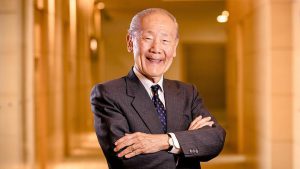
As a leading scholar on Sino-Southeast Asian historical relations, Prof Wang developed a unique approach to understanding China by scrutinising its long and complex relationship with its southern neighbours. His erudition and critical discernment have significantly enriched the explanation of China’s changing place in the world, traditionally developed from an internalist perspective or in relation to the West.
Prof Wang said, “It is a great honour to be awarded the Tang Prize in Sinology. When I was a student, Sinology was part of Oriental Studies and associated with classical studies, guoxue (国学) in China, Hanxue (汉学) in Japan and Europe. It was centred on ancient philology as the foundation for the study of literature, philosophy and history. The four previous awardees, Yu Ying-shih at Princeton, Ted de Bary at Columbia, Shiba Yoshinobu at Tokyo and Stephen Owen at Harvard, started with the study of classical Chinese. Yu and de Bary went on to enrich our knowledge of intellectual history while Shiba did the same for social and economic history. Although Owen is best known for his contributions to literature, his work on literary theory has illuminated key features of the historical imagination.”
“I am a historian who believes that China’s present cannot be separated from her total past. Living all my life outside China, I am fascinated by the way China had fallen and risen several times. Each time that happened had made a difference to the course of world history. For us to understand why that could happen requires us to go beyond the humanities to the social sciences. I am gratified that modern Sinology now recognises the centrality of shi (史) in Chinese civilisation,” he added.
One of Asia’s most important intellectuals
Prof Wang Gungwu has been University Professor at NUS Arts and Social Sciences since 2007, and Emeritus Professor of the Australian National University since 1988. He is Foreign Honorary Member of the History Division of the American Academy of Arts and Science and former President of the Australian Academy of the Humanities. Prof Wang received his BA and MA from University of Malaya (UM) in Singapore, and PhD at SOAS, London.
Spending much of his life immersed in different cultures gives Prof Wang diverse personae as a scholar. He is an “insider” in the academic tradition of Chinese Confucianism and British elite education, and an “outsider” in the interpretation of China’s perception of the world. His original approach to understanding China from the southern perspective is in part a natural choice given his personal experience. This same experience provided him with abundant inspiration in his formative years as he matured into an authoritative voice in the analysis of China’s worldview.
Besides being an outstanding scholar, Prof Wang has been an inspiring educator since he embarked on an academic career first at UM and subsequently at the Australian National University, before making his mark as Vice Chancellor of the University of Hong Kong from 1986 to 1995, Chairman of the Institute of East Asian Political Economy from 1996 to 1997, and Director of the NUS East Asian Institute from 1997 to 2007.
At 89 years old, Prof Wang is still very prolific as a scholar. “I am writing on Chinese hopes and fears following China’s opening and reforms, focusing on the period after the People’s Republic of China’s entry into the United Nations in October 1971,” he shared.
And when asked how COVID-19 has impacted him, Prof Wang said, “COVID-19 has moved me away from my routines and made me parcel my life more carefully and take into account how much time I might have to get my work completed.”
The biannual Tang Prize consists of four categories, namely Sustainable Development, Biopharmaceutical Science, Sinology and Rule of Law. It aims to promote the interaction and cooperation between cultural and technological research so as to find a 21st century path to the sustainable development of the world.
This article was first published on 22 June 2020 in NUS News at https://news.nus.edu.sg/highlights/eminent-nus-historian-professor-wang-gungwu-receives-prestigious-tang-prize.
合作研究福建漳州文史 新中两地教授通过小碑铭窥探大社会
来源:联合早报 2020年1月6日 星期一
文 / 卞和
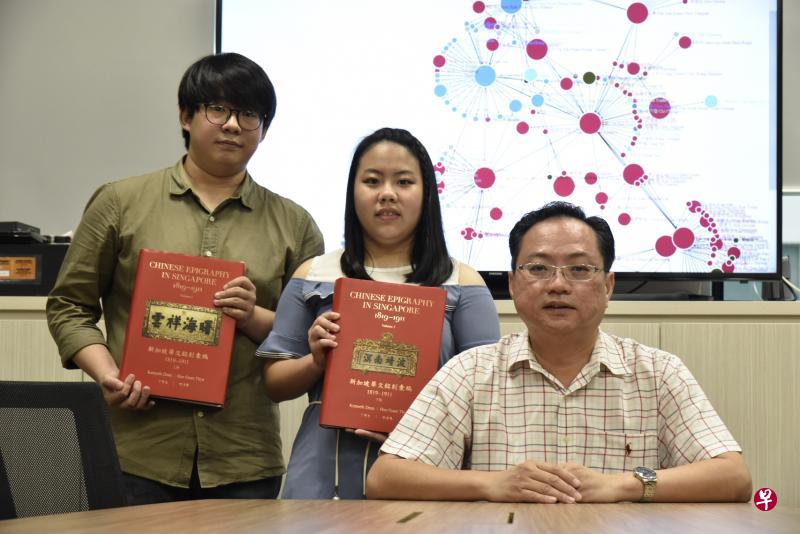
国大中文系高级研究员许源泰博士(右起),带领邓凯恩和张文博进行华社大数据库的建立。(特约伍书永摄)
由新加坡国立大学中文系主任丁荷生和高级研究员许源泰博士率领的研究团队这几年造访本地各大会馆、庙宇、坟场,展开了工程浩大的资料搜集和编码整理工作,目标是建立1819年至2019年八代新加坡先贤的个人和人物关系网络大数据库。
除了聚焦华人领袖,本地的华社研究也放眼历史上的“小人物”,进一步通过大数据谱写华社领袖和中低层社会人物的关系网络。
2017年,团队开始利用地理信息系统(Geographical Information System)来捕捉新加坡历史。而自去年2月,由国家图书管理局、新加坡宗乡会馆联合总会,以及国大中文系携手共创的“新加坡人物传记数据库”正式上线以来,数据库共收录了200位本地重要华社领袖以及由他们扩展而来的社会关系网络,把研究带到了一个新阶段。
许源泰指出,数据库的建立是从“大人物”出发,并已整理出约1000名华人领袖的资料。他们的计划是建立1819年至2019年八代新加坡先贤的个人和人物关系网络大数据库。以每25年为一个阶段,目前团队正在整理收录于《新加坡华文铭刻汇编1819-1911》中约5万人的资料。
许源泰说,这5万人是一个庞大的网络,从会馆、庙宇和碑文搜罗而来,其中大多数都是名不见经传的“小人物”,“这些中层阶级和低层阶级人物,也是构成华社的重要分子,却常被学界忽略。”
从会馆特刊坟场墓碑搜集新资料
此外,团队也在开拓新的第一手资料,包括从各大会馆收集的会馆特刊,以及从墓碑上手抄而来的死亡记录,经过团队的辨认和数码化后,从中整理出记录于1922年至1972年的6万2000多个人名。
“目前学术界从来没有把这批资料列入研究范围。”许源泰说,保留下来的都是武吉布朗坟场的墓碑记录,由国家文物局提供,其中大部分人都属于福建籍贯。
丁荷生和许源泰也带着学生亲自到武吉布朗坟场寻找更早期的墓碑,目前已经找到了1500多个清代时期的人名。而在被发现的墓碑当中,年代最久远的刻于1824年。
许源泰透露,团队这两年来已经为这批墓碑成立了独立的资料库,将来也会与“新加坡人物传记数据库”接轨,让墓碑的地理信息和人物的个人信息相结合,打开新的研究视角和方向。
团队也与新加坡族谱学会合作,收集了100多部家谱资料,主要来自福建和广东,其中也包括来自潮州的家庭。许源泰说,明朝和清朝时期有大量的移民迁徙至新加坡和台湾等地,通过研究家谱,可以看出离散于两地移民之间的关联和差异。
许源泰也指出,在美国和台湾等地的人物研究主要专注于“仕”,即知识分子,“不过新马一带早期都是商人和工人为多,他们往往通过建庙、建会馆而留名。我们研究的切入点因此很不一样。当然量很多,困难也很大,建立这样的资料库因此不容易。”
国大中文系硕士生张文博(23岁)、南洋理工大学中文系二年级生邓凯恩(21岁)都是团队一员,分别参与了庙宇和墓碑的研究工作。
邓凯恩说,田野调查的过程十分严谨,墓碑上的资料须仔细分类、辨认和校对。整理后的资料还须进一步编码,才能收录在资料库以便分析。
许源泰相信,这项研究可以帮助我们了解华人社群在本地的活动足迹和互动过程,“新加坡的会馆和庙宇总是在不断搬迁,许多记录都在流失,许多人名也有所重复。但通过电脑的识别和编码,可以帮助我们串联出一个网络,看到人脑和肉眼所看不到的东西,提出新的问题。”
陈奕福:会馆应以求同存异精神解决纠纷
来源:联合早报 2019年3月11日 星期一 3:30 AM
文/蔡欣颖
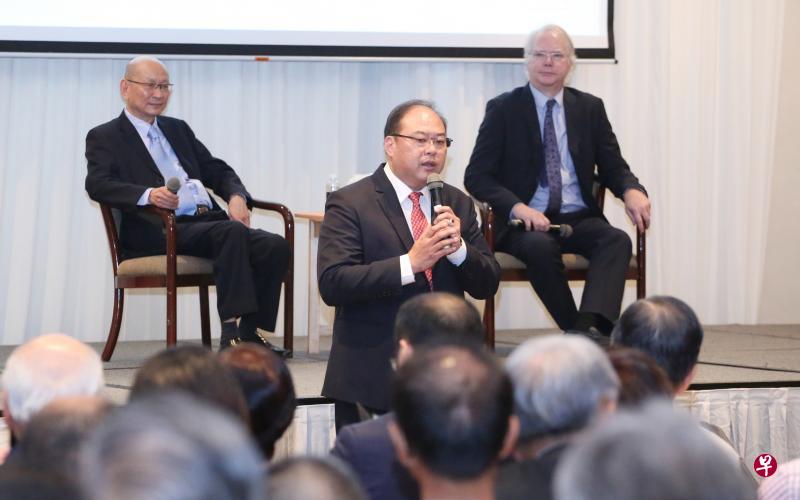
新加坡宗乡会馆联合总会会长陈奕福(中)强调用求同存异的方式,解决华人社团的纠纷。昨天的讲座主讲者是柯木林(左),主持人则是新加坡国立大学中文系主任丁荷生。(梁麒麟摄)
本地华人社团目前一大问题是不时出现内部纷争,宗乡会馆联合总会会长陈奕福认为,小至家庭,大至社团,都会出现意见不合的情况,因此互相包容至关重要。会员也有责任维护社团或会馆的名誉,以大局为出发点。
华人社团和会馆时有纠纷,新加坡宗乡会馆联合总会会长陈奕福认为,应该本着求同存异的精神处理问题,以维护社团和会馆名誉,不让外界对华社的看法受影响。
陈奕福昨天以主宾身份出席“华人社团:200年来新华社会的中流砥柱”讲座,并发表上述看法。
本地会馆近期传出风波,义安公司耗资4000万元要重新发展潮州大厦,要过去55年同在一个屋檐下的潮州八邑会馆搬离大厦,但双方无法对搬离大厦的条件达成协议,各自发起诉讼。高等法院将在星期四(14日)审理相关诉讼。
此外,海南会馆近期也被禁在琼州大厦办活动,会馆目前正准备通过法律程序解决和琼州天后宫之间的纠纷。
一名与会者指出,本地华人社团目前一大问题是不时出现内部纷争,社团内或由不同团体掌管钱财和处理会务,并因种种理由引发纠纷。他因此提问宗乡会馆会如何发挥领导角色,从中调解纠纷。
对此,陈奕福回答时,多次强调了“求同存异”的解决方案。他指出,小至家庭,大至社团等,都会出现意见不合的情况,因此互相包容至关重要。会员也有责任维护社团或会馆的名誉,以大局为出发点,因为“这最后会直接影响我们华人社会的地位,以及外界如何看待我们。”
建议邀德高望重潮籍人士调解义安八邑纠纷
他指出,过去200年来,很多会馆都有出现问题,只是为了维护名誉会“关起门来讲”。针对义安公司和八邑会馆的纠纷,他受访时建议潮州社群德高望重的人出面协调,以便走出僵局,避重就轻处理双方不统一的意见。
历史研究工作者、宗乡总会学术委员会主柯木林认为,会馆是因特定事件引发纠纷,这些纠纷不会导致华社陷入分裂的局面,或影响华社领袖在华社的地位和影响力。
柯木林是此次讲座的主讲者。他在一个半小时的讲座上,针对200年前华人社团的社会功能,各大华社领袖和社团,以及对华人社团的展望发表看法。
他提到,华人社团如今在社会上扮演的角色与过去大不相同。华人社团过去的主要社会功能,主要是承办学校和医院,举行集体婚礼和行善。华人社团现在则是推动华族文化发展的文化机构,同时也是促进族群融合与文化认同的中心。
展望未来,柯木林认为,华人社团应在继承传统习俗文化的同时推动创新,如使用科技记载历史,以便吸引年轻人参与。此外,华人社团也应保持开放包容,打造具有活力的文化生态。
此次讲座是“纪念新加坡开埠文化讲座系列”的第三场讲座,由具有百年历史的吾庐俱乐部与陈嘉庚基金会联合主办,吸引400多人出席。
林义顺改变本地潮人帮权结构
来源:联合早报 2019年10月14日 星期一 3:30 AM
文/谢燕燕
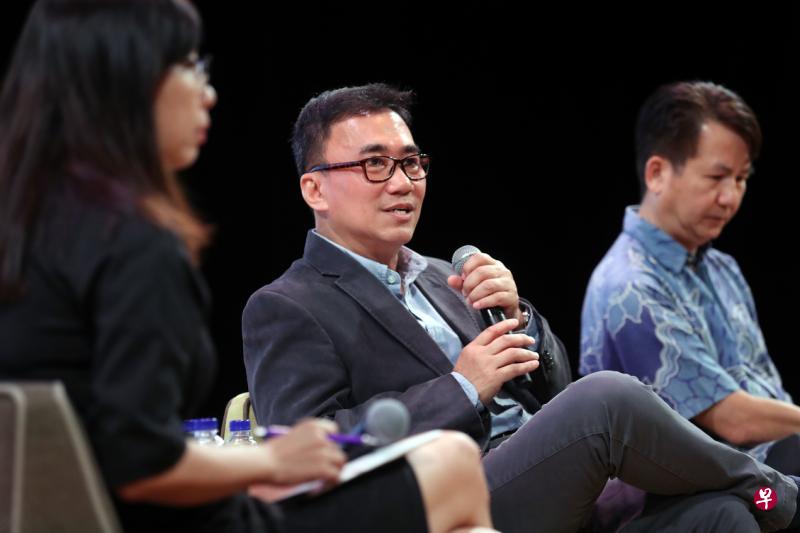
“认识林义顺”讲座的主讲嘉宾李志贤(左)和黄贤强副教授(右)。(饶进礼摄)
国大中文系副教授李志贤认为,林义顺在1929年召开的潮侨大会,倡议由潮社推举出来的领袖共同管理义安公司,改变潮人帮权的结构,却没有分裂潮社。
本地学者从不同角度审视和评价先贤林义顺(1879-1936)的贡献时,认为他既是中国的爱国华侨,革命志士,更是新加坡早期的拓荒先驱,对建设社区有功,也是民国时期的华社领袖,还是一名改变本地潮人帮权结构的潮社领袖。
革命志士与拓荒先驱
新加坡国立大学文学暨社会科学院中文系副教授李志贤最近在新加坡潮州八邑会馆与杨启霖潮州文化研究中心联办的“认识林义顺” 讲座上提出上述观点。
李志贤认为在重新审视林义顺的历史地位时,可从他在大时代舞台上展现的两个面相来观察他,即从他参与中国革命和在本地从事拓荒种植业来看。
青年时期的林义顺加入同盟会,追随孙中山搞革命,对现代中国的政治进程有贡献。壮年时期的林义顺,在我国早期的荒郊地区开垦超过两万多英亩的土地,特别是开辟三巴旺一带,对新加坡早期的开发与经济发展有贡献。
李志贤指出,林义顺拓殖三巴旺时,会提供各种福利鼓励员工在园区附近安居落户,从而促进人口增长,形成村落。早期的义顺村、忠邦村便是纪念他这方面的功绩。另外他也发展水路交通,把实里达河周边变成物资集散地,逐渐形成市镇。
纷争是无可避免的整合
李副教授在这次座谈会上也触及林义顺1928年以潮社领袖姿态号召筹划成立潮州八邑会馆,并在1929年初召开潮侨大会,反对义安公司的潮人公产由佘有进后人以世袭方式把持,倡议由潮社推举出来的领袖共同管理。林义顺等人和义安公司据理力争却谈不妥,不过在英殖民地政府批准八邑会馆在豁免注册下成立后,佘家后人终于让出掌控权。
在反思1929年事件所能给予的启发与借鉴时,李志贤说,社群的权力关系和权力中心并非处在静止状态,会随社群内在因素和外在环境的变化而有所反应。
“另一方面,社群在长期发展过程中出现纷争是一种无可避免的整合,应从积极角度看待,它或许使权力关系变得紧张或发生变迁,但不一定会分化社群,也可能是一种自我更新与改革。”李志贤说,林义顺所倡导的改革虽然改变潮人帮权的结构,却没有分裂潮社。
当时所产生的新权力中心结束潮社由一个家族垄断的局面,变得更透明,同时引导本地潮州社群步入权力多元化的时代。林义顺当了两届八邑会馆总理后便功成身退。
李志贤认为林义顺当时能胜出,是因为他选择“回归中华,回归传统”,加上他参加过中国革命,这一切得到当时潮社的认同。
当然,林义顺那时已不只是名成功商人,也是一名在华社,在殖民地政府心目中具有影响力的跨帮群领袖。他曾出任英殖民地的乡村局委,又是名太平局绅,担任过两届中华总商会会长,又是怡和轩俱乐部总理。
庞大人脉网络
林义顺的大儿子林忠国娶陈嘉庚的女儿,大女儿林织玉嫁黄仲涵的儿子,次子林忠邦娶李俊源的女儿,通过与巨富名流联姻,林义顺有着很庞大的人脉网络。
在反思帮权问题时,李志贤指出,在强大政府体制和高度国际化的今天,帮权早已走入历史,但是社团仍然是凝聚社群的一股庞大力量。他认为社团当前急务是集中精力开拓文化事业,协助维护新加坡独特的华族文化和建立身份认同。从这一点上来看,他认为八邑会馆近几年做得很好。
华侨返国创业典范
另一位主讲者国大中文系副教授黄贤强则带领大家从“林义顺之中国行迹篇”,以及他1926年走访日据时期的台湾,来认识这位历史人物,进一步窥视他丰沛的人脉网络。
黄副教授说,林义顺从民国成立后的1912年到他1936年4月19日病逝于上海,前后到访中国和台湾不下十次。他出国的主要目的是考察业务,寻找投资机会,探访亲友,革命同志和政界人士,此外便是旅游,或者到日本就医时过境等。
当中比较受人瞩目的行程,包括他1917年9月至11月经上海赴北京,受总统接见,又得到中国政府支持他在海南岛种植橡胶,成为华侨返国创业典范。
1921年10月至11月,他取道广州汕头到上海,以中华总商会会长身份接受中华民国制糖公司邀请发表演讲,之后续程前往北京。
1929年于林义顺来说是特别忙碌的一年。他除了忙着召开潮侨大会,成立八邑会馆和与佘家交涉,间中还两度到中国。2月时他经香港到广州、上海和北京,5月再到北京西山碧云寺参加孙中山的移棂仪式。
他在祭奠仪式上,先代表新加坡前同盟会会员郑聘廷、陈嘉庚、陈楚楠、林文庆等鞠躬敬献挽联,接着又代表华侨银行和华南银行全体职员鞠躬敬挽,然后再代表醉花林和怡和轩献挽联,其身份可见一斑。
环游台湾参观景点
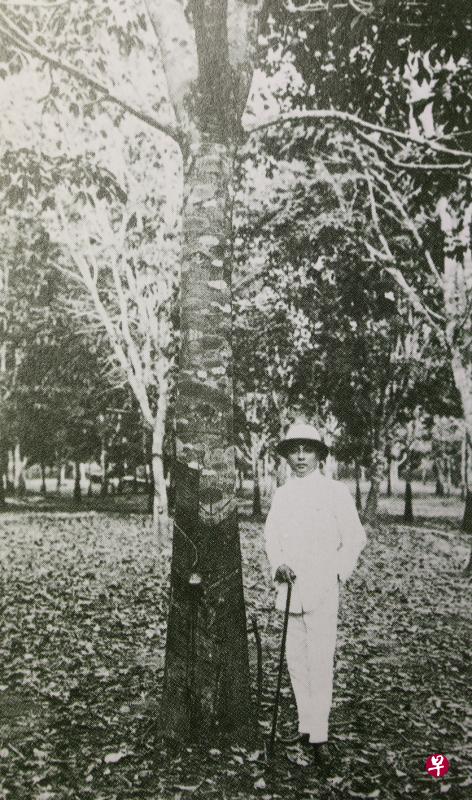
以种植橡胶和黄梨发迹的林义顺,曾开垦超过两万英亩土地,对开发早期的新加坡有显著贡献。(档案照)
比较不为人知的是,林义顺曾于1926年11月至12月之间,经厦门到台湾考察访问。当时随行的是一名叫黄强的将军,他过后把行程撰写成《台湾别府鸿雪录》,并在1928年5月出版。因为这本书,林义顺的台湾行有了详细记录。
黄贤强说,林义顺先在厦门先见了林文庆和参观厦大,之后才从厦门前往台湾。他在台湾除了环岛参观多个著名景点,还在台湾植物园得到樟脑树和相思树的种子,准备带回南洋种植。林义顺在台湾也有意想不到的人脉关系,辜正甫的父亲辜显荣特地在江山楼宴请他,台北板桥林家花园主人林薇阁也与他见面。
成就的肯定与本地华文文学奖的角色邂逅的惊喜
来源:联合早报 2019年8月12日 星期一 3:30 AM
文/张曦娜
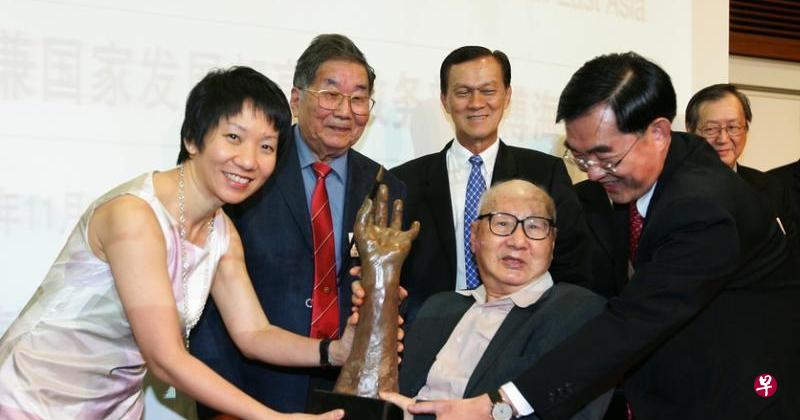
方修(坐者)于2008年获颁首届“南洋华文文学奖”,从当时的教育部兼国家发展部高级政务部长傅海燕(左一)手中接受奖座。左二为刘新汉。
本地华文文学奖不少,南洋华文文学奖、方修文学奖、新华文学奖、金笔奖、新加坡大专文学奖等。
不同类别与概念的文学奖各有意义,一类是表扬成就,对作家的创作给予肯定,对后来者起示范作用。另一类是激励并遴选佳作,是发掘写作人才的管道。无论哪一种形式,都起鼓励和表彰的作用。
上世纪七八十年代至今,本地华文文化界先后设立了不少文学奖;近年来,一些文学奖并已打开大门,不囿于本地,包括南大孔子学院主办的“南洋华文文学奖”,热带文学艺术俱乐部举办的“方修文学奖”;前者顾名思义,开放给“南洋”地区的作家参选,后者基于新马华文文学同根同源,为新马写作者提供评选平台。
南洋华文文学奖与方修文学奖颇有渊源,首届南洋华文文学奖颁发给本地文史家方修,方修得奖后即向媒体透露,把奖金全数捐出,成立方修文学奖。
承前启后与跨越地域
南洋华文文学奖奖金高达三万元,是目前奖金最高的本地华文文学奖,该奖由不久前辞世的南洋大学校友刘新汉发起,在刘新汉率先捐出10万元及发动下,多位本地企业家包括何侨生、陈廷雷、施涌龙和何能恩博士及茶阳会馆也相继捐款,共筹得100多万元,于2007年7月正式成立南洋华文文学奖,并交由孔子学院主办。刘新汉当时在接受《联合早报》访问时说:“我从学生时代到今天,一直都对华文文学有所偏爱,因为热爱华文、中华文化,一直希望能在世界华文文学的推动上尽一点微力。”
对于南洋华文文学奖发挥的作用,现任孔院院长梁秉赋博士在接受《联合早报》访问时说:“我们希望南洋华文文学奖能承前启后及跨越地域。”
梁秉赋说:“南洋华文文学奖创立的初衷,是对在华文文学创作领域内有卓越贡献的资深作家予以肯定,借此提升华文文学在世界文学的地位。2016年,在累积主办三届南洋华文文学奖的经验后,我们首度推出‘第一届南洋华文青少年文学奖’,让它和‘第四届南洋华文文学奖’同时举办、颁奖,希望能薪火相承。我们希望对华文写作有兴趣的青少年,能受到卓有成就的前辈作家的感召、启发和激励;也让前辈作家在这个奖项的平台上,接受年轻一代的礼赞和致敬,寄望这一奖项在华文文学创作的领域内,起承前启后的作用。”
他说,首三届南洋华文文学奖得主方修、黄孟文、骆明和王润华都是新加坡作家;第三届南洋华文文学奖还颁发一项特别表扬奖给印度尼西亚作家黄东平。第四届(2016)和第五届(2018)的奖项,颁给两位马来西亚作家黎紫书和陈政欣。
梁秉赋说:“这一奖项虽立足新加坡,却有放眼世界的愿景和胸襟,希望南洋华文文学奖能以文学的、永恒的普世意义,突破人为的、世俗的国家和地区疆界,发挥跨越地域的作用;在推动本区域,乃至世界范围内的华文文学的发展做出一些贡献。”
南洋华文文学奖公开接受提名。梁秉赋透露:“这几年来,我们收到的提名,来源地域有逐渐扩展的趋势。2014年收到的提名仍以新加坡作家居多,占75%,其次是印尼,有15%,马来西亚则占10%。但过去两届,已经收到来自泰国、缅甸、澳大利亚和美国的提名。这一发展,令我们深受鼓舞。”
方修文学奖执行委员会策划佟暖说,第三届方修文学奖于今年揭晓,为了进一步发挥奖项的功效,热带文学艺术俱乐部邀请得奖者如丁云举行讲座,从他的小说《生死边界》谈到人物描写、人物力量、心理角度等创作问题,这类讲座共举行三次,包括日落冬的微型小说 《又见总统》及短篇《烟囱》。
佟暖说:“方修文学奖还年轻,须积累经验和提升。一方面继续发掘新马两地的文学人才,另一方面增进方修文学奖的知名度和影响力。”
文学奖对创作的意义
谈到文学奖对于文学创作的意义,作家及文化奖得主林高提出文学奖的不同类别与概念。他说:“文学奖有两类,一类是表扬成就, 比如新加坡文化奖(文学)、南洋华文文学奖、新华文学奖;获奖作家有所坚持,有所贡献,获奖是对他们的创作给予肯定,对后来者有示范的意义。另一类是激励并遴选佳作,如由南洋商报及后来的报业控股华文报集团主办的金狮奖文艺创作比赛,新加坡作家协会1990年代主办的亚细安青年创作比赛(微型小说),国家艺术理事会主办金笔奖,书籍理事会主办新加坡文学奖,热带文艺俱乐部主办方修文学奖,新加坡诗歌节主催“全国诗歌创作比赛”,还有刚过去的新华青 年诗歌奖等等。”
林高认为,主办这一类比赛,实际效果要看文学土壤是怎么样了,如果文学土壤还好,办一次看见一次的成效。他回忆:“上个世纪八九十年代举办金狮奖是一件大事,其成果不仅在得奖,海外评审参与座谈掀起文坛与民间的讨论,其热忱持续好一阵子,至今记忆不衰,至今还有文友缅怀过去的盛举。当年得奖作者也都成为继续耕耘的作家,希尼尔、孙爱玲、张曦娜、潘正镭、谢裕民、蔡深江等都曾获奖,也都在后来证明他们有实力。上世纪80年代办文学创作比赛是想看到一次丰收,现在办是必须施肥,邂逅佳作会惊喜。”
新加坡作家协会会长林得楠说:“文学奖或比赛的意义在于发掘、提升、传承,以及为文学领域建立面向大众的舞台。文学奖是文学发展与推动创作的部分,也是发掘写作人才的有效管道。同时,也可以用来鼓励和表彰在文学创作上有所成就者。”
林得楠以个人经验为例说:“我是停笔八年后重新写诗,并分别于2001年和2003年获得金笔奖第二名和第一名,得奖成为我创作的鞭策,也化为推动力,推动我持续创作,对自己的作品更有要求。我觉得作家可以把参赛当作是对自己的鞭策与推动,而在参与大赛的过程中,作家也可以为自己定位,进一步了解自己的作品,也了解他人的水平。以金笔奖来说,由于规定参赛者必须未曾出版个人选集,及在历届比赛中得过冠军的作者不能参赛,这也让一些优秀的年轻写作者有文学舞台。”
佟暖说:“通过文学奖评选授予相应的奖金,对得奖者而言,应是一种高于金钱定义的奖励。往大的说,文学作品体现的人文价值和追求,是精神文明的一支标杆。联系到现状而言,除了肯定、鼓励作家努力创作具有深刻思想性和精妙艺术性的优秀作品,同时也为挖掘和发现有利于我国华文文学可持续发展的新血,搭建一次次的交流平台。”
新加坡文艺协会会长成君说,文艺协会今年9月即将颁发第十届“新华文学奖”及第五届“连士升文学奖”。他说:“文学奖能促进文学创作,推动文学发展进程,可鼓励新秀及文学爱好者继续创作,对国家文化起着潜移默化的促进作用。”
梁秉赋说:“文学奖对文学创作的意义,首先是文学奖对培养创作风气,尤其是奖掖后进,具有非常关键的作用。其次,它可能也在净化人类的心灵,抚平人们的创伤,点燃我们的希望等这些方面,发挥不可替代的作用。因为文学是浇灌心灵的养分。因此有地位、分量的文学奖,能让人们更加认识到文学创作的意义。”
延续金狮奖精神
林得楠的印象中,上世纪八九十年代的金狮奖文艺创作比赛,是影响深远的文学奖。他说:“这奖项的停办对新华文学来说是一种损失。在金狮奖的舞台上曝光,继续在新华文学场域耕耘和做出贡献的有希尼尔、艾禺、梁文福、张曦娜、怀鹰、蔡深江、谢裕民、孙爱玲、伍木、吴耀宗、黄明恭、黄嘉豪、李永乐、刘文注等,目前还没有其他新华文学奖项超越金狮奖。”
他说:“我也在思考类似金狮奖的奖项是否可能再现。要在目前的社会环境复制当年金狮奖的影响力是不可能的,因为当年的金狮奖是一种文化现象,在当时的社会它有发挥影响力的条件,现在要重复金狮奖的盛况几乎不可能,不过,我们可以延续其精神。”
林得楠建议,华文媒体集团考虑把文学奖纳入早报文学节,邀请新华文学团体参与筹办。他说:“一个包含以表彰本地写作者为宗旨的文学奖,若能纳入早报文学节,影响力必扩大。”
金狮奖停办后,由国家艺术理事会主办的金笔奖于1993年创办,每两年举办一次,分为短篇小说及诗歌两类,参赛者包括本地作者与新移民。今年的金笔奖截稿日期,也将从8月16日延至8月26日。金笔奖创办至今积累一定的成果,历来获奖作者有许多活跃于今日的文坛,如林得楠、许维贤、丁云、黄明恭、周德成、陈志锐、佟暖、庄明楷、陈维彪、陈晞哲等。
国家艺术理事会向联合早报透露,过去三届的金笔奖中,参赛华文作品的数量,总体上有所增加。
林高建议,书籍理事会主办的新加坡文学奖应增设“翻译奖”。 他说:“有些人默默地在做翻译的工作,应给予肯定。翻译是桥梁,透过翻译可了解其他语种文学的特色。为了加强沟通,翻译的重要性不言而喻。做起来有难度,却值得去做。”
林高也说:“评审是一个重要环节。最好做到评审过程透明公开,包括计票、评审讨论,初审、决审过程。找合适的作家,包括海外作家当评审是要经过审慎考虑的。怎么看一项比赛和谁当评审,是相互因果的。”
培养新一代创作者
林得楠认为,纵观目前新加坡的华文文学环境,当务之急是培养新一代新华文学爱好者和创作者。他说:“2018年作协在华族文化中心的资助下,首次主办新华文学青年诗歌奖。作协也会把资源重点用在培养年轻写作人才方面,目前已在探讨明年再办青年文学奖。2018年是诗歌,2020年可能是微型小说或闪小说。作协与福州会馆及新加坡华文教师总会联办的全国小学生现场华文创作比赛,至今年也已25届,作协与福州会馆及推广华文学习委员会联办的全国中学生微型小说创作比赛,至今也办了四届。”
林高说:“比赛与奖金只能产生激励,不能取代动力,以目前的形势,应从培养根苗做起,在中学、院校和大专办创作比赛的意义比较大。福建会馆和福州会馆就努力在做这样的工作。”
由南洋理工大学中文学会、新加坡国立大学中文学会主办,福建会馆赞助的新加坡大专文学奖为本地学子提供一个文学评选平台。今年已进入第21届的大专文学奖,历来造就不少作家如周德成、潘家福、陈华彪等,都是大专文学奖的赢家,又如近日以小说集《永发街事 》引起关注的陈济舟,刚出版小说集《孕鱼》的随庭(何颖舒),都曾是大专文学奖得奖常客,两人都是中学时分别自中国四川与湖南到新加坡读书。
南洋理工大学新加坡大专文学奖筹长张芷怡说:“新加坡大专文学奖今年反应热烈,收到522篇参赛作品。因为增加新组别,提高个人投稿数上限,增加奖项数目等原因,今年收到的作品比往年增加一 倍多。”
为了发掘及培养文坛新秀,本地文学团体近年来也为年轻写作者主办各类文学奖项。成君说,文艺协会联合莱佛士女中,自2016年开始举办“全国中学生华文诗歌创作比赛”,从第二届起,邀得新加坡作家协会和新加坡五月诗社协办。另外,文艺协会也与新加坡福建会馆联办全国中学生华文创作比赛“新蕾奖”,今年已进入第17届,文艺协会并于2014年创办“中学生短剧创作营”,以学生集体写短剧剧本并自导自演。
成君说:“这些给学生主办的文学比赛,以鼓励和引导方式,假以时日,必有成果。”
林得楠期望其他民间团体如宗乡总会或华族文化中心,能提供各种形式的支持或参与。他认为:“新华文学团体都是民间团体,资源有限,常常出现心有余而力不足的情况。”
Staying rooted in a pluralistic modern world
Source:The Straits Times PUBLISHED APR 23, 2019, 1:15 PM
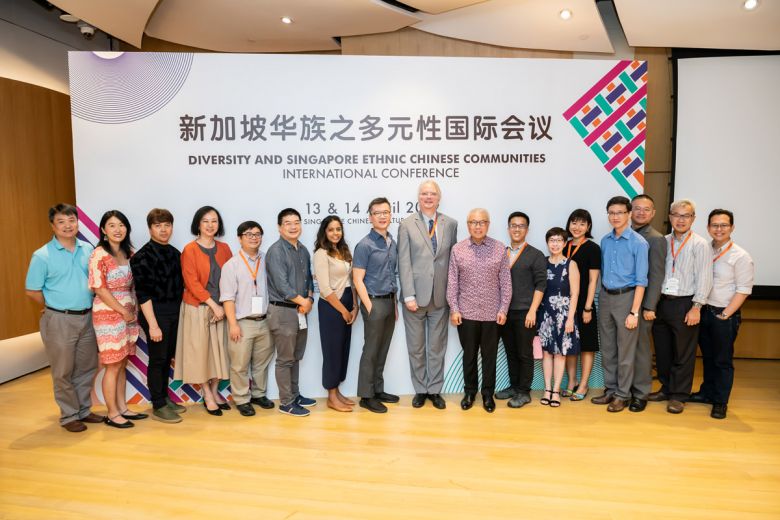
Some of the panelists with Mr Low Sze Wee, CEO of Singapore Chinese Cultural Centre (eighth from left), Prof Kenneth Dean from National University of Singapore (centre), and Mr Chua Thian Poh, Chairman of Singapore Chinese Cultural Centre (eighth from right). PHOTO: SINGAPORE CHINESE CULTURAL CENTRE
Singaporean academics explore different aspects of the Singapore Chinese community
Last August, local singer Novabelle Ng, 28, posted a Cantonese rendition of popular National Day Song “Home” on Facebook. It went viral.
So did local rapper Shigga Shay’s multilingual rap single “LimPeh” (father in Hokkien). The song has since clocked more than 880,000 views on YouTube since it was released in 2013. He was 21 years old at that time.
At a recent two-day conference held at Singapore Chinese Cultural Centre (SCCC) on April 13 and 14, one panelist cited them as examples of how young Singaporeans are expressing their Singaporean identities in their own unique ways.
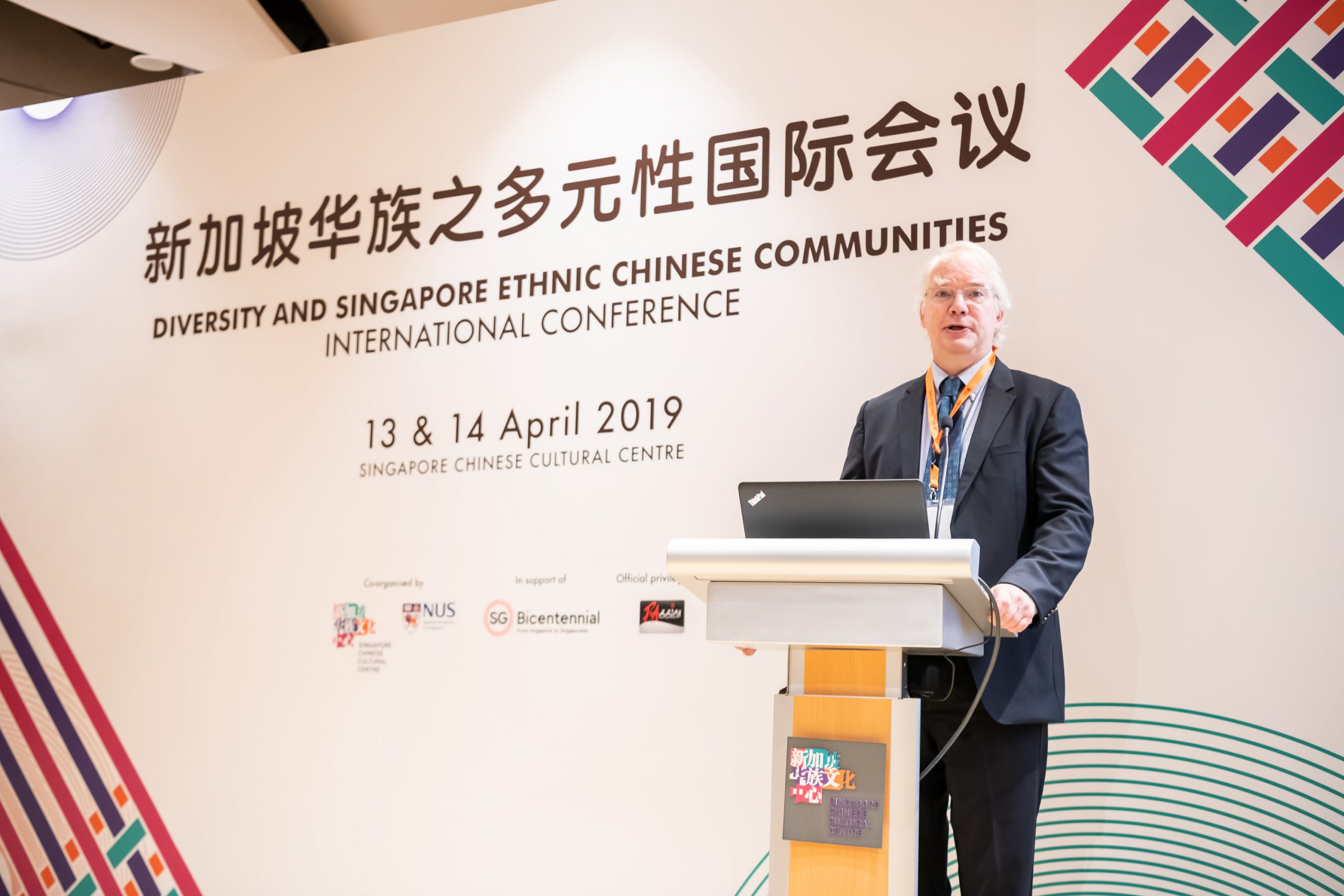
Prof Kenneth Dean making his opening remarks at the event. PHOTO: SINGAPORE CHINESE CULTURAL CENTRE
“We need to look at bottom-up efforts by young Singaporeans, dialect content created by youth for youth. They value content that is spontaneous and carries genuine emotions. Of course, humour is always good to generate popularity,” said Adjunct Assistant Professor Brenda Chan of the Department of Chinese Studies, National University of Singapore, on the second day of the conference.
Preserving dialects is key to Singaporeans’ identity and well-being, said Assistant Professor Nala Lee of the Department of English Language & Literature, National University of Singapore. Only 16.1 per cent of Singaporean Chinese spoke Chinese dialects most frequently at home, according to Statistics Singapore's General Household Survey 2015. The figure has been declining over the years.
Baba Malay — an integral part of the Peranakan identity in this part of the world — is also dying out in Singapore.
“Language is a store of knowledge, and there is value in linguistic diversity,” said Dr Lee.
She cited Baba Malay (or Peranakan Malay) as a unique repository of the fusion culture and identity of its speakers. Baba Malay words in Singapore are influenced mainly by Malay, with various words from languages such as the Hokkien dialect, Portuguese and Dutch.
“For example, kinship terms in Baba Malay — words relating to household matters, ceremonies and religion, food and medicine, time and measurement, emotion and judgement — are mainly influenced by Hokkien origin, but without Hokkien tones,” Dr Lee said.
She added that Baba Malay is now critically endangered because of English-medium education that began with the British administration, and the rise of inter-marriages between Peranakans and other Chinese communities.
There are an estimated 1,000 fluent Peranakan speakers in Singapore.
The only way to revive dying languages or dialects is through engaging the young; social media could be an efficient avenue to reach out to the young and reconnect them with their roots, said Dr Chan.
She added that the challenge is to revive Chinese dialects while continuing the English and Mother Tongue two-language track implemented in schools. To do so, she advocates looking beyond the utilitarian value of dialects, and giving more prominence to their intrinsic cultural value.
“Being Chinese gives me tremendous autonomy to make sense of my being and existence, enabling me to negotiate - and to impart to my children (only one of whom is learning Chinese) - the power of being Chinese both by descent and consent.” --- Associate Professor Terence Lee, Communication & Media Studies / Cluster Leader, Communication & Society, Murdoch University
Identities in Flux
Organised by Singapore Chinese Cultural Centre and National University of Singapore's (NUS) Department of Chinese Studies, the inaugural Diversity and Singapore Ethnic Chinese Communities International Conference brought together 24 Singaporean academics from local and overseas institutions to explore different aspects of the Singapore Chinese community — identity, religion, literature, language and popular culture. The conference saw close to 100 attendees.
Over two days, the scholars discussed how the early migration of forefathers from different lands to the shores of Singapore, post-colonial realities, multiculturalism and other factors influence the evolution of a Singaporean identity among ethnic Chinese in Singapore.
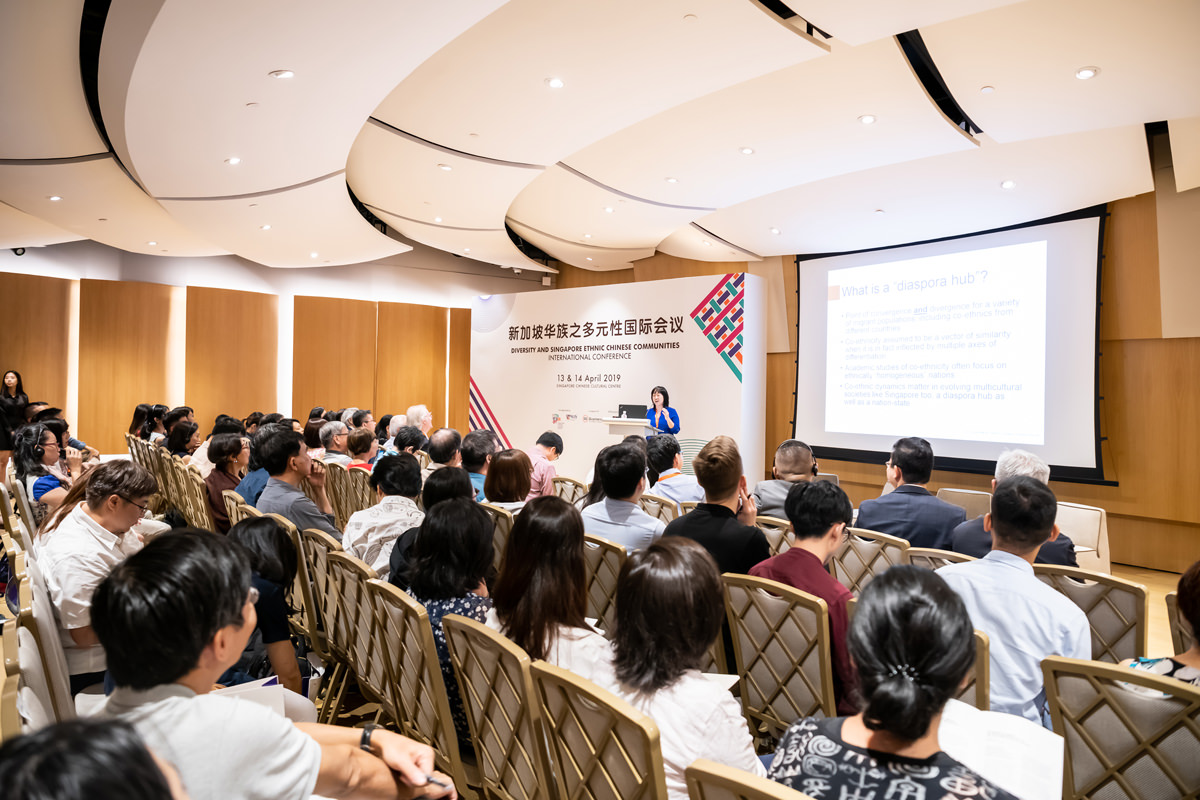
Dr Elaine Ho from National University of Singapore sharing on "Co-ethnic Relations in Singapore, Between Being a ‘Diaspora Hub’ and a nation-state". PHOTO: SINGAPORE CHINESE CULTURAL CENTRE
In the digital age, opinions on race and ethnicity in Singapore — far from being just the purview of policy papers and academic discourse — are increasingly being shaped online by Singaporeans, said Assistant Professor Liew Kai Khiun of the Wee Kim Wee School of Communication and Information, Nanyang Technological University.
A common portrayal of Singapore is that of an ethnic Chinese majority state with a multicultural setting, noted Associate Professor Chong Ja Ian of the Department of Political Science at the National University of Singapore.
However, with increasing plurality, it is important to understand that the idea of a Singapore Chinese culture is not a historically fixed or homogeneous idea, but an area that will continue to be contested, he added.
In particular, he saw public discussions on matters relating to perceived Chinese privilege as well as preventing the marginalisation of minorities as key to promoting plurality in the society.
“We need to think about the values of multiculturalism that underpin the Singapore state, and how to enact them in national policies and legislation. This will move Singapore ahead in a pluralistic and interconnected world where racial tensions are on the rise,” he said.
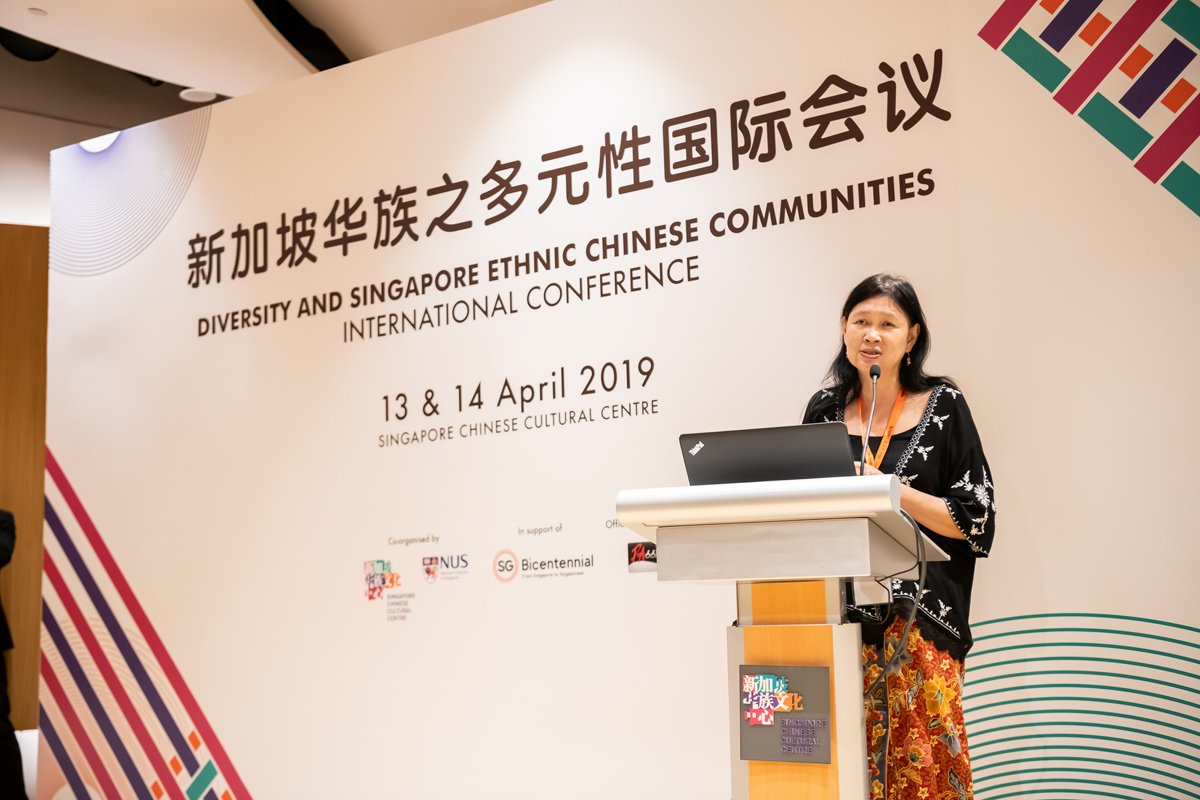
Keynote speech by Prof Brenda Yeoh from National University of Singapore on "Transnational Migrations and Plural Diversities in Postcolonial Times". PHOTO: SINGAPORE CHINESE CULTURAL CENTRE
Singaporeans First
Delivering her keynote speech on “Transnational Migrations and Plural Diversities in Postcolonial Times”, Professor (Provost’s Chair) Brenda Yeoh noted: “Singapore is the ‘demographic child’ of overlapping diasporas — processes of mixing, fusion and hybridisation adapted from multiple cultures of origin.
“Diversity is not just about diversity of people, but also diversity of hybridisation.”
The director of Humanities & Social Science Research, Office of the Deputy President, NUS, said that changes are afoot as the Singaporean identity becomes more prevalent in place of racial identity.
For one, the greater acceptance among the populace of hyphenated identities (a Singaporean is Singaporean first, and then Chinese, Malay, Indian, Eurasian or some other ethnicity at the same time), as evidenced in national surveys, signals a liberalisation of identity politics.
“This is a major step towards more flexible thinking about race, cultivating cosmopolitan sensibilities, and accommodating difference,” she added.
The conference concluded with a roundtable discussion with researchers of local Malay and Indian cultures, providing a platform for different ethnic groups to understand each other better.
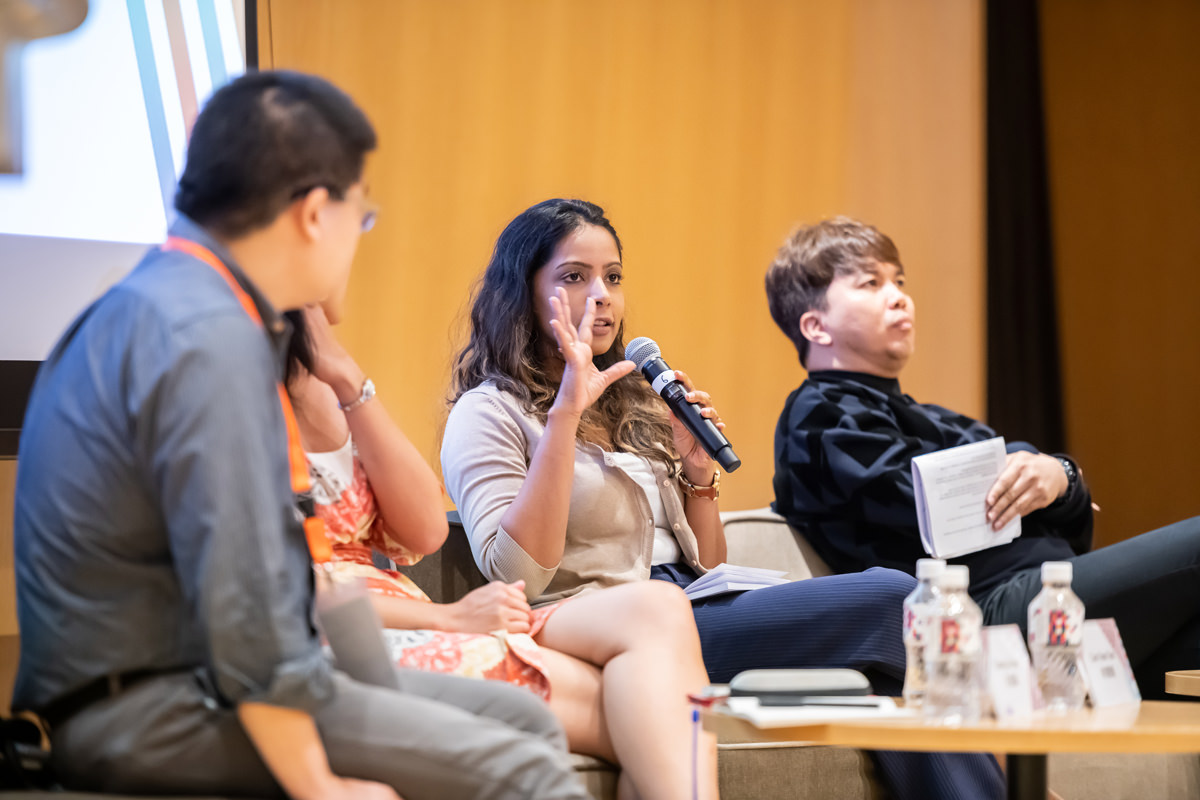
A roundtable discussion between Prof Lim Sun Sun from Singapore University of Technology and Design (second from left), Dr Laavanya Kathiravelu from Nanyang Technological University (centre) and Dr Azhar Ibrahim from National University of Singapore (right). PHOTO: SINGAPORE CHINESE CULTURAL CENTRE
“New Chinese migrants are far from homogeneous. There is the laoyimin (老移民) who migrated during the 1990s or early 2000s, whose own upbringing and outlook are shaped by conditions of China when they grow up in modest conditions. There is also the xinyimin (新移民) who mostly consist of rich entrepreneurs and investor migrants who may not interact much with locally-born Singaporeans in daily lives (such as in immigration and housing policy) and thus face challenges in integration.” --- Associate Professor Elaine Ho, Department of Geography, National University of Singapore
Hidden Women's Abodes
Source:The Sunday Times PUBLISHED APR 14 2019
Melody Zaccheus
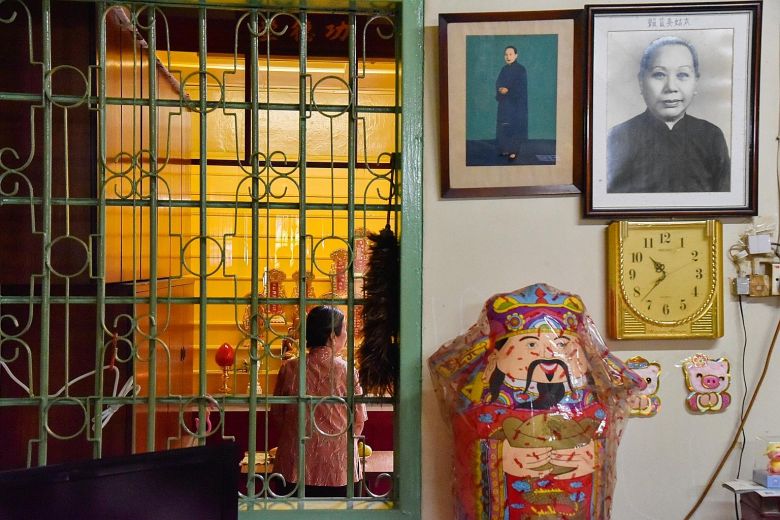
The prayer room at the back of the Guanyin Gong vegetarian hall in Cuff Road. The woman in the black and white portrait is the late Ms Wong Ying, the hall's founder. There are about 30 such halls in Singapore today and they have housed unmarried, widowed, destitute, abused and orphaned girls and women since the late 19th century. ST PHOTO: JASMINE CHOONG
Researcher studies little-known local history of vegetarian halls whose numbers are dwindling
It looks like a typical temple dedicated to Guanyin, but behind the altar of the goddess are living quarters for women.
The Little India shophouse unit at 19 Cuff Road has been home to a low-profile group of "vegetarian aunts" and their adopted daughters since it was established in 1954 by a Hakka woman.
It is not the only one. Operating away from the public eye are about 30 other so-called vegetarian halls in Singapore today. They have housed unmaried, widowed, destitute, abused and orphaned girls and women of a similar religious persuasion since the late 19 century.
In early Singapore, these female-led residences were critical in providing lodging and food to immigrant women living alone here, serving a niche neglected by most clans.
Some zhaigu, or vegetarian aunts or nuns, might have come from well-to-do backgrounds but were sent to vegetarian halls for reasons such as having incompatible Chinese horoscopes with members of their family. Then there are others who might have chosen to follow in the footsteps of Guanyin, who in one legend resisted marriage to pursue her religious beliefs. Among them were also the majie (Cantonese domestic servants) who retired there.
The women in these halls still practise a religion known as "The Great Way of Former Heaven". It incorporates religious practices from Confucianism, Taoism and Buddhism, and has its own esoteric practices.
The vegetarian nuns who live in the halls lead celibate lives and follow a vegetarian diet. The halls require that their occupants subscribe to the religion in order to live there. The halls were supported by their founders and donations of devotees.
Their religion requires them to keep a low profile, said Dr Show Ying Ruo from the National University of Singapore's (NUS) Asia Research Institute (ARI), who embarked on a five-year project in 2013 to study the vegetarian halls of Singapore, Malaysia and Indonesia. She presented her findings at an ARI workshop a month ago.
At one point, the Guanyin Gong shophouse in Cuff Road housed four vegetarian aunts and four adopted daughters. Now it is home to a vegetarian aunt and her two adopted sisters.
Dr Show's research project on vegetarian halls in South-east Asia is the first comprehensive effort of its kind since British anthropologist Marjorie Topley wrote about them in the 1950s and 1960s when she was based in Singapore.
Most of the vegetarian halls here are located in central Singapore. They were once thriving places - especially after the British introduced the Aliens Ordinance in 1933 which placed limits on the number of male immigrants allowed into Singapore, resulting in an influx of women.
A number of female boat traders, who were practitioners of "The Great Way of Former Heaven", arranged for fellow believers to come to Singapore, said Dr Show, 33.
She told The Sunday Times that the low profile maintained by the vegetarian halls could be traced back to the religion's roots in China. It was established during the Ming Dynasty (1368-1644) and expanded to parts of Asia in the late 19th and early 20th centuries.
Dr Show said: "It was a controversial and popular religion in China which was banned up till the early 20th century. It however thrived under the radar here because the colonial rulers did not get involved in religious matters."
The group's hidden goddess, the Eternal Mother, is typically enshrined in a secluded area, and only members of rank can worship her.
The vegetarian halls are all locally and regionally connected. The Waterloo Street Guanyin Temple, founded in 1884, functions as the hall's Singapore headquarters.
Dr Show approached almost 100 vegetarian halls in the region for her fieldwork, but not all interview requests were accepted. No other official research has been published here on this subject.
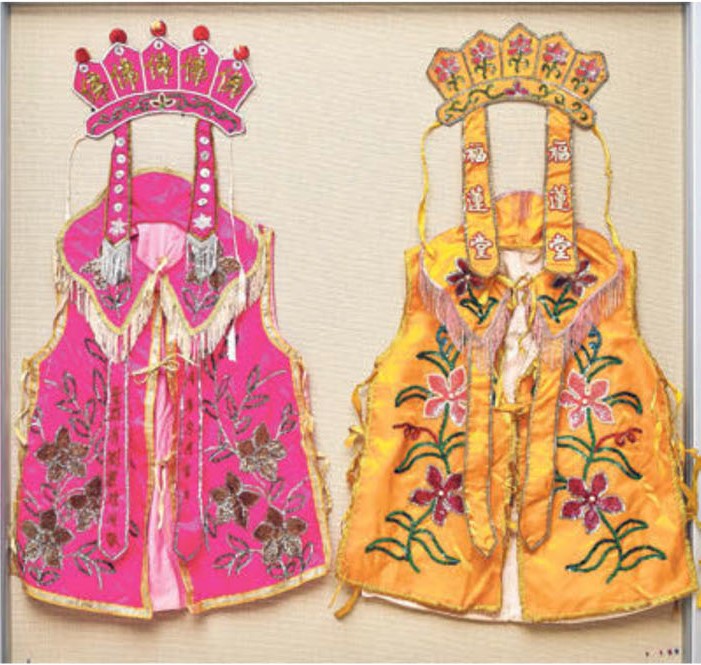
Ritual costumes donated by the defunct Vegetarian Hall of the Blessed Lotus to Dr Hue Guan Thye, who hopes to set up a museum in homage to vegetarian halls. ST PHOTO: KEVIN LIM
A Chapter is Closing
Lacking successors, a good number of vegetarian halls are now defunct and their owners have handed over their premises to Buddhist caretakers such as monks.
The Venerable Kwang Phing of the Singapore Buddhist Federation said that the declining birth rate in Singapore is one of the reasons the vegetarian halls receive fewer women for adoption, leading to their eventual closure. He said: "In some instances, the halls invite priests from their regional counterparts to perform rites, or they come to us for assistance. Our monks help in their religious affairs to ensure their remaining devotees can continue to visit the place."
Dr Show added that these halls are no longer the first option for women interested in nunhood, as the religion is more complex than Buddhism. Only a few high-ranking vegetarian nuns remain in Singapore and they are getting old.
Dr Show is chronicling the halls' transition into mainstream Buddhist sites. She noted that their syncretic teachings will be disposed and replaced by standardised Buddhism. After transitioning, the front-hall Guanyin is usually replaced by Buddha or other Mahayana Buddhist iconography.
Vegetarian nuns play different roles in the hall's religious system, much of which caters to devotees. Some read fortunes and handle prayer requests. Other conduct funeral rites or sew the robes of deities.
Anthropologist Vivienne Wee, 67, whose ancestor Wong Ying sponsored the establishment of the Cuff Road hall, said these places and the people who lived in them, played significant social roles. She added: "It is a form of indigenous feminism - where family unites were created through a system of religious adoption - that is especially endangered, and a cultural tradition that could soon be lost."
Together with a few other researchers, such as Dr Wee and Dr Hue Guan Thye from NUS' Chinese Studies Department, Dr Show hopes to one day establish a museum in homage to vegetarian halls.
Dr Show said: "Vegetarian halls will soon die out in a generation or so. It could become a forgotten story of our region where women helped other women and asserted unprecedented autonomous roles as religious leaders and temple managers."
Cuff Road shophouse home to vegetarian aunts since 1954
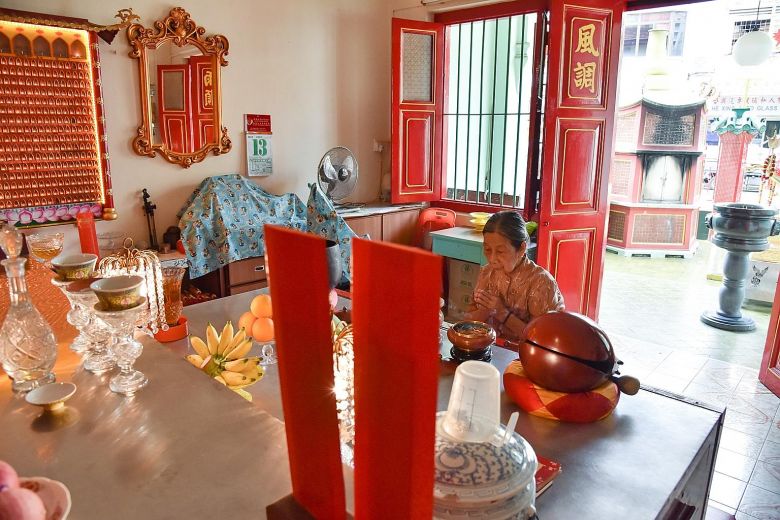
Vegetarian aunt Fengzhu Gu, 80, praying at a shrine near the entrance of Guanyin Gong Temple in Cuff Road. ST PHOTO: JASMINE CHOONG
Every eighth day of the lunar month, Fengzhu Gu (not her birth name), who wears her hair in a neat bun, prays from 6am till noon.
The 80-year-old flips through a book with neatly catalogued pink slips of prayer requests from devotees, and recites scriptural prayers on their behalf. Their prayer needs range from pleas for offspring, as well as blessings for safety and prosperity which families usually request at the start of each lunar year.
The vegetarian hall, located in a Cuff Road shophouse in Little India, specialises in divination.
Fengzhu Gu - "gu" means aunt - was named Fengzhu by her adoptive mother, the late Ms Wong Ying, the hall's founder.
The women practice a religion known as "The Great Way of Former Heaven". It incorporates religious practices inherited from Confucianism, Taoism and Buddhism, and has its own esoteric practices.
The Cuff Road hall's vegetarian nuns refer to themselves as vegetarian aunts. They have taken vows of celibacy. Their halls serve as female-only residences.
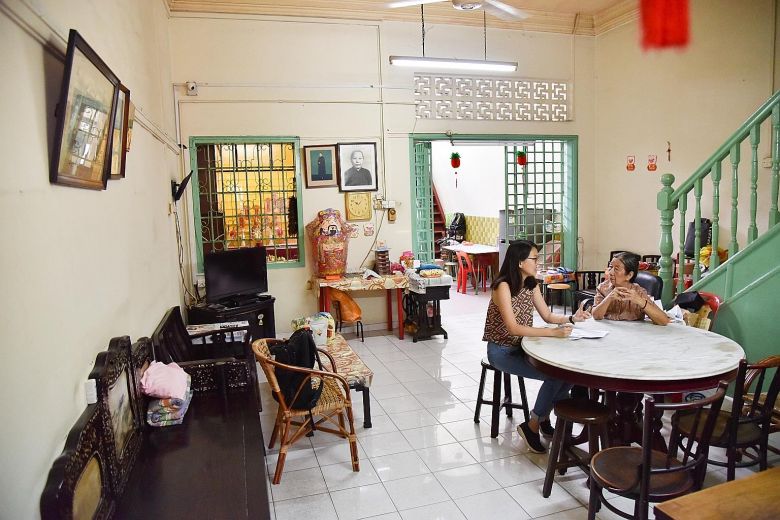
Dr Show Ying Ruo speaks with Fengzhu Gu, 80, at the living space in Guanyin Gong vegetarian hall at Cuff Road. ST PHOTO: JASMINE CHOONG
Born in Singapore in 1939, Fengzhu Gu was exposed to the religious life at the age of 10, when her father died. Her mother, who had to work, sent her to a vegetarian hall in Joo Chiat for a week to see if she could get used to life there. She adapted well and went on to become a vegetarian aunt. She moved with Ms Wong to the Cuff Road vegetarian hall when she was 15.
Today, she lives together with two other adopted sisters in a quaint shophouse filled furnishings from the 1950s, such as wooden cabinets that pop out against the mint green interior accents. Her current housemates include one who retired in her 60s and returned to the hall after a health setback while working in Hong Kong. The other is in her 30s and works in a hotel.
The hall, which opened in 1954, encouraged its adopted daughters to choose their own paths - be it becoming a vegetarian aunt, pursuing their studies, working, or getting married.
At one time, the hall had four vegetarian aunts and four adopted daughters. Speaking in Mandarin, Fengzhu Gu who declined to give her full name, said: "It was not unusual for poor couples, with many children to send one or two of their offspring to live in vegetarian halls."
In the past, the hall would also host visiting vegetarian nuns from the region.
On the hall's key festival days, residents used to wake up at about 2am to start preparing vegetarian fare, such as mock meat and popiah. The food techniques were passed down from the older vegetarian aunts, said Fengzhu Gu. Now, most of the food is purchased.
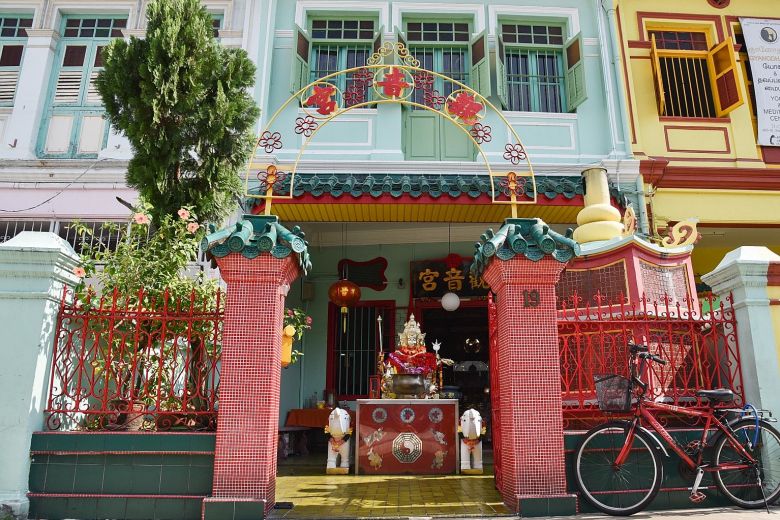
Guanyin Gong vegetarian hall in Cuff Road. Dr Show Ying Ruo, who studied these halls, says the shophouse that is home to the hall was bought for $30,000. ST PHOTO: JASMINE CHOONG
Dr Show Ying Ruo of National University of Singapore's Asia Research Institute said that the shophouse was purchased for $30,000, with $10,000 from Ms Wong's savings and $20,000 borrowed from an insurance company.
Fengzhu Gu said very few people know of the vegetarian hall as it is located on a short street. She added: "No one is really curious about what's happening behind our front hall altar. They simply think it's a temple and they just go on with their day."
从不同视角诠释历史民间纪念开埠200年
来源:联合早报 2019年2月18日 星期一 3:30 AM
文/张曦娜
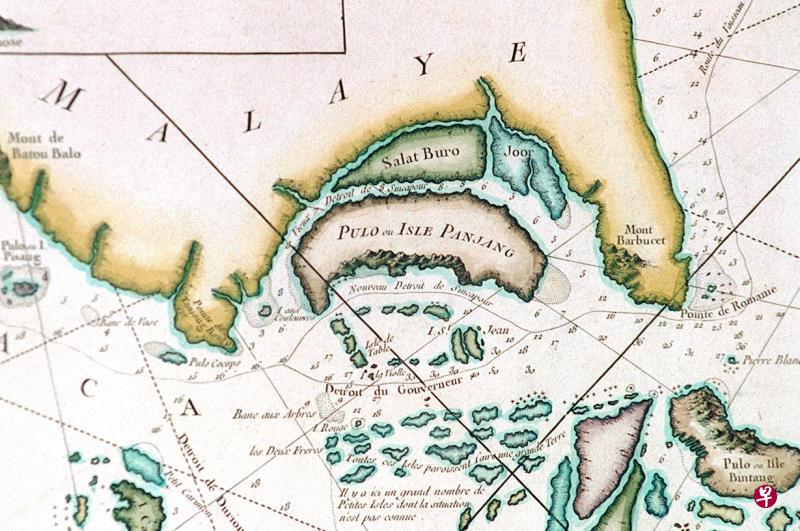
新加坡古地图。
新加坡纪念开埠200年活动开幕后,本地一些民间团体,不约而同邀请专家学者及文史研究者,从不同历史观与价值观诠释新加坡历史。
新加坡纪念开埠200年活动于1月28日在亚洲文明博物馆由李显龙总理掀开序幕后,一系列不同呈现方式的活动随着在全国各地展开。在某种意义上,开埠200周年纪念也让国人借此反思历史,本地一些民间团体,不约而同邀请专家学者及文史研究者,从不同历史观与价值观诠释新加坡历史。
许源泰:新加坡历史肯定超过700年
吾庐俱乐部与陈嘉庚基金会联合主办的“纪念新加坡开埠文化讲座系列”,主讲者之一的许源泰博士为新加坡国立大学中文系高级研究员,他在讲座“从淡马锡到新加坡”中, 根据近二三十年在新加坡发现的出土文物,再结合中西史料综合解读,试图为普罗大众厘清新加坡历史的长期误解。
许源泰说:“我们回头审视这块土地的悠久历史,其意义在于我们从中认识到,人类社会的发展进程其实非常复杂,时兴时衰各有轮替,盛有其因,衰有其兆,各种族群和文化因素皆在历史长河中交织而成。今天小至个人的民生问题和精神课题,大至国内外的海域纠纷和宗教矛盾,皆有着深刻的历史渊源。不回头了解历史,无法全面理解这些问题的原由。杜牧在《阿房宫赋》所说:‘灭六国者,六国也,非秦也。族秦者,秦也,非天下也……秦人不暇自哀,而后人哀之;后人哀之而不鉴之,亦使后人而复哀后人也’很有警惕性,值得我们深思。”
他说,最早在“淡马锡”这个海岛上开辟商埠的年代,不是200年前的莱佛士时代,也不是700年前的宋元年代,“肯定是在唐朝年代崛起的海上霸权室利佛逝王朝(苏门答腊巨港)管辖范围内的淡马锡港。”
许源泰说:“早在七个世纪前,当时被称为淡马锡的新加坡,已是个繁荣的国际贸易港口,由于17世纪开始衰弱,以致后来被误认为是渔村。”
他说, “新加坡拉”与“新加坡”是在淡马锡岛上两次自主独立的国家。第一次在本海岛上自主独立的“新加坡拉”(1299-1398),其生存策略或可为当今独立自主的“新加坡”(1965-)之永续发展提供参照。
许源泰说,从近年来的出土文物中发现,新加坡历史肯定超过700年。首先,2009年在政府大厦和旧高等法院展开的考古挖掘工程,发现古钱币等14世纪文物。另外,2015年在皇后坊维多利亚剧院和音乐厅前完成的考古挖掘工作,挖掘出的文物属于365至805年前的古物,其中包括唐代(618-907)及宋朝(960-1279)的钱币。
多年来在本地从事考古工作的美国考古学家及国大文学暨社会科学院东南亚研究系教授约翰·米克西奇(John Miksic)曾指出,本地曾挖掘出拥有千年历史的斧头,证实新加坡可追溯的历史早于1300年。
米克西奇也曾指出,在1300年至1600年期间,新加坡是一个拥有1万人口的贸易港口,当时的社会相当繁荣,人们使用中国钱币和纸币,有各种制造业,包括酿酒业、铸金业。这里也是区域的交汇点,船只进出频密,人口也多元,有马来人、华人、印度人、爪哇人等,和现在的新加坡差不多。
许源泰说,研究新加坡历史的西方学者对于中国历史文献十分重视,成书于宋理宗宝庆元年(1225),由泉州市舶司赵汝适著的《诸蕃志》记载:“三佛齐,间于真腊、阇婆之间,管州十有五。在泉之正南,冬月顺风月余方至凌牙门。经商三分之一始入其国(即三佛齐)。”意指从泉州前往三佛齐(也称室利佛逝)的商船先在新加坡(凌牙门)卖出三分一的货品,然后才到三佛齐卖掉其余剩余的货物,这说明早在1224年新加坡已经是一个繁荣港口。又如元代航海家汪大渊成书于1349年的《岛夷志略》记录了“龙牙门”,并提到“单马锡番”,还说岛上有“男女兼中国人居之”。
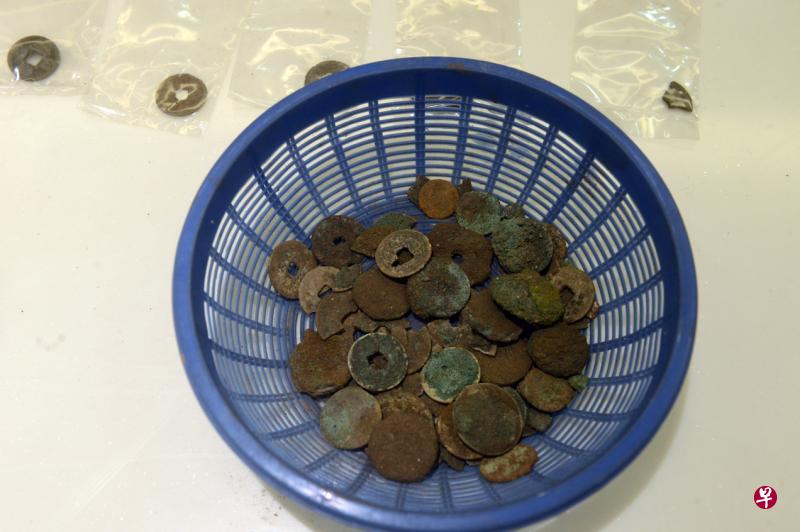
在皇后坊发现的唐宋钱币。(档案照)
当年的宗教活动
许源泰多年来也从事新加坡华族宗教研究,他说:“我过去所做的本地华族宗教的研究,不论是佛教传播,或是民间信仰传播,都须要回答一个基本问题,就是佛教在新加坡的起源始于何时?妈祖、大伯公等民间信仰,在新加坡始于何时。我须要关注,莱佛士登陆前后,是否已有华人在新加坡活动。结果答案都是在莱佛士登陆之前。”
他指出,其实本地文史工作者邱新民在发表于1981年的《顺天宫碑石的发现小语》已提出, 在1819年莱佛士登陆前,新加坡已是一个通商口岸,而不是小渔村,莱佛士登陆时新加坡人口也不只150人。
许源泰说:“做为学者,对我而言,近二三十年来的出土文物,确实帮助我在学术研究上有新的成果。尤其是出土文物中的宋元瓷器佛像,以及密教的玉髓、天珠等文物,显示新加坡当年的宗教活动和商贸来往,都与大乘佛教中心室利佛逝王朝和东爪哇的婆罗浮屠息息相关。在新加坡河边出土的这些文物,若与马来半岛、文莱和印度尼西亚的出土文物放在同一个平台上参照,更可以发现整体性的意义。”
薛依云:狮子图腾是共同身份标记
配合新加坡开埠200周年纪念,新加坡文艺协会于上月举办讲座“狮子图腾与文化传承”。主讲者薛依云赶在去年12月出版新书《狮子图腾与新加坡的前世今生》,书封底印着:“一本以‘狮子图腾’解释新加坡立国安身何去何从的书,何以把观光者口中熟知的故事,重新根植在新加坡人的心里?”
薛依云说,为了完成该书,他在梳理新加坡700多年的历史进程中,看到狮子图腾的一路相伴,从淡马锡(爪哇语意为“水镇”或海上城市)到新加坡拉(狮城),到海峡殖民地(三州府),再到自治与独立,最后发展成为环球化城市。
薛依云说:“作为一个多元种族的移民社会,新加坡尤其需要一个共同的身份标记,作为这个群体的象征与符号的观点,借以获得强大的精神力量并巩固社会凝聚力;通过当前继往开来历史交替时刻之契机,唤醒国民意识,开展对狮子图腾的重新认知,构建集体记忆,以文化自信来面对新时代的挑战,也因而有必要正视狮子图腾释放出来的强大精神力量与蕴含的社会凝聚力。”
薛依云提出,“新加坡拉”(狮子城)的神话故事,源自成书于1612年的《马来纪年》,狮子城名称的产生,就是多种宗教文化与政治势力博弈所衍生的产物,其中有对文化宗教的怀缅,更多的是君权神授立国发奋求强的自励。在书中作者也提到,新加坡周边就有五个国家和地方曾以狮子命名,虽然这里并没有狮子。
狮子标志跨越种族
关于狮子图腾,薛依云提出,1956年开始屹立在独立桥两侧作为守护吉祥兽的“默迪卡”雄狮,它也是意大利雕塑家卡瓦列·鲁多夫·诺里(Cavaliere Rudolfo Nolli)的作品,石雕雄狮造型俊伟,曾是新加坡地标。马来文默迪卡(Merdeka)是“独立”之意,因此“默迪卡雄狮”象征新加坡追求自由独立的奋斗精神。但1966年以后,由于交通及路段扩建的关系,默迪卡雄狮一度迁移到加冷公园,1987年落户在新加坡武装部队军事训练学院。
薛依云说,独立桥雄狮作为新加坡安身立国的狮子图腾标志,无疑是跨越种族,它的出现赋予狮子图腾新的生命力。
1972年迎来的鱼尾狮雕塑,是虚构的狮头鱼身的动物形象,其设计灵感是根据《马来纪年》的记载。这鱼尾狮的上半身就是当年Singapura的典故,下半身则自Temasek(海上城市)的背景,于1964年作为新加坡旅游促进局的标志。本地凋刻家林浪新在1972年根据时任教育部常任秘书关世强提供的喷泉鱼尾狮雕像蓝本制作完成。
至于李家舜设计的狮头标识图像(The Lion Head Symbol)在1986年出现,政府主要考虑到狮头图像比起国旗和国徽,可以广泛被个人、组织和公司在非正式场合使用,借以提升新加坡国民身份的归属感。
薛依云说,“狮头标识图像”虽然不是形体实物,但根据新加坡政府的官方解释,狮头标识图像象征着勇气、力量和卓越,以及面对挑战时的坚韧的价值观。
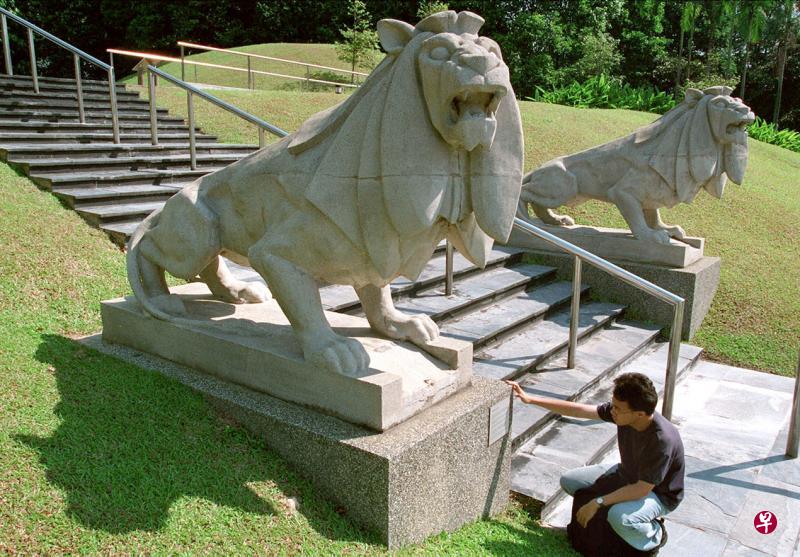
新加坡武装部队军事训练学院的两座石狮,原在独立桥上负责“看守”。(档案照)
李国梁:从人性化的角度回望历史
自1月开始,喜耀文化学会也与文史工作者李国梁合作,连续三个月举行三场与开埠200年有关的讲座。第一场“回顾与反思”,分享曾经繁华的古代新加坡拉,以及殖民地时代以后,新加坡借助于各方势力与实力,重新崛起为海港城市。第二场“日战中的无名英雄”,则是李国梁跟另一名主讲者李叶明一起发掘日战期间的民间记忆。
李国梁的第三场讲座“林德宪法与理想家园”,重温日战后新加坡人为摆脱殖民地统治经历过的一连串影响深远的历史事件。他也将于7月在唐城图书馆举行讲座“大坡:民俗风情迎客来”,通过比较轻松的方式来回顾民生。
李国梁说:“这系列讲座是纪念开埠200周年而不是庆祝,它为我提供机会,从较人性化的角度回望旧时光。历史是人的历史,官方历史记述的往往是人的活动、人的成败、人的功绩,但我要表达的另一层次,是人的精神、人的愿望、人的理想。每个人都希望在生命中创造价值,这才是人类社会发展的动力。要体会贯穿于史义中的人的价值,是一个人心与人性相接沟通的过程。新加坡近代史,从1000人发展至560万常住人口,就包容无数人物、无数生命的成就与价值。”
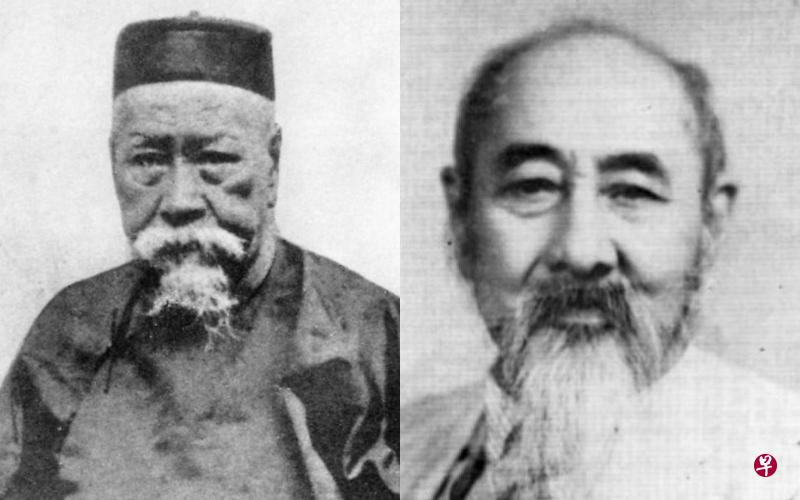
新加坡先驱人物佘有进(左)与林文庆。(档案照)
新加坡故事展现自信
李国梁举例,在第一场演讲“回顾与反思”中,他除了谈莱佛士,也谈那个年代一些标记性人物,例如有“甘蜜大王”之称的佘有进(1805-1883),他关注他同代的人,曾在著作中谈到华人劳工来到新加坡染上鸦片瘾,赚一点钱就把钱消耗在鸦片烟或赌博上,虽多年劳苦却毫无积蓄,所以无法回乡。又如林文庆,他虽然获得英国女王奖学金到英国爱丁堡大学完成学业,但是非分明,敢于向英国政府提出禁鸦片,这些人物都在他们的时代里发挥人的理想与精神。
在第二场演讲中,李国梁关注日战中挣扎求存的小市民,例如曾经担任过历史博物馆华语导览员的史立道,日本侵略时,14岁的史立道在中正中学念中二,当学校宣布停课时,史立道搭上班车回老家关丹。战事爆发后,大多数马来亚人民跟着英军逃到新加坡来,史立道背道而驰,反而回返战区,因为当年年纪轻轻的史立道已经知道,一家人互相依靠取暖是最好的选择。又如黄坤浩,出世时因为日军侵略,从小没有奶水喂养,家人想方设法以香蕉加上香蕉茎熬煮成奶液状的食物,黄坤浩就靠着“香蕉奶”慢慢长大,但由于营养不足,长大后的黄坤浩体格一直偏向瘦小。
李国梁说:“这50年来,我们从150周年纪念的‘庆祝’转变为‘纪念’,莱佛士从‘开创新加坡’转变为‘登陆新加坡’,意义的改变或许可归纳为三点。思想进程,从英国人的眼睛,过渡到通过本地人的眼睛看历史。落地生根,21世纪,民间有意识地通过自助创建的文物馆、展览、艺术、文献等来展现自身历史,建构跟先民的联系。展现自信,当越来越多人愿意以客观的心态,花时间精力去组构民间记忆,新加坡的故事便会展现自信。”
Database to remember Chinese pioneers
Source:The Straits Times PUBLISHED FEB 2, 2019, 5:00 AM SGT
Sue-Ann Tan

Senior Minister of State Sim Ann (centre) with Mr Robert Lim, a descendant of pioneer Lim Nee Soon, as well as Ms Katherine Hoo (far right), a descendant of pioneer Whampoa Hoo Ah Kay, at the launch of the database yesterday. Also present was NUS Department of Chinese Studies head Kenneth Dean. ST PHOTO: DESMOND FOO
It captures stories of 200 prominent people who contributed to Singapore's development.
Church sacristan Robert Lim grew up hearing stories about his grandfather, stories that can now be shared with millions of other Singaporeans, thanks to modern technology.
These pioneering tales from Singapore's past have been collected in a new database to coincide with the nation's bicentenary.
That means Mr Lim, 71, will know that new generations will be able to appreciate the work people like his grandfather, Mr Lim Nee Soon, did for Singapore's development.
Mr Lim Nee Soon, who lived from 1879 to 1936, played a key role in developing rubber plantations in Nee Soon, now known as Yishun, and was a businessman and philanthropist.
He is one of the 200 prominent Chinese men and women whose stories are captured in the interactive website known as the Singapore Biographical Database of Chinese Personalities.
The database was compiled by the National Library Board, the Singapore Federation of Chinese Clan Associations and the National University of Singapore's (NUS) Department of Chinese Studies.
Our forefather was here at the time of Raffles but so much about him has been forgotten. It is urgent that we bring these things up now. The database is a baby step towards remembering. --- NEUROLOGIST RAYMOND SEET, 43, a descendant - about seven generations on - of Mr See Hoot Kee, a Hokkien pioneer who lived from 1793 to 1847 and helped build some of the first Chinese temples in Singapore.
It was launched yesterday at the National Library and traces people who contributed to Singapore from the 19th century to the 21st century, including renowned figures like businessmen Eu Tong Sen and Chew Joo Chiat and war hero Lim Bo Seng.
Ms Gladys Low, senior manager of content and services for SingSEA and Exhibitions at the library, said: "Through this, we hope to inspire Singaporeans... It's about remembering where we came from."
The website features an interactive quiz with information on Chinese pioneers. The public and researchers can also share their knowledge of less well-known pioneers by filling in information gaps.
Take Mr See Hoot Kee, a Hokkien pioneer who lived from 1793 to 1847 and helped build some of the first Chinese temples in Singapore.
His descendant from about seven generations later, neurologist Raymond Seet, 43, said: "The story we often hear is about what the British did, but Singapore is also about the undercurrent of people here who made things possible and passed down this culture.
"Our forefather was here at the time of Raffles but so much about him has been forgotten. It is urgent that we bring these things up now. The database is a baby step towards remembering."
Ms Sim Ann, Senior Minister of State for Communications and Information, and Culture, Community and Youth, told the launch: "2019 marks an opportunity to look deeply at our history and reflect on how Singapore has evolved.I hope the database will inspire more Singaporeans to connect with, learn about and deepen their appreciation of the contributions of prominent Chinese personalities to Singapore."
梳理本地华人先贤关系网络“新加坡人物传记数据库”上线供浏览
来源:联合早报 2019年2月2日 星期六 03:30 AM
文/卞和
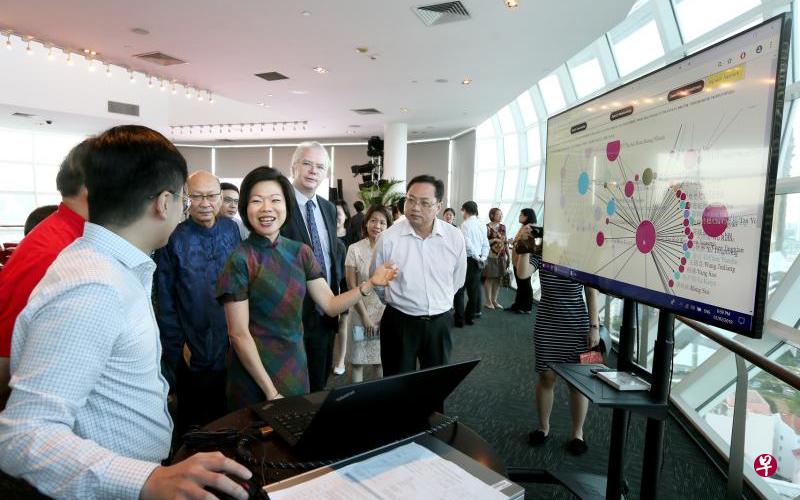
通讯及新闻部兼文化、社区及青年部高级政务部长沈颖(左三)在国大中文系研究员的指引下,首试上线后的“新加坡人物传记数据库”。在旁为国大中文系主任丁荷生(左四)及宗乡总会学术委员会主任柯木林(左二)。(龙国雄摄)
数据库目前记录在案的华人先贤包括薛佛记、陈笃生、胡亚基、林义顺、陈金声等共200位,并梳理出了他们彼此共享的26种社会关系,以及他们各自的地缘背景。
越来越多民间团体及热心人士关注本地华文教育与研究,慷慨解囊,为本地大学中文系学生设奖学金。捐赠者背景也趋向多元化,包括与中文系没有渊源,或并非出自中文系本科的商界人士。
随着开埠200年以来的华人先贤,在数据库里被谱成一个个相互重叠、联系的支点,维系着几代人的血缘、姻亲、雇佣等错综复杂的社会关系终于清晰可辨。
我国历史上重要的200位华族人物,以及由他们向外扩展而来的800项社会关系,如今都被记录在“新加坡人物传记数据库”,并在星期五(2月1日)正式宣布上线,供公众浏览及补充。
数据库由国家图书馆管理局、新加坡宗乡会馆联合总会以及新加坡国立大学中文系携手共创,旨在为国人视觉化地梳理一代代新加坡华人先贤之间的关系网络,并提供一个缜密的寻根渠道。
通讯及新闻部兼文化、社区及青年部高级政务部长沈颖受邀为数据库推介仪式的主宾,她在致辞时强调,数据库的建立将有助于公众接触我国的文化遗产,让国人与华人先贤之间建立联系。
数据库目前记录在案的华人先贤包括薛佛记、陈笃生、胡亚基、林义顺、陈金声等200位重要华社人物,并梳理出了他们彼此共享的26种社会关系,以及他们各自的地缘背景。
推介仪式上,胡亚基的曾孙女胡妙安(84岁)、林义顺的孙子林英仁(71岁)以及薛佛记的第六、第七和第八代子孙都亲临现场。
胡妙安在接受《联合早报》访问时说,国人须为自己的宗族寻根,守护这个重要的历史遗产。
她透露,家中还保留着刻有胡亚基名字的金银餐具,历时百年之久,而她十分愿意捐给国家。
数据库目前仍属于初始阶段。研究团队首要处理的是柯木林《新华历史人物列传》,丁荷生、许源泰《新加坡华文铭刻汇编1819-1911》,宋旺相《新加坡华人百年史》以及林博爱《南洋名人集传》中所记载的人物史料,而尚未完成谱写的人物预计还有5000余人。
国大中文系主任丁荷生指出,通过梳理华社人物的关系,将会找到许多“中间人”,而他们在各个社群之间扮演着沟通、调解、磋商等重要角色,帮助我们理解当时新加坡社会的运作。
他透露,数据库未来的计划是把人物信息和地理信息结合起来,透过关系网络划出当时人们的活动范围,重绘新加坡历史上的生活面貌。
鼓励国人上网补充数据库
宗乡总会学术委员会主任柯木林指出,以数据库来研究本地华人的历史是“产官学”三合一的协作。每添加一个人物的数据,都能以点到面,帮助整理本地错综复杂的社会关系。
随着数据库上线,公众可以在家中上网浏览 http://sbdb.nus.edu.sg/,补充更多的人物资料。系统将会为资料中的关键信息进行标记,并与其他人物进行比对,生成关系网。
配合开埠200周年 宗乡总会“无名英雄”活动向先辈致敬
来源:联合早报 2018年11月6日 星期二 3:30 AM
文/苏文琪
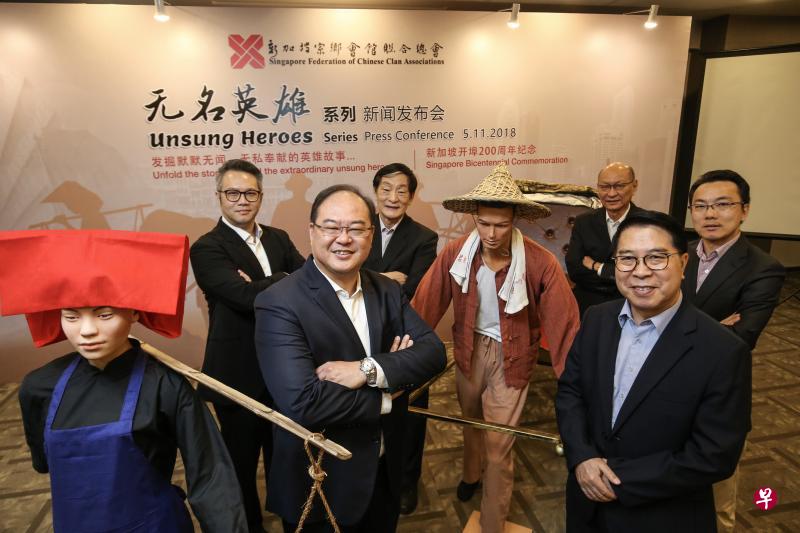
新加坡宗乡会馆联合总会会长陈奕福(前排左起)、秘书长方百成、青年委员会主任李伟聪(后排左起)、文化委员会主任尹崇明、学术委员会主任柯木林,以及社会事务委员会主任周兆呈博士在“无名英雄”系列的记者会上介绍活动详情。(叶振忠摄)
活动由八个项目组成,共分为历史、人文和特别项目三种类别。宗乡总会会长陈奕福指出,我国“从无到有”的社会发展,默默无闻的劳力工作者功劳不小,宗乡总会因此希望通过不同方式激发年轻人的兴趣,启发他们思考并挺身为社会服务。
新加坡初开埠时,许多先辈为了更美好的未来,赤手空拳下南洋打拼。当中好些未能在史册上留下姓名,他们为我国做出的贡献却是不可忽视的。
为了向这些无私奉献的先辈致敬,同时鼓励年轻国人学习先辈的精神,新加坡宗乡会馆联合总会从本月起推出为期一年的“无名英雄”系列活动。
配合明年新加坡开埠200周年,活动由八个项目组成,共分为历史、人文和特别项目三种类别,其中“落地生根,开拓新家园”展览将为活动拉开序幕。这个展览将于本月18日由教育部长王乙康开幕。
通过展览和互动形式激发年轻人对历史兴趣
展览融入不少互动元素,透过视觉、听觉、触觉和嗅觉多重感官,带领公众追溯先辈漂洋过海下南洋,然后落地生根的经历,例如重现乘船颠簸的感觉。主办方也培训106名学生导览员,在明年1月至4月期间为中一中二生解说。
本次展览获得李光耀双语基金、新加坡华族文化中心、推广华文学习委员会和新加坡开埠200年工作组的鼎力支持。展览在新加坡华族文化中心1楼和美广场举行至明年4月28日,入场免费。展览期间也会举行讲座。
宗乡总会秘书长方百成昨天在记者会上说,对于学生和年轻人而言,这些历史过于遥远不太容易理解,单从文字来看也只能了解一二。
“通过更生动的展览和互动形式,能让年轻人感受和认知我们的过去,不忘我们先辈的辛劳,继续为我们所居住的这块土地努力奋斗。”
宗乡总会会长陈奕福补充,我国“从无到有”的社会发展,默默无闻的劳力工作者功劳不小,宗乡总会因此希望通过不同方式激发年轻人的兴趣,启发他们思考并挺身为社会服务。
例如,“新加坡建造者”文化之旅便带参与者走访本地19到20世纪的标志性建筑与文化地标,了解建筑背后的建造者故事,而不是从重要人物的视角看历史。活动分两期进行,先后介绍印度苦力和红头巾。
推出华人先贤数据库征集“无名英雄”小品剧本
本地各会馆的青年代表也将参与公益活动,如捡拾慢跑及与陈笃生医院合作的文化义走。捡拾慢跑的参与者将一边跑步一边捡垃圾,提倡环保绿化。
此外,宗乡总会也同新加坡国立大学中文系和国家图书馆管理局携手推出新加坡华人先贤数据库,系统性地梳理华人先贤的关系网络;宗乡总会也将出版《新加坡华人通史》的英文版。
至于创作方面,宗乡总会《源》杂志首度与新加坡艺术剧场合作,征集以“无名英雄”为主题的华文小品剧本。
入选的三个优秀作品将由新加坡艺术剧场的专业人员排演成小品角逐2019年“优秀文学作品奖”,第一名得主将赢得2000元奖金。
这项比赛除了推动本土文学艺术的创作,也通过生动的舞台艺术,反映和歌颂我国开埠以来的各界奉献者。征稿活动现已开始,公众可将作品电邮至ruirong@sfcca.sg,截止日期是下月31日。
宗乡总会也将与会馆和学校携手呈现《乡情乡韵》舞台剧,呈现本地的多元文化与艺术风情。
21年前迁庙时遗失被文史学者发现 水廊头大伯公庙百年木匾失而复得
来源:联合早报 2018年10月29日 星期一 3:30 AM
文/谢燕燕
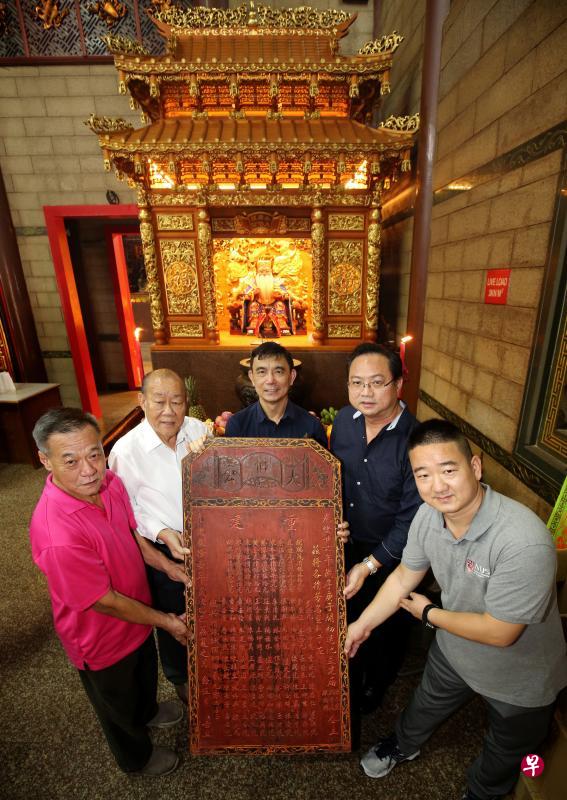
水廊头大伯公福德神庙找回113年前重修时所立的木匾。左起是水廊头大伯公庙总务林翼鹏、主席郑亚味、文史研究员吴庆辉、国大中文系高级研究员许源泰和中文系硕士生杨治中。(龙国雄摄)
水廊头大伯公福德神庙的这块百年木匾1997年迁庙时寄放在莫罕默苏丹路一间三层楼旧店屋内,店屋后来被卖掉,木匾则辗转落到本地文史研究员吴庆辉手上,后来在国大中文系研究员帮忙下,才促成归还木匾一事。
一块立于1905年的百年木匾在流失21年后,与立匾的庙宇“重聚”,结束在外“颠沛流离”的岁月。
重新找回珍贵文物的是目前设在裕廊西4道斗天宫内的水廊头大伯公福德神庙,把木匾送回庙宇的则是本地文史研究员吴庆辉和新加坡国立大学中文系高级研究员许源泰博士。
“水廊头”是莫罕默苏丹路的俗称,这座规模不大的大伯公庙,过去就坐落在南安会馆现址旁边,具体位置是莫罕默苏丹路与东发路交界处的角头。
水廊头大伯公庙“失而复得”的木匾上记载着陈冬发、刘崇正和振潮兴号在光绪26年(1900年)送地并建庙。但庙宇现任理事会去年刚刚庆祝创庙139周年,按这一算法,庙宇理应创立于1878年。看来这座大伯公庙的“身世”还有待进一步考证。
木匾记载重修庙宇时捐赠者姓名和善款
寻获的木匾是大伯公庙1905年重修时立的,上面记录了59名捐赠者(个人与商号)的名字。陈冬发、刘崇正和振潮兴号除了“送地”,也在重修时各捐20元。木匾还记录了章芳林三名儿子章壬铨、章壬和与章壬荣,当时各捐20元。不过出最多钱重修庙宇的是胡瑞茂、李佐元、余怀良和陈冬生,各捐70元5角。
在水廊头大伯公福德神庙服务超过半个世纪的理事会主席郑亚味(80岁)说,庙宇在1997年因政府征用东发路地段被迫搬迁,他们一时找不到新地点安置神明,便把大伯公寄在粤海清庙。剩余物品,包括匾牌等,则暂寄莫罕默苏丹路一间三层楼旧店屋内。店屋后来被卖掉,寄放在那里的文物也就不知所终。
虽然木匾上说陈冬发等人“送地”建庙,但是郑亚味说,他们在1997年被迫搬迁时却是一分钱赔偿费也没拿到,有关当局查了各种档案文件后认定水廊头大伯公庙属于“违建”性质。
距离当年立木匾已有113年,郑亚味不认得列在木匾上的任何名字。他只知道大伯公庙早期的信众来自附近一些甘榜,包括莫罕默苏丹路、金炎路、东发路、宝角路、里峇峇利路和登路。
与斗天宫组成联合庙
大伯公寄放在粤海清庙时,理事们每年一到大伯公旦,还是会回到水廊头办宴席和演酬神戏。1998年庆祝大伯公诞时,斗天宫的理事找上了他们,探讨能否一起组成联合庙。两组人事前完全不相识,是经人介绍后才坐下来谈合作事宜。
郑亚味说,他们坦白告诉对方,水廊头大伯公庙没有钱,也没能力筹募买地建庙的经费,没想到对方愿意在单独承担所有费用的情况下让大伯公晋驻斗天宫。
水廊头大伯公庙的理事后来还是筹了10多万元尽一分绵力,但是斗天宫的理事却把钱捐回给他们作为活动经费。
2000年2月25日,水廊头大伯公福德神庙搬进耗资大约整千万元兴建的新庙,自此在裕廊西安顿了下来。
回头说那块百年老牌匾,它在店屋被卖时不知所终。牛车水原貌馆于2000年至2002年间征集文物时,有人把木匾送到原貌馆,但因没被选用,而由当时担任新加坡历史博物馆研究员的吴庆辉暂时保管。
大家最初都不清楚木匾源自何庙,木匾上只写“大伯公重修”。吴庆辉翻查了陈荆和、陈育崧合编的《新加坡华文碑铭集录》(1973年)后,才知道它原来属于水廊头大伯公福德神庙,却又不清楚庙宇是否还在或搬到何处。
国大中文系学者丁荷生教授和高级研究员许源泰博士联手编撰《新加坡华文铭刻汇编1819-1911》时,有一天找上了吴庆辉并看到他代为保管的这块木匾。许源泰的一名中文系硕士生杨治中刚巧在研究斗天宫的历史,知道水廊头大伯公福德神庙就设在斗天宫内,于是帮忙联络庙宇理事,最终促成归还木匾一事。
华族文化中心与国大中文系将合作联办系列文化活动
来源:联合早报 2018年4月26日 星期四
文/李熙爱
新加坡华族文化中心与新加坡国立大学中文系,本周一(23日)首次签署合作备忘录,接下来两年将推出一系列活动推广新加坡华族文化。
这是新加坡华族文化中心首次与另一个机构合作发展、支助、推广及丰富新加坡华族文化的研究,探讨的范围有语文、文学、哲学和中英翻译。
合作备忘录为期两年,其间双方将展开三个巳达成共识的项目--刊登并展示国大学生的作品、每年构思并举办两个公开讲座,以及在2019年举行国际学术研讨会,讨论本地华族艺术与文化等相关课题。所有活动将在新加坡华族文化中心举行。
若双方同意,这项备忘录能再延长更新。
新加坡华族文化中心总裁刘思伟指出,这两个机构都有保留和传承独特本地华族文化给下一代的共同目标。“我们期待与国大中文系合作,联手开办公众能有所共鸣和容易接触的活动,吸引公众对我国华族文化产生兴趣,并加入我们一起提倡文化。”
新加坡国立大学中文系代主任许齐雄副教授说,国大中文系60多年来培育了多代的教师、新闻工作者和在各领域为新加坡贡献的双语人才。
“同时,我们并没忘记我们在本地推广中华文化的社会责任,与新加坡华族文化中心的合作将能为这个具有意义的任务创造平台。”
在备忘录下举办的第一个活动,将会在本周六下午3时至5时举行。著名的语音学家孔江平教授将从科学视角分享中华传统有声文化。
去年5月由李显龙总理正式开幕的新加坡华族文化中心,旨在保留和发扬新加坡独特的本土华族文化,以及促进各族群间的相互了解。国大中文系则是本地历史最悠久的中文系部门。
合作研究福建漳州文史 新中两地教授通过小碑铭窥探大社会
来源:联合早报 2018年2月1日 星期四
文/谢燕燕
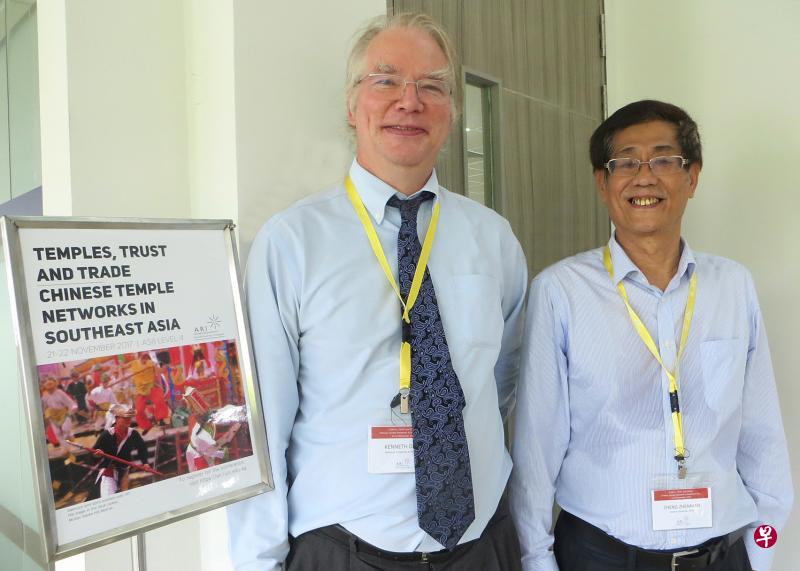
国大中文系主任丁荷生教授(左)和厦门大学特聘教授郑振满教授(右)相识合作30年,他们这段不寻常的跨国界友谊,结出了丰硕的学术果实。(谢燕燕摄)
两人这段不寻常的跨国界合作,结出了丰硕的学术果实,更衍生了国大与厦门大学之间的合作。
过去30年,国大中文系主任丁荷生教授和厦门大学特聘教授、民间历史文献研究中心主任郑振满教授经常结伴到福建各地的寺庙和其他宗教场所搜集宗教史料,曾逐村逐庙地查访现存碑铭,通过这些田野调查研究福建社会文化史。。
他们这段不寻常的跨国界合作,结出了丰硕的学术果实,更衍生了国大与厦大之间的合作。即将在今年问世的《福建宗教碑铭彙编-漳州府分册》,便是两人的合作项目之一。这部宗教碑铭彙编将分成四册,收录漳州地区超过2000份碑铭,这也是他们合作过的碑铭彙编中最庞大的一部。
两人最早在1995年合力出版《福建宗教碑铭彙编-兴华府分册》,这部碑铭彙编只有一册,收录了兴化地区442份宗教碑文,当中包括宋徽宗的“神霄玉清万寿宫碑”。福建所收藏的摹刻本原来立在莆田的元妙观,目前收藏在莆田博物馆碑廊。
2003年时,他们再合力出版分成上中下三册的《福建宗教碑铭彙编-泉州府分册》,里头收录了福建泉州地区的1363份碑文。两套《福建宗教碑铭彙编》都是由福建人民出版社出版。
每个地方都有自己的神谱和传说
到了2010年,两人再联名出版以英文为主的 “Ritual Alliances of Putien Plain” (《莆田平原的仪式联盟》)。这套东方学手册 (Handbook of Oriental Studies) 是由西方出版社Brill出版。
趁郑振满教授(62岁)去年底到我国出席国大亚洲研究所(Asia Research Institute)主办的“庙宇、信任与贸易—华人庙宇在东南亚的网络”研讨会之际,本报访问了这两位长期合作的学者。
丁荷生说,他是在1984年第一次到莆田参观湄洲岛,当时恰逢中国改革开放的新历史机遇,让他目睹了民间信仰在文革被铲除后死灰复燃的情景,此后便兴致勃勃地研究起福建地区的庙宇。在结识厦大的郑振满教授后,两人自1987年便不断携手合作,如今已是相识30年的老朋友。
丁荷生专注研究的地区是莆田平原,郑振满恰巧是莆田人。为了出版《莆田平原的仪式联盟》,两人曾遍访那里的724个村庄,仔细观察和记录这些村子的宗教活动。福建古代为闽越之地,民间“信鬼尚祀”,他们走访的700多个村子竟然有2500多座神庙,供奉的神明更多达1200种,每个地方都有自己的神谱和传说。
郑振满记得过去数十年寻访碑铭时,曾借助各种交通工具,从公交车、吉普车、小轿车、拖拉机、摩托车到自行车等。
“有时还不得不徒步穿越山间小道,途中还遇到各种事故,例如有一次爬过一堵砖墙,搜寻被锁在破庙内的碑刻,可是在找到碑刻的那一刻,那堵墙却开始摇摇晃晃,我们赶紧闪避逃命。”
他们也曾伤心地发现有些碑铭在文革时被打碎,又或者在寺庙复兴时被废弃,也有残存的石碑被当成建材,用来铺路,甚至成为水渠旁的洗衣板,碑文被磨损得无法识读。不过和所有从事田野工作的学者一样,每当发现新碑刻或新材料,他们便会无比兴奋。
两位学者也指出,福建泉州地区长久以来一直有海外贸易活动,因此除了北方汉人所引进的释儒道,还有来自海外的摩尼教、伊斯兰教、基督教和天主教等,现存资料丰富,是研究宗教的理想窗口。
本地福建人和他们所兴建的庙宇,很多源自泉州和漳州地区,《福建宗教碑铭彙编》对研究本地和东南亚华人的移民播迁史,因此也很有帮助。
汉学家闵福德教授 关上大门“重游大观园”
来源:联合早报 2017年11月19日 星期日 3:30 AM
文/张曦娜
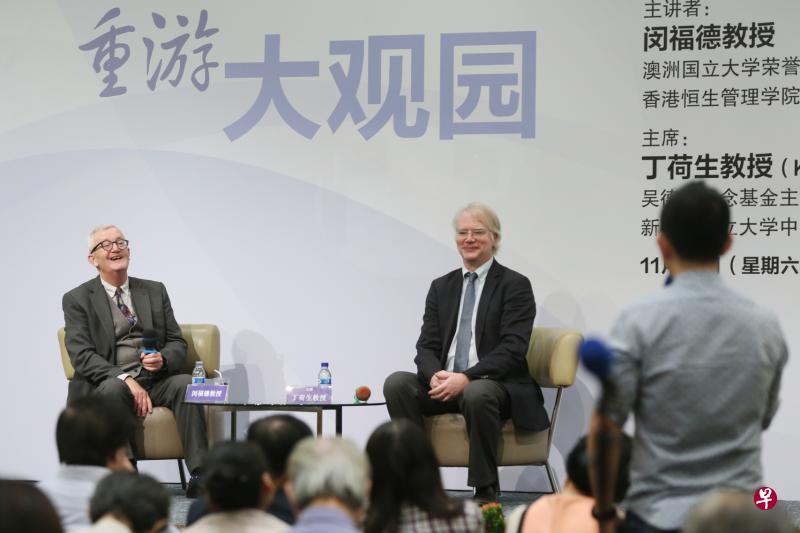
闵福德教授(左)演讲过后回应读者的提问,新加坡国立大学中文系主任丁荷生教授为讲座主席。(林国明摄)
在文学作品中,不论东方或西方都有一座“花园”。
英国著名汉学家、翻译家闵福德教授(John Minford)昨天下午在报业中心礼堂举行的“吴德耀文化讲座2017:重游大观园”,引述名家名言,从《红楼梦》的大观园谈到英国儿童文学《自私的巨人》里的巨人的花园。
闵福德教授说,他想以一个不同的方式重游大观园,从一个较遥远的位置,关上大门并站在后面谈《红楼梦》,就像《红楼梦》第17回贾政对贾珍说道:“你且把园门关上,我们先瞧外面,再进去。”
在闵福德教授看来,《红楼梦》是一部有关“觉醒”的巨著,梦想和幻想是《红楼梦》耽溺的主题,大观园则是觉醒的所在点。小说同时为读者提供了启发和趣味性。小说里补天时遗下的顽石则是小说主人公贾宝玉的精神本质或根源。
当贾宝玉最后离家,他实际上不是离开家,而是离开花园(大观园):我所游兮鸿蒙太空,渺渺茫茫兮,归彼大荒。
闵福德教授也指出,曾经五次读《红楼梦》的毛泽东,将小说政治化,他引述毛泽东于80年前在延安鲁迅艺术学院演讲所说:“现在你们的‘大观园’是全中国,你们这些青年艺术工作者个个都是大观园中的贾宝玉或林黛玉,要切实地在这个大观园中生活一番,考察一番。”
从《红楼梦》,闵福德提到19世纪英国作家王尔德(Oscar Wilde)的儿童文学《自私的巨人》(The Selfish Giant),小说讲述了“巨人”从自私变得慷慨,开始时不愿让小孩去他的花园游玩,还筑起了围墙,但巨人没想到,春天再也不到他的花园来,到了后来,孩子们把春天重新带回巨人的花园。巨人明白后,拆了围墙,在花园中和孩子们一起玩耍。
闵福德教授认为,王尔德以《自私的巨人》的结尾和开篇作为救赎的诗意工具,为了他自己对爱的深信不疑,真正的心胸开阔以及无私的分享,是真理的基础,美丽和幸福的泉源。一旦花园被打开,春天就会回来,孩子们及“所有最美丽的花朵”能在树丛里愉快地玩耍。
闵福德指出,王尔德由于读了赫伯特·伽尔斯(Herbert Giles)翻译的全本《庄子》(Chuang Tzu: Mystic, Moralist and Social Reformer),他对于中国人的思维方式并不陌生。
闵福德教授也引述鲁迅所说:“我总觉得周围有长城围绕。这长城的构成材料,是旧有的古砖和补添的新砖。两种东西联为一气造成了城壁,将人们包围。何时才不给长城添新砖呢?这伟大而可诅咒的长城!”
他认为,“花园”的开放则是拆除鲁迅所提到的城墙,他也引述了英国诗人威廉·布莱克充满象征意义的诗作《爱之花园》(The Garden of Love)。
演讲结束前,闵福德在回应读者提问时说,《红楼梦》的结局是很不错的,他不认为有改动的必要。谈到翻译《红楼梦》最困难的部分,他坦言是必须创造出一种能适合《红楼梦》,又能够长久而不过时的小说风格。
闵福德教授早在1980年代即与国际汉学家大卫·霍克思(David Hawkes)携手翻译《红楼梦》(The Story of the Stone)是至今最权威的《红楼梦》译本之一。除了《红楼梦》,他还翻译《聊斋志异》《孙子兵法》及金庸名著《鹿鼎记》等经典作品。
在讲座开场时,闵福德也提到他在翻译路上,先后受惠自国际重要汉学家大卫·霍克思(David Hawkes)、柳存仁和宋淇。
“吴德耀文化讲座2017:重游大观园”讲座由联合早报及新加坡国立大学中文系联办。讲座主席为吴德耀纪念基金主席及新加坡国立大学中文系主任丁荷生教授(Kenneth Dean)。
庆祝成立75周年蓝十总会出版潮人善堂历史书
来源:联合早报 2017年11月13日 星期一
文/谢燕燕
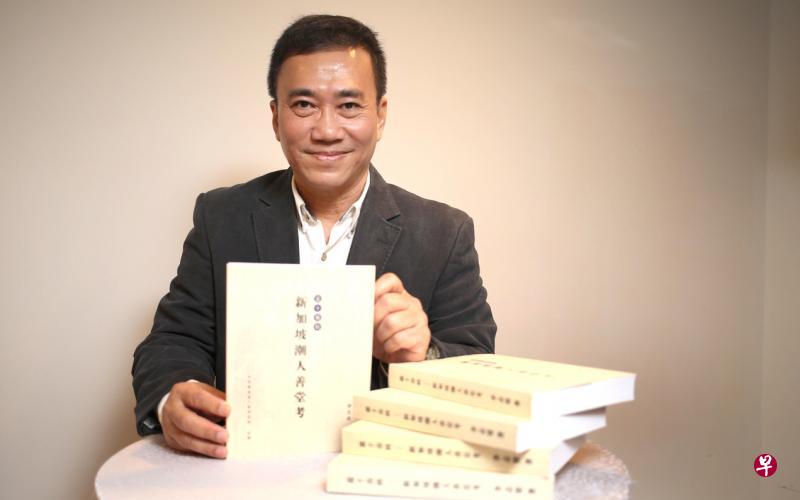
国大中文系副教授李志贤花了15年时间研究本地潮人善堂,由蓝十总会出版的《蓝十春秋—新加坡潮人善堂考》可说是他的研究结晶。(叶振忠摄)
用3000公斤白米和800公斤糙米来堆砌和塑造一幅犹如篮球场般大的宋大峰米图像,这将是新加坡中华善堂蓝十救济总会这个周末庆祝75周年纪念时所要完成的“壮举”。蓝十将借助旗下善堂的集体力量,塑造本地历来最大的米图像,缔造新记录。
宋大峰乃宋朝高僧,源自潮汕地区的善堂皆视他为祖师。
蓝十总会主席林细弟说,这个72英尺乘48英尺的巨型米图将设在新加坡博览中心第七展厅,公众可在11月18日和19日,从早上10时至傍晚6时前去观赏这难得一见的巨型米图。到了19日晚,40名义工会把米图所使用的白米和糙米,装袋分赠给参加法会和晚宴的善堂和宾客。
配合75周年庆,中华善堂蓝十救济总会昨天在醉花林为第一本专门研究本地潮人善堂历史的新书《蓝十春秋—新加坡潮人善堂考》举行发布会,此书的作者是新加坡国立大学文学暨社会科学院中文系副教授李志贤。蓝十总会虽是在一年前才邀请他编撰此书,李志贤实际上巳花了15年事件研究善堂历史,也发表过不少学术文章。
李志贤说,他所面对的最大困难是原始文献不多,他是根据一些侥幸被保存下来的善堂会议记录,加上报章报道,口述历史和田野调查等来完成他的研究。
他指出,历史学家虽无法还原真实的历史,却努力追求历史的真实。
蓝十会务顾问翁雅铮说,李志贤所撰写的这本新书不是《三国演义》而是《三国志》,即一切都要有根据,能不偏不倚和如实记录本地善堂历史。
国大中文系进行田调 记录400多清代墓碑了解早期华人移民史
来源:联合早报 2017年10月29日 星期日
文/谢燕燕
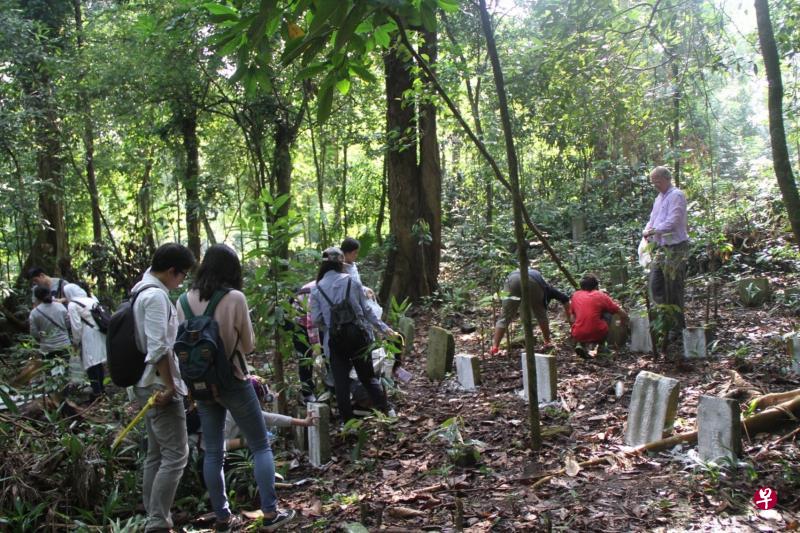
丁荷生教授(右一)亲自带领一群研究助理,到安莱盖路附近的热带树林寻找清朝古墓,并一一记录下来,作为研究我国最早华人移民的珍贵原始材料。(许源泰摄)
由新加坡国立大学中文系主任丁荷生教授带领的一批研究人员,已初步完成恒山亭清代迁葬墓的田野调查工作,并希望经过整理后能勾勒出开埠时期最早一批本地华人移民的面貌。他们至今找到469个清朝墓碑,而这些墓碑源自本地最早的福建人坟场恒山亭。
新加坡国立大学中文系的一批研究人员已初步完成恒山亭清代迁葬墓的田野调查工作,他们从田野调查中所找到的资料,经过整理后将能更好地勾勒出开埠时期最早一批本地福建移民的面貌。
国大中文系主任丁荷生教授两年前获得国家文物局文化遗产资助津贴计划的资助,开始和国大高级研究员许源泰博士一起带领一批研究助理,到位于安莱盖路(Onraet Road)的一片热带雨林搜寻清朝古墓碑,并有系统地记录和整理所找到的每一个墓碑。
恒山亭位于今日中央医院一带
他们至今找到469个清朝墓碑,这些墓碑源自本地最早的福建人坟场恒山亭。恒山亭原来位于石叻路和尼路之间的山丘(今日中央医院一带),后来因英殖民地政府要扩建中央医院,便把恒山亭的坟墓迁移到咖啡山一带。时间一久,这批清墓渐渐被人们遗忘,最后湮没在茂密的热带雨林中。
2012年,寻墓人吴安全、吴安龙兄弟在寻找本地先贤陈金殿的墓时,无意间发现了这批清代墓群,经调查后认定是恒山亭的迁葬墓,墓主人属于我国开埠时最早的一批华人移民。
丁荷生申请到文物局的资助津贴后,开始组织一批大约有20名本科生、硕士生和博士生的研究助理,前后不下10次到咖啡山旁的老树林搜寻清朝古墓碑,每次至少花上四五个小时。为了方便田野工作,他们请人清理树林里的杂草树木,却还是免不了被蚊虫蚂蚁叮咬。
丁教授接受本报访问时说,根据旧记录,他们应该能找到800多个清朝古墓,但至今只找到469个墓碑。粗略统计,当中包括189个道光(1821-1850)墓,44个咸丰(1851-1861)墓,5个同治(1862-1874)墓和8个光绪(1875-1908)墓。有好些墓碑因损毁或不完整,还无法确定年代。
32座墓碑属同一蔡氏家族
这批清朝古墓碑中,年代最早的是“道光六年”的191年古墓。墓主人是来自福建坂王的谢光泽,他去世的年代是“道光六年葭月”,即1826年的农历十一月,离新加坡开埠才七年。墓碑上没有后人子嗣,他很可能是独自过番,最后客死异乡。
丁教授说,他们从墓碑中统计出这批早期的福建拓荒者来自133个原籍地,当中包括海澄、厦门、南阳、龙津、谢仓、彭山、郑店、同安、长泰、东山、美山等。经过核查,主要来自漳州、泉州、厦门、福州和莆田等地。
一个有趣的发现是,当中40座墓的原籍地皆是福建龙海谢仓,其中32人还是来自同一个蔡氏宗族。其他的姓氏包括陈、杨、李、林、王和黄等。
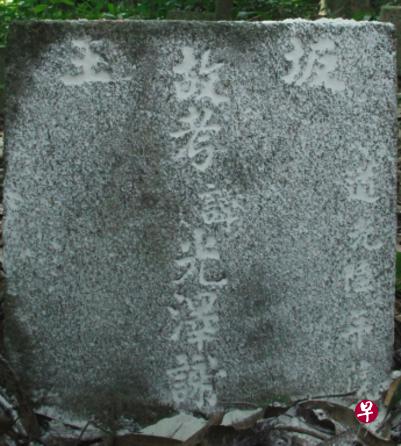
本地至今找到的最早坟墓,属于福建坂王的谢光泽,他去世的年代是“道光六年”,即1826年,至今已经191年。(丁荷生提供)
马六甲早期的一位甲必丹蔡士章也是来自谢仓。丁荷生今年9月特地走访谢仓,希望能找到更多资料,结果他在村里的蔡氏家庙看到两块碑文,记载着蔡士章的后人曾在嘉庆年间回谢仓老家修家庙,碑文中还谈到置祀田来维持家庙的运作。
丁教授说,马六甲三宝山过去也有类似的做法,靠置产来维持运作开销,但是恒山亭却有不同做法,他们会派和尚到港口向来自中国、越南、泰国等地的漳、泉船只“化缘”,只有缴付香油钱的船只,如果遇到船员身故,方可埋葬在恒山亭。
研究人员这次也从恒山亭的清代墓群中找到三个和尚的墓碑。当中年代最早的墓,属于育深禅师。出家人不在墓碑上列明祖籍地,而是以“隐秀”代之。育深禅师圆寂于“道光丁未年蒲月”,即1847年农历五月。碑上还列出两名孝徒俊德和行德,还有孙徒慧圆。
丁教授说,他们已申请到文物局的另一项文化遗产资助津贴计划,在恒山亭迁葬墓的记录存档工作完成后,会到武吉布朗、姓王山和老山等处,继续搜寻、记录和整理新加坡的清代坟墓。他预计还能找到大约500个清朝时期的坟墓或迁葬墓。
丁教授也正在带领国大中文系研究生,一起利用地理讯息系统(Geographical Information System,简单GIS)来捕捉新加坡历史的方方面面,包括华人庙宇、消失的乡村、消失的华校、早期的名人等。把所有资料串联起来后,大家就能更清楚地认识新加坡的历史。
商界纷设捐赠基金资助中文系学生
来源:联合早报 2017年5月24日 星期三 03:30 AM
文/许翔宇
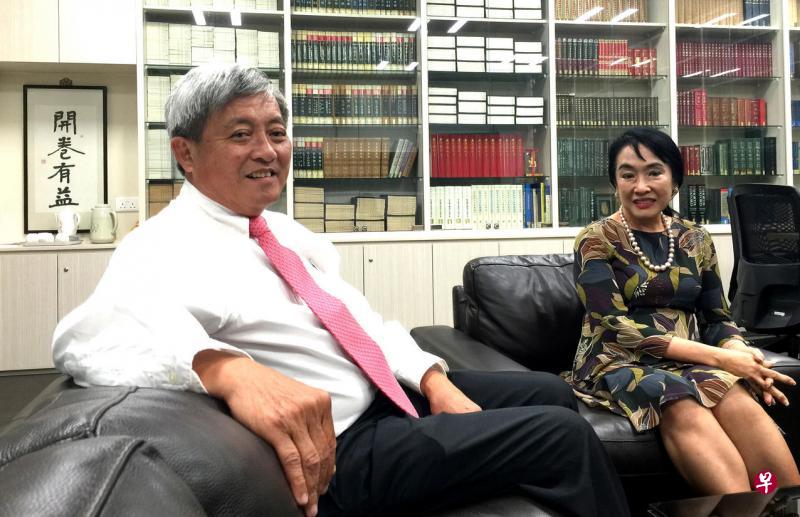
巧克力连锁店可卡树老板吕立岩(左)和已故银行家陈醒吾的女儿陈德馨,在前年和去年成立捐赠基金,为国大中文系学生颁发奖学金。(许翔宇摄)
巧克力连锁店可卡树,以及本地已故银行家陈醒吾的后人,近来分别成立一个15万元捐赠基金,在政府配对资助下,总额各达30万元,为主修中文系学生派发奖学金。
越来越多民间团体及热心人士关注本地华文教育与研究,慷慨解囊,为本地大学中文系学生设奖学金。捐赠者背景也趋向多元化,包括与中文系没有渊源,或并非出自中文系本科的商界人士。
以新加坡国立大学来说,由民间机构或个人为其中文系成立的奖学金、补助金或奖项达10多项。捐赠者包括会馆、商家,以及文化界人士,其中不少以设立捐赠基金(endowment fund)方式资助奖金。
巧克力连锁店可卡树(The Cocoa Trees),以及本地已故银行家陈醒吾的后人,近来分别成立一个15万元捐赠基金,在政府配对资助下,总额各达30万元,为主修中文系的本地公民或永久居民学生派发奖学金。
可卡树老板吕立岩(60岁)曾任新加坡中华总商会第58届董事。他前年代表中华总商会,同国大中文系教授一起遴选学生,以颁授总商会的一份奖学金,他对学生的素质及学习热忱极为欣赏。“我们得从六名学生中挑选两位。我觉得学生都很优秀,并认真要修读中文系,在遴选过程感到颇为挣扎。我觉得应给学生多些机会。”
他当下决定捐出1万5000元,为落选的三名学生各颁发5000元奖金,同年与太太董爱华以公司名义设捐赠基金。“可卡树中文系奖学金”今年起派发,每年可颁多达三份,每份价值5000元。
毕业自国大工程系的吕立岩说,他从小学至高中念传统华校,受到中华文化及价值观的熏陶,对他的人生和事业起了正面的作用。“成立基金除了要回馈社会,也希望抛砖引玉,鼓励更多人支持中文系学生。”
国大中文系代主任:款项捐赠者背景多元
在银行界工作25年的陈德馨,去年底以父亲陈醒吾之名设立捐赠基金。她也是国大校友,曾主修历史和中文,退休后于2008年回返国大修读中文系硕士学位。
祖籍福建漳州的陈醒吾,在1940年代担任中华民国外交官,派驻印度尼西亚时还创办过报刊。1940年代末定居本地后,他投入银行界并活跃于华社,曾担任同德书报社社长及漳州总会主席等。
陈德馨说:“我受惠于父亲的教诲,觉得是时候为他做一些事,作为对他的纪念,也延续他热爱中华文化的精神。希望奖学金能激励更多有心研究中华文化的年轻人主修中文。”
由于基金还需时间累积回报,她另捐赠5000元资助一名今年选择主修中文系的学生。“陈醒吾中文系奖学金”今后每年也颁发三份,每份价值5000元。
为国大中文系设奖助学金的其他民间团体及个人,还包括中华总商会和龙溪会馆等。
国大中文系代主任许齐雄副教授说,这些捐赠虽款项不一,但是就捐赠者背景而言,却是十分多元。
“我们系为此觉得感动,也感到荣幸……这也是对我们这几十年来的耕耘和成果的肯定。”
另外,南洋理工大学中文系学生也受益于多个民间机构及个人的捐款,包括上海书局奖助学基金、伦敦药房已故创办人云茂潮后人捐助成立的基金,以及孔子基金会等团体所颁发的奖助学金。
南大中文系主任游俊豪副教授受询时说:“南大中文系持续获得社会的关注,已有一些奖助学金的捐赠,目前在洽谈一些新的项目,让更多的学子获益。”
NUS-led crowdsourcing project to map over 1,000 Chinese temples here
Source:The Straits Times MAY 8, 2017, 5:00 AM SGT
Melody Zaccheus/ Heritage and Community Correspondent
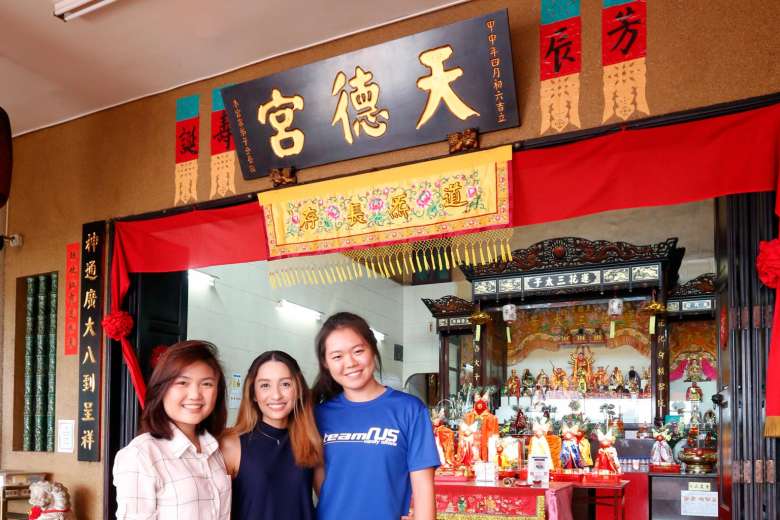
NUS undergraduates (from left) Li Huimin, Sheikha Shamerah and Jasmine Yee, all aged 21, at the Tian Teck Keng temple in Tampines. They were part of a group which helped to document the Chinese temple. ST PHOTO: CHEW SENG KIM
An interactive atlas of more than 1,000 Chinese temples here, dating back to the 19th century, is being developed in the first such project here to consolidate such data.
Led by the National University of Singapore's (NUS) Department of Chinese Studies and using a crowd-sourcing model, the project's success hinges largely on contributions from the public.
However, the geographic information system's (GIS) first contributors are NUS undergraduates who studied 69 temples as part of a module called Everyday Life Of Chinese Singaporeans: Past and Present. These include Tampines' Tian Teck Keng temple, which has the three-headed, six-armed Third Prince Nezha as its main deity. It can trace its roots to the Balestier area, where the deity was housed in the homes of village heads. A permanent place was built for the deity in the form of a wooden shack in 1922.
The group, including 21-year-old undergraduate Jasmine Yee, traced the temple's history and documented its present-day design, layout and sculptures.
NUS Department of Chinese Studies' head Kenneth Dean is leading the project, with the aid of senior research fellow Hue Guan Thye and the NUS Geography Department.
The project, officially called A Singapore Historical GIS Analysis: The transformation Of Chinese Institutions, has received about $700,000 in funding from the Ministry of Education. The map also charts the historical and ongoing movement and relocations of Singapore's 1,000 or so Chinese temples.
Professor Dean said the project's objective is to trace how the country has also been built from the ground up by cultural and religious institutions, and not just through top-down government policies.
By the year end, he and Dr Hue will launch a free mobile application that the NUS Electrical and Computer Engineering Department helped to develop. With it, members of the public can upload photos of temples they patronise, according to categories such as main hall, courtyard and artefacts. They can also submit information such as the year of founding, addresses over the decades, number of members, processions it hosts, and whether it is linked to a "mother temple" in China.
For the past six years, Dr Hue and Prof Dean have been pounding the streets to document inscriptions carved on stone and wooden tablets across 63 Buddhist and Taoist temples, clans and guild houses. Their research is featured in a two-volume book titled Chinese Epigraphy In Singapore, 1819-1911, and is being worked into the map.
Prof Dean is also developing similar maps and apps for clan associations, kampungs, mosques, Indian temples and churches as part of the NUS' cultural mapping project.
Prof Dean said: "The real lives of Singaporeans take place in many of these institutions. The project aims to capture the history that is no longer visible on the rewritten surface of Singapore, but that is buried in people's personal memories and archives of these institutions, to tell a much broader and richer story. "If the material can be more accessible, then I think the past will not disappear so easily."
Ms Yee said the project attempts to capture the history and stories of a variety of temples beyond the more famous ones like the Thian Hock Keng temple in Telok Ayer.
She said: "There is valuable cultural knowledge that we can learn from such places, be it by talking to the helpers or observing the rituals they conduct." The map can be found at http://shgis.nus.edu.sg/index.php/chinese-temples
研发互动地图集国大师生收集千家庙宇历史
来源:新明日报 2017年5月8日 星期一
文/许翔宇

三名过大学生参与记录本地庙宇文化与历史,为即将推出的互动式地图集尽一份力(《海峡时报》)
国大师生带头采集我国1000多家庙宇的历史,推出互动式地图集,利用科技以众包形式记录下我国的庙宇与历史文化。
《海峡时报》报道,这个手机庙宇历史文化的项目由新加坡国立大学中文系带领,希望让国人有机会分享于提供不同庙宇的资料及照片等,获得教育部高达70万元的拨款。
由国大中文系主任丁荷生教授和许源泰博士,率领电子和电脑工程系一通研发的免费手机应用程序,预计年底让国人进行图文分享。
率先为这个互动式图集做出贡献的是三名21岁的国大生李慧敏、沙伊卡和余洁敏。(人名译音)
她们早前在一个学科中,针对69家庙宇展开深入研究,收集相关资料及了解庙宇内的文物等。
三人采集了大量原材料,包括位于淡滨尼的天德宫,并将收集到的资料,纳入即将推出互动式地图集内。
手机应用程序让国人可分享走访庙宇时拍摄的照片,根据不同的类别,如大厅、庭院和文物等上载图文。
此外,公众也可提供有关庙宇的资料,如庙宇创立的年份、多年来经搬迁后的地址、会员人数及庙宇在中国是否有母庙等。
丁荷生教授表示,除了本地庙宇,也正探讨为公会、回教堂、印度庙和教堂等,开发手机应用程序,保留我国的历史文化
纪赟:国大中文系招生困难的反思
来源:联合早报 2017年4月20日 星期四 3:30 AM
文/ 纪赟
日前国大中文系主任丁荷生(Kenneth Dean)与许源泰二位先生来访,饭间丁先生就说到了担任系主任的难处,其中最大问题还是生源萎缩。
丁荷生自前年初主掌国大中文系,至今已满两年。他自幼生长在港台的闽南、广东文化圈之中,大学阶段受过了非常好的学术训练,毕业后专攻南方民间宗教。
与很多书斋型学者不同,丁氏并重田野调查,因此曾花数十年调查闽南莆田周边地区的道教民俗信仰,包括那些活生生的科仪、乩童、剧团、进香崇拜团体等,并搜集了大量的民间宗教碑刻铭文,试图以此来勾勒一个更为生动的宗教地图志。
难能可贵的是,丁氏研究还将宗教与东南亚地区国家、社群间的移民迁徙史贯串了起来。自清末东南沿海的华人移民潮渐兴,而通过各地民间宗教的考察,尤其是庙宇碑志的搜集、断代与统计,就可以发现这些移民的社会属性与整个东南亚地区的跨境宗教网络。这种研究对于新加坡本地的文化身份认同构建,也具有深远的意义,因其可使我们更好地了解新加坡的过去历史与独特文化形成、演变。
像丁氏对19世纪末闽南人商界领袖,同时也是鸦片大亨章芳琳的研究,就通过后者所捐助的学校、庙宇等条规,来展现了不仅是一位闽商巨贾的身世浮沉,更刻画出了殖民地时代新加坡错综复杂的商业贸易网络与纷纭的社会关系。
就在年初,丁氏又与许源泰先生出版了两巨册的《新加坡华文铭刻汇编:1819-1911》,这不仅可算是新加坡宗教史研究上的一件大事,更可代表极少数文史工作者,对于新加坡国族形成追溯上的不遗余力。
国大中文系并非只有丁荷生与许源泰,他们还有非常好的汉语语言学研究团队,其东南亚华人华侨研究与中国传统宗教研究都是世界顶尖的,并且在古典文学与思想方面也很有特点。但问题的另外一面却是如丁先生所叹息,即国大中文系招生并不理想。
据报道,这个国大最为历史悠久的科系,自上世纪八九十年代每届毕业生有一二百人,直接滑落到现在每届只有三十来人。
为什么会有如此巨大的反差呢?我觉得一方面是由于新加坡本土华语整体环境的持续恶化所致。众所周知上世纪80年代起取消华语教学对本地语言产生深远影响。从那以后上小学的本地人基本都处在一个更亲英语的环境之中,而现在华语人才的萎缩,可以说正好是30年前教学语转变的一个直接结果。这种语言政策的巨大影响,其震撼性至今还未完全得以显现,其余波甚至还要持续至少二三十年。
那么政府所推行的双语政策到底是否算是成功呢?就在去年11月,李显龙总理在出席马来社群的颁奖礼上指出“推行双语政策是正确决定,掌握良好的英语赋予新加坡人在全球经济竞争的优势,国人同时也仍能够使用母语,继续与亚洲其他社群建立联系。”我们看到,政府的初衷是非常实际的,即提高国人在全球“经济竞争”中的优势。
这其实相当无可厚菲,我们毕竟生活在一个极其现实的世界之中,更不用说新加坡还是一个资源严重匮乏的弹丸之地了。并且,我们还应该看到通过推行英语,也可以加强新加坡人的向心力与凝聚力,因为英语确实比起任何一种母语,都更具有推动“新加坡人”身份认同的语言基础。那么无疑新加坡当前的语言政策就可以说是一个巨大的成功。
然而即使如此,我们还是可以看到相对而言,诸母语也包括华文世界所受到的巨大挫伤,而当今新加坡人华文水平起码比起先辈而言是有所降低的,如果不是说有很大退步的话。这一点,即使是作为文化“局外人”的丁荷生,也有所认同。确实要承认,我们为了这种语言政策的成功付出了不小的代价,并且就长远而言,这种代价到底有多大,我们还并不清楚。
随着华文在新加坡社会版图之中重要性的日益式微,所以中文系毕业生,如果不去从事学术研究,则不过是要面对两条出路,一是到各级学校去做华文教师,而本地中小学老师的教学、行政压力又向来让人望而生畏;第二条出路则只能是新加坡那发展空间并不算大、市场日益逼仄的华文报业与新闻传媒。
所以历史趋势再加上现实的考量,都极大的限制了本地人把大学中文系当成是自己的选项。而这种情境,更衬托出了在全世界背景之中随着大中华区经济的腾飞,华文地位正日益崛起。在华文崛起的这样一个过程之中,新加坡倒成了一个巨大的反差。国大的中文系不过是新加坡华文世界的一个缩影,我们有很好的人才储备与文化底蕴,但很可能面临后继乏人的窘境。
《新加坡华文铭刻汇编1819-1911》国大两学者新书收录63华社碑铭
来源:联合早报 2017年1月11日 星期三 03:30 AM
文/谢燕燕
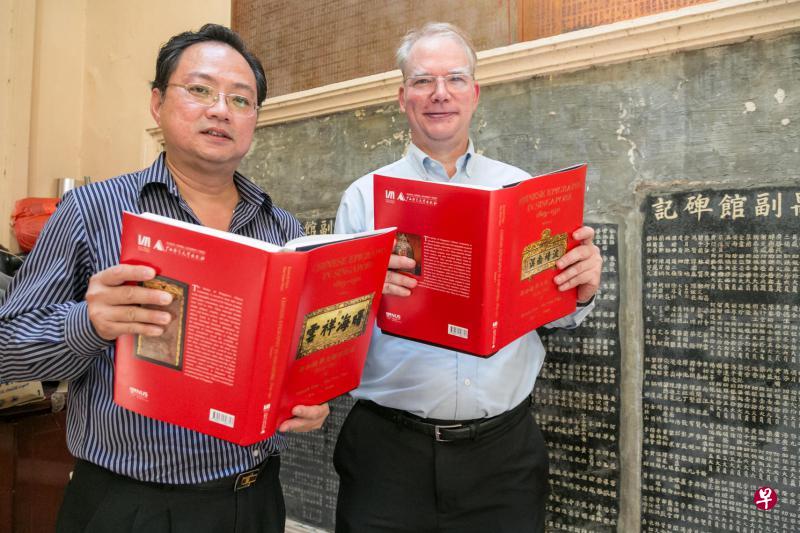
许源泰博士(左)和丁荷生教授手捧着《新加坡华文铭刻汇编1819-1911》上下册摄于番禺会馆的碑铭前。(徐颖荃摄)
为了搜集资料,负责编撰此书的国大中文系主任丁荷生教授和高级研究员许源泰博士,共花了四年走访约400间庙宇、祠堂、同乡会、宗亲会及同业公会等。
华人社团和庙宇喜欢在门楣上安置匾额,在门柱上设对联,在墙壁上嵌碑文,甚至在铜钟、云板、铜磬、香炉、神台、横梁,墙基、契砖上留下各种文字来记录历史。有些学者因此养成“进城找庙,进庙找碑”的治学习惯,因为碑文中有可供研究的族群历史。
新加坡国立大学中文系主任丁荷生教授(60岁)和高级研究员许源泰博士(49岁)联手编撰的《新加坡华文铭刻汇编1819-1911》,正是沿着国学大师饶宗颐、著名学者陈铁凡、傅吾康(Wolfgang Franke)等人所开的先河,从本地铭刻中去记录、保存和诠释历史。
为了编撰和出版这套铭刻汇编,他们花了四年时间走访约400间庙宇、祠堂、同乡会、宗亲会、同业公会等,采集了大量原材料。
《新加坡华文铭刻汇编1819-1911》收录63个华人团体的1278件文物铭刻。这些创立于1819年至1911年之间的华人团体,包括庙宇、祠堂、会馆、行业公会之类的组织。
著名古庙如粤海清庙、天福宫、凤山寺、海唇福德祠、望海大伯公、恒山亭、金兰庙;乡村庙宇如顺兴古庙、乌敏岛佛山亭大伯公庙;百年老会馆如应和会馆、中山会馆、宁阳会馆、永春会馆;宗祠如保赤宫、三邑祠;早期学堂如萃英书院;最早的医院如陈笃生医院、同济医院;百年佛寺如莲山双林寺、观音堂佛祖庙等的碑铭都一一收录书中。
丁荷生教授说,附录中另外收录11份有趣的碑记铭文,例如“印度总督游新纪念碑记”(1850)、“暹罗王游星碑”(1871)、“维多利亚女王金禧纪念碑”(1887)等,而特别有趣的是牛车水马里安曼兴都庙立于1831年的庙碑,竟然用了包括中文在内的五种语文。
逾半铭刻属二战前文物
许源泰博士指出,663份铭刻源自1945年以前的文物,剩余615份铭刻是从1945年以后的文物摘录下来的。
丁荷生教授说,有些团体和庙宇虽在1911年之前创立,但还无法找到有年份的文物或碑文,因此没被收录在这套汇编内。不过他们还是列出48个组织的名字,准备继续展开研究工作。
饶宗颐1970年编撰《星马华文碑刻系年》,为东南亚华文碑铭编成书开了先河。这之后是陈荆和、陈育崧合编的《新加坡华文碑铭集录》(1973)、庄钦永的《新加坡华文铭刻记录初编》(1984)和《马六甲、新加坡华文碑文辑录》(1998)等。
邻近国家则有陈铁凡、傅吾康《马来西亚华文铭刻萃编》三卷(1982/1985/1987)、傅吾康《印度尼西亚华文铭刻汇编》三卷(1988/1997)和傅吾康、刘丽芳的《泰国华文铭刻汇编》(1998)等。
以胡亚基创立于1879年的新加坡番禺会馆来说,之前的出版物只收录最早的一对碑,即《新建番禺会馆碑记》(1879)。新编铭刻汇编却收录会馆的所有碑文,包括《新建番禺副馆碑记》(1889)、《星洲番禺再建总坟重修会馆碑记》(1910)、胡汉民所书写的“番禺会馆”匾额(1921),肇庆会馆赠送的“结构堂煌”匾额(1910),甚至连1952年和1962年的铜碑也收录在内。
丁教授说,他们的工作还未完成,下来准备搜集和出版1911年至今的各种碑文铭刻。他们还有400间庙要访,也要走访创立于1911年之后的会馆、宗祠、公会等。他们想探讨这些会馆、庙宇的生存策略,了解他们如何应对时代变迁。他们已收集了1万5000张照片并进行分类。
昨天在国家图书馆举行发布会的《新加坡华文铭刻汇编1819-1911》由国大出版社和广西师范大学出版社联合出版,分上下册共1500页。这套图文并茂,中英对译的铭刻汇编,是研究本地华人历史不可或缺的工具书。出版社目前只印400套,每套售价220元(包括运送上门)。订购专线:67761148,也可上网:http://nuspress.nus.edu.sg/。”
盼成全球中华文化研究重镇云茂潮后人捐款助国大设研究中心
来源:联合早报 2016年12月3日 星期六 03:30 AM
文/谢燕燕
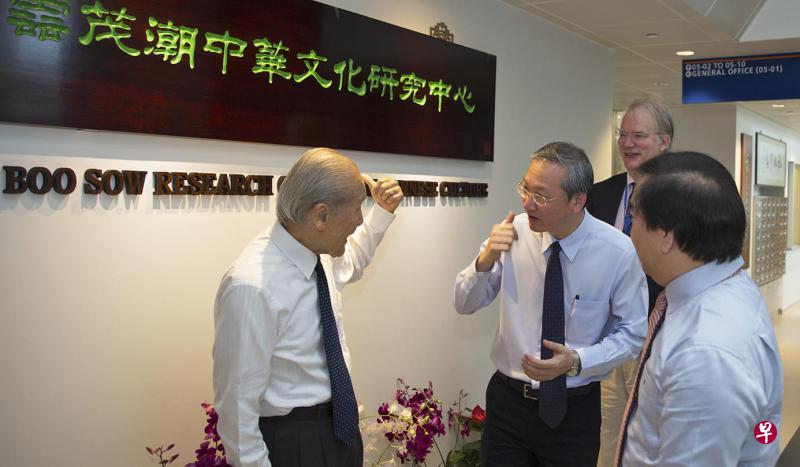
东亚研究所主席王赓武教授(左起)和总理公署兼人力部政务部长陈振泉昨天在云茂潮中华文化研究中心开幕礼上交流。陈振泉背后是国大中文系主任丁荷生教授,身旁则是研究中心主任李焯然副教授(右一)。(曾道明摄)
这个以伦敦药房已故创办人云茂潮命名的研究中心,将协助国大中文系巩固现有的六个研究群,并推动高端学术研究与合作计划、举办推广华族文化活动,以及设立访问学者计划等。
新加坡国立大学中文系的学术研究基地——云茂潮中华文化研究中心昨天正式开幕。这个设在亚洲研究大楼内的研究中心,希望能让国大成为亚洲,乃至全球的中华文化研究重镇。
研究中心将协助国大中文系巩固现有的六个研究群,即汉语语言学、明清研究、印刷及大众文化、东南亚华人与近代中国、中国宗教,以及古典文学与思想。
中心将推动高端学术研究与合作计划,同本地大专院校举办推广华族文化的活动,也会设立访问学者计划,邀请海外学者前来交流和进行跨学科研究。
这个以伦敦药房已故创办人云茂潮(1918-1992)命名的研究中心,在云茂潮后人捐助下成立了一个基金。云茂潮中华文化研究中心主任李焯然副教授说,有了上述基金,加上政府的配对拨款,要维持中心10年运作已不成问题。
未透露设基金数额
不过他并未透露基金数额,因为云茂潮后人希望保持低调。《联合早报》曾要求采访云茂潮后人,但他们一再婉拒,只想在幕后推动中华文化研究和双语教育。
总理公署兼人力部政务部长陈振泉昨早为中心主持开幕时说,最令人欣慰的是,中心是由民间自发成立,是在云茂潮后人捐助下促成的,体现了本地华族领袖事业有成后回馈社会,兴教助学的传统与美德。
研究中心昨天也主办了“中华文化的传承与创新国际研讨会”,邀请各地学者参与讨论。陈振泉希望大家秉持“知者不惑,仁者不忧,勇者不惧”的人文精神,为中华文化的传承和创新,奉献智慧和力量。
国大文学暨社会科学院中文系主任丁荷生教授说,云茂潮后人非常支持双语这一块,甚至希望中文系能鼓励学生多学马来文或淡米尔文。
李焯然副教授说,中文系2013年获知大学将兴建亚洲研究大楼时,便希望能设立本身的研究中心,于是开始四处物色合适的捐款人。
他表示那会是一笔较大的捐款,因为大学和中文系的立场是中心必须有一套长远规划,而不是运作了一两年便因经费不足办不下去。
不过他们却碰上一个情况,就是新加坡近年来出现几个文化中心,有中国文化中心、华族文化中心,还有福建会馆的文化学院,很多人因此混淆不已。
他解释说:“其实大家的性质不一样,我们是做学术研究的。文化如果没有底蕴和基础,就只是在推动一些活动,缺少更深层的东西。”
他后来找到云家后人,和对方讨论了半年。他告诉对方,想用五年时间把中心建立起来,再用10年时间发展成有规模的研究中心,最终得到对方支持。
据了解,中文系过去曾有汉学研究中心,后来并入亚洲研究所,中文系因此失去一个研究基地。为了整合研究力量,中文系组成研究群,从最初的四个发展至今天的六个。
李焯然指出,研究中心将更好地整合中文系的研究队伍。中心不是从零开始,因为已有不少研究成果,接下来可以更有系统地推动。中心将提供资金资助研究群,也会邀请访问学者,还会办公开讲座等。
出身贫寒 云茂潮热心公益
根据中心的手册,祖籍海南文昌龙马乡大官村的云茂潮生于新加坡,1948年毕业于爱德华七世学院药剂科。这名出身贫寒,却刻苦奋斗和勇于拼搏的专业药剂师,后来设立伦敦药房,先后研发畅销东南亚的疳积药(排蛔虫)治疗幼童疾病,也推出杀虫灭蚊药油如杀虫王等,在商界闯出一片天地。
云茂潮热心公益,曾担任新加坡云氏公会会长。他的子女把父亲留下的钱,以父亲名义捐助本地各大教育机构,包括国大、南洋理工大学、义安理工学院等,却始终保持低调。
国大中文系学生徒步克拉码头探寻潮州人历史
来源:联合早报 2016年10月5日 星期三 03:30 AM
文、图/潘万莉 国大通讯员
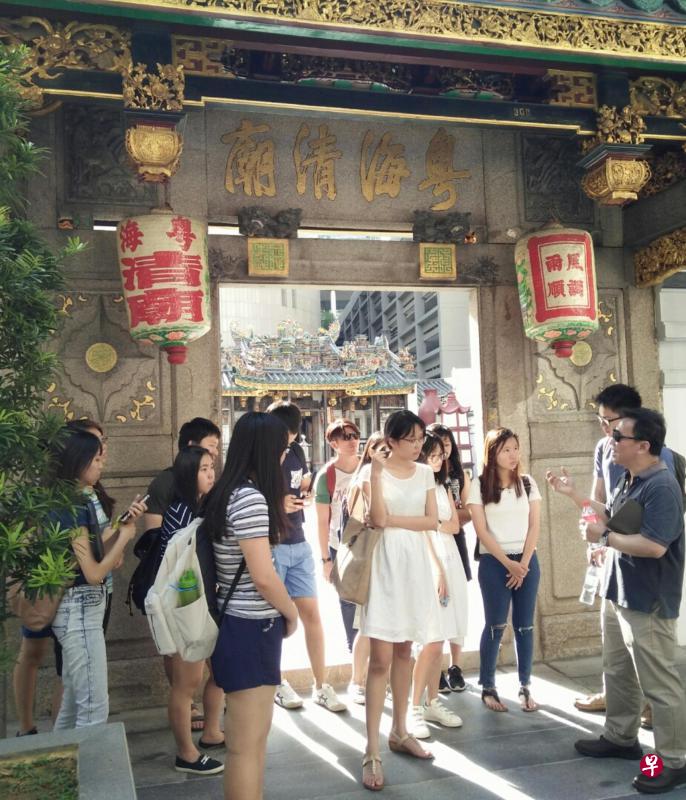
国大中文系学生到粤海清庙了解潮州人宗教信仰。
一提起克拉码头,闪过大家脑海的,应该是繁华的商业街景,但新加坡独立前的克拉码头究竟是怎样的面貌?现在充满摩登气息的街道,又承载着哪些历史故事?
9月6日这天,修读“海外华人”这门课的18名国大中文系学生在李志贤副教授带领下,到克拉码头展开实地考察,探寻繁华背后的历史痕迹,了解早期华侨的生活状况。
潮州人聚集地
19世纪上叶,潮州人开始从中国移民之新加坡,而新加坡河旁的珠烈街(Chulia Street)和沙球劳路(Circular Road)地带便是潮人的聚集地。现今的珠烈街马路左侧是华侨银行,右侧则是一排酒吧,形成一幅繁华的街景,但昔日的景观却大相径庭。珠烈街以前称“山仔顶”,最早的潮人的甘蜜种植地;而华侨银行现址旁的路段以往则是福建人和潮州人地盘的交界处,两班人马经常上演“楚汉相争”,因争夺地盘儿发生殴斗。
跨过马路,迎面的便是通向新加坡河的广东街(Canton Street)。昔日的广东街是繁忙的,白天和夜晚都呈现不同面貌。白天的新加坡河畔停泊着几十艘驳船,而广东街上总能见到载运工人运送货物的身影,遇上重大节日时还能目睹隆重的游神仪式。夜晚,载卸货物的码头上打起了简单的戏台,潮侨同胞一块儿在观赏精彩的表演。
在旁的沙球劳路俗称“十八间后”,昔日这里潮州人房屋和商店密集,弥漫着浓厚的生活气息。上世纪七八十年代,政府重新发展这地带后,多数原来的商店房屋现今经过修复后都焕然一新,注入新生命。
同学们一路沿着沙球劳路和俗称“马车街”的沙球劳路上段徒步,在李智贤副教授生动的讲解下,潮州人昔日的生活面貌一一呈现眼前。不知不觉,大家来到了中央广场(Central),即潮州人昔日俗称“新巴刹”的特色市场。“新巴刹”是潮州人的聚集中心,是潮州人的菜市场。对面的“香港街”和“戏馆街”也是潮州人当初是我居住地,承载着丰富的潮侨历史痕迹。
李志贤副教授受访时说:“通过实地考察学习历史与课堂上是不同的,教师以外的历史考察能将人物、时间和建筑相互结合,还原历史原貌,更具现实意义。”
夏纬绢(中文系大四)说:“这次实地考察让我更好地香香早期潮州人的生活面貌,了解克拉码头的这段历史故事。”
从庙宇看早期潮侨人际网
说到早期的华侨,绝对不能忽略庙宇所扮演的角色。粤海清庙为潮州人建立的庙宇,主要祭拜妈祖和玄天上帝,是潮人重要的信仰中心。
除了体现潮州人的宗教信仰特色,粤海青庙也反映了早期潮群与其他方言群的关系。踏入庙里,映入眼帘的便是应和会馆和茶阳会馆赠与的牌匾。这体现了潮人当时与其他较小的方言群体密切的合作关系,以对抗群体较大的福建群。可见,粤海清庙扮演了团结个方言群组织的功能。席妍子(中文系大四)说:“参观庙宇能更了解方言群的宗教文化,意义深远。”
国大中文系融合实地考察和讲座 追寻土生华人足迹
来源:联合早报 2016年6月15日 星期三 03:30 AM
文、图/潘万莉 国大通讯员
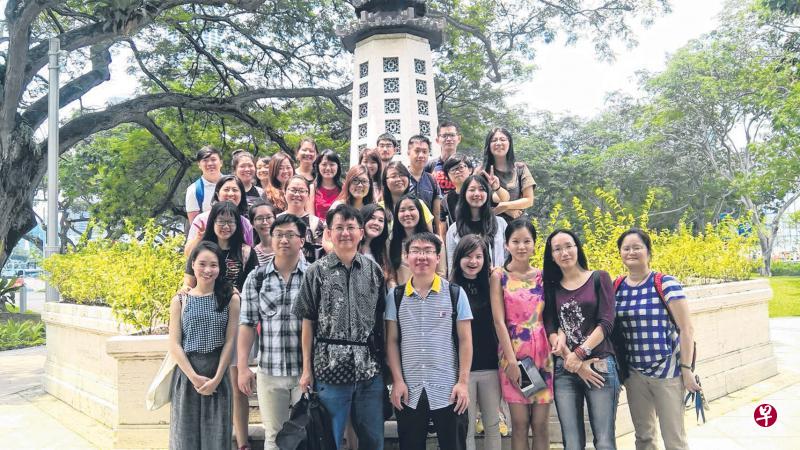
国大中文系考察团在林谋盛纪念碑前集体合照。
认识历史人物不局限于课堂教学,新加坡国立大学中文系融合实地考察和讲座,让学生通过精彩有趣的方式了解早期土生华人对华社的贡献。
亲临历史现场认识伟人
陪同考察团的尚有历史教师卢观英、郑淑娟与徐声文。87岁经历日据时期的老怡保梁伟风也受邀随团作现身说法。他特别谈及其父母被日军机关枪射杀经历,以及慰安所之所讲所闻。
黄贤强:研究新马华人史
修读“东南亚华人”和“中国与东南亚社会文化互动研究”课程的约30名中文系本科生和研究生不久前在黄贤强副教授的带领下,穿梭于伊丽莎白女皇道和历史悠久的凤山寺,寻找早期土生华人的足迹。
伊丽莎白女皇道贯穿了几个历史意义深远的产物,其中就包括同学们参观的林谋盛烈士纪念碑和陈金声喷泉塔。1954年由华人社会建造的林谋盛烈士纪念碑伫立于大家眼前,仿佛默默地述说着这位伟人的贡献。在导师的生动讲解下,林谋盛抗日救亡的画面更是清晰地浮现于同学们脑海中。
首次参与田野考察活动的卢恩情(中文系大一)认为这种学习方式非常新鲜有趣,她说:“亲临历史现场让我对这些伟人留下了更深刻印象,在读牌匾时有种穿越时空的感觉,感觉很真实。”她坦言:“之前看到纪念碑时都不会特别注意伟人的贡献,对于这些历史人物也不特别熟悉,这次考察活动让自己关注历史人物。”
除了纪念碑,同学们还来到了历史悠久的凤山寺,探索早期土生华人与新加坡庙宇的关系。凤山寺由出生于马六甲的南安人梁壬葵在1836年创建,1908年的重建工程则由林谋盛的父亲林路负责。早一批的南安移民中有不少就是从马六甲进入新加坡谋生的土生华人,而凤山寺便是南安人到本地开埠的重要证明。傅简宁(中文系大四)受访时说:“从来没有想过土生华人与本地庙宇的关系,参观凤山寺后,比较清楚早期土生华人对于文化和宗教方面的付出。”
听讲座进一步了解土生华人
这天正好也是亚洲文明博物馆与国大中文系联合举办的新加坡华语文化讲座系列第五讲,题目为“当莱佛士‘遇见’孔子:土生华人和受英语教育者与新加坡华人社会的互动”,主讲人正是黄贤强副教授。于是实地考察结束后,同学们便前往亚洲文明博物馆参与讲座,进一步了解新加坡土生华人的历史。黄贤强副教授受访时说:“实地考察和讲解是最佳的教学活动之一,所以只要有机会,我一定带同学出校外,甚至是国外实地教学。”
讲座中,黄贤强巧妙地将贡献显著的土生华人或受英语教育者比作莱佛士和孔子,例如林文庆为何是“穿上唐装的莱佛士”,而林谋盛则是“穿上西装的孔子”?通过这生动的比喻,黄贤强深入解释了土生华人、受英语教育的精英与新加坡华人社会的互动关系,同时探讨了 “土生华人”这一概念的广泛定义。 应尚君(三年级交流生)受访时说:“实地考察和讲座的内容密切相关,这两种不同学习方式的融合非常巧妙,让我们轻松地吸收了不少关于土生华人的知识。”
Nuggets of Singapore history, from inscriptions
Source:The Straits Times MAY 20, 2016, 5:00 AM SGT
Melody Zaccheus/ Heritage and Community Correspondent
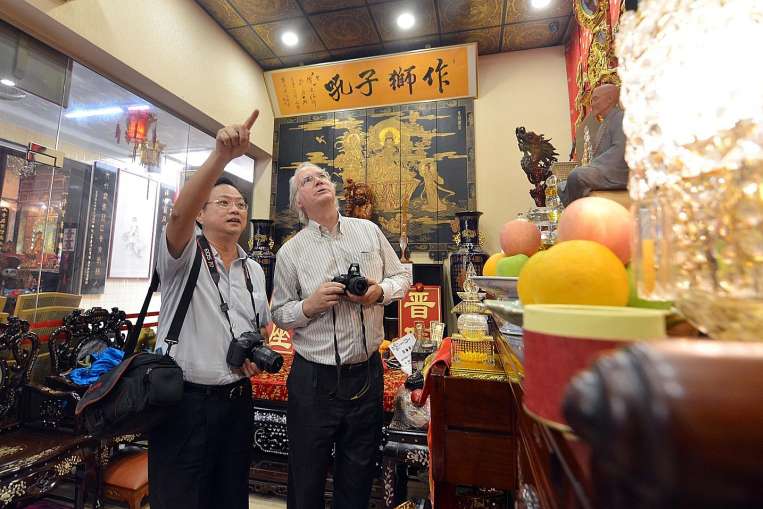
Professor Dean (left) and Dr Hue (far left), seen here at Leong San See Temple in Race Course Road, have been recording, photographing, analysing and translating Chinese inscriptions into English from 63 Buddhist and Taoist temples, clans and guild houses. PHOTO: AZIZ HUSSIN FOR THE SUNDAY TIMES
NUS duo translate and collate 1,300 accounts carved on stone, wood into two book volumes
Telling stories of Singapore's past, 1,300 Chinese inscriptions carved on stone and wooden tablets, some two centuries old, have been documented as part of a unique research project.
The stories, now on official record, include accounts such as how the 1828 Heng San Ting temple and cemetery in Silat Road had started taxing boat captains to cover the burial fees of sailors, many of whom had died in early Singapore when gangsters were rife and diseases thrived.
This little-known detail, from one of Singapore's oldest and now defunct temples, was inscribed in Chinese on a wooden slab dated 1836.
Professor Kenneth Dean, who pounded the ground for four years to recover the lost data, alongside research fellow Dr Hue Guan Thye, said: "The history of Singapore has been written from the colonial archives and from the nation-building perspective. So for us, the question was: What has been left out of the Singapore story? We dedicated our resources to build our own new and accessible archive."
The duo from the National University of Singapore's (NUS) Department of Chinese Studies described the epigraphic records as untapped historical resources.
''It is a very meaningful project as it is about finding our roots and developing resources for the cultural heritage of Singapore. '' DR HUE GUAN THYE
As they are written in ancient Chinese and calligraphy styles, these 1819 to 1911 inscriptions are usually ignored and incomprehensible to the average visitor. So the pair set out to record, photograph, analyse and translate these inscriptions into English.
Their effort, covering 63 Buddhist and Taoist temples, clans and guild houses, culminates in two volumes called Chinese Epigraphy in Singapore, 1819-1911. The books went on sale via NUS Press last Tuesday and feature descriptions of temple iconography, art and cultural artefacts; explanations of rituals; and write-ups on their history.
Other highlights in the book include inscriptions from Thian Hock Keng temple, which was established in Telok Ayer in 1842.
A stone slab, carved and erected in 1850, bears the names of regional contributors to the monument's construction, including boat captains and merchants.
Prof Dean said such inscriptions provide snippets of what life was like in 19th and early 20th century Singapore, and capture the diverse cross-section of society at that time.
He added: "We hope schools and public libraries will take the books in, so Singaporeans will have access to this rich, first-hand material to build on."
The researchers' next aim is to produce other volumes on the country's modern temples.
These places continue to provide "the underpinning for cultural life" for Buddhist and Taoist Singaporeans, said Prof Dean.
Temples today have on average between 500 and 1,000 followers, and some cater to hundreds of thousands of people during festivals.
The duo are also building interactive maps and charting the historical and ongoing movements of Singapore's over 1,000 temples, other religious institutions, clans, cemeteries, and kampungs in a digitisation effort with the NUS Geography Department.
Prof Dean, who is agnostic, and Dr Hue, a Buddhist, hope Singaporeans will also send in photos and records of the temples and kampungs they are familiar with, for their website.
Dr Hue said that while the task is a mammoth one, the duo will continue to "work tirelessly".
He said: "It is a very meaningful project as it is about finding our roots and developing resources for the cultural heritage of Singapore."
A version of this article appeared in the print edition of The Sunday Times on November 20, 2016, with the headline 'Nuggets of S'pore history, from inscriptions'.
新加坡国立大学硕士生考察怡抗战史迹
来源:星洲日报 2016年4月21日 星期四
文/冼月桂

考察团在英勇女孩接生妇西碧儿卡迪卡苏墓前献花敬礼后合影。左五起是郑淑娟、卢观英、刘道南及黄贤强。
(怡保20日讯)新加坡国立大学中文系硕士生华人历史文化考察团一行14人在霹雳文史工作者刘道南导览下,昨日考察怡保新旧街场的抗战及日军暴行史迹,以丰富二战的历史认知作学术研究。
考察团中,9名来自中国,2名来自新加坡。他们在副教授黄贤强博士的率领下,与2名中文系办公室秘书到怡保考察抗战时期,日军暴行及136部队活动遗迹。他们也参观了超过百年历史的旧街场闲真别墅。
陪同考察团的尚有历史教师卢观英、郑淑娟与徐声文。87岁经历日据时期的老怡保梁伟风也受邀随团作现身说法。他特别谈及其父母被日军机关枪射杀经历,以及慰安所之所讲所闻。
黄贤强:研究新马华人史
领队黄贤强指出,新加坡国立大学中文系北马华人历史文化考察团16日先抵达槟城考察孙中山遗迹、姓氏桥、南侨机工纪念碑、升旗山及极乐寺等相关人物与事件。
他说,考察团的重点是华族文化及历史的考察,借此增加的新马华社历史文化的人是,并提升学术研究。当然也会游览一些景点,因此到怡保一行,并享用怡保白咖啡及芽菜鸡等美食。
他表示,考察团的9名硕士生来自中国各省,包括广西、浙江、江苏、宁夏、辽宁、湖北及首都北京。他们到新加坡来进修硕士课程,并研究新马华人的历史文化,在从课堂上、书本上了解及理论上的认识,也实地考察史迹以感受新马华族文化内涵与历史情结。
他表示,考察团怡保之行主题是怡保抗战及136部队史迹。因此,他复印了简介新马3年零8个月黑暗日子的册子,分发给团员手一册。
他说,怡保新旧街场除了抗战史迹,也有很多与孙中山到怡保宣扬的革命,和同盟会活动的史迹。而怡保开埠、华族拓荒、坝罗古庙、砂汞采锡、1892年火烧旧街场、姚德胜建新街场及兴办学堂等史迹故事。因此,游客除了观光游览大奶巷、二奶巷、参观后巷壁画,看怡保火车站与怡保村,也不该遗漏史迹之旅。
新加坡国立大学中文系硕士生考察的遗迹:
- 136部队秘密总部:怡保旧街场马结街77号建德线
- 华大伟租屋前的林谋盛路
- DR公园电房旁足球场砍人头刑场
- 日军存放军火的昆仑朱罗石洞(太上老君岩里的石灰岩洞)
- 日军审讯、施刑与拷打被捕居民的日军特高科(间谍机关)(泽民街7号)
- 安德逊律5间慰安所(梁伟风在对面茶室捧茶经常出入慰安所)
- 136部队人员化装成商人秘密接头而下榻的“东亚大旅店”(安德逊律Kamdar布庄对面)
- 1941年12月22日冬至日,日机投弹炸休罗桥不中,而炸毁桥头的商店
- 日据时期日军改为夜总会和赌场的林六经大厦
- 日军开机关枪扫射居民的Tingkat Pasar (梁伟风父母再次被射杀)
- 到英勇抗战女接生妇西碧儿卡迪卡苏的墓前祭拜敬礼(三德中学后面天主教坟场里)
- 日军悬挂被砍人头之交通打架(现州务大臣官邸前的夜光杯交通圈)
- 日军残暴捆绑西碧儿小女儿朵恩,挂于树上欲焚烧以逼该母亲招出救护抗日军名字的
务边路18号别墅
潮州八邑会馆、国大中文系联合出版 《新加坡潮人社团出版物辑录》
来源:联合早报 2015年11月17日 星期二 03:30 AM
文/黄涓
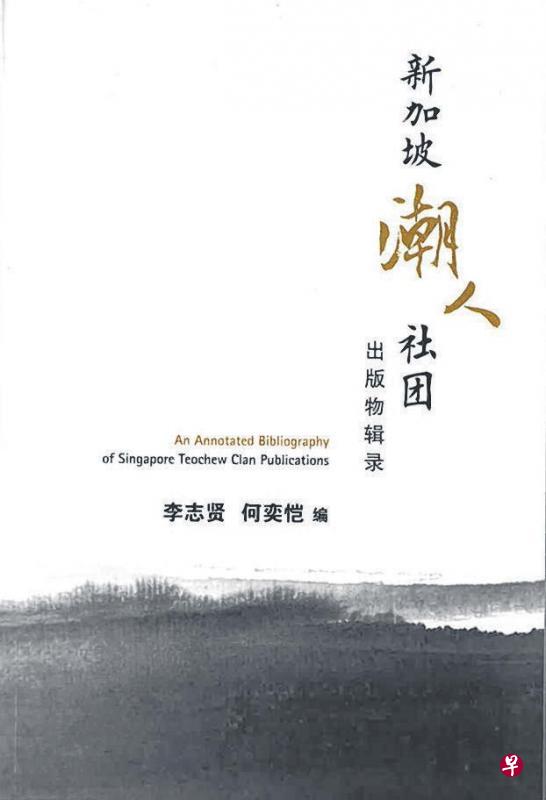
《新加坡潮人社团出版物辑录》收录本地潮人的宗乡与宗亲会馆、教育机构、慈善组织、文娱社团、商业社团等不同领域社团组织的出版刊物。
近百年来,新加坡潮人社团出版了数百本出版物,记载了历年来重要人物、事件、作品等。这些出版物散见于各图书馆、研究机构、民间团体和个别人士手中,但并没有完整系统的整理归纳。
适逢新加坡建国50周年,新加坡潮州八邑会馆联合新加坡国立大学中文系出版了《新加坡潮人社团出版物辑录》,主编李志贤副教授和何奕恺博士搜集并整理出新加坡潮人社团出版资料的目录汇编,为本地潮人社群与文化的发展史勾勒经纬,分类编目。
李志贤和何奕恺在本书前言说:“《新加坡潮人社团出版物辑录》是编者继《东南亚潮人中文资料辑录》(新加坡国立大学中文图书馆馆藏)一书出版后,对海外潮人研究资料作汇集整理,编纂辑录的另一次努力。后者整理新加坡国立大学图书馆馆藏的东南亚潮人资料,前者搜集新加坡潮人社团出版物。两本工具书的宗旨皆在为东南亚潮人历史和社会文化的研究与教学工作,提供更完整和更有系统的资料辑录,为从事这个领域的学术研究作出一份贡献。”
原始材料具史料价值
新加坡潮州八邑会馆会长郭明忠博士在序言说:“这一工作尽管耗时费力,却为学术界和社会大众做出了极大的贡献。该书不啻为东南亚华人研究和海外潮人研究的学科工具书,更是了解本地潮人社团的入门手册。”
《新加坡潮人社团出版辑录》收录本地潮人的宗乡与宗亲会管、教育机构、慈善组织、文娱社团、商业社团等不同领域社团组织的出版刊物,这些出版刊物作为原始材料,具史料价值。郭明忠说,该书“不仅补充了官方档案和考古文物的不足,也能为官方记载和民间讨论提供依据和作证,对于学界展开研究、解决争论有所裨益。该书提供了完整齐全的史料目录,为海外潮人和东南亚华人研究的学者和研究人员提供了便利。
《南金二集》国大中文系学生旧体诗选
来源:联合早报 2015年10月30日星期五

国大中文系自2010年始,开设两年一度之诗选集,今为第二届。诸生吟兴更胜从前,所做沉沉伙颐,创意迭出。特为是选,以继前年刊于《联合早报》之《南金选》。虽或未能媲美惜贤,而星洲风雅,庶几可稍振于吾人欤。 -- 林立谨志
巧克力连锁店可卡树,以及本地已故银行家陈醒吾的后人,近来分别成立一个15万元捐赠基金,在政府配对资助下,总额各达30万元,为主修中文系学生派发奖学金。
一、 古体
彭一凡《西湖春行》三月至钱塘,适逢新雨霁。
芳尘结绮疏,红露湿罗袂。
湖畔柳烟晴,花间流水细。
风熏日暮时,霞影满城地。 魏倩倩《游飞行者摩天轮》
一环巨轮映海湾,身随轮转入云间。
挥手可摩星点点,仰听银河水潺潺。
纷繁夜色收眼底,耳际全无汽笛喧。
骤登轮顶天下小,赏罢金沙俯榴梿。
轮顶难留如梦幻,轮回到底原点还。
未肯终朝搁低处,攀风再起竟周旋。
周旋不定日兼日,摆宕升沉年复年。
二、 近体
招诗玲《薄帆》薄帆怎敌过江风,素浆飞扬别岸东。
漫漫江天归一色,青青柳外识归鸿。 何颖舒《古城》
古城风日美,更胜洛阳春。
碧水连青汉,白瓷映锦鳞。
画楼钟鼓乐,曲巷玉浆醇。
红袖深闺里,谁知绿已茵。 张园林《周日》
闲将茶灶烹花气,醉拍危阑唱楚歌。
午梦醒时天欲晚,乱云一点远山多。 何璇《重游金陵怀古》
半川烟雨付沉吟,独听板桥流水音。
梦老城池金粉黯,燕飞巷陌履痕深。
难为中夜鼓琴事,且学顽仙观弈心。
水佩风裳谁识尔,万花飞处一登临。 李舟《雨后登 福康宁山》
孤台雨霁轻尘散,乔木拂云山径幽。
谁识临堤古炮立,至今犹为事倭羞。 蒋文萱《火龙果》
越女寻仙果,青中一抹红。
霜皮如烈熖 ,玉质似明玒。
骨突嫌娇妇,清甘逗顽童。
乃知世间事,表里不相同。 汪俊《狮城清明无所祭有感》
谷舒光海气暾,云霞锦烂似黄昏。
东流逝水源能溯,南下先民迹岂存。
提笔每招仓颉泪,饮水难祭帝炎魂。
搔头总为丝方结,愧向人前说本根。 翁雯洁《樟宜机场》
高塔捧明珠,浮云瞩望珠。
素襟沾别泪,铁翼伴羁孤。
引颈缘空寂,开颜为返途。
暂分情更切,初见辙相呼。 陈建东《德光岛从军有感》
壮士辞家换战衣,星洲灯火望依稀。
但凭话筒传音讯,不到瓜期不得归。 庄祖邦《败金沙》
腾龙直欲上银船,纵马无心顾一湾。
叩户百金沙土计,呼卢万贯死生关。
袁耽俊迈须惊汗,刘毅粗豪要改颜。
了悟白云知聚散,却思黄鹤几时还。
国大中文系出版本地潮人社团出版物辑录
来源:联合早报 2015年10月23日 星期五 03:30 AM
文/陈淋
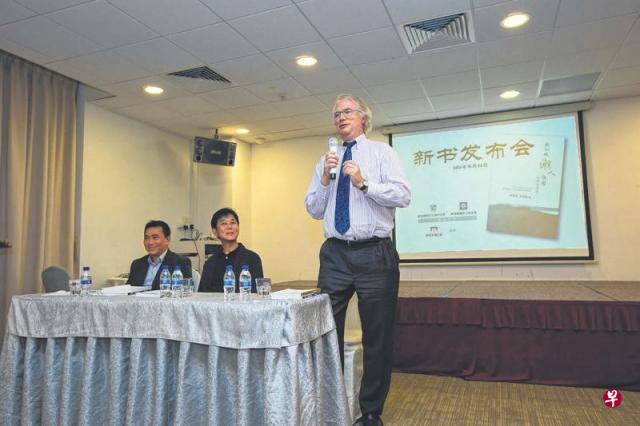
对于潮州八邑会馆赞助编纂的《新加坡潮人社团出版物辑录》,丁荷生教授(右)表示赞赏。旁为李志贤副教授(左一)和郭明忠。(曾道明摄)
新加坡潮州八邑会馆赞助、由新加坡国立大学中文系费时五年编纂的《新加坡潮人社团出版物辑录》,昨天发行。
这是国大中文系第二次发布与潮州人相关书刊的辑录,这本310页的新书收录了散落在民间的资料,共有382条目,超过400种文献。
潮州八邑会馆会长郭明忠说,这本书不仅是潮社、宗乡会馆值得收藏的刊物,也是研究新加坡与南洋地区潮社历史的珍贵参考资料,希望该辑录能起着抛砖引玉的作用,推动其他籍贯族群重视祖辈留下的文化遗产。
郭明忠在受访时透露,“新书记载着潮人先辈的贡献与历史,可以让潮人更理解本身文化,同时增添归属感。“
丁荷生:宗教文化从南洋回转潮汕
国大中文系主任丁荷生教授致辞时,赞赏该出版物辑录对本地社团发展学术研究的贡献。
他说,近年中国潮汕地区,民间庙宇一间比一间大,而且逐渐恢复了一些传统宗教活动,如善堂的扶乩,“这种从南洋“轮转”回原地的宗教文化现象,值得研究。“
负责编纂这本出版物辑录的李志贤副教授说,新书是国大中文系继2012年出版《东南亚潮人中文资料辑录?之后,第二本出版物辑录。
他说:“两本工具书的宗旨,皆在为东南亚潮人历史和社会文化的研究与教学工作,提供更完整和更有系统的资料辑录,为从事这个领域的学术研究做出一份贡献。“
有李志贤副教授和何奕恺博士主编,并由一批国大中文系研究生协助搜寻资料的《新加坡潮人社团出版物辑录》,以目录分类,收录了新加坡潮州社群绝大部分出版资料、本地潮人宗乡会馆、教育机构、文宇社团等组织的出版刊物。
汉学家贺麦晓:网络文学影响中国出版管理制度
来源:联合早报 2015年8月28日 星期五 03:30 AM
文/张曦娜
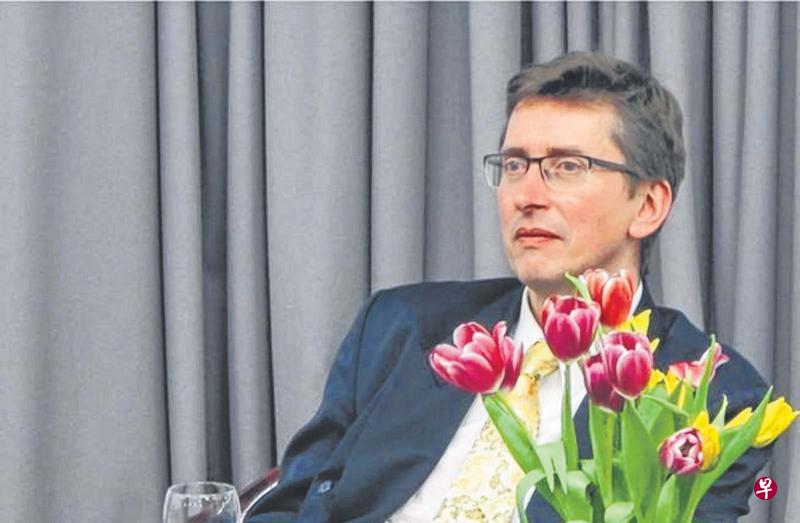
贺麦晓:严肃文学将来肯定也会在网上找到自己的出版空间。(贺麦晓提供)
伦敦大学亚非学院中文系教授兼中国研究院首任院长贺麦晓教授认为,网络文学影响中国传统的出版体制。
他说,过去没有“书号”不能出书。现在,网络小说就是网上出版的书,它们没有书号。这说明中国原有的出版管理制度已经无法持续下去。
新世纪以来,网络文学在华文圈子以惊人的速度发展,影响力与日俱增。所谓网络文学,是以网络为载体,以网民为读者发表的文学作品。
网络文学这一新兴文类的出现,悄悄引起中国文化的变革。伦敦大学亚非学院中文系教授兼中国研究院首任院长贺麦晓(Michel Hockx)教授,调查研究中国网络文学的发展状况,应“2015年度吴德耀文化讲座”邀请,将在国家图书馆发表专题演讲 。
出版《中国的网络文学》
贺麦晓教授主要研究中国当代文学和诗歌,曾专门研究中国民国时期杂志文学。他关于中国现代文学社团和杂志的研究,在中国受到关注,代表作《文体问题:现代中国的文学社团和文学杂志(1911-1937)》(Questions of Style: Literary Societies and Literary Journals in Modern China, 1911-1937)集中在中国社团、杂志的研究。
贺麦晓近年来重点关注中国新兴的网络文学,已经积累研究成果,他的最新著作《中国的网络文学 》(Internet Literature in China)研究、分析网络文学给中国当代文学带来的影响;并从出版制度出发,探索网络时代相对独立的出版环境,对传统出版体制带来的挑战。
贺麦晓教授在伦敦接受本报电邮访问时说:“中国大陆学者有很多关于网络文学的专著。我开始研究网络文学的主要动机,正好是我注意到大陆学者从2000年以来一直热衷于讨论网络文学,西方文学研究者基本上没有注意到这种文学形式。我的《中国的网络文学 》在西方汉学界里算是比较早的,不过比我还早的学者也有,那是美国的冯进教授(Prof Jin Feng)和英国的尹海洁博士(Dr Heather Inwood)。”
在中国,研究网络文学的学者很多,值得注意的有中南大学的欧阳有权教授、西南交通大学的梅红教授。
从研究期刊到网络文学
说到当初对中国网络文学感兴趣的原因,贺麦晓说:“我在2003年出版关于中国民国时期杂志文学的研究专著。在上世纪二三十年代,文学杂志是比较新的媒体,杂志文学跟之前的文学有一些明显不同的地方。所以,当我看到网络文学在中国大陆开始流行起来,并引起争论,我想这是很好延伸我的研究范围的机会。正如20世纪初的杂志文学,21世纪初的网络文学也是在使用一个新的媒体和一些新的技术,这一切带来新的写作模式、阅读模式和出版模式。同时,网络文学也对中国的文学管理制度,或者说审查制度带来一些新的挑战。”
贺麦晓认为,期刊与网络文学两者之间有关联。他说:“不论是期刊或是网络文学,都注重作者和读者之间的互动,还有两者除了文本内容之外,也有很多其他内容,比如视觉内容。另外,两者的阅读方法都跟阅读书籍的方法不太一样。文学理论家一直忽略杂志文学和网络文学,因而大部分的文学理论都把文学文本看作由单独作家创造的,杂志文本和网络文本都比较多样的,分散的,由好多人一起创造出来的文本。”
艺术形式突破
经过十数年的发展,网络文学如今可说开始花繁叶茂。同时,近几年来中国的网络通俗小说尤其十分盛行,例如穿越、言情、科幻、玄幻等类型的通俗小说,不少电影与电视剧都由这些风行一时的网络小说改编而来。同时,大型互联网文学集团陆续成立。
在贺麦晓看来,中国网络文学的盛行也带来一些艺术形式的突破,包括“新的文体的出现,比如上海作家陈村在网上发表的类似日记的、持续很多年的、多媒体互动文本。这样的文本,跟传统的文学文本完全不一样,作为研究者,你不知道从哪里开始读,什么时候停止读。很多网上的文本对传统的文学观和文本观都带来了相当可观的挑战。”
谈到今年初在华文圈子里爆红的中国网络诗人余秀华,贺麦晓说:“于秀华的诗写得跟别人不太一样,很直率,读起来挺新鲜的。她的人生故事也很有意思。网络文学往往是把‘人’和‘文’交杂在一起,这可以说是它的特点之一。”
贺麦晓认为,网络文学在影响中国传统的出版体制。他肯定的说:“在过去,没有‘书号’就不能出书。但是网络上的通俗小说,篇幅都很长,跟传统的长篇小说在形式上没有两样,这些网络小说也就是网上出版的书,它们就是没有书号。这说明中国原有的出版管理制度已经无法持续下去,所谓严肃文学将来肯定也会在网上找到自己的出版空间。”
为什么研究汉学
早在1980年代,欧美学习汉字、汉学的风气井不普遍,但贺麦晓却在这时候学起汉字,涉足汉学领域。
说到当年踏入汉学界的原因,贺麦晓说:“我上中学的时候,比较喜欢学外语,很早就下决心,上大学要学一门与众不同的外语,可是开始并不知道该选哪一种。当时我对中国没有什么特别的认识,周围也没有去过中国或者对中国有任何了解的朋友。”
后来,贺麦晓的一位中学老师把他介绍给他们学校的一个校友,这个校友大学后读的是汉学,他刚从中国留学回来,告诉贺麦晓一些事情,贺麦晓开始对“汉学”这个概念感兴趣。校友也让贺麦晓了解,学汉学跟学其他外语不一样,它是一种区域研究,而不光是学语言,而且还会有机会到中国去留学一年。
贺麦晓说:“知道这一些以后,我就决定要学汉学。1982年开始在荷兰莱顿(Leiden)大学念书,1986年第一次去了中国。”
中元节在本地只会演变不会消失
来源:联合早报 2015年8月23日 星期日

丁荷生教授说,当人们不再把祖先供奉在家里,而是把祖先牌位交由庙宇管理,中元节与清明节就显得重要,能为人们提供心理慰藉。(李天锜摄)
本地民间庆祝中元节的活动很盛大,大庙小寺、组屋巴刹、小贩中心、工业商厦,任何地方都有大小普度活动,显示中元节的重要性,也牵涉到个人的宇宙观。农历新年是华人把神送上天庭,农历七月则是让鬼从地府回来,再送回去,中元节是华人对于鬼魂和祖先的宇宙观。
新加坡国立大学中文系主任丁荷生教授受访时,比较新加坡与马来西亚的中元活动,认为国人的中元节宇宙观已被分散。槟城中元普度长达30天,每天轮到一个地区,很有组织,相互比赛,交流经验,也有歌台等庆祝方式。反观新加坡,1970年代地图上有过150个村庄,有村庄就有庙宇,每四到六座庙宇即组织中元普度,1990年代过后,村庄消失,宇宙观被分散。
丁荷生教授近年观察到新的特殊现象:本地至少有20座庙宇(包括惹兰红山“开山庙”)在地下室设小地狱,祭拜大爷伯,或布置成十八层地狱,气氛“有点可怕”,显示人们从地狱借钱,鬼变得越来越重要。
仪式受佛道影响
中元节起源众说纷纭。丁荷生教授认为,中元节烧纸钱添库,属于道教仪式。道教相信:人出生时借了笔钱,过世时,往生者的亲戚得还钱,按年龄算出正确数字,得烧一定数量的纸钱归还,还得举行一些仪式确保纸钱不被其他鬼魂抢去。国人常将中元节当成道教节日,他说,因为做普度仪式以道士居多,尽管和尚也做。
另外,丁教授指出,佛教借中元节(也称“盂兰盆节”)将印度的地狱概念带到中国,十八层地狱变得系统化,并把钱变成功德,通过仪式转化成送给祖先的东西。而道教后来占据这个市场,也进行类似仪式,戴上佛教帽,念咒文(梵文),打手印,佛道相互影响,难分清楚。
在中元节广为流传的目连救母的故事,出自《盂兰盆经》,将地狱概念戏剧化:佛陀弟子目连因母亲在地狱饿鬼道中受苦受难,食物尚未入口便化成火炭,其母不能得食,目连不能安心拜佛,前往地狱救母,第一次失败,后借来武器,终于打开鬼门关,救出母亲。可是,所有鬼魂随之而出,因此得通过咒文念佛把祭拜的贡品转化成食品,让饿鬼们饱食一顿,安心回去。总之,中元节是跟鬼魂和祖先有关的宇宙观。
中元节主要流行于广东、福建一带。丁教授说,中元普度1949年后在中国被禁,八九十年代海外华侨回到中国,恢复当地一些传统习俗,包括普度。台湾一度也压缩普度,于1980年代末解除,今天以基隆普度场面最壮观浩大。市中心整条街封起摆桌,赏给鬼魂的贡品无数,也请客人与陌生人吃饭。
庆祝方式具地方色彩
在本地,从乡村到组屋,庙宇与民间组织筹办的中元普度,从地点、排场到表演形式具备地方特色。丁教授说,歌台很夸张漂亮的表演方式搞热气氛,互相竞争,吸引更多鬼神来看,台下也借中元福物喊标,借鬼来佑福。“中元节与歌台、戏台融合,同时演给人、神与鬼看。”
他印象最深刻的是汤申路上段的庙宇“九鲤洞”曾演傩戏《目连救母》,当地狱门大开,所有人的祖先牌位陆续上台,与目连一起普度,送回鬼门后继续演戏,演戏与仪式融为一体。
丁教授认为,中元节这样的民间节日永远存在,不管大声还是小声,都不会消失,只是演变。他好奇地问:当国人新的住家空间不再设祖先牌位天天祭拜,那么,死人到哪里去了?如果祖先牌位交由庙宇管理,我们跟祖先的距离是否很远,怎样纪念他?想念他?也因此,他说,一年一次的中元节与清明节愈发重要,更引人关注,为人们提供心理慰藉。
七月普度是华人较大的文化遗产。丁教授笑说:“比起西方万圣节一年只用一天处理鬼,用一个月处理的中国的鬼比较厉害。对中国人来说,祖先祭拜仪式很重要,显示人死后还在人间,否则为何天天给它饭吃?人间与祖先一体是比较特殊的文化现象,给予生者生活的动力。”
配合《禧街47号》纪念册发布会 总商会办讲座回顾先贤事迹
来源:联合早报 2015年8月17日
文/谢燕燕

中华总商会名誉董事李秉蘐博士(左)和国大中文系黄贤强副教授在“会长、新加坡社会与中国”公开讲座上汇报研究成果。(中华总商会提供)
早在上世纪30年代,本土意识已在早期华商之间萌芽。1933年时,时任中华总商会副会长林庆年就倡导修改商会章程用语,把“吾侨”改为“华人”,把“中华侨商”改为“本坡商人”。
可惜今天没有多少人知道林庆年(1893-1963)是谁,也不知他担任过中华总商会会长和福建会馆第一届教育科主任,并在任内主张以华语而不是方言教学,以及推行小六考试制度等。
出生福建安溪茶商家庭,32岁才“下南洋”的林庆年,除了推动总商会的本土化和地缘认同外,还带领总商会在大世界筹办国货扩大展览推销大会,积极推动本地商贸。
中华总商会在109年的漫长历史中,出过不少像林庆年这样的商界领袖,却因过去缺乏史料研究,大家对这些昔日会长所知不多。总商会和新加坡国立大学中文系所展开的“总商会先贤人物研究计划”,正有系统地研究与整理这些先贤的生平事迹,找回他们的历史定位。
总商会前天在摩天观景轮,配合商会历史回顾展《禧街47号》纪念册发布会,举行“会长、新加坡社会与中国”公开讲座,由商会名誉董事李秉蘐博士、国大中文系黄贤强副教授和参与“总商会先贤人物研究计划”的国大荣誉班学生主讲与汇报研究成果。
黄副教授说,上述研究计划从2013年开始,至今已完成对总商会过去的董事陈延谦,会长林义顺、李伟南、李俊承、陈振贤、林庆年等人的研究工作,目前还在进行中的有薛武院、林文田和李光前。
按照这项计划,总商会为每名学生提供奖学金,同时让他们参考总商会的原始档案材料如会议记录等。研究重点放在历届会长如何处理与新加坡华人社会、中国时局,以及英殖民地政府的三角关系。
国大首个中英通识课程受学生欢迎
来源:联合早报 2015 8月16日 星期一
文/许翔宇
“会通中西:探索华语沟通艺术”是国大为给学生全面教育而推出通识课框架10多年来,首个以中英语讲授的课程。设计给课程的中文系副主任李子玲副教授指出,课程已非中文系学生为对象,用意是凸显华文在不同专业领域的实际应用。
对在讲英语家庭成长的黄以扬(24岁)来说,上华文课曾是一件苦差。小时候父母每周送他去上华文补习班,让他感觉痛苦难熬;中学毕业后报读理工学院,他曾“庆幸”不必再读华文。
然而,这名在新加坡国立大学修读工业设计系的二年级生,这个学期出人意料地报读国大中文系的一门课,这个以双语讲授的通识(General Education)课程——“会通中西:探索华语沟通艺术”,让他重新找到学习华文的兴趣和动力。
这个让黄以扬改变“华文枯燥难学”印象的单元课,是国大中文系开放给全校学生报读的课程。这也是国大为给予学生全面教育而推出通识课框架10多年来,首个以中英语讲授的课程。
8月新课程关于华文流行曲
国大中文系连续两个学期开这门课,每个学期有约240人报读。学生的踊跃反应,也促使该系接下来开办更多这类非主修双语课程,其中包括王昌伟副教授今年8月开办的“东南亚地区华文流行歌曲”,以及潘秋平副教授在筹划开办的一门从新加坡语言看本地社会历史转变的课程。
设计“会通中西:探索华语沟通艺术”课程的国大中文系副主任李子玲副教授说,课程以非中文系学生为对象,用意是凸显华文在不同专业领域的实际应用。“课程以研讨会形式教学,邀请不同职场专才担任客座讲师,分享他们如何凭驾驭双语,在广告、制片、媒体及商业等领域取得成功,让学生领略华文的实用性。”
受邀讲课的包括本地资深广告人林少芬、纪录片制作人韩光伟和陈惜惜、中华总商会董事李秉萱,以及跨语言全国翻译委员会成员之一的陈丹枫等。
课程没有考试,评估是按学生参与讨论、书写感想及随堂测验的表现。阅读材料及书写以英语为主,讨论可用双语进行。分组讨论课上,学生必须收集原始资料、做专题介绍。李子玲说:“我们希望学生在毕业前能拓展眼界,并提醒他们别放弃自身原有的双语优势。”
学生:掌握华文也能开启多扇门
黄以扬说,平时讲华语的同学与他沟通时也自动转用英语,导致他的华语会话能力退步,连到小贩中心点菜时也支支吾吾,令他有点不好意思。“我现在恶补华语,不仅是因为中国经济崛起,让我看到华文的重要性,我也希望能与长辈更好地沟通,深入了解本地文化遗产。在朋友介绍下上这门课后,我意识到华文在现实领域的实用性,更有内在动力去学习华文。”
刚毕业自国大社会学系的何楚杰(26岁)说:“客座讲师分享实际的职场经验,让我意识到华文不单用于日常沟通,也能为你开启多扇门。以林少芬的例子来说,她将传统文化底蕴与西方审美观结合,让她的作品拥有独树一帜的风格。”
尽管“会通中西:探索华语沟通艺术”要求学生至少有华文B的基础,但也有非华族学生凭着高度的热忱,获李子玲特别允许来修读。来自瑞典的罗宾(Robin Bodin)是斯德哥尔摩大学商学系学生,目前在国大进行交流。对于课上涉及华文部分,一名助教会坐在他身旁同步翻译。“亚洲将是未来最大的市场,尤其中国的发展,更不容小觑。我希望做好准备,培养到中国经商所需的文化知识。”
通识课程和“新加坡学”(Singapore Studies)课程是国大生毕业前必修的课程,各院系都可开办单元课程供学生选修。国大中文系开办的这类课程还包括“探索华语电影:上海—香港—新加坡”“古代中国历史与文学”,以及“新加坡华人的日常生活:过去与现在”等,都受到学生的欢迎,课程以英语讲授,报读人数往往有100多人。
王昌伟副教授指出,这类课程与中文系开办的传统主修课不同,希望让华文基础不强的学生培养起对中华历史文化的兴趣。“他们可能中学毕业后就没有接触华文,这些课有助重新唤起他们自身的文化身份认同,从他们切身的经验或感兴趣的事物出发,引发他们进一步阅读华文的兴趣,而系里也有其他课程供他们继续报读,以做更深入的探索。”
粤闽侨乡考察行
来源:联合早报 2015年2月13日 星期五 03:30 AM
文/杨艾婷
图/黄贤强
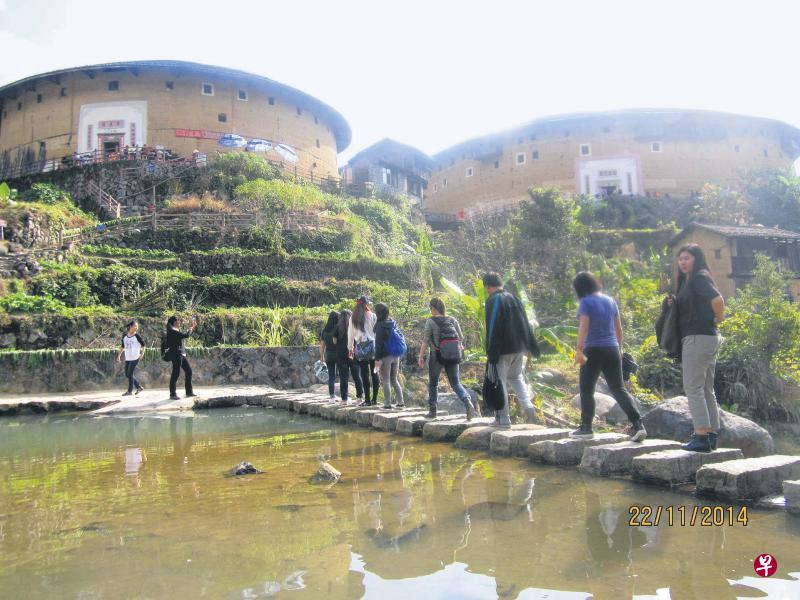
国大中文系学生考察客家土楼。
新加坡国立大学中文系近年获得新加坡茶阳(大埔)会馆和茶阳(大埔)基金会的慷慨资助,在2010年至2012年间,举办了两次中国粤闽客家地区田野考察活动,两次考察行程遍及粤闽两省多地,包括深圳、惠州、河源、龙川、梅州、汕头、潮州、大埔、永定、龙岩、厦门、鼓浪屿等。
2014年11月下旬出发去中国前,一位国大商学院的好友半打趣半严肃地问我:“你们去田野调查的意义是什么?就这么短短一个礼拜你们能考察出个什么来?”我被问得无言以对,因为这也是当时我的疑惑和思考。对于从未参加过田野调查的我而言,猎奇的心态似乎更占上风。但在最后一天回新加坡的飞机上,突然发觉疑惑其实早已在路途中得到了解答。
到访南洋富商梁碧如故居—洁养堂
田野调查的第二天傍晚,我们一行人抵达了广东梅州,打算趁夜幕还未降临赶赴梁碧如的根据洁养堂一探究竟。拥挤的交通和对路线生疏的司机让我们焦心地看着四周渐渐华灯初上。此时上车的当地导游说了一番话让我们哭笑不得却又暗觉自豪:“你们即将要去洁养堂是当时的南洋大富豪梁碧如的故居,现在已经变成文物保护单位了。本来没有人知道这个地方,是后来一位来自新加坡国立大学的黄… …黄贤强教授发现的。”
话语刚落,坐在他旁边的领队黄老师默默地举起手:“我就是黄贤强。”虽然在上课时就已知晓黄老师与洁养堂的渊源,但此时此语配上老师默默举起手还是让人觉得逗趣又期待。
我们迎着夜色,靠着洁养堂里不太明亮的灯光,如愿看到了“传说中”曾被用来当作搓衣板的李鸿章奏请皇上恩赐的功德碑(因为梁家后人不知道这个是被的光荣来历,而把它弃置在天井一角),以及墙上挂满的家族照片和媒体报道剪报。
梁家后人光曦伯一直试图告诉我们更多,他那苍老的声音回响在空堂的房子里显得尤为真切,我们只能依稀从房内精美考究的装饰中窥见当年的热闹繁荣,课终究盖不住满是的孤寂。如今洁养堂所处的区域已被高高耸立的商住房包围,唯独此处倚着一湖半月池与周围分隔了时空,仿佛时光在这里满了下来。除了庆幸,似乎没有更好的词能表达我们的感受。
去“孙中山挚友”徐统雄故居走一趟
考察的第五天,我们却看到了一个不同的画面。我们本计划在大埔县三河坝参观完中山纪念堂之后便马上赶赴曾是南洋首富张弼士的故居,可中山纪念堂的向导突然提及纪念堂的筹建者徐统雄的古句也在附近,这个消息让黄老师倍感兴趣,一行人便决定先去徐统雄的故居走一趟。
徐统雄何许人也?我们趁着还未到达目的地纷纷掏出手机上网解惑:”徐统雄,大埔县三河坝汇城村人。届时孙中山后,交情笃厚,成为忘年之交… …尔后,有孙中山介绍加入旅星同盟会,参与革命工作,先后担任茶阳会馆、客属总会董事及中华革命党、中国国民党新加坡支部长等职,为支持孙中山领导的推翻满清统治的民族民主革命贡献殊多。… …尤其在孙中山最困难的时候,他慨然将星州经营的七间店铺全部资产典卖出来资助革命,其爱国至诚、毁家纾难的举动使孙中山深为感动,视为海外知己。“
映入眼帘的文章标题皆为”孙中山挚友徐统雄—为革命倾家荡产“、”国父孙中山,国叔徐统雄“等。如此重要的一个人物让我们更期待前方的目的地。
在村子里来回询问几次,我们才在一块不起眼的角落找到了徐统雄的故居。破败的房子里仍然居住着徐统雄最小的儿子—遗腹子,他拿着一张不知何时何人给他的徐统雄的照片复印件向我们介绍:“这是我的父亲‘》紧临而居的是徐统雄的长孙。
也许我们是来到这个房子的第一个考察团,我们的突然来访让他们略显惶恐,却也仍然努力地解答我们的疑惑。随着交谈的深入,我们了解到了更多关于徐统雄后代的信息,甚至看到了辗转流传中已变得残缺不全的徐氏族谱。黄老师和学姐蹲在黄泥地上,用手抻着族谱小心翼翼地一张张翻阅、拍照,同学们围在四周,不时地伸手帮忙拼揍破碎的页张。一两个月过去了,现在回想起当时的这个画面仍觉得怦然,还有许多无奈的惆怅。
由于行程匆忙,我们并未在徐统雄的故居做过久的停留,同学们都笑说,看老师脸上满足的笑容就知道他肯定会再回来的。回头一看,老师正笑得像个得了大玩具的孩子似的,和学姐讨论着这的新发现。
探访拥有不同故事的客家历史建筑
从考察初始看到的洁养堂,到行程接近尾声时看到的徐统雄故居,这一路下来我们亲身探访了散落在客家各地、拥有不同故事的历史建筑,心情也像做过山车似的起起伏伏。有些建筑备受重视,抢救整修,吸引了海外游人无数;有些融合了东南亚建筑风格,具有重要研究价值的故居却杂草丛生,或荒废,或成为了呗木屑覆盖的木材加工厂。当它们跨越到下个世代,不知又会拥有怎样的命运。
不可否认,这修与不修、修多少、护多久的问题自有其必要的经济和政治考虑,但我们却可以在田野调查中发掘它们的重要性,让它们不至于在历史中被淹没,甚至能助其一臂之力逃脱被毁坏的命运。也许在中华的浩瀚历史,它们无法与千年遗迹相提并论,可是鲜活的小人物、小故事、小建筑才是这个国家历史中的血和肉,是让历史真正丰满有魅力的原因所在。这些历史建筑对于文化研究学者而言就像是另一种存在形式的重要文献:你给予我灵感和信息,我亦希望你被妥善对待。
总有人笑话学者或文字工作者是文弱书生,手无缚鸡之力,可是我们却明明看到很多像徐统雄般的重要历史人物被他们进一步发掘,许多像洁养堂这样的建筑在他们手中起死回生,他们才是将笔杆子挥舞得深刻有力的人。至此,旅途开始前的疑惑早已不存在。只要他们一直在路上,这便是于我们而言最值得庆幸的事。
田野考察相关人物志
梁碧如(1857-1912):原籍广东梅县,年少来南洋谋生。在马来亚霹雳开矿致富,曾被清朝委任为驻槟榔屿领事,也对当地的教育和慈善事业做出积极贡献。
万年在家乡兴建围龙屋—洁养堂。该堂于1900年完工落成,为“三堂四横一围”的客家围龙屋,占地面积5343平方米,内有120多个房间,现已被列入当地文物保护单位。屋内收藏有光绪皇帝恩赐的功德碑和乐善好施石碑。
张弼士(1840-1916):原籍广东大埔县,年少到印尼爪哇谋生。致富后事业跨及雅加达、棉兰、槟城、新加坡和中国各地。曾被清朝委任为驻槟榔屿首任领事,后接替黄遵宪担任驻新加坡总领事。
晚年回中国投资建设,先后被委任闽粤农工路矿大臣、商务部考察外埠商务大臣等。他也是中国百年企业张裕酿酒公司的创办人,还是新加坡中华总商会的主要催生者。
徐统雄(1886-1947):原籍广东大埔县,年少随父亲南来新加坡经商。曾大力支持孙中山革命,担任中华革命党新加坡支部长、同德书报社社长等。
回国后在家乡大埔县三河镇兴建最早落成的中山纪念堂(1929年),被人尊称为“国叔”。




















